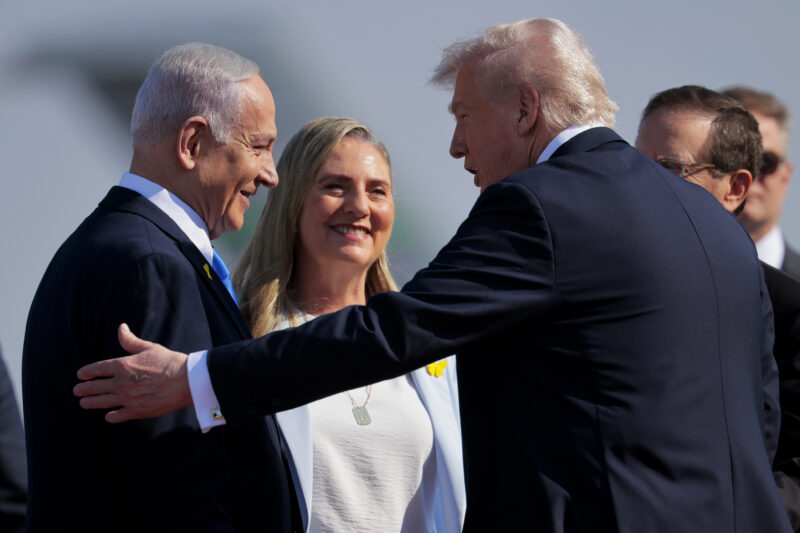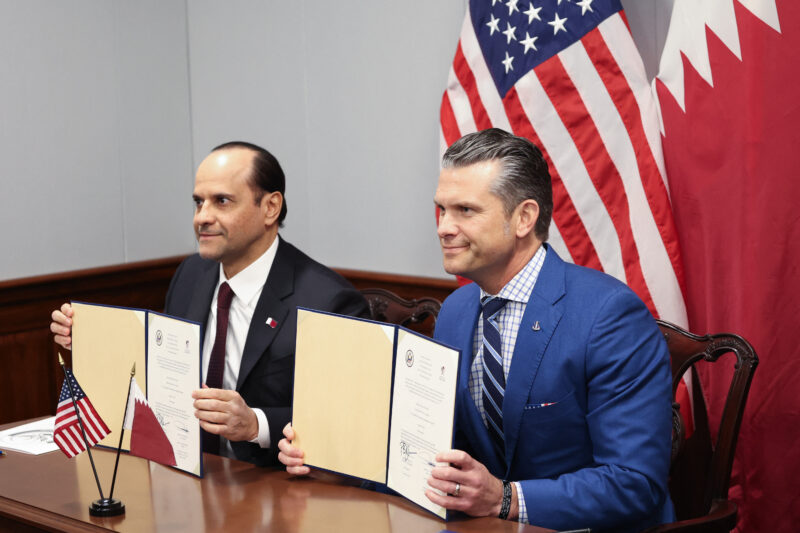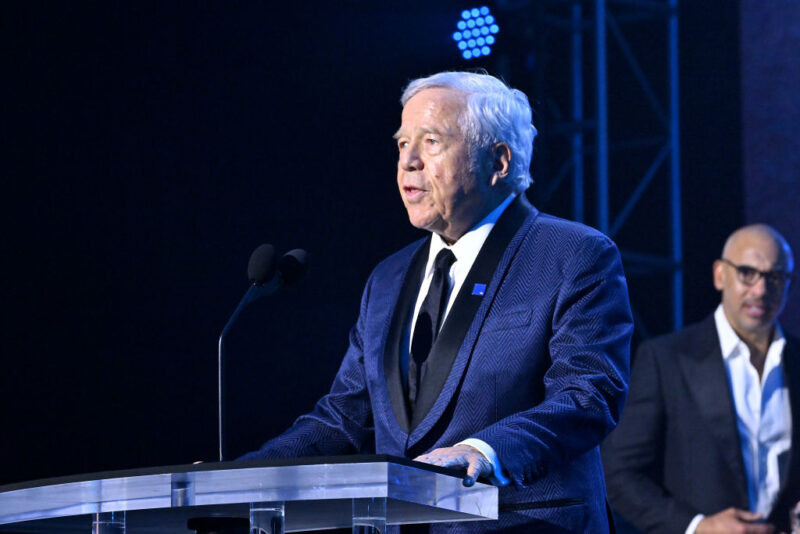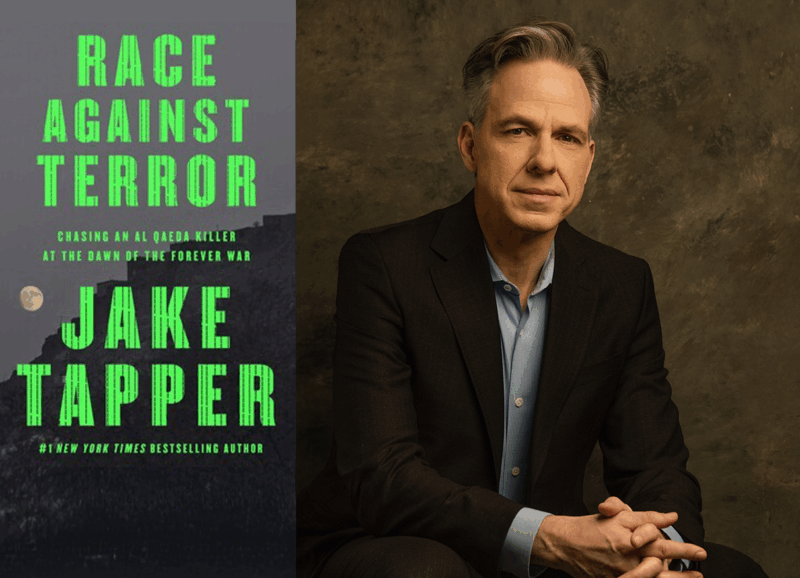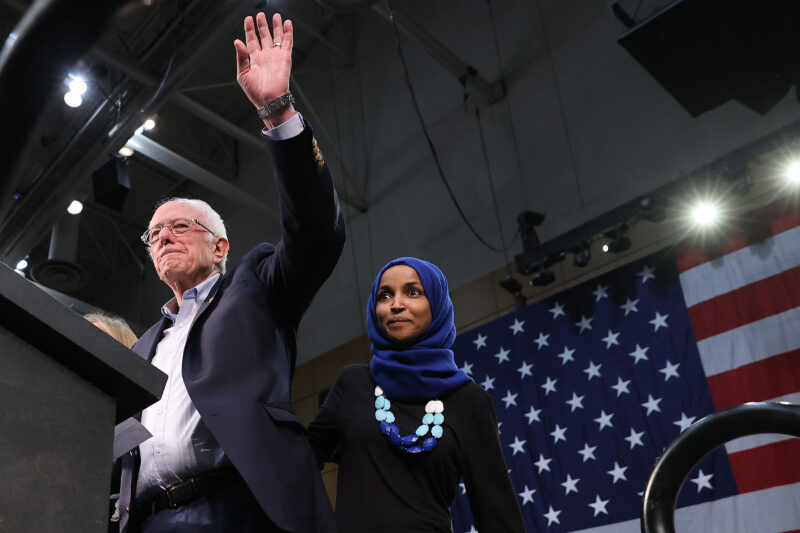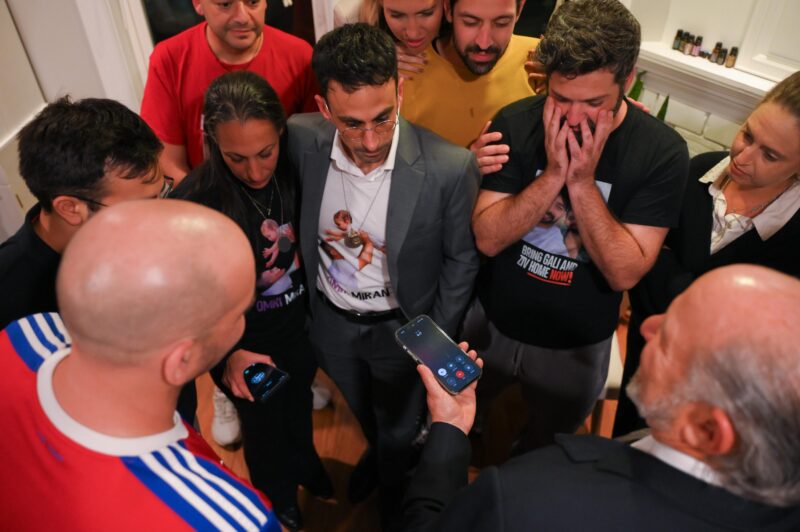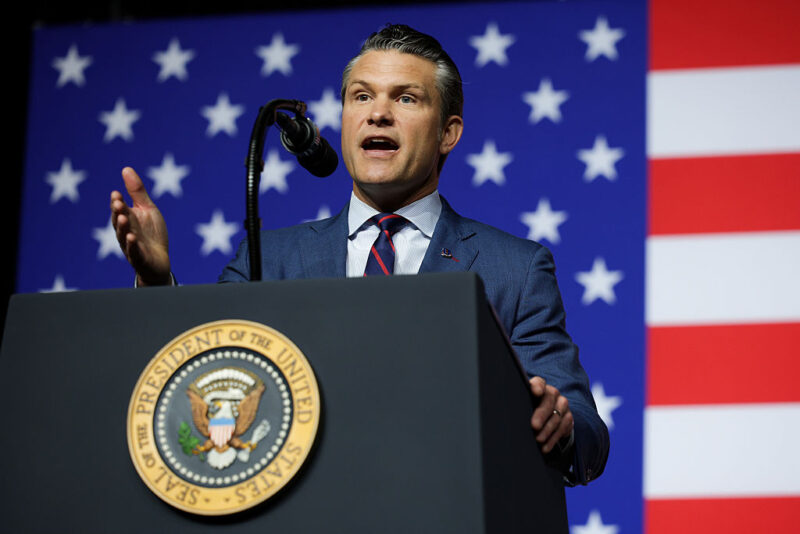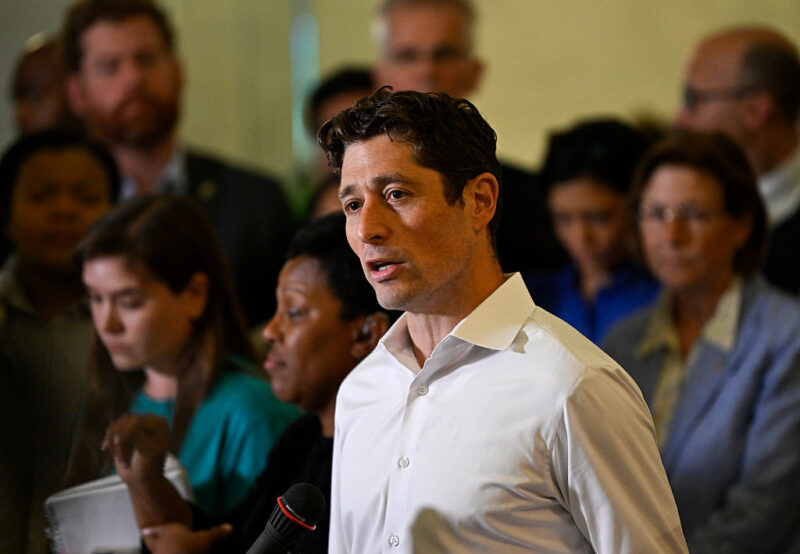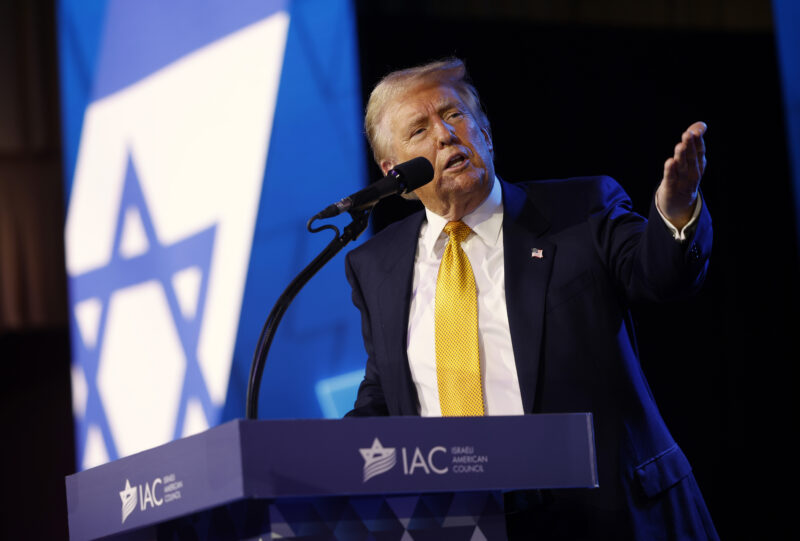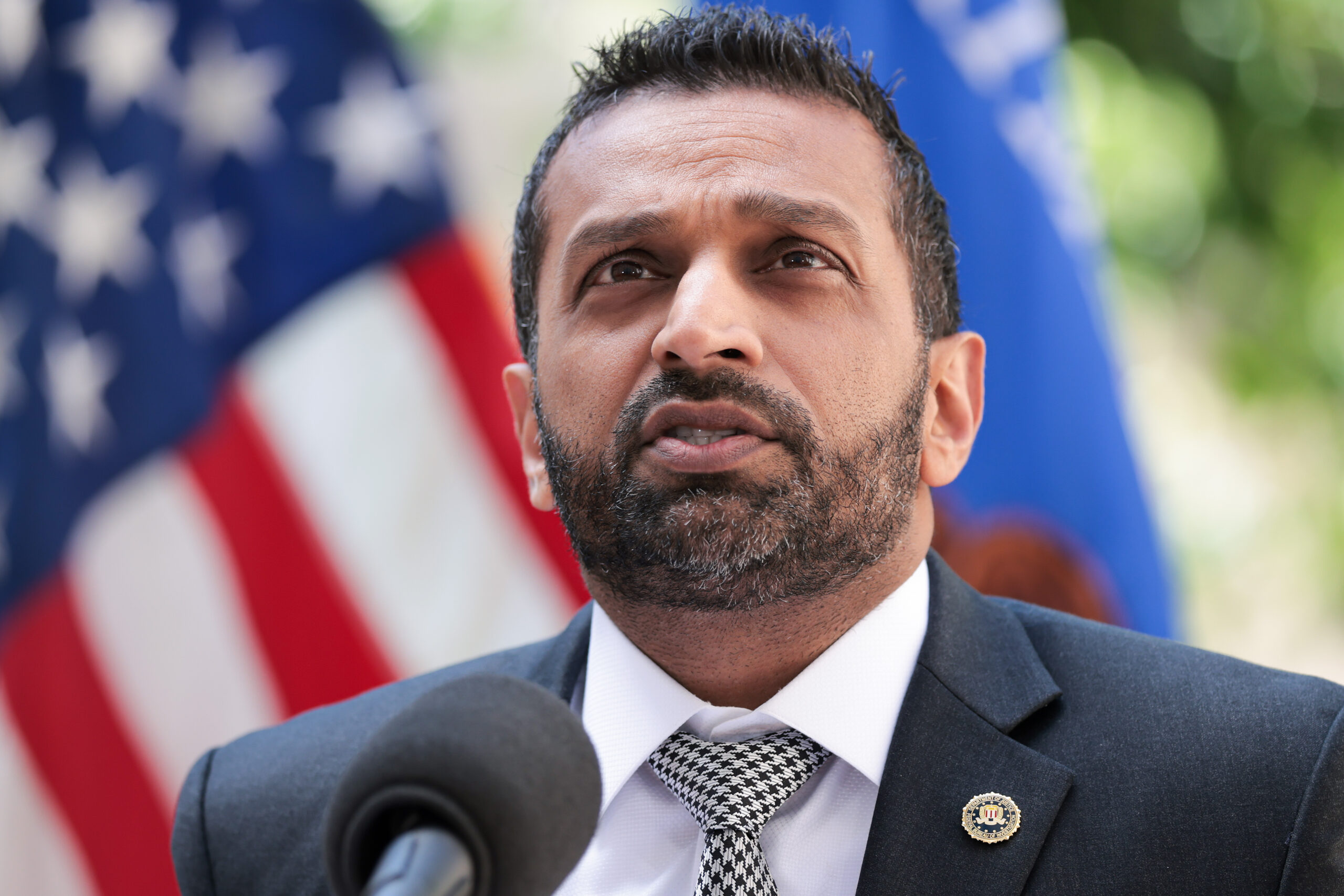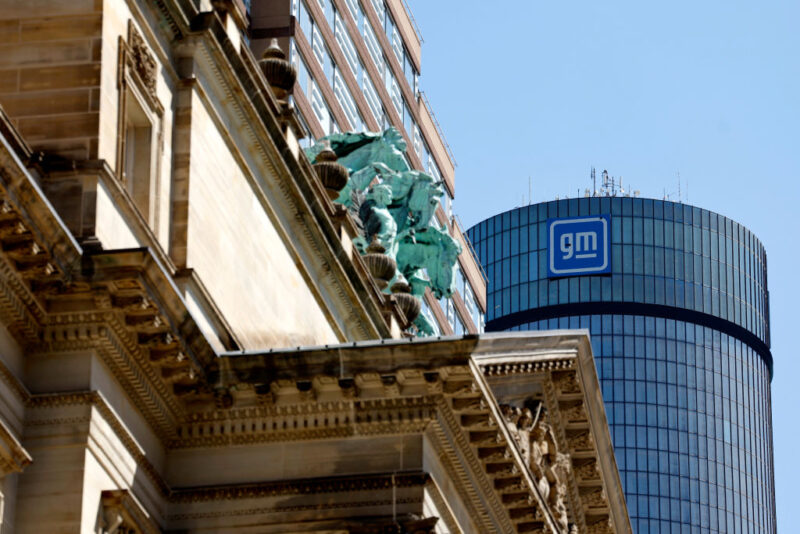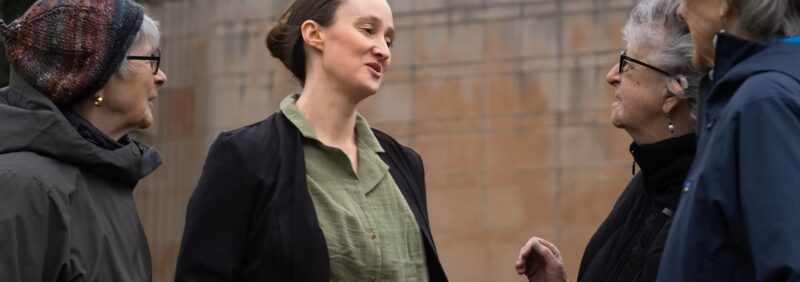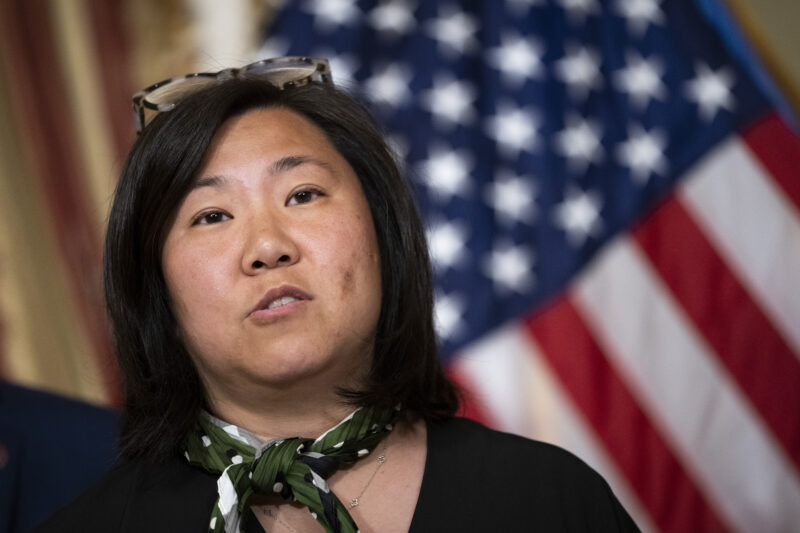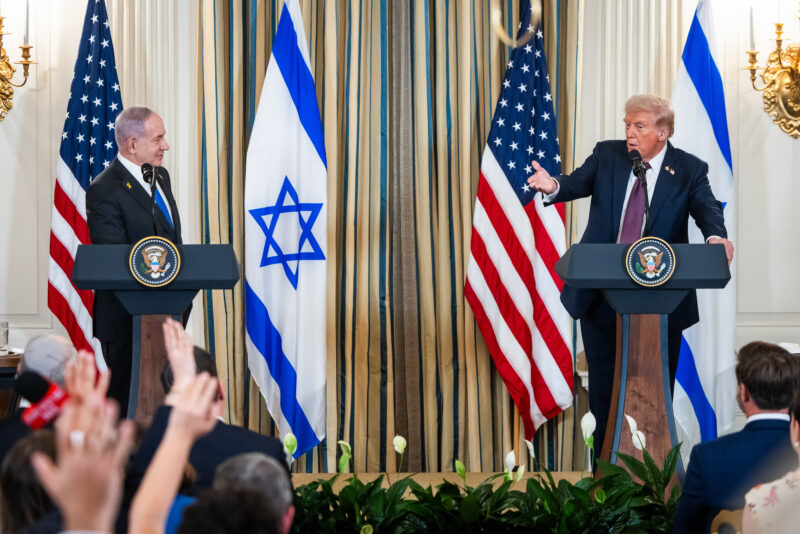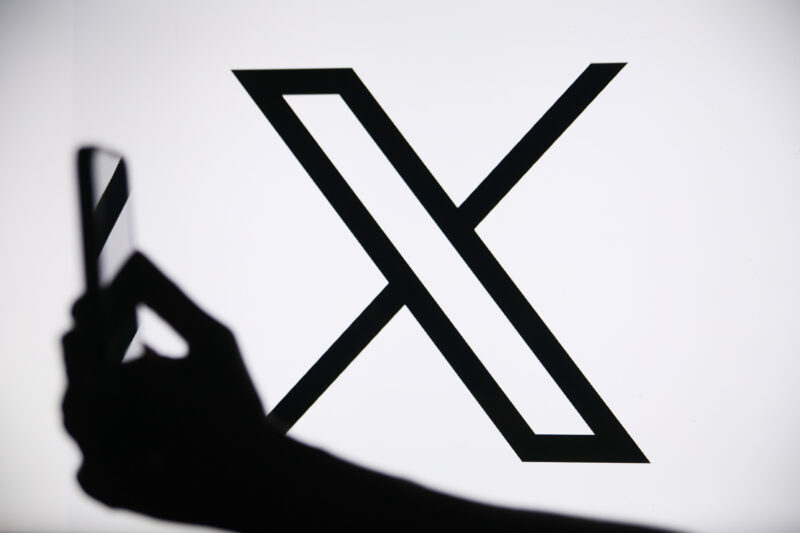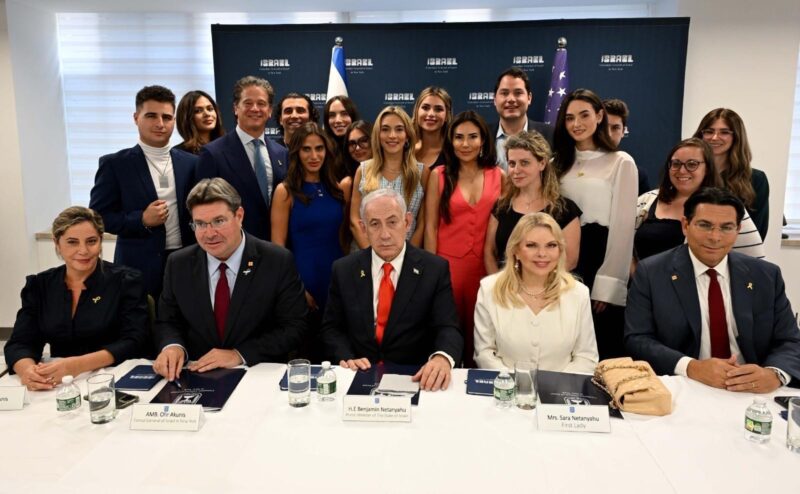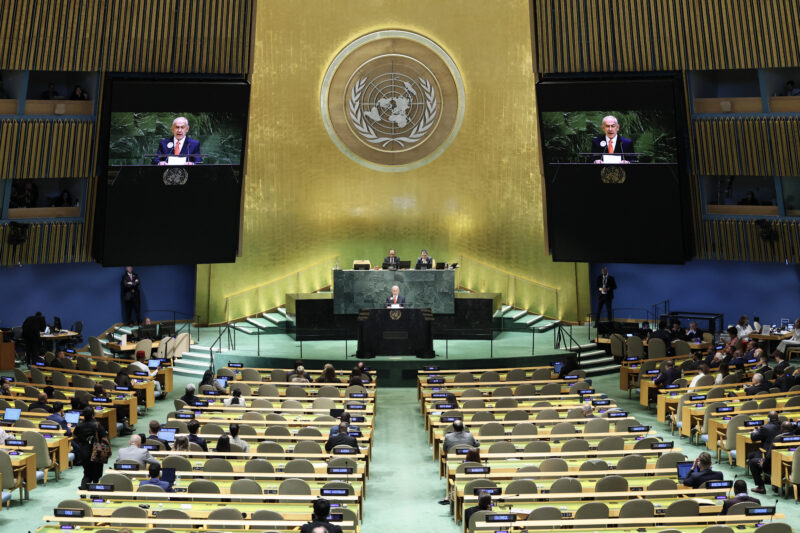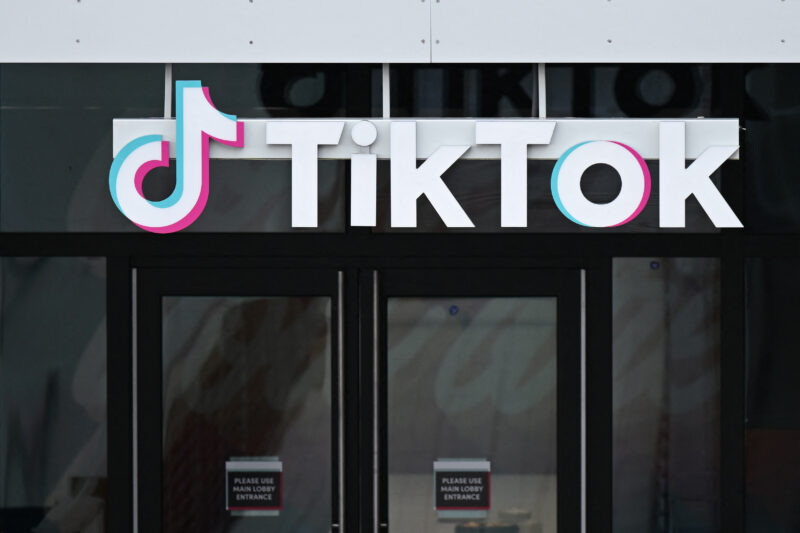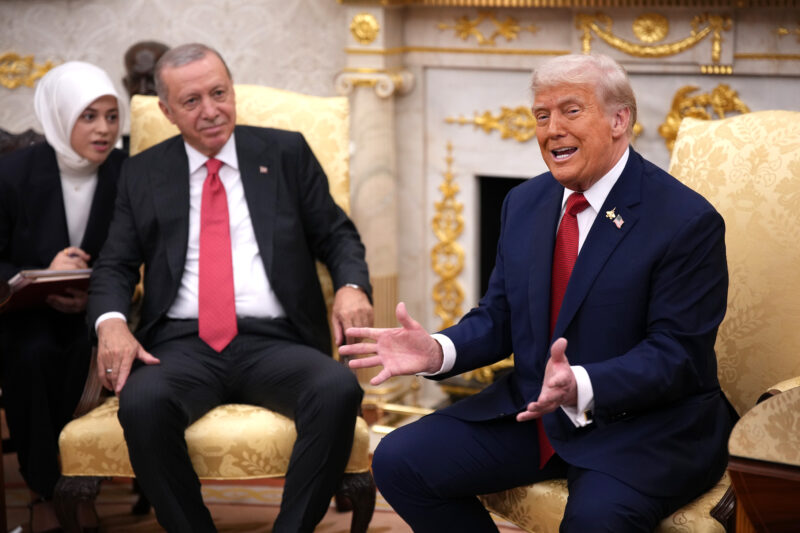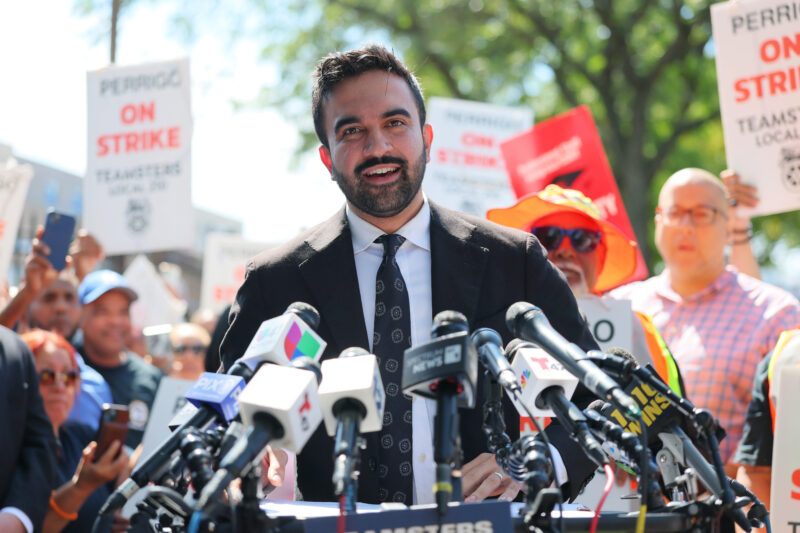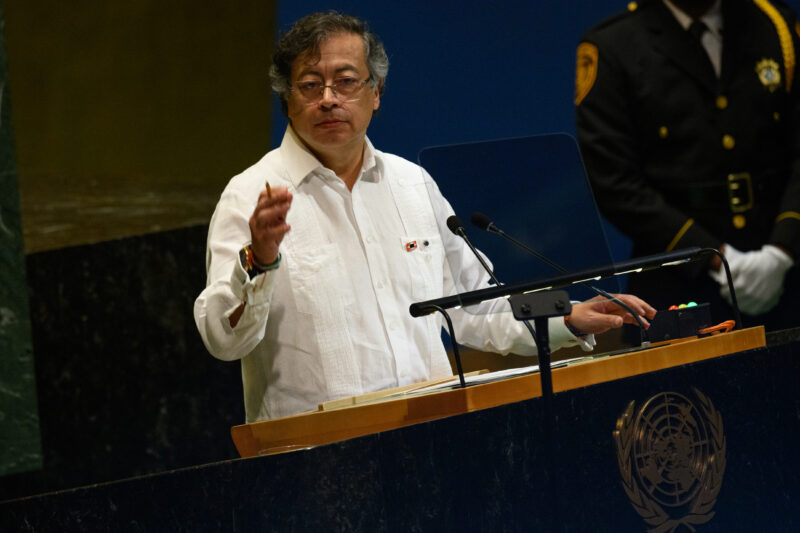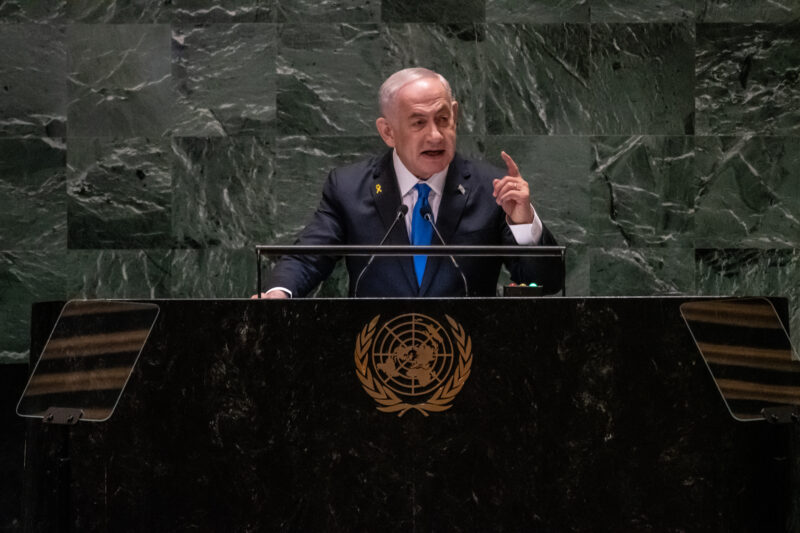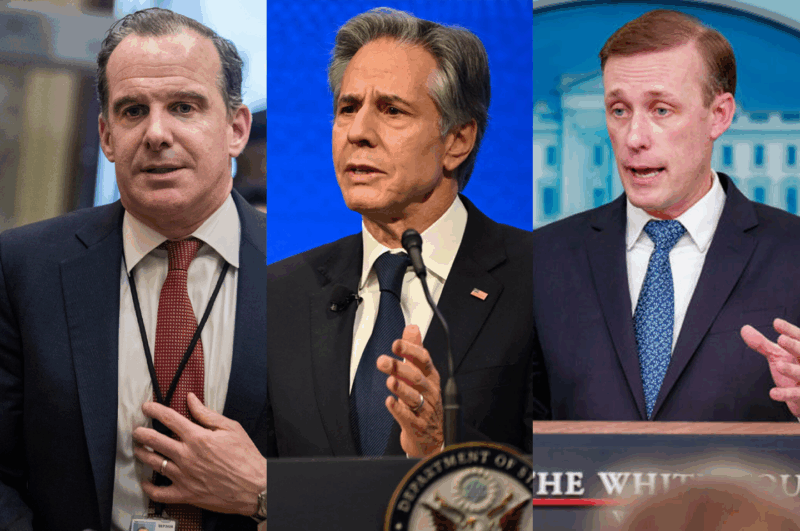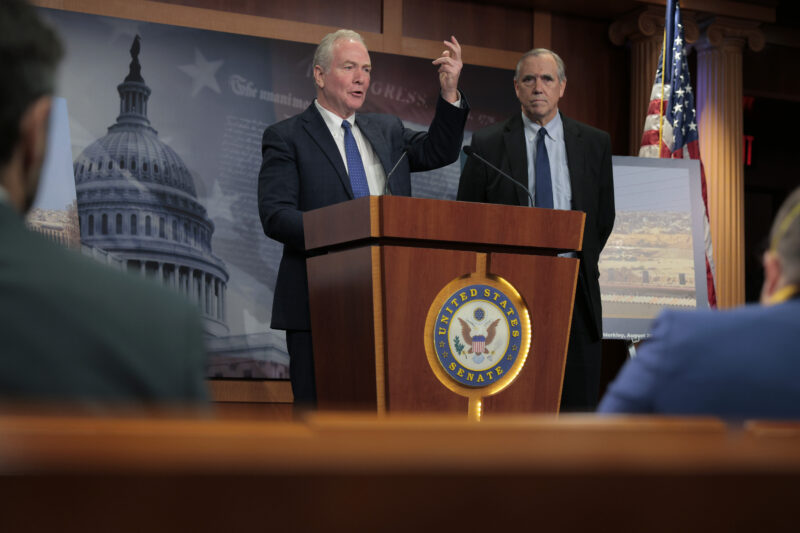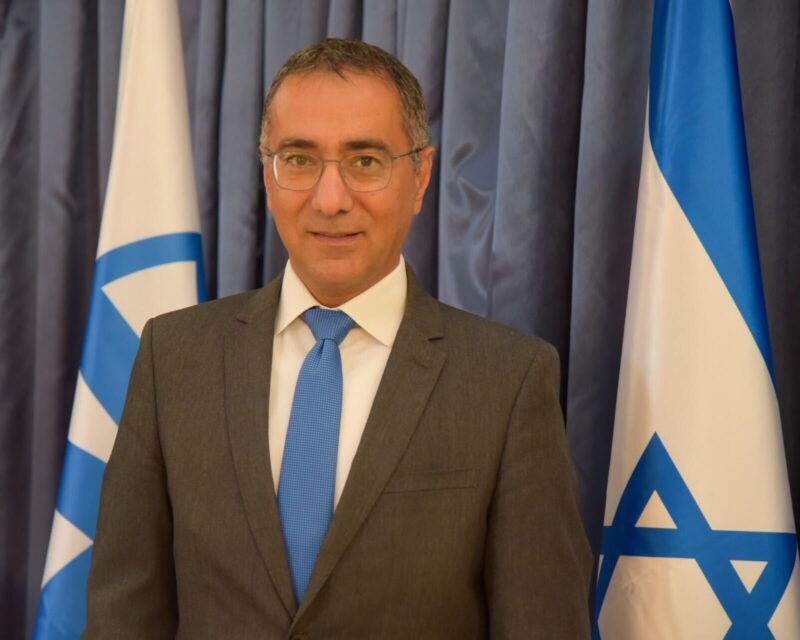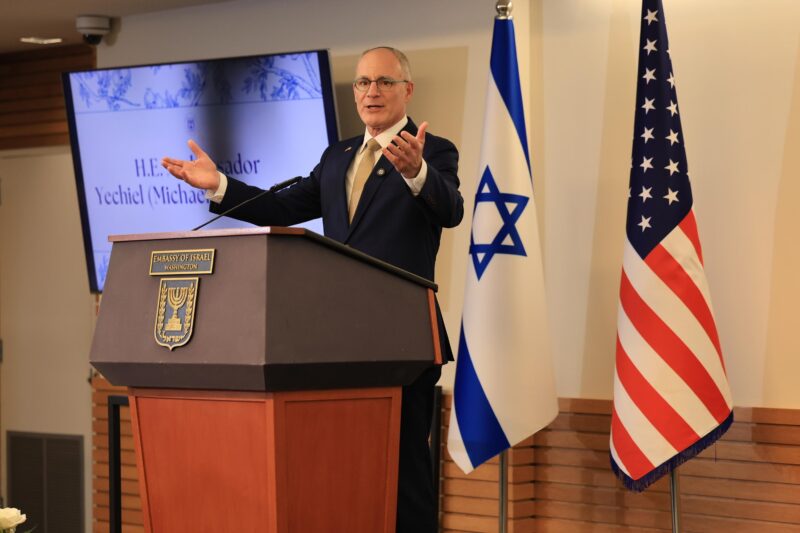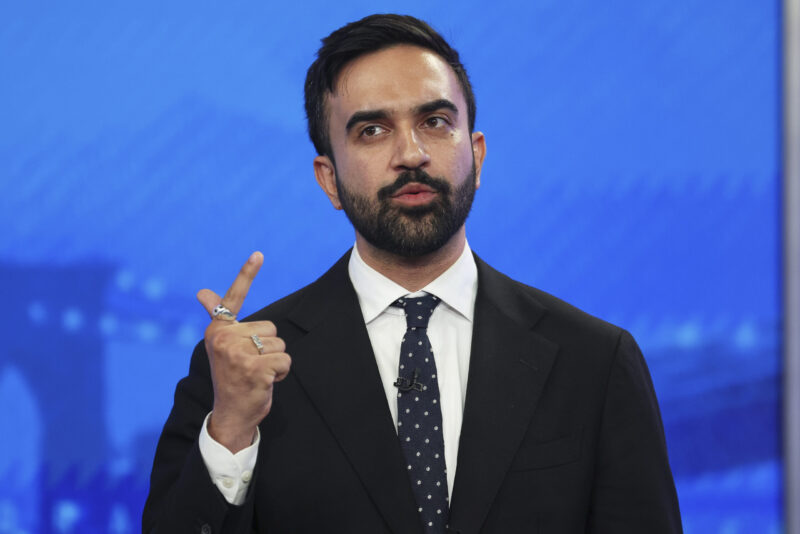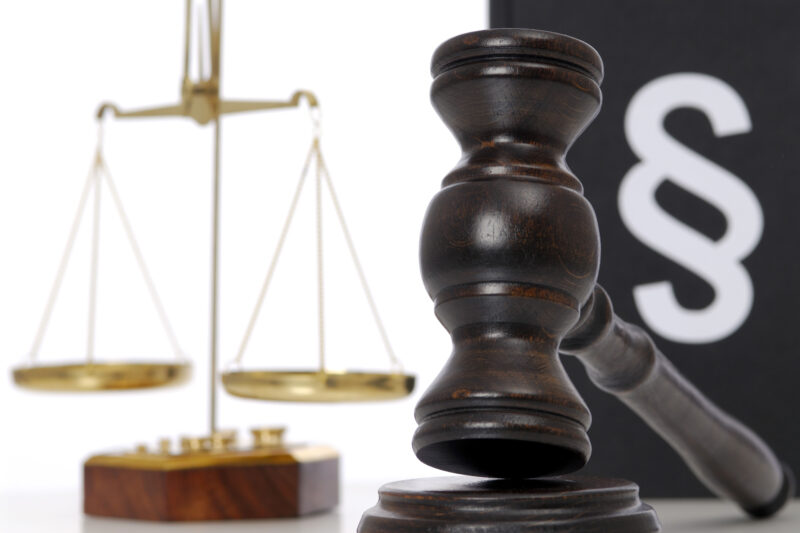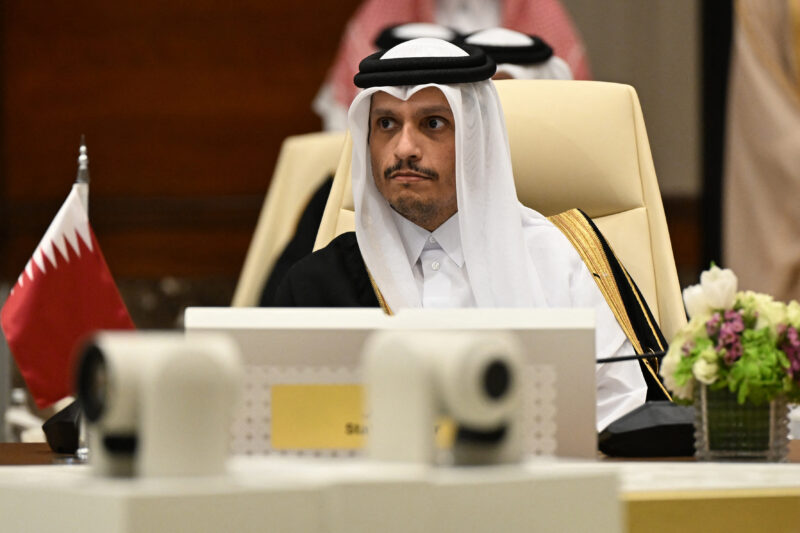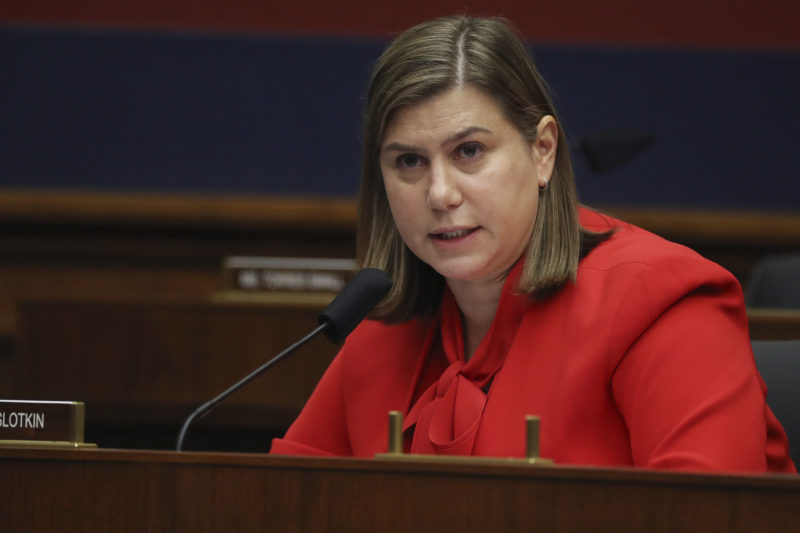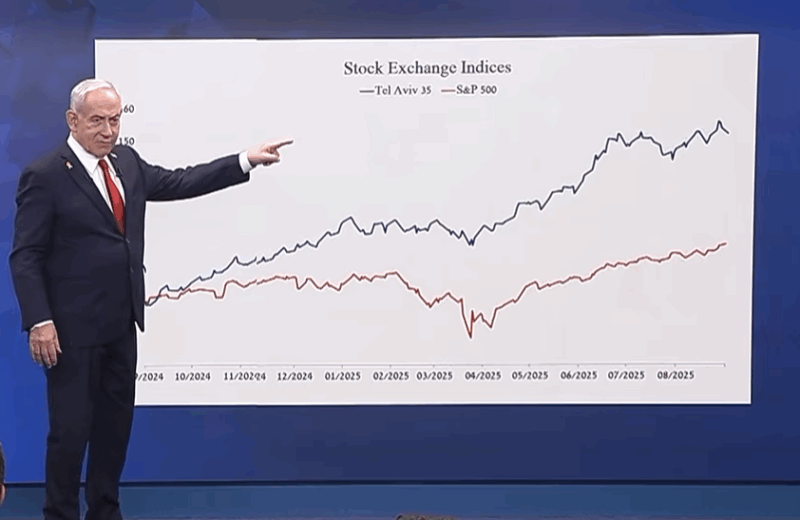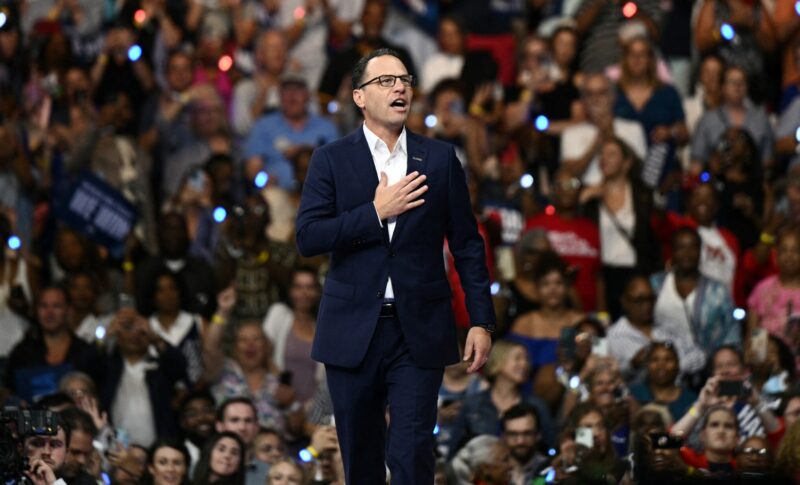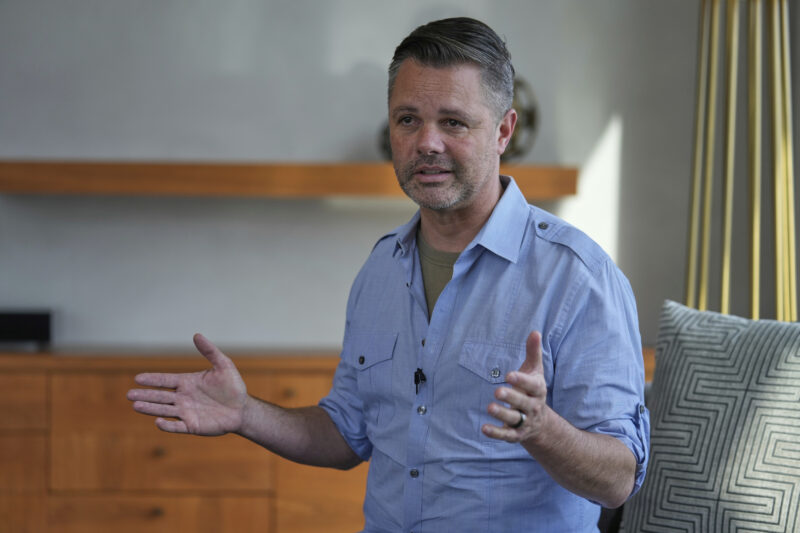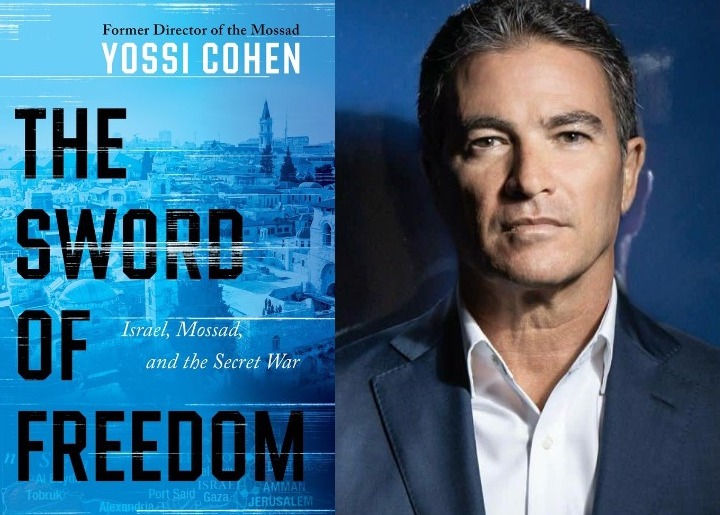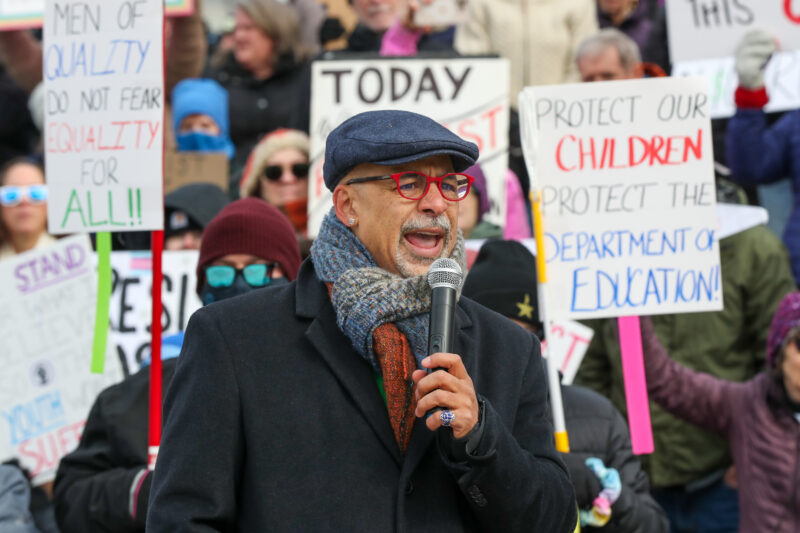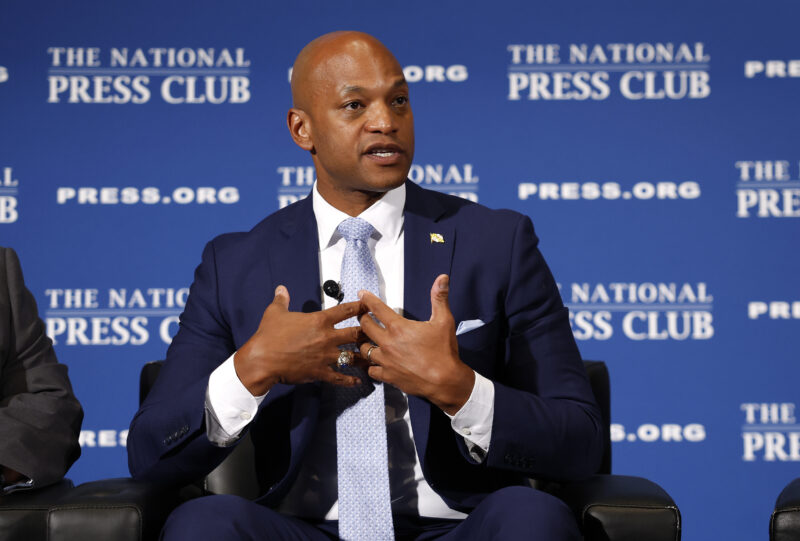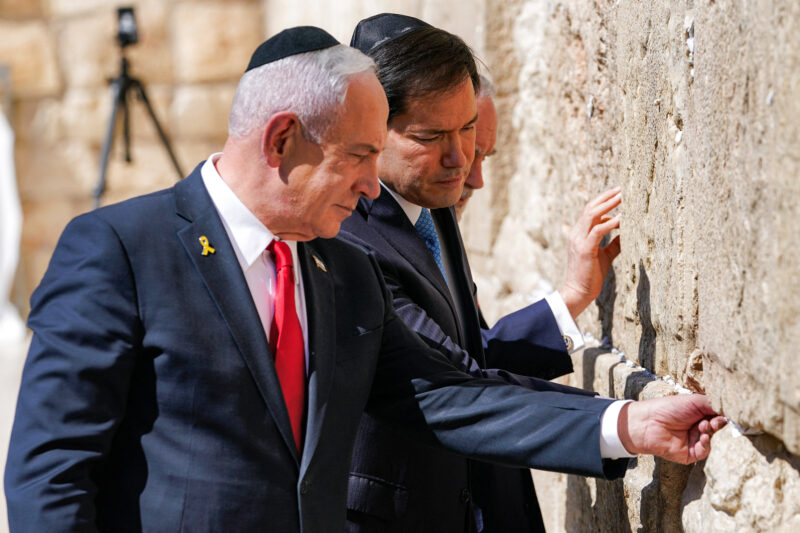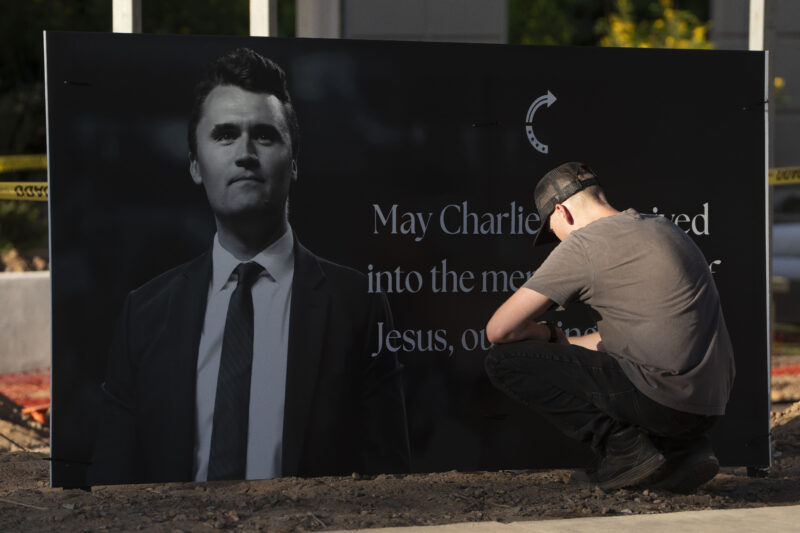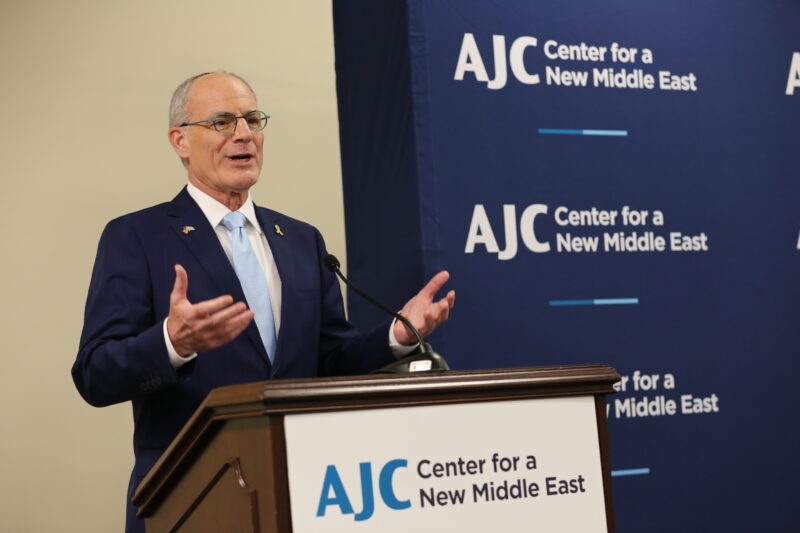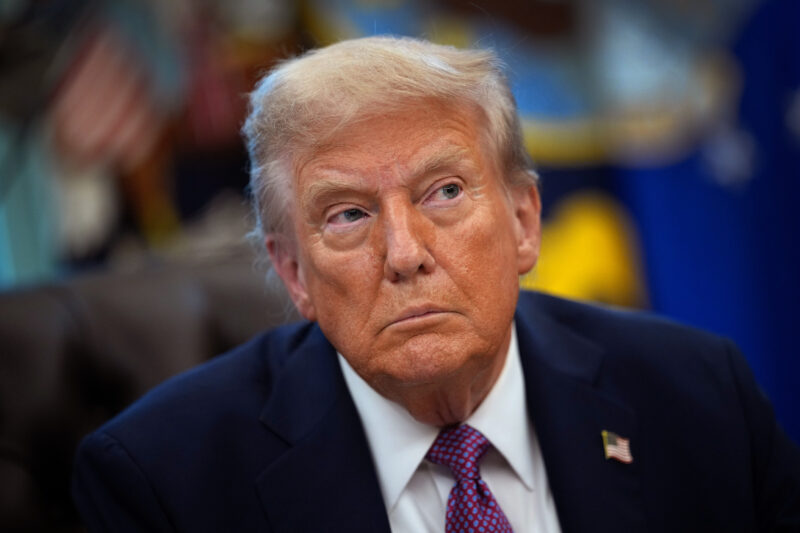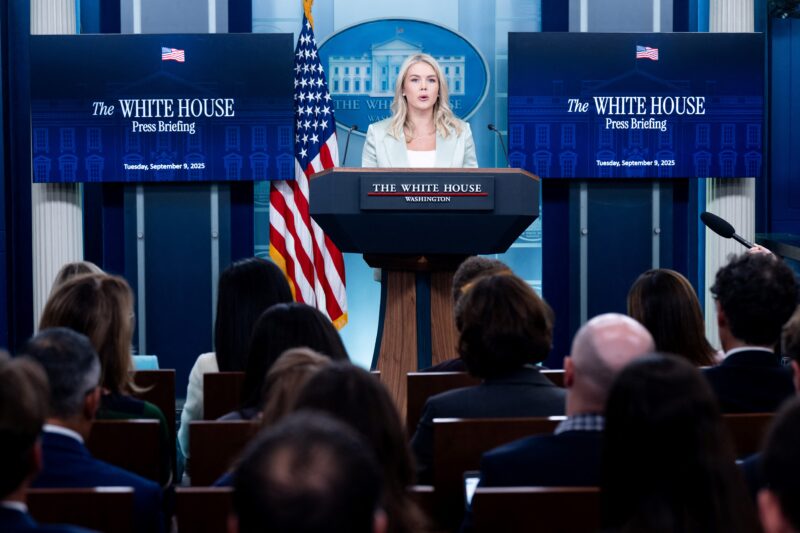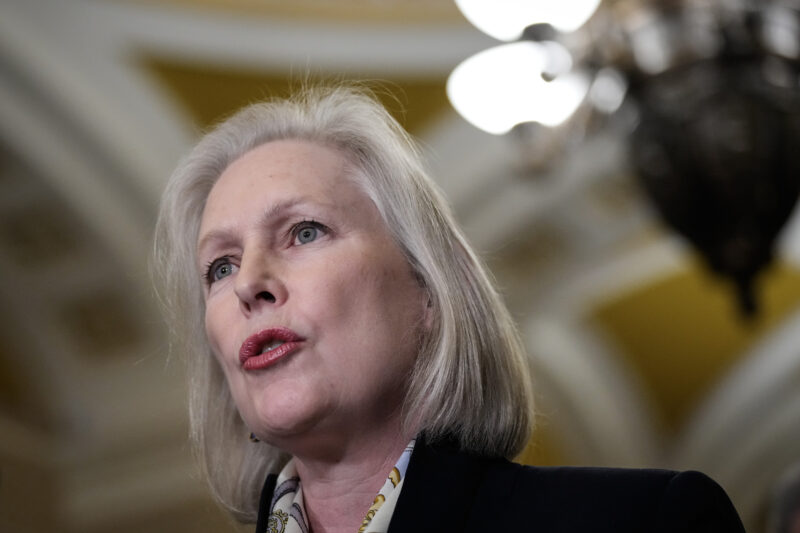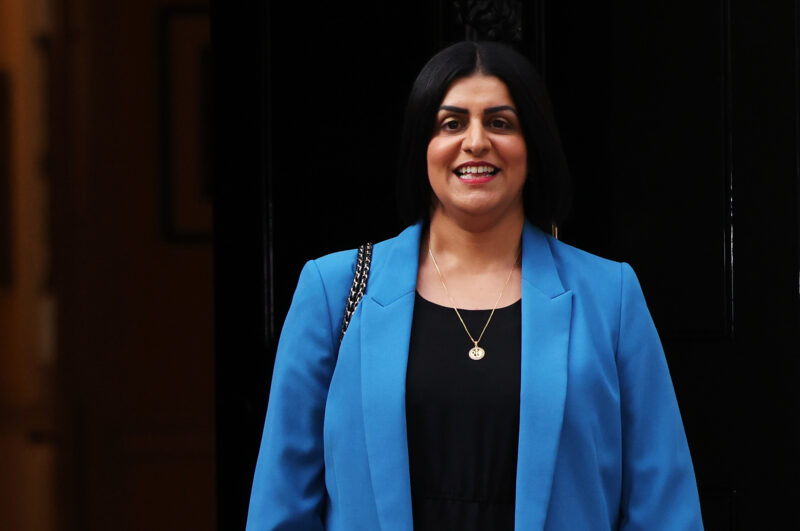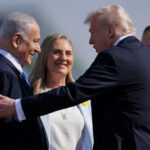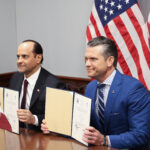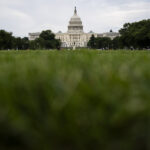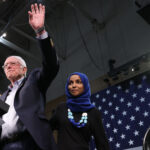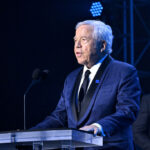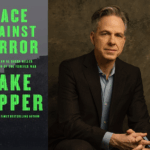Plus, Trump delivers historic Knesset speech

Hostages Family Forum
Captivity survivor Omri Miran arrives at Ichilov Hospital and waves to his family
Good Monday morning!
In today’s Daily Kickoff, we report on the release this morning of the 20 remaining living Israeli hostages, and preview President Donald Trump’s speech to the Knesset. We talk to historian Pamela Nadell about her new book about antisemitism, and look at the race taking shape in Tennessee between Rep. Steve Cohen and state legislator Justin Pearson. Also in today’s Daily Kickoff: Patrick Dumont, Zeev Buium and Ben Shapiro.
Ed. note: The next Daily Kickoff will arrive in your inbox on Thursday. Chag Sameach!
Today’s Daily Kickoff was curated by Jewish Insider Executive Editor Melissa Weiss and Tamara Zieve with assists from Marc Rod and Danielle Cohen-Kanik. Have a tip? Email us here.
What We’re Watching
- We’re following today’s events as they unfold in Israel, following the release this morning of the remaining living hostages and President Donald Trump’s arrival in the country. Trump will travel to Sharm el-Sheikh, Egypt, later today for a signing ceremony that will be attended by officials from around the world. Israeli Prime Minister Benjamin Netanyahu declined an invitation extended earlier today by Egyptian President Abdel Fattah el-Sisi, citing the Simchat Torah holiday, which begins this evening in Israel.
What You Should Know
A QUICK WORD WITH MELISSA WEISS AND TAMARA ZIEVE
It was the day that Israelis have waited for after more than two years — or two years exactly by the Hebrew calendar. Thousands had already assembled by dawn at Tel Aviv’s Hostages Square, where some had slept overnight, for the release of the last remaining hostages known to be alive. Shortly after 8 a.m., the first seven hostages — Omri Miran, Matan Angrest, Ziv Berman, Gali Berman, Guy Gilboa-Dalal, Alon Ohel and Eitan Mor — were released to Red Cross custody.
The song “Habayta,” meaning “home,” the unofficial anthem of the hostage families, played over a montage of photos of the 47 men and one woman who have spent the last 738 days in captivity — a scene that has repeated itself in the square every Saturday night for two years.
Israeli networks split coverage between the live festivities across the country, in-studio reporting and interviews with hostage families and former hostages. Former hostage Emily Damari called into Israel’s Channel 12 upon the release of her neighbors and friends, twins Zvi and Gali Berman, and said the Shehecheyanu prayer giving thanks — a prayer also recited by the thousands thronging in and around Hostages Square. The crowd erupted in joy at the sight of the two brothers being reunited.
By midday, the 20 living hostages — also including Avinatan Or, Bar Kupershtein, Ariel and David Cunio, Eitan Horn, Elkana Bohbot, Evyatar David, Maksym Harkin, Matan Zangauker, Nimrod Cohen, Rom Braslavski, Segev Kalfon and Yosef-Chaim Ohana — were on Israeli soil.
The first images of the men trickled out over the course of the morning: Miran, flanked by his wife and father, wearing a shirt with artwork by his two young daughters; the Berman twins in Maccabi Tel Aviv jerseys; Ohel, pale but smiling and standing on his own, with sunglasses to protect his damaged eyes.
In contrast to previous hostage release, as dictated by the agreement, there were no propaganda ceremonies staged by Hamas as they handed over the captive Israelis. Instead, Hamas made video calls to the hostages’ relatives, who spoke to their loved ones as they stood beside their masked and uniformed captors.
Amid the hostage releases, President Donald Trump descended from Air Force One to the tarmac at Ben Gurion Airport on Monday morning, where he was greeted by Prime Minister Benjamin Netanyahu and President Isaac Herzog. White House Special Envoy Steve Witkoff, Jared Kushner and Ivanka Trump — who spoke at Saturday night’s hostage rally in Tel Aviv. Read our coverage of their speeches at the rally here.
Signing the Knesset’s guestbook after his arrival, Trump wrote, “This is my great honor — a great and beautiful day, a new beginning.”
With the release of the last living hostages, and later today the remains of four of the 28 deceased hostages, Israel will begin the process of releasing close to 2,000 Palestinian prisoners in accordance with the first phase of the deal. After that, attention will turn to negotiations surrounding the deal’s second phase.
After addressing the Knesset, Trump will travel to Sharm el-Sheikh, Egypt, for a signing ceremony that will also include Palestinian Authority Mahmoud Abbas. Trump’s speech was delayed due to a call with Egyptian President Abdel Fattah el-Sisi, who extended an invitation to Netanyahu to join the ceremony. Netanyahu’s office released a statement saying that the prime minister thanked Trump for the invitation, but won’t be able to participate due to the close timing with the beginning of the Simchat Torah holiday this evening.
In Israel, it has been a day of celebration after two years of pain, longing, fear, anxiety. It was the first time in two years that Israelis were able to wholeheartedly greet each other with ‘chag sameach‘ — a greeting that took on a double meaning on the eve of Simchat Torah, which begins this evening.
But the day will take a heavier turn this afternoon when the remains of just four of the deceased hostages are expected to be returned to Israel, bringing a combination of pain and closure to their loved ones who will finally be able to give them a proper burial. Meanwhile, the 24 other hostage families — who were shocked to learn this afternoon of the low number of bodies that will be released — will be left waiting for the remains of their loved ones to be located and returned home. The Hostages Families Forum called the development a “blatant breach of the agreement by Hamas,” and called on the Israeli government and the mediators to “take immediate action to rectify this grave injustice.”
TRUMP’S TALK
President Trump receives hero’s welcome as hostages return to Israel
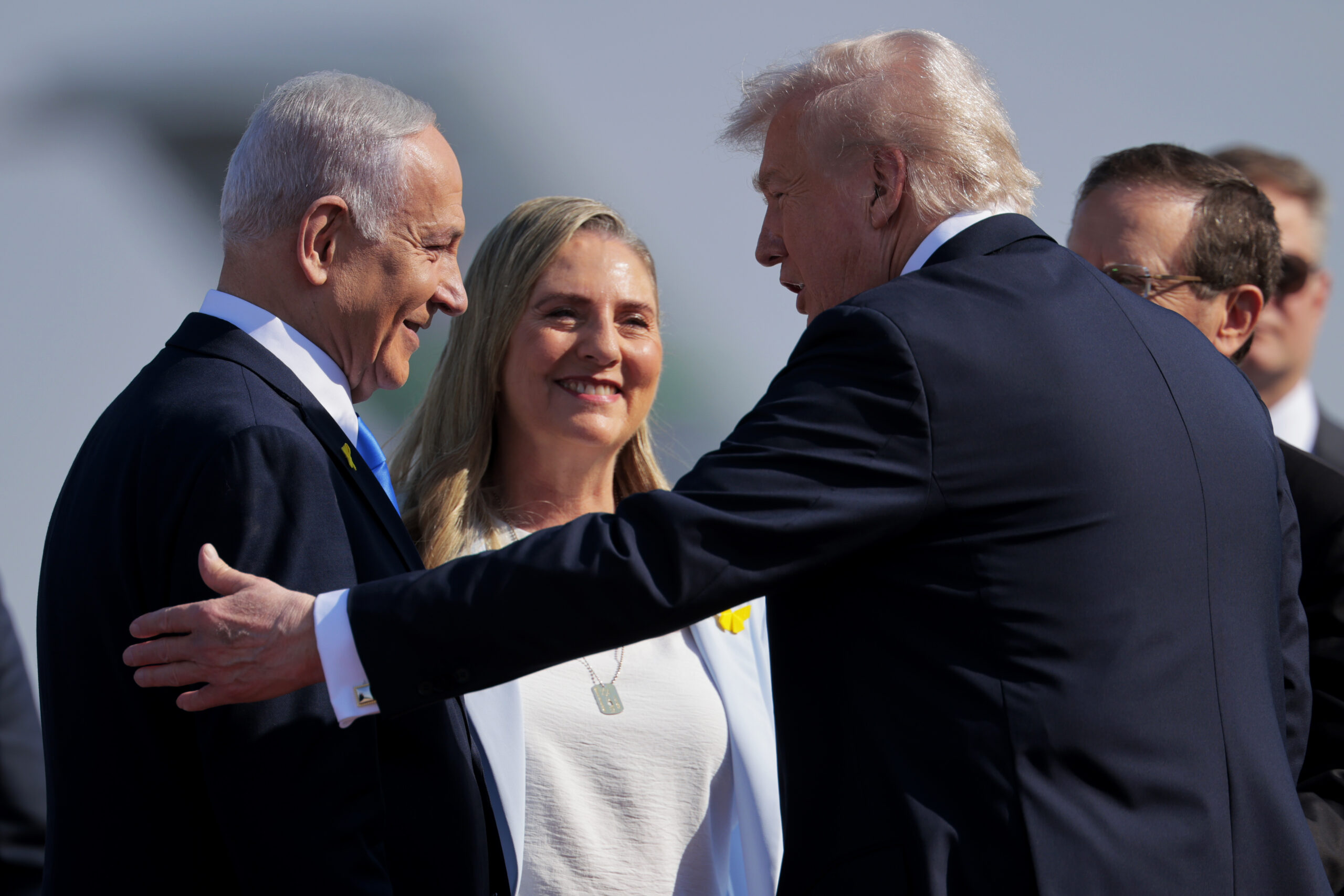
President Donald Trump gave a victory speech in the Knesset as the final 20 living hostages returned to Israel from Gaza on Monday, in accordance with the first phase of his plan to end the war, Jewish Insider‘s Lahav Harkov reports.
Live from Israel: Israeli television stations showed a live screen, with Air Force One landing at Ben Gurion Airport on one side, and IDF vehicles carrying freed hostages Eitan Mor, Gali and Ziv Berman, Matan Angrest, Omri Miran, Guy Gilboa-Dalal and Alon Ohel to their families on the other. Trump was given a hero’s welcome in the Knesset, where he was met with an honor guard and current and former lawmakers gave him a lengthy standing ovation. “The hostages are back – it feels so good to say it!” Trump said.
Tennessee tackle
Rep. Steve Cohen draws younger, far-left challenger hostile to Israel in primary
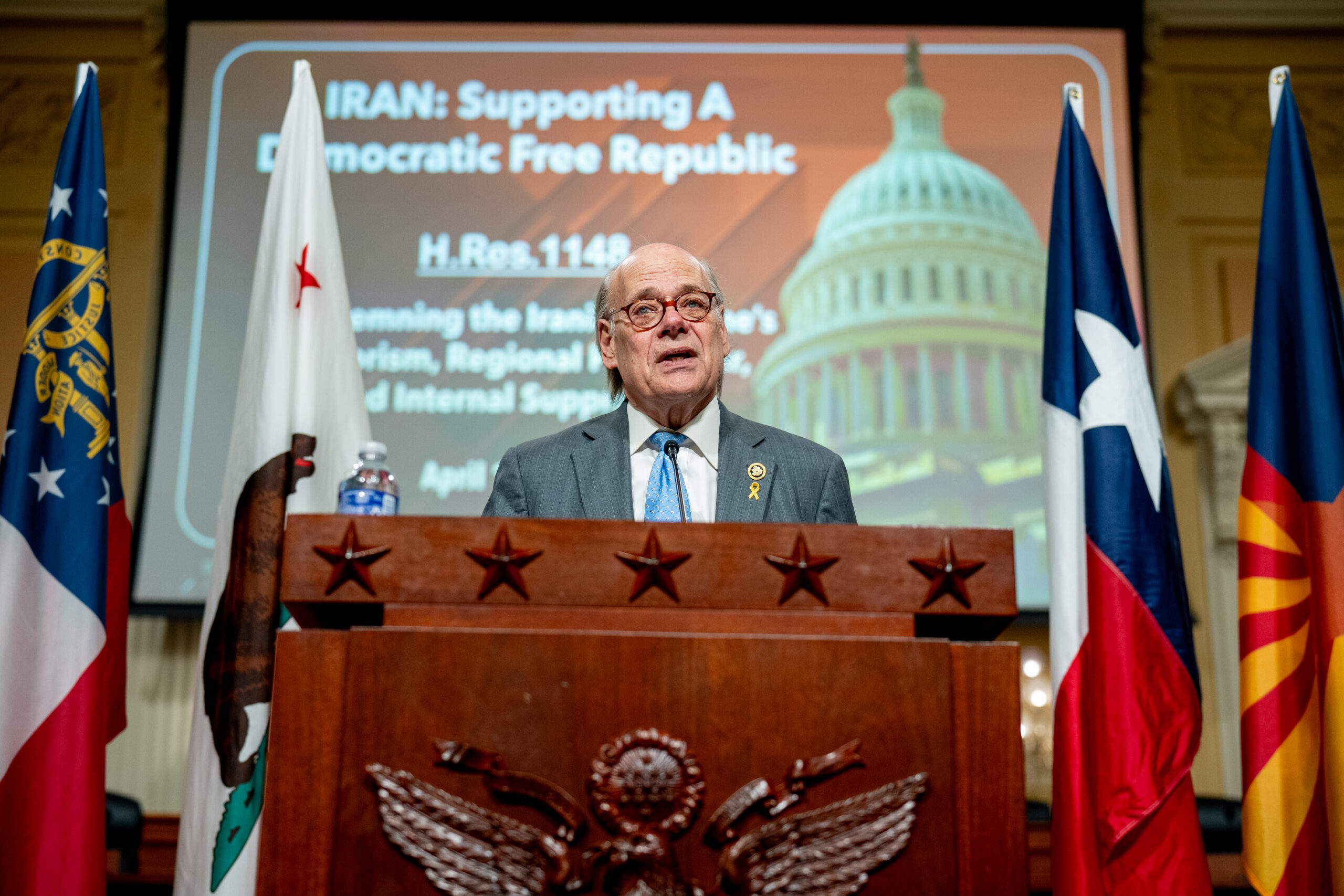
Rep. Steve Cohen (D-TN), a 10-term congressman from Memphis, Tenn., has long occupied a unique position in U.S. politics. The 76-year-old lawmaker, who became Tennessee’s first Jewish member of the delegation when he took office in 2007, is the only Democratic House member in his solidly conservative state. And as the lone white member of either party to represent a majority-Black district, Cohen has also managed to deftly navigate a delicate racial dynamic in his district, only facing occasional primary challenges from Black challengers. Through it all, he has been a political powerhouse in Memphis, holding onto his seat by building a broad and diverse coalition of support. Now, he is facing what could be his biggest test in years as he prepares to go up against a formidable new challenger in the 2026 primaries, at a moment when some veteran Democratic House members are under growing pressure from a crop of younger opponents who are pushing for generational change to revive the party’s declining image among younger, disillusioned voters, Jewish Insider’s Matthew Kassel reports.
New competition: Justin Pearson, a Democratic state legislator from Memphis who rose to national prominence in 2023 when he and a fellow Black colleague were expelled from the Tennessee General Assembly for leading a gun control protest on the House floor, announced last week that he would challenge Cohen in what is shaping up to be a bitterly contested and expensive primary, highlighting differences over identity as well as hot-button issues such as Israel and the war in Gaza.
BOOKSHELF
Jewish studies scholar argues modern-day antisemitism akin to 1950s-era discrimination in new book
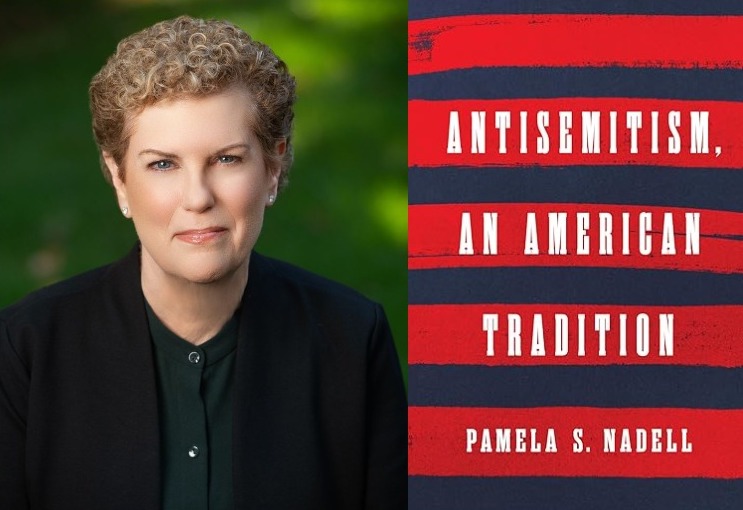
Historian Pamela Nadell is very familiar with the rituals of publishing a book, as she has written nine of them: Secure a release date, present at academic conferences, maybe headline a handful of general-public events. Although she is at the forefront of her field at American University — chair in Women’s and Gender History, director of the Jewish studies program and former president of the American Jewish Historical Society — Nadell knows that success in academia does not often translate to strong book sales. Things appear to be different for her latest book, Antisemitism: An American Tradition, Jewish Insider’s Gabby Deutch reports.
Pertinent timing: Nadell began to understand how much interest a book on antisemitism would generate when her publisher assigned a full-time publicist to promote the book, which will be published on Oct. 14. Nadell is booked at speaking engagements across the country into 2027, starting with an event at the Washington bookstore Politics and Prose next week. The book that she began researching six years ago will now appear on bookshelves at a time when antisemitism has reached record levels since the Anti-Defamation League began tracking data in 1979. “I had hoped, frankly, that the subject would be seen as a historic subject by the time [the book] came out into the world,” Nadell told JI in a recent interview. “And that’s absolutely not the case.”
DOHA DEALINGS
Hegseth signs deal to open Qatari Air Force facility in Idaho
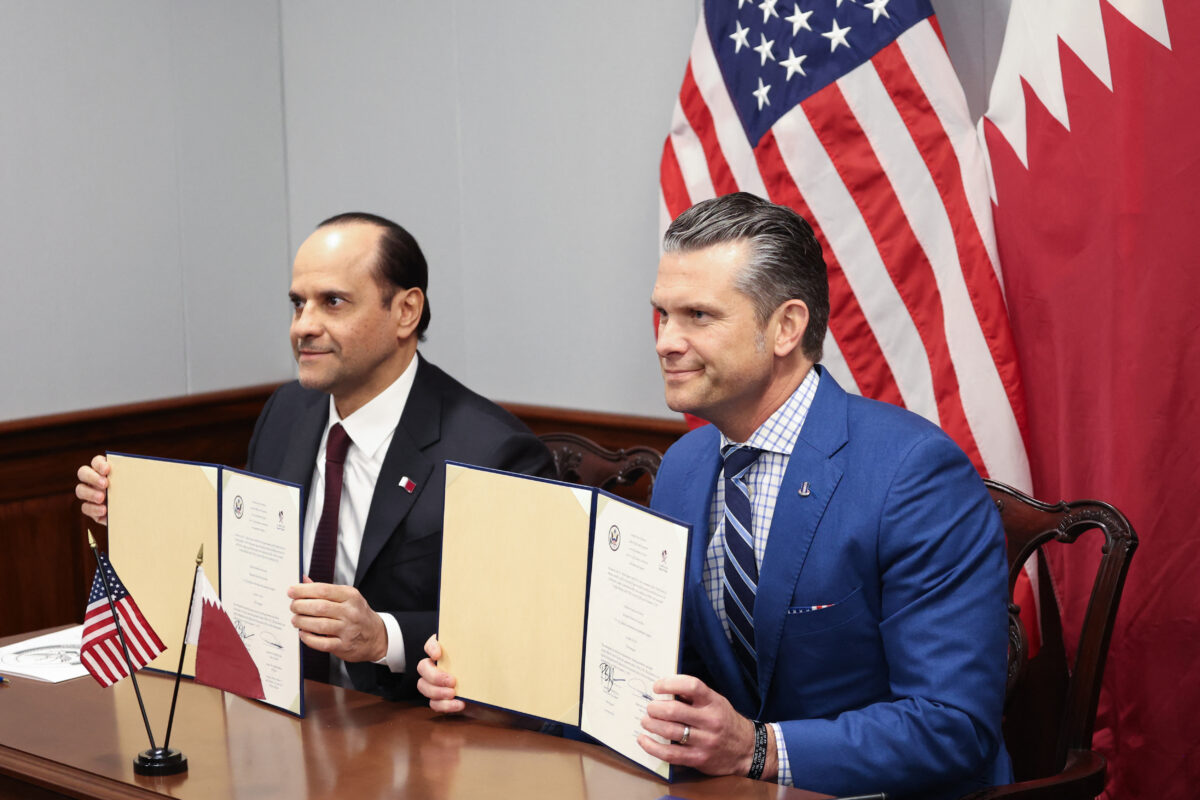
Secretary of Defense Pete Hegseth, in a Pentagon meeting with Qatari Defense Minister Saoud bin Abdulrahman Al Thani on Friday, signed a deal to open a Qatari Air Force facility at the U.S. Mountain Home Air Force Base in Idaho, Jewish Insider’s Marc Rod reports. Facing swift backlash, Hegseth clarified that under the terms of the agreement, “Qatar will not have their own base in the United States — nor anything like a base. We control the existing base, like we do with all partners.”
Broad opposition: The deal has elicited criticism from voices as wide-ranging as Trump ally and far-right influencer Laura Loomer and Democratic National Committee Chairman Ken Martin. “An economic bailout for Argentina. An air force base for Qatar. This guy is doing everything but putting America first,” Martin said, a sentiment echoed by the DNC’s vice chair, Malcolm Kenyatta. Loomer wrote a spree of X posts lambasting the deal, framing it as the vanguard of a Muslim Brotherhood invasion of Idaho and the United States, a threat to national security, a precursor to a potential terrorist attack and the harbinger of the downfall of Western civilization. “Now that the GOP has decided to literally harbor Islamic terrorists on US soil, I don’t really care about fighting for Republicans as much as I did yesterday. I have lost hope for 2026 and 2028 to be totally honest,” Loomer said.
ROLE REALIZED
Senate confirms Trump pick to lead civil rights division at Education Dept.

The Senate voted this week to confirm Kimberly Richey as the assistant secretary for civil rights at the Education Department, eight months after President Donald Trump named her to the role. The Education Department’s Office for Civil Rights, which Richey will lead, is responsible for overseeing investigations into antisemitism at American schools and universities. The Trump administration laid off more than half of the division’s investigators earlier this year, sparking sharp criticism from congressional Democrats, Jewish Insider’s Gabby Deutch reports.
Background: Richey previously served in the same role on an interim basis for the final months of Trump’s first term. For much of that administration, she was deputy assistant secretary of the office that oversees special education issues. She first worked at the Education Department in the George W. Bush administration after being hired by Ken Marcus, now the chairman of the Louis D. Brandeis Center for Human Rights Under Law. Richey comes to Washington from Florida, where she had been serving as senior chancellor for Florida’s Department of Education. Before that, she was deputy superintendent of the Virginia Department of Education.
HILL TALK
Senate moves toward repeal of Caesar Act Syria sanctions in defense bill

The Senate approved the repeal of strict sanctions legislation targeting the now-deposed Assad regime in Syria, as part of its version of the 2026 National Defense Authorization Act, Jewish Insider’s Marc Rod reports.
State of play: The chamber also passed, as part of a bipartisan package of amendments, an amendment led by Sens. Lindsey Graham (R-SC) and Chris Van Hollen (D-MD) — opposed by some Syrian-American activists — that requires regular reports to Congress certifying Syria’s compliance with a variety of U.S. priorities and urges the administration to reimpose sanctions if such verification cannot be completed. The House version of the NDAA does not include a similar provision, so whether the sanctions repeal is included in the final bill, and in what form, will be subject to negotiations between the two chambers.
Worthy Reads
The Families’ Fight: The Free Press’ Matti Friedman reflects on the successes of the movement to free the hostages juxtaposed with the realities of war. “On the day of the Hamas massacres, which ravaged swaths of southern Israel and killed nearly 1,200 people, Israelis saw their feeling of security shattered, along with their faith in their leadership and army and in the basic promise that the helpless chapters of Jewish history had ended conclusively with the founding of the state of Israel. This rupture required psychological repair, and this became inseparable, for some, from the hostages’ return. ‘The slogan ‘Bring Them Home,’ rather than ‘Give Them Back,’ the fact that it’s directed inward, gets at the idea that this is really about restoring our own place and our own agency, which is at the heart of Zionism,’ [Tal] Becker said when we spoke again Sunday. Another popular slogan, seen on bumper stickers and protest signs, reads Nachzir, nakum: ‘We’ll return them and rise.’ Those two acts are linked, the second predicated on the first.” [FreePress]
Sharabi’s Survival: The Atlantic’s Franklin Foer considers what he calls the “existential heroism” of the released Israeli hostages. “Unlike Sharabi, some of the hostages already surmised that they had lost their families in the massacre, shattering the most compelling why of them all. Yet that didn’t diminish their will to live. Despite being secular, they found solace in listening to an observant hostage, the son of a rabbinical scholar, recite the Jewish grace after meals. Like Odysseus, they trained their minds to relentlessly focus on home. ‘There is no more regular Eli,’ Sharabi told himself in his first days in Gaza. ‘From now on, I am Eli the survivor.’ That he clung to optimism in the face of despair wasn’t inevitable.” [TheAtlantic]
Campus Beat: In The New York Times, Danielle Sassoon, who resigned as interim U.S. attorney for the Southern District of New York earlier this year after she refused to drop charges against New York City Mayor Eric Adams, raises concerns about free speech and civil rights on college campuses. “Universities, no less than the professionals they teach, have an obligation to uphold civil dialogue as the bedrock of a functioning democracy. Administrators continue to overlook that this obligation means they must guarantee forums to explore a diversity of ideas safely and openly. … Students who object to policies of the Trump administration or oppose Israel’s war in Gaza or who advocate abortion rights rarely have to worry that their campus speakers will be disrupted by protesters or generate security concerns related to the backlash of a student mob. Security concerns, real or fabricated, arise when a speaker promises to buck campus orthodoxy. And that is precisely when universities need to stand up for debate rather than surrender to those who would stifle it.” [NYTimes]
What’s Next: In The Times of Israel, Alan Gross, who was held as a political prisoner in Cuba for five years and now lives part-time in Israel, considers how Israelis and Palestinians can rebuild in a post-war era. “Healing will not come from slogans or ceremonies. It will come — slowly, painfully — through remembrance, accountability, and the rebuilding of trust where it has been shattered. It requires rejecting the easy narratives that divide “us” from “them,” and insisting instead on empathy — for our own people, yes, but also for those on the other side who have also lost children, parents, and homes. Too many of us already know what it means to wake up each day in a world changed by violence. Yet it is precisely in that fragile act of continuing — of refusing to surrender our humanity — that recovery begins.” [TOI]
Word on the Street
Leaked U.S. documents indicate that Arab countries quietly expanded their military cooperation with Israel in the last three years in what the U.S. called a “Regional Security Construct”…
The New York Times reports on a recently discovered handwritten memo from slain Hamas leader and Oct. 7 mastermind Yahya Sinwar authored weeks before the 2023 attacks that directed Hamas members to set fire to and destroy residential neighborhoods and communities; the memo contradicts claims by other senior Hamas officials that the terror group did not plan to attack civilian areas…
Conservative commentator Ben Shapiro raised concerns about the rise of “a conspiratorial right,” noting that social media users “get a lot more likes and clicks if you are promoting an anti-Israel, anti-Jewish agenda than if you are doing the opposite”…
The Atlantic published an excerpt from Rabbi Angela Buchdahl’s upcoming memoir detailing her conversations with a gunman who held a Texas synagogue hostage in January 2022…
The New York Times looks at the effort by Patrick Dumont, the son-in-law of Sands owner Miriam Adelson, to restore the relationship between the NBA and China, two years after relations soured following NBA executives’ pro-democracy social media posts…
The U.K. government directed universities in the country to crack down on campus antisemitism, with Education Minister Bridget Phillipson saying university administrators “have my full backing to use their powers” in “ridding their campuses of hate”…
French President Emmanuel Macron reappointed Sébastien Lecornu, who until last week served a brief stint as prime minister before resigning, to his role amid political and economic deadlock that has paralyzed the country…
Israeli American hockey player Zeev Buium scored his first NHL goal on Saturday against the Columbus Blue Jackets; Buium, a defenseman for the Minnesota Wild, is believed to be the first Israeli hockey player to ever score a goal in the NHL…
Pic of the Day

People celebrate in Tel Aviv’s Hostages Square on Monday morning as they watch a livestream of the release.
Birthdays
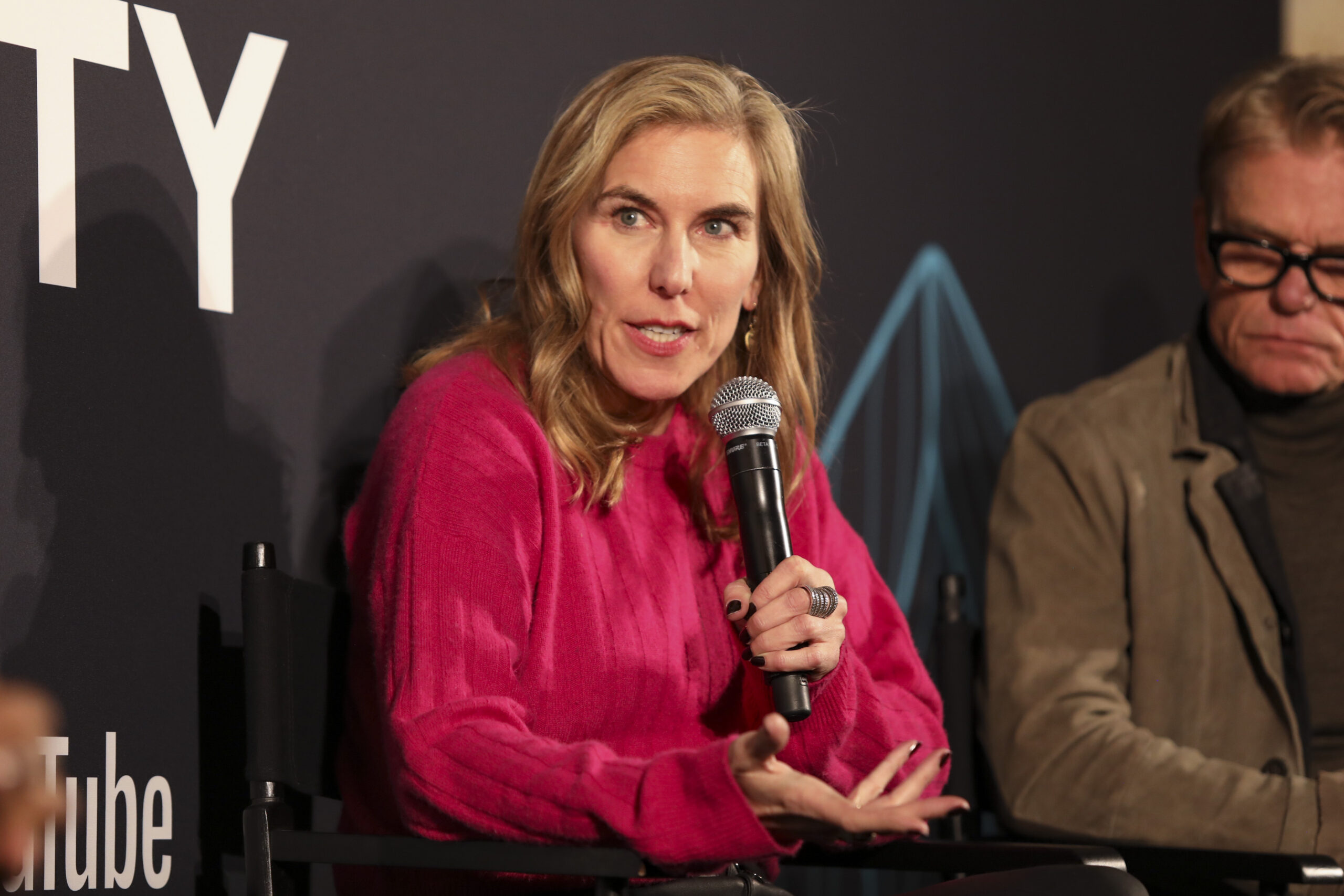
Emmy Award-winning film director, producer and screenwriter, Amy J. Berg turns 55…
Former deputy assistant secretary at the USDA, he retired in 2024 as an attorney working on organic food law, Richard D. Siegel turns 86… Musician, singer, songwriter, best known for his lead role in the Simon & Garfunkel duo, Paul Simon turns 84… Past chair of the Anti-Defamation League, Esta Gordon Epstein… Founder of PublicAffairs Books, an imprint of Perseus Books at Hachette Book Group, Peter L.W. Osnos turns 82… Author of 12 cookbooks, Mollie Katzen turns 75… U.S. senator (D-WA), Maria Cantwell turns 67… President of the Shalom Hartman Institute in Jerusalem, Rabbi Donniel Hartman turns 67… Former White House press secretary under President George W. Bush, now a media consultant and Fox News contributor, Ari Fleischer turns 65… Partner at FGS Global until 2024, Jack Krumholtz… Former Associated Press bureau chief for Israel and the Palestinian territories, now a home builder in the Indian state of Goa, Steven Gutkin… Second gentleman of the United States in the Biden-Harris administration, Douglas Emhoff turns 61… Co-chairman of Disney Entertainment where she is responsible for television and streaming, Dana Freedman Walden turns 61… Richard Lamke… Attorney general for England and Wales for parts of 2021 and 2022, he was a member of the U.K. Parliament for 14 years until 2024, Michael Ellis turns 58… Award-winning actor, comedian and screenwriter, Sacha Baron Cohen turns 54… Israeli fashion model, Shiraz Tal turns 51… Offensive lineman in the NFL for ten seasons (Broncos, Redskins, Bears and Browns), now the COO of Raleigh-based VetOvation, Leonard Lebrecht Friedman turns 49… Adjunct professor of Jewish studies at Ohio University and director of member engagement at the Academic Engagement Network, Sarah Livingston… Emily Gould… Jerusalem bureau chief for CNN, Oren Liebermann turns 43… Land-use attorney at Seattle-based firm of Hillis Clark Martin & Peterson, Joshua E. Friedmann… Political reporter for NBC News, Rebecca Shabad… Film director, producer and screenwriter, Jordan David “J.D.” Lifshitz turns 33…
Trump: ‘The people of America join you in those two everlasting vows: Never forget and never again’
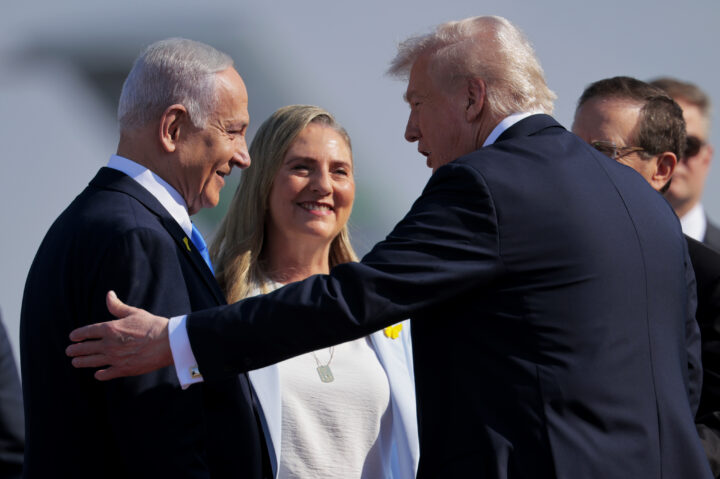
(Photo by Chip Somodevilla/Getty Images)
U.S. President Donald Trump (2R) is welcomed by Israeli Prime Minister Benjamin Netanyahu (L) at Ben Gurion International Airport on October 13, 2025 in Tel Aviv, Israel.
President Donald Trump gave a victory speech in the Knesset as the final 20 living hostages returned to Israel from Gaza on Monday, in accordance with the first phase of his plan to end the war.
Israeli television stations showed a live screen, with Air Force One landing at Ben Gurion Airport on one side, and IDF vehicles carrying freed hostages Eitan Mor, Gali and Ziv Berman, Matan Angrest, Omri Miran, Guy Gilboa-Dalal and Alon Ohel to their families on the other.
As Trump arrived at the Knesset, the Red Cross collected the other 13 living hostages: Elkana Bohbot, Rom Braslavski, Nimrod Cohen, Ariel Cunio, David Cunio, Evyatar David, Maxim Herkin, Eitan Horn, Segev Kalfon, Bar Kupershtein, Yosef-Chaim Ohana, Avinatan Or and Matan Zangauker.
Trump was given a hero’s welcome in the Knesset, where he was met with an honor guard and current and former lawmakers gave him a lengthy standing ovation.
“The hostages are back – it feels so good to say it!” Trump said.
In a speech that was over an hour long, the president declared that “today, the guns are calm, the sirens are still, and the sun rises on a Holy Land that is finally in peace, that will hopefully live — God-willing — in peace for all eternity.”
Trump said this marks “the historic dawn of a new Middle East,” and “an age of harmony for Israel and all the nations in the region.”
The president touted his success as a peacemaker, but added: “We’re not going to go into war, but if we do, we will win that war … I think Bibi [Netanyahu], as you mentioned, before, peace through strength, that’s what it’s all about.”
“Hamas will be disarmed and Israel’s security will no longer be threatened in any way, shape or form,” he vowed. “Israel, with our help, has won all they can, has won by force of arms. Now it’s time to transform that win … into peace and prosperity for the whole region. Time to enjoy the fruits of your labor.”
Trump said that “as we celebrate today, let us remember how this nightmare of depravity all began,” describing the Oct. 7, 2023 attacks. “Nobody could believe what they were witnessing. The USA grieved alongside you. … The people of America join you in those two everlasting vows: Never forget and never again.”
Trump expressed his appreciation for Israeli Prime Minister Benjamin Netanyahu, whom he called “a man of exceptional courage and patriotism.”
“He is not the easiest guy to deal with, but that’s what makes him great,” Trump added.
Trump said that Netanyahu had “the courage to say, ‘That’s it, we won, and we’re going to rebuild and make Israel stronger and greater than it has ever been before.’”
The Palestinians, Trump added, need to “concentrate on building their people up instead of trying to tear Israel down.”
“Israel, America and all the nations of the Middle East will soon be safer, greater and more prosperous than ever before,” Trump said, concluding his speech. “I love Israel. I’m with you all the way. You will be bigger, stronger and more loving than ever before. God bless you, God bless the United States of America, and God bless the Middle East.”
“You, President Donald J. Trump,” Knesset Speaker Amir Ohana said, “are a colossus who will be enshrined in the pantheon of history. The people of Israel will remember you. We are a nation that remembers … The world needs more Trumps.”
Netanyahu said that “this a momentous day, a day of great joy as the remaining hostages come home … At the beginning of the war, I promised to bring all the hostages home. Today, with the indispensable help … of President Trump and his team and with the incredible sacrifice and courage of the soldiers of Israel, we are fulfilling that promise.”
Trump and Netanyahu met with former hostages, the families of hostages, IDF soldiers wounded in action and victims of the Oct. 7 attacks at the Knesset.
Trump is expected to head to the Egyptian resort town of Sharm al-Sheikh later Monday, for a ceremony marking the end of the war in Gaza. Trump secured Netanyahu’s invitation while at the Knesset, calling Egyptian President Abdel Fatah al-Sisi before his speech, but Netanyahu declined, citing the Simchat Torah holiday.
Other expected attendees at the ceremony include Palestinian Authority President Mahmoud Abbas, French President Emmanuel Macron, U.N. Secretary-General António Guterres and the leaders of nearly three dozen countries.
Despite the celebrations on Monday and suggestions that the war was over, Hamas has been attempting to reestablish itself in the parts of Gaza from which the IDF withdrew, executing and battling its Palestinian opponents.
Israeli Defense Minister Israel Katz said that the IDF will continue to work to disarm Hamas and destroy its tunnels along with an international team overseen by the U.S.
Trump’s plan to end the war also includes replacing Hamas with a transitional government made up of Palestinians under the supervision of a “Peace Board” that he will lead and is expected to include former British Prime Minister Tony Blair, as well as deradicalization of the population of Gaza.
Hamas is expected to transfer four of the 28 bodies of hostages that remain in Gaza later Monday, according to the Hostages Families Forum, which described the low number as a “blatant breach of the agreement by Hamas.” Hamas has said it has been unable to locate all of them.
Close to 2,000 Palestinian prisoners were expected to be released later Monday, including 250 terrorists, many of whom were serving life sentences, and 1,700 arrested after the Oct. 7, 2023 attacks on Israel.
Among those being released are Hilmi Abdul Karim, who bombed a bus in Jerusalem, killing 11, Mouad Badr Abdallah Da’is, who murdered mother of six Dafna Meir, and others.
Kushner, Witkoff join Israeli Cabinet meeting
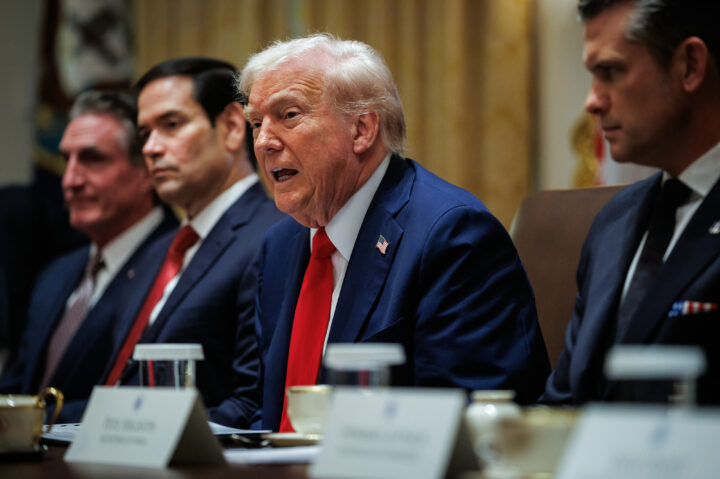
Samuel Corum/Sipa/Bloomberg via Getty Images
President Donald Trump during a Cabinet meeting at the White House in Washington on Oct. 9, 2025.
Good Thursday afternoon.
This P.M. briefing is reserved for our premium subscribers like you — offering a forward-focused read on what we’re tracking now and what’s coming next.
I’m Danielle Cohen-Kanik, U.S. editor at Jewish Insider and curator, along with assists from my colleagues, of the Daily Overtime briefing. Please don’t hesitate to share your thoughts and feedback by replying to this email.
📡On Our Radar
Notable developments and interesting tidbits we’re tracking
President Donald Trump heaped praise on the leaders of Qatar, Egypt, Saudi Arabia, Turkey and Indonesia at a Cabinet meeting at the White House today, lauding them as key parties responsible for getting Israel and Hamas to agree to the first phase of his peace plan for the region, Jewish Insider’s Emily Jacobs reports.
Trump also confirmed in his remarks that his team is organizing a Mideast trip for him to commemorate the deal, which would include stops in Egypt and Israel, where he’s been invited to address the Knesset.
The president said he is planning to depart from Washington on Sunday and hopes to time his trip to be there when the remaining hostages are released, which he said will happen on Monday or Tuesday. That’s later than some reports which speculated they could be returned to Israel as soon as this weekend…
Israeli and Hamas negotiators signed the final draft of phase one of the deal in Egypt today, and the Israeli Cabinet is now meeting to vote to approve it.
Former Mideast envoy Jared Kushner and current envoy Steve Witkoff joined the Cabinet meeting in Jerusalem, coming off of negotiations in Egypt and having already met with Israeli President Isaac Herzog and Prime Minister Benjamin Netanyahu.
The deal is expected to be approved, despite statements from National Security Minister Itamar Ben-Gvir and Finance Minister Bezalel Smotrich that their parties will oppose it. The meeting, as well as an earlier Security Cabinet briefing, were delayed after Ben-Gvir demanded to retain a veto on the release of specific Palestinian prisoners in the exchange, according to Israeli media…
Preparations are underway for Trump’s brief visit, with the Knesset lit up today in red, white and blue and the King David Hotel reportedly getting ready to boot out guests staying in the luxury lodgings for Sukkot to accommodate the president and his entourage…
Anti-Israel Democratic lawmakers offered tepid support for the deal throughout the day, while reiterating their strident criticisms of Israel, JI’s Marc Rod reports.
Sen. Bernie Sanders (I-VT) didn’t explicitly praise the deal but said he hopes it will lead to the end of a “horrific war.” He made no mention of the Israeli hostages set to be released, but asserted one-tenth of the Gazan population was killed or injured during the war. Read more reactions from lawmakers here…
Joining the pack, New York City Democratic mayoral nominee Zohran Mamdani told a local radio station today that he hopes the deal is “lasting” and “brings peace” but that it shouldn’t erase “Hamas’ horrific war crime on Oct. 7 … and the Israeli government’s horrific war crimes since then”…
The Atlantic Council’s Ahmed Fouad Alkhatib, who grew up in Gaza, writes in The Free Press about the “self-styled peace activists” in the West denouncing the peace deal as a “colonial attempt to continue the genocide” who have “little understanding or interest in how dealmaking works.”
“One of the first steps to freeing Palestinians from the horrors of war is to free them from the ‘Free Palestine Movement’ in the diaspora and Western world. The unholy alliance between the far left, far right, and Islamist hooligans who normalize Hamas’s narrative is harmful first and foremost to the Palestinian people,” Alkhatib argues…
In her first week as editor-in-chief of CBS News, The Free Press founder Bari Weiss reportedly told staff today that former secretaries of state Hillary Clinton, Antony Blinken and Mike Pompeo have agreed to appear on a Middle East roundtable on the network…
The New York Times profiles Jewish stand-up comedian Mordechi Rosenfeld, known as Modi, who has a “personal mantra that guides his comedy: ‘Moshiach energy’ … For Mr. Rosenfeld, the slogan reflects a Messianic idea inspired by the last leader of the Chabad-Lubavitch Orthodox movement, Rabbi Menachem Mendel Schneerson. Mr. Rosenfeld interprets it as a mandate to pour positive energy into the world to help bring the Messiah”…
⏩ Tomorrow’s Agenda, Today
An early look at tomorrow’s storylines and schedule to keep you a step ahead
Keep an eye on Jewish Insider tomorrow morning for reporting on the Senate’s agreement, which had been stalled for weeks, to move toward passage of the 2026 National Defense Authorization Act today.
Tomorrow, NOTUS will host a virtual event on “Mapping the New Global Order” with former Secretary of Defense Chuck Hagel and Reps. Don Bacon (R-NE) and Jason Crow (D-CO).
Over the weekend, we’ll be keeping an eye on President Donald Trump’s travels to the region and engagement with Israeli officials, as well as developments in the hostage-release process.
In observance of Shemini Atzeret and Simchat Torah, we’ll be back in your inbox with the Daily Overtime on Thursday. Chag Sameach and Shabbat Shalom!
Stories You May Have Missed
TWO YEARS
How Oct. 7 changed the world — two years later

Five reflections on how Oct. 7 reshaped politics, diplomacy, advocacy, higher ed, and Jewish life
FILM IN FOCUS
‘A story about family’: Noam Tibon, director Barry Avrich reflect on ‘The Road Between Us’ premiere

Tibon told JI that the documentary’s eventual debut, despite significant roadblocks, was ‘a victory for the movie and a victory for the truth of what happened on Oct. 7’
The president said hostages will be released Monday or Tuesday, confirmed his team working on a weekend trip to Egypt and Israel

Samuel Corum/Sipa/Bloomberg via Getty Images
President Donald Trump during a Cabinet meeting at the White House in Washington on Oct. 9, 2025.
President Donald Trump heaped praise on the leaders of Qatar, Egypt, Saudi Arabia, Turkey and Indonesia on Thursday, lauding them and members of his administration as key parties responsible for getting Israel and Hamas to agree to the first phase of his peace plan for the region.
“I want to express my tremendous gratitude to the leaders of Qatar, Egypt and Turkey for helping us reach this incredible day and for being there. They were there with us all the way. And of course, as you know, Saudi Arabia and Jordan and so many,” Trump said during a Cabinet meeting at the White House. “I will tell you, [Turkish] President [Recep Tayyip] Erdoğan was personally involved in dealing with Hamas and some of the others. He’s been great. They’ve all been really amazing. Indonesia has been amazing. Indonesia has been fantastic.”
“The whole world has come together for this, people that didn’t get along, people that didn’t like each other, neighboring countries that, frankly, didn’t like each other,” he continued.
The president confirmed in his remarks on Thursday that his team was working on organizing a Mideast trip for him to commemorate the deal, which would include stops in Egypt and Israel, where he has been invited to address the Knesset.
He said he plans to depart from Washington on Sunday and is considering the timing of the release of the hostages in his plans. “They should be released on Monday or Tuesday. … That’ll be a day of joy. I’m gonna try and make a trip over,” Trump said. “We’re planning on leaving sometime Sunday,” he added later.
Regarding the U.S. officials involved in the deal, Trump credited Vice President JD Vance; White House Chief of Staff Susie Wiles; Secretary of State Marco Rubio; Secretary of Defense Pete Hegseth; Middle East envoy Steve Witkoff; Jared Kushner, the president’s son-in-law and former advisor who spearheaded the Abraham Accords in the first Trump administration; and CIA Director John Ratcliffe with helping bring the agreement across the finish line.
“All Americans should be proud of the role that our country has played in bringing this terrible conflict to an end,” Trump said.
Israeli and Hamas negotiators signed off on the first phase of the deal in Egypt earlier in the day, which would see the release of all the remaining hostages in exchange for the release of Palestinian security prisoners.
In brief remarks to reporters during the meeting, Rubio similarly attributed the administration’s success to its engagement with Arab and Muslim-majority nations.
“What really took a turn about a month ago, less than a couple weeks ago, is when we were at the United Nations, and [Trump] convened an historic meeting, not simply of Arab countries, but Muslim-majority countries from around the world … Indonesia was there, Pakistan was there, and created this coalition behind this plan. Then on that following Monday, you met with the prime minister of Israel here, and that plan was presented. And then, of course, our great negotiating team followed up on it in the interim,” Rubio said.
Asked about the potential for political turmoil in Israeli Prime Minister Benjamin Netanyahu’s governing coalition by far-right parties who said today they would oppose the deal in a Cabinet vote, Trump replied that the issue was not a concern and predicted that such an agreement could help Netanyahu.
“Bibi may go a little bit out of whack. Look, that’s politics. … I think he’s very popular right now. He’s much more popular today than he was five days ago, I can tell you that. Right now, maybe people shouldn’t run against him, five days ago it might not have been a bad idea,” Trump said. “This has been a very good thing. I don’t think he did it [agreed to a deal] for that reason [of political survival]. But I think just looking as an analyst would look at this … I think Bibi should be very popular right now.”
Trump said that, beyond bringing an end to the war in Gaza, the new agreement was “really [about achieving] peace in the Middle East.” He then described the war as a “big retribution” in response to Hamas’ Oct. 7, 2023, attacks on the Jewish state.
“Remember, Oct. 7 was terrible, but also, from the Hamas standpoint, they probably lost 70,000 people. That’s big retribution. That’s big retribution. But at some point that whole thing has to stop, and we’re going to see to it,” he said.
Looking forward, Trump was noncommittal about how future phases of his 20-point peace plan would be implemented or upheld, instead noting that Gaza would be rebuilt, the Abraham Accords would expand to include more countries and the hostages would be returned. He also declined to take a stance on supporting or opposing a two-state solution.
“Gaza is going to be slowly redone. You have tremendous wealth in that part of the world by certain countries, and just a small part of that, what they make will do wonders for Gaza,” the president explained. “I think you’re going to see some tremendous countries stepping up and putting up a lot of money and taking care of things. There’s this tremendous spirit like I haven’t seen.”
“The first thing we’re doing is getting our hostages back. That’s what people wanted more than anything else. They wanted these hostages back that have lived in hell like nobody has ever even dreamt possible. And after that, we’ll see,” he later added when asked about ensuring all sides adhere to the deal. “But they’ve agreed to things, and I think it’s going to move along pretty well.”
All of the hostages are expected to be released as soon as this weekend
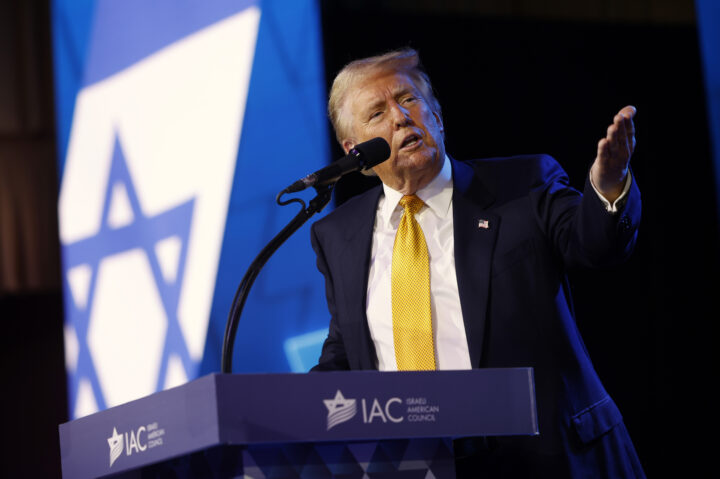
President Donald Trump delivers remarks at the Israeli American Council National Summit at the Washington Hilton on September 19, 2024 in Washington, DC.(Photo by Kevin Dietsch/Getty Images)
President Donald Trump announced Wednesday evening that Israel and Hamas had agreed to “the first Phase of our Peace Plan” that he outlined last week.
“This means that ALL of the Hostages will be released very soon, and Israel will withdraw their Troops to an agreed upon line as the first steps toward a Strong, Durable, and Everlasting Peace,” Trump wrote on Truth Social.
Axios reported that all the hostages will be released 72 hours after the Israeli cabinet approves the deal, likely by Monday. Israel is expected to release 250 Palestinians serving life sentences in Israeli prisons and 1,700 Palestinian prisoners detained since Oct. 7 in exchange.
Israeli Prime Minister Benjamin Netanyahu said that the announcement was a “great day for Israel” and that he would convene the government tomorrow “to approve the agreement and bring all our beloved hostages home.”
“I thank the heroic soldiers of the IDF and the entire security apparatus, whose bravery and sacrifice brought us to this day. I thank, from the bottom of my heart, President Trump and his team for their mobilization for the sacred task of releasing our hostages,” Netanyahu said. “God willing, we will continue together in order to achieve all our aims and expand the peace with our neighbours.”
The Israeli government said that Trump and Netanyahu had spoken and had a “very emotional and warm conversation” and “the Prime Minister thanked President Trump for all his efforts and for his global leadership, and President Trump congratulated the Prime Minister for his determined leadership and the actions he led.”
Netanyahu invited Trump — who has not yet visited Israel in his second term in office — to address the Knesset. Axios reported that Trump is planning to visit Israel “in the coming days.”
Further negotiations will be necessary to continue into further phases of the deal, which Trump had originally presented as an all-or-nothing ultimatum to Hamas.
Lawmakers on both sides of the aisle and Jewish groups celebrated the announcement, even as many warned that continued vigilance is necessary to ensure Hamas abides by the terms of the deal.
Rep. Brian Mast (R-FL), the chairman of the House Foreign Affairs Committee, said that Trump “just did what career diplomats never could — he brought the world closer than it’s ever been to peace in Gaza. This deal only works if Hamas follows through. We don’t trust terrorists, we trust results.”
Sen. Jacky Rosen (D-NV) said that the deal is a “victory” for the hostage families and “step toward healing for Israelis, Palestinians, people throughout the Middle East, and for the world.”
“I am grateful for the efforts that have brought us here, and urge the Trump Administration to continue its leadership in these negotiations,” Rosen continued. “We must continue to ensure Israel’s security, surge humanitarian aid to ease the suffering of innocent Palestinians in Gaza, and pursue steps toward a lasting peace that finally brings this conflict to an end.”
In a statement, AIPAC said that the deal is “an extraordinary moment for America, Israel and the world” that had been brought about by “the enduring partnership” between the U.S. and Israel. It described the deal as a “just conclusion to the terrible war Hamas started” which “creates tremendous opportunity to forge a better future” for the region.
“AIPAC applauds President Trump and his negotiating team for this tremendous achievement and for working together with Israel to broker this peace plan. We deeply appreciate the moral clarity and steadfast support from the overwhelming majority of Congress, Republicans and Democrats alike, who stood with the Jewish state throughout this war and ensured Israel had the resources it needed to achieve its objectives against Hamas,” the statement said.
“Now, America and the world must be vigilant to ensure that Hamas adheres to the terms and implementation of the peace plan.”
The American Jewish Committee, which has worked extensively with the hostage families, said, “Hope is finally within reach.”
“We welcome President Trump’s announcement of a deal to free the hostages and begin to end the war. As we await the details, we look forward to the day we can finally say every hostage is home,” the statement continued. “We are grateful to the President and his Administration for their leadership in helping bring about this pivotal moment.”
Sen. Joni Ernst (R-IA), in celebrating the deal, dubbed Trump “the peace president.”
“This historic deal not only brings the hope of prosperity to a region that has been ravaged by Iran-backed terror but establishes steps towards lasting peace,” Ernst continued. “Today there is a new dawn that could not have happened without the leadership of President Donald J. Trump, who united our partners and allies against our common enemy: Iran. Finally, the hostages who have endured a living nightmare will be reunited with their loved ones, and the bodies of Americans Itay Chen and Omer Neutra can be laid to rest in dignity.”
Rep. Lisa McClain (R-MI), the chair of the House Republican Conference, also credited Trump for the deal.
“This is what happens when we have strong leadership. Funny how peace only seems possible when President Trump’s in charge,” she said. “The Israel-Hamas ceasefire didn’t happen by accident — it happened because of his strong leadership that puts America — and peace — first. Grateful the hostages are finally coming home and peace in the Middle East is on the horizon.”
Rep. Ritchie Torres (D-NY) said, “We should all be rooting for the success of an agreement that secures the release of the hostages and ends the war. Who could possibly be against that?”
Rep. Mike Lawler (R-NY), the chairman of the House Foreign Affairs Committee’s Subcommittee on the Middle East and North Africa, said that the “news is a welcome breakthrough and a testament to the strength of America’s unwavering partnership with Israel and our Arab partners.”
“Now, with Hamas reportedly accepting the ceasefire deal and releasing all remaining hostages, we have a historic opportunity to end the bloodshed and begin rebuilding a secure, peaceful future for Israel,” Lawler continued.
“Thank you to President Trump for leading this effort and working tirelessly to establish peace and bring the hostages home. The United States, Israel, and our regional partners will hold Hamas accountable, and there will be no tolerance for backsliding or deception.”
Israeli PM Netanyahu: ‘We are on the verge of a very great achievement. ... It is not yet final; we are working on it diligently’

Chris McGrath/Getty Images
People chant slogans and hold placards in support of hostages still held by Hamas during a solidarity protest, calling for an end to the war and the release of all remaining Israeli hostages on October 4, 2025, in Tel Aviv, Israel.
Israeli Prime Minister Benjamin Netanyahu, hostage families and others in Israel expressed cautious optimism over the weekend, after Hamas agreed to enter talks to free the 48 remaining hostages in exchange for a partial Israeli withdrawal from Gaza.
An Israeli team consisting of Strategic Minister Ron Dermer, diplomatic advisor Ophir Falk, Coordinator for the Hostages and Missing Gal Hirsch and representatives of the Mossad and Shin Bet are expected to head to Cairo on Monday for proximity talks to negotiate the implementation of President Donald Trump’s 20-step plan to end the war. Trump’s special envoy, Steve Witkoff, and Jared Kushner, who has been involved in the talks, will represent the U.S.
Netanyahu said in a video statement Saturday night that Israel and the U.S. intend to “limit this negotiation to a few days” and that it would be about “technical details” of the Trump plan.
“We will not tolerate any more delay tactics, time-wasting or evasion on the part of Hamas,” he said.
As Trump noted on Truth Social, the ceasefire would immediately take effect once it is agreed to by Hamas. The terror group would have to release the remaining 48 hostages – 20 of whom are thought to be alive – in exchange for Israel’s freeing of over 1,700 Palestinian prisoners, hundreds of whom are serving life sentences on terrorism charges, and the rest arrested in Gaza in the last two years. Then, Israel would withdraw to an initial line, as part of a gradual withdrawal toward a buffer zone along Gaza’s perimeter.
The details likely to be negotiated include the precise line to which Israel will withdraw initially and, at the end of the process, which countries will make up the International Stabilization Force meant to be the “long-term internal security solution” to keep Gaza demilitarized and prevent the resurgence of terrorism, according to the Trump plan, and who will be part of the transitional technocratic committee meant to govern Gaza. Former U.K. Prime Minister Tony Blair and Apollo Global Management CEO Marc Rowan are expected to be involved in the Peace Board led by Trump that will oversee the transitional government.
Netanyahu vowed that “Hamas will be disarmed and the Strip demilitarized. This will happen either via a diplomatic route, according to the Trump plan, or via a military route by us.”
The talks come after Hamas released a statement early Saturday in which it embraced parts of the Trump plan — exchanging Israeli hostages for Palestinian prisoners, an influx of aid and encouraging Palestinians to remain in Gaza — but rejected the concessions the plan would entail, including the demilitarization and deradicalization of Gaza. Hamas said it would punt that decision to “a collective national position … to be discussed within a comprehensive Palestinian national framework, in which Hamas will be included.”
Despite Hamas accepting only a fraction of his plan, Trump wrote on Truth Social that he believes the terrorist group is “ready for a lasting PEACE” and called on Israel to “immediately stop the bombing of Gaza so that we can get the hostages out safely and quickly.”
IDF Chief of Staff Eyal Zamir then “instructed to advance readiness for the implementation of the first phase of the Trump plan for the release of the hostages,” according to an IDF statement early Saturday morning. At the same time, Zamir said, “all troops must maintain high alertness and vigilance, in addition to reinforcing the need for a rapid response to neutralize any threat.”
In his video statement, Netanyahu presented Trump’s plan as being coordinated with Jerusalem. “As a result of the intense military pressure we applied and the diplomatic pressure, Hamas was pressured into agreeing to the plan we presented,” Netanyahu said.
The prime minister added that “we are on the verge of a very great achievement. … It is not yet final; we are working on it diligently, and I hope, with G-d’s help, that in the coming days, during the Sukkot holiday, I will be able to inform you about the return of all our hostages, both living and deceased, in one phase, while the IDF remains deep within the Strip and in the controlling areas within it.”
Tel Aviv’s Hostage Square was filled with demonstrators on Saturday night, calling for the deal to be implemented.
Liran Berman, brother of hostages Ziv and Gali Berman, said that “with hope comes fear. Will the deal be signed? When will I see my brothers again? We are suspended between hope and dread. We have lived through Hamas’s lies before. We cannot let another deal collapse. Not again. President Trump, we stand with you. Do not stop. It is now or never.”
Former hostage Gadi Moses said, “I know the road is still long and riddled with obstacles, but today I can say that for the first time since my release from captivity, I have heard declarations that may give us some hope. This is the time to cease fire and focus on returning all the hostages and ending the war.”
Also Saturday, Netanyahu held meetings and discussions with the leaders of right-wing parties in his governing coalition, National Security Minister Itamar Ben-Gvir and Finance Minister Bezalel Smotrich, both of whom have called to annex and settle the Gaza Strip.
Ben-Gvir said that “we will be happy like everyone to see all the hostages returning to us,” but “if Hamas continues to exist after all the hostages are freed, Otzma Yehudit [Ben-Gvir’s party] will not be part of the government. We will not be part of a national defeat that will turn into a ticking time bomb until the next massacre.”
Smotrich did not threaten to leave the coalition, but he said that Netanyahu made a “severe mistake” by acquiescing to Trump’s call to stop the attack on Gaza City rather than holding “negotiations under fire.”
“It’s a recipe for Hamas to waste time and wear down Israel’s stance,” he posted on X.
Opposition leader Yair Lapid has said his party will vote to prop up the government if parties within the coalition attempt to bring it down to stop a hostage and ceasefire deal.
On Saturday afternoon, Lapid said: “When Shabbat ends and you hear Smotrich and Ben-Gvir’s threats, remember they have nothing to threaten with. We won’t let them sabotage the deal. A clear majority of the Knesset and a clear majority of the nation support the Trump plan.”
The guarantee, which regards attacks on Qatar as direct threats to the U.S., is unprecedented between the U.S. and an Arab country
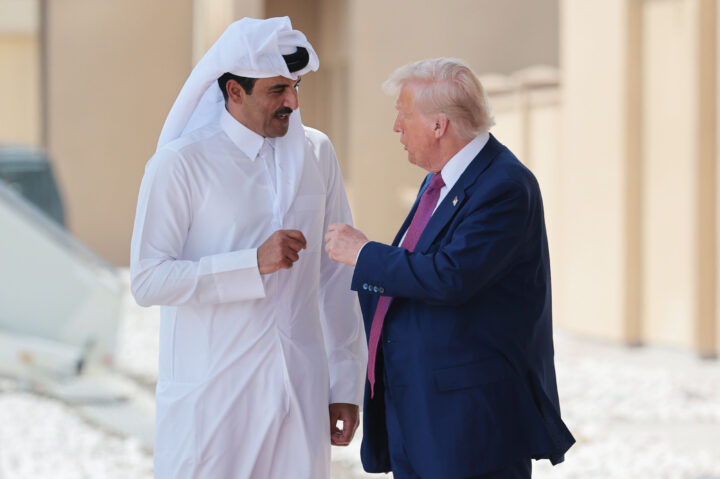
Win McNamee/Getty Images
President Donald Trump speaks with Emir of Qatar Tamim bin Hamad al Thani as he departs the Al Udeid Air Base for Abu Dhabi on May 15, 2025, in Doha, Qatar.
President Donald Trump signed an executive order on Monday pledging to guarantee Qatar’s “security and territorial integrity” against “external attack.” The security guarantee, similar to NATO’s Article 5 mutual defense clause, is unprecedented for the U.S. with an Arab country.
Signed just weeks after Israel’s attempted strike on Hamas leaders in Doha, the EO says the move comes “in light of the continuing threats to the State of Qatar posed by foreign aggression” and promises that the U.S. “shall regard any armed attack” on Qatari territory, sovereignty or critical infrastructure as a “threat to the peace and security of the United States.”
Qatar also recently faced an attack from Iran, when Tehran launched missiles at the U.S.’ Al Udeied Air Base during the Israel-Iran war in June.
The order was signed on Sept. 29, the day that Israeli Prime Minister Benjamin Netanyahu met with Trump in the White House and called Qatari Prime Minister Sheikh Sheikh Mohammed bin Abdulrahman al-Thani to apologize for the strike, though it was only publicized after Netanyahu’s departure.
The order pledges that, should Qatar face any of the described threats, “the United States shall take all lawful and appropriate measures — including diplomatic, economic, and, if necessary, military — to defend the interests of the United States and of the State of Qatar.”
The U.S. does not have a similar security guarantee with Israel. Saudi Arabia has sought one from Washington as well, primarily through normalizing relations with Israel.
Plus, right-wing influencers defame the ADL
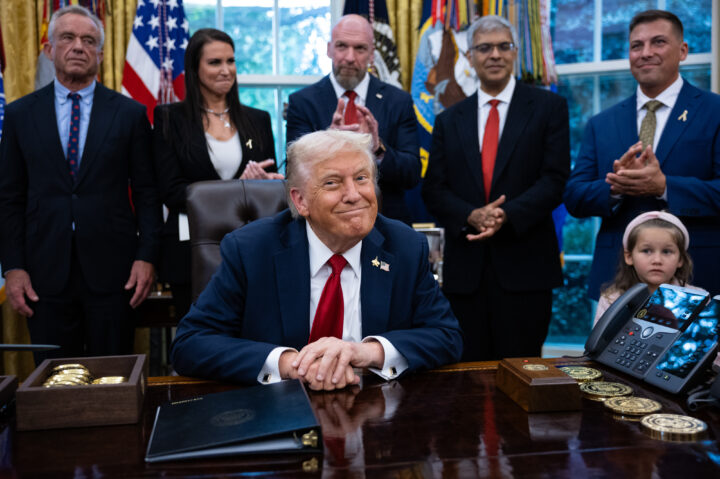
Francis Chung/Politico/Bloomberg via Getty Images
President Donal Trump, center, during an executive order signing in the Oval Office of the White House on Tuesday, Sept. 30, 2025.
Good Tuesday afternoon.
This P.M. briefing is reserved for our premium subscribers like you — offering a forward-focused read on what we’re tracking now and what’s coming next.
I’m Danielle Cohen-Kanik, U.S. editor at Jewish Insider and curator, along with assists from my colleagues, of the Daily Overtime briefing. Please don’t hesitate to share your thoughts and feedback by replying to this email.
📡On Our Radar
Notable developments and interesting tidbits we’re tracking
The clock continues to tick on whether Hamas will accept President Donald Trump’s 20-point plan to end the war in Gaza, presented with Israeli Prime Minister Benjamin Netanyahu at the White House yesterday.
The plan itself says in Point No. 4 that “within 72 hours of Israel publicly accepting this agreement, all hostages, alive and deceased, will be returned.”
Trump affirmed that timeline, telling reporters this morning that he would give Hamas “three or four days” to agree to the ceasefire and said later during remarks to military leaders in Quantico, Va., “We have one signature that we need, and that signature will pay in hell if they don’t sign”…
Officials from Egypt, Qatar and Turkey are urging Hamas to agree, despite being angered by several changes to the plan negotiated by Netanyahu, particularly on the conditions and timeline for the IDF’s withdrawal from Gaza, before it was presented to the public yesterday, Axios reports…
U.S. Ambassador to Israel Mike Huckabee postponed a rare trip to Egypt, originally planned for Sunday, to mid-October. Huckabee said the purpose of his visit, requested by Egyptian officials, is to “build dialogue, trust and understanding,” without providing further details on the agenda or the reason for the delay…
The Israeli Foreign Ministry today claimed that the Sumud Flotilla currently making its way to Gaza, including anti-Israel activist Greta Thunberg and around 500 others, was organized and funded indirectly by Hamas through the Palestinian Conference for Palestinians Abroad, an organization led and endorsed by Hamas affiliates.
The flotilla and the Israeli Navy are expected to make contact as the ships approach Gaza tomorrow. Italy and Spain dispatched their own navies to accompany the flotilla, though those ships will turn back before reaching Israeli waters.
Italian Prime Minister Giorgia Meloni called in a statement today for the flotilla to cease its operation for risk of “blowing up” the “fragile balance” created by Trump’s peace proposal. In the U.S., meanwhile, Rep. Rashida Tlaib (D-MI) and 18 other House progressives wrote to Secretary of State Marco Rubio demanding that the U.S. protect the flotilla…
Elon Musk and several right-wing influencers misrepresented the Anti-Defamation League’s classification of the antisemitic Christian Identity movement as an extremist group, circulating a partial, out-of-context screenshot on social media purporting that the civil rights organization was disparaging the Christian religion at large, Jewish Insider’s Emily Jacobs and Marc Rod report.
Musk said the ADL “hates Christians” and called it a “hate group,” while Rep. Anna Paulina Luna (R-FL) said the group is “intentionally creating a targeted hate campaign against Christians.” In reality, the Christian Identity movement, which the ADL lists on its website as an extremist group, “is a virulently antisemitic and loosely organized movement that has nothing to do with mainstream Christianity,” ADL CEO Jonathan Greenblatt wrote on X…
Trump told reporters this afternoon that his administration is close to reaching a deal with Harvard after a monthslong deadlock and legal battle that will see the university pay around $500 million to open and operate trade schools. “They’re going to be teaching people how to do AI and lots of other things,” Trump said at an executive order signing.
The potential deal comes after the Department of Health and Human Services said yesterday that it was initiating the process of “debarment” against Harvard, which would cut the school off from future federal research funding, a large blow to its financial standing.
Harvard had sent a scathing letter to the administration on Sept. 19 accusing it of relying on “inaccurate and incomplete facts” in determining that the school had violated civil rights laws, The New York Times reports. The letter also said the administration failed to meet legal requirements to prove discrimination and relied on findings from a fraction of a percentage of the student body…
Meanwhile, a federal judge ruled today that the Trump administration’s moves to arrest and deport international students for actions at anti-Israel protests were illegal, saying that the Department of Homeland Security and State Department aimed to “tamp down pro-Palestinian student protests and terrorize” students.
A DHS official testified during the trial that the department relied heavily on the advocacy work of the pro-Israel group Canary Mission, creating reports on between 100-200 student protesters based of the group’s profiles of people involved in anti-Israel activity on campus…
In another legal loss, the administration was forced to restore almost all of the 500 National Institutes of Health grants it had suspended from the University of California, Los Angeles after a federal ruling last week…
Another campus drawing attention: The University of Maryland’s Student Government Association is set to consider a resolution at the start of Yom Kippur on Wednesday evening, calling on the university and its charitable foundation to implement a boycott of companies and academic institutions with ties to “Israel’s regime of apartheid and occupation,” JI’s Haley Cohen reports…
⏩ Tomorrow’s Agenda, Today
An early look at tomorrow’s storylines and schedule to keep you a step ahead
Keep an eye on Jewish Insider tomorrow morning for reporting on the rise of DSA-aligned candidates in key congressional and mayoral contests.
On Sunday, Democratic Jewish Outreach of Pennsylvania, a Jewish Democratic PAC, will present its annual Defender of Democracy award to Illinois Gov. JB Pritzker at an event with special guest Pennsylvania Gov. Josh Shapiro.
Also on Sunday, the Museum of Jewish Heritage – A Living Memorial to the Holocaust in New York will open its exhibit honoring the 2018 Tree of Life Synagogue shooting in Pittsburgh.
In observance of Yom Kippur, we’ll be back in your inbox with the Daily Overtime on Monday. G’mar chatima tova and Shabbat shalom!
Stories You May Have Missed
HILL REACTIONS
Senators react to Trump’s Gaza plan with cautious optimism
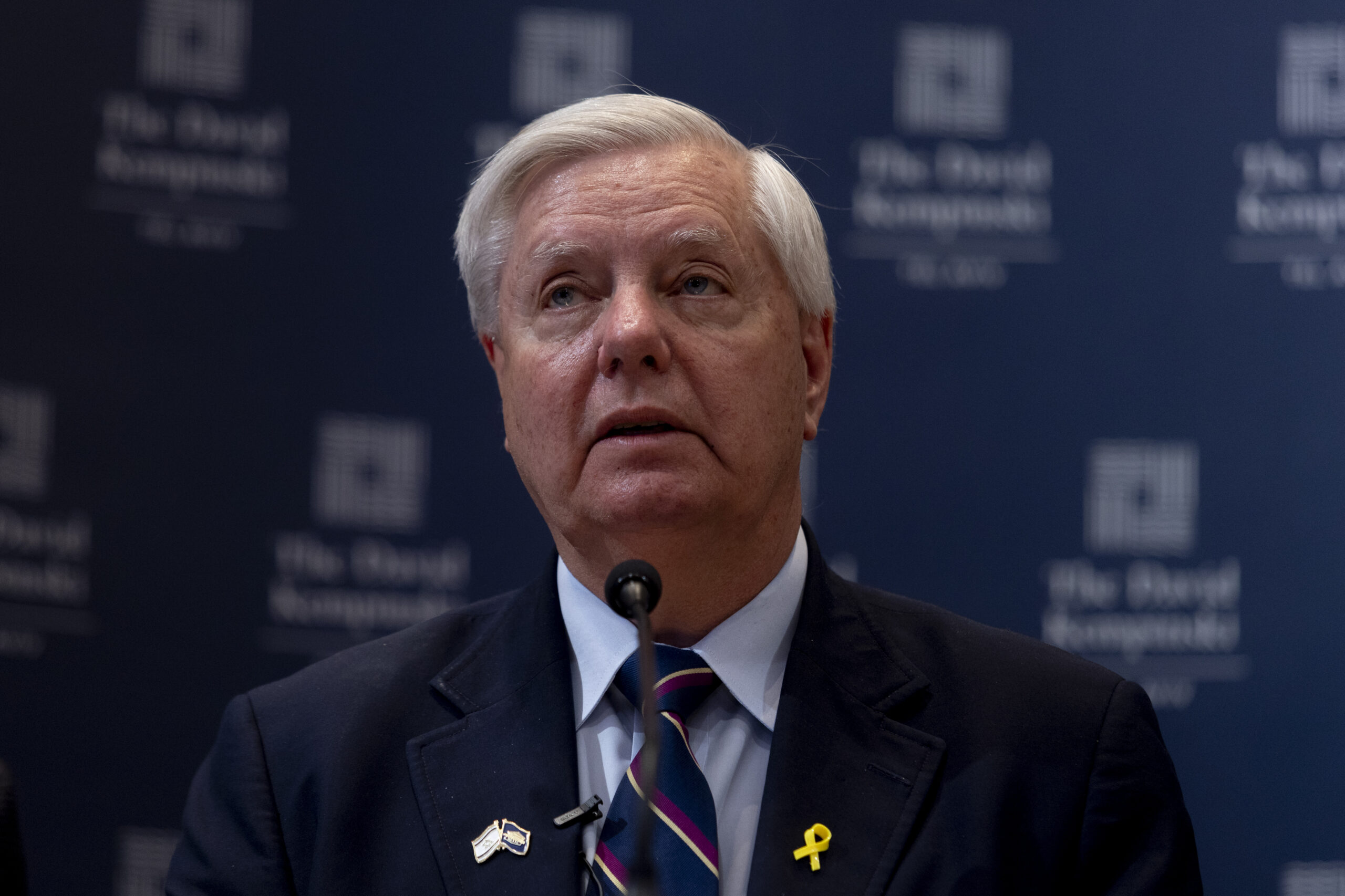
Sen. Lindsey Graham sounded skeptical that Hamas would accept the deal: ‘Distrust and verify with these guys’
CONFERENCE CONTROVERSY
Khanna distances himself from pro-terror speakers at anti-Israel conference and defends ‘free speech’

At ArabCon, several panelists laughed at the notion of condemning Hamas’ Oct. 7 attacks and defended the terrorist group as ‘Palestinian resistance’
Plus, Khanna distances himself from terror sympathizers
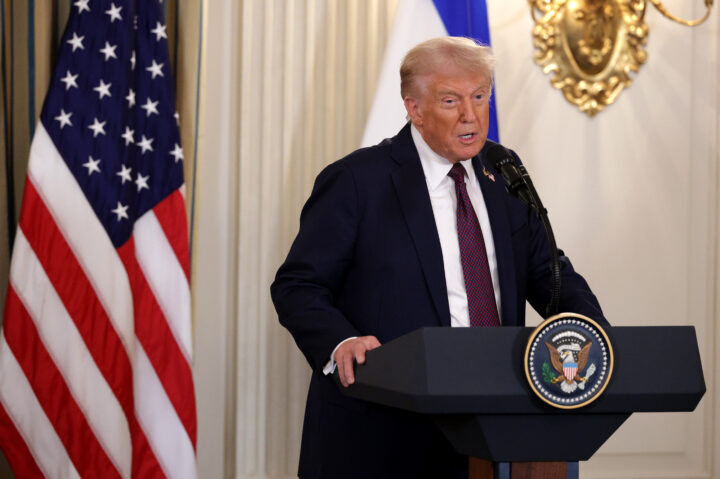
Alex Wong/Getty Images
U.S. President Donald Trump delivers remarks during a joint news conference with Israeli Prime Minister Benjamin Netanyahu in the State Dining Room at the White House on September 29, 2025 in Washington, DC.
Good Tuesday morning.
In today’s Daily Kickoff, we report on President Donald Trump’s 20-point proposal to end the Israel-Hamas war, and report on a new Department of Justice lawsuit targeting demonstrators who protested outside of a New Jersey synagogue. We have the scoop on the reintroduction of the bipartisan Pray Safe Act, and report on Rep. Ro Khanna’s effort to distance himself from other speakers at the recent ArabCon conference who promoted terrorism from the stage. Also in today’s Daily Kickoff: Jay Schottenstein, Al Tylis and Sarah Adler Hartman.
Today’s Daily Kickoff was curated by Jewish Insider Executive Editor Melissa Weiss and Israel editor Tamara Zieve, with assists from Danielle Cohen-Kanik and Marc Rod. Have a tip? Email us here.
What We’re Watching
- Defense Secretary Pete Hegseth is convening senior military officials stationed around the world today in Virginia to speak about military standards and the “warrior ethos,” amid concerns from the military’s top brass, including Gen. Dan Caine, chairman of the Joint Chiefs of Staff, over the Pentagon’s priorities. President Donald Trump is slated to attend the summit, being held at Quantico.
- A federal shutdown appears increasingly likely to take effect overnight as Congress faces today’s deadline to pass a spending bill, and as talks last night between Trump and senior congressional leadership failed to yield a breakthrough that would keep the government open.
- The Atlantic Council is holding a conversation with Palestinian-American researcher and activist Ahmed Fouad Alkhatib about efforts to stabilize and rebuild Gaza in a postwar scenario.
- This evening, Democratic Majority for Israel will host a virtual briefing with Rep. Greg Landsman (D-OH) on the implications of yesterday’s White House meeting, the status of the Gaza war, political developments in Jerusalem and Landsman’s reflections on his recent trip to Israel.
What You Should Know
A QUICK WORD WITH JI’S LAHAV HARKOV
With Israeli Prime Minister Benjamin Netanyahu accepting President Donald Trump’s 20-point plan to end the war in Gaza at the White House on Monday, the ball is now in Hamas’ court. Read more here from JI’s Gabby Deutch on Trump and Netanyahu’s press conference.
Whether Hamas would agree to release the hostages first, before Israel makes any concessions other than stopping the fighting, remains to be seen. There is also newfound pressure on Qatar, a chief patron of Hamas, to convince the terror group to accept the deal.
The late elder Israeli statesman Abba Eban famously said, “The Arabs never miss an opportunity to miss an opportunity.” In readily accepting Trump’s plan, Netanyahu is counting on Hamas to do just that.
That’s not to say that Netanyahu opposes the plan. His calculus may be that he will be able to execute the parts he supports, while the aspects he finds less favorable are unlikely to materialize anyway — largely, he believes, due to the Palestinians’ own intransigence.
As Netanyahu noted in the press conference, the plan meets all of Israel’s war aims: Bringing back the hostages, dismantling Hamas — most of which Israel already did in the war — and making sure it no longer poses a threat to Israel, through demilitarization and deradicalization. Other elements of the plan that Israel has long said would be part of the “day after” for Gaza are a technocratic government with help from international partners, and the IDF retaining a buffer zone inside Gaza’s perimeter. Netanyahu also reportedly secured 11th-hour edits to the plan regarding the IDF’s withdrawal and Hamas’ disarmament prior to the press conference.
But the details are tricky.
For example, Point 17 of the plan: “In the event Hamas delays or rejects this proposal, the above, including the scaled-up aid operation, will proceed in the terror-free areas handed over from the IDF to the [International Stabilization Force].”
In other words, if Hamas rejects the plan, humanitarian aid “without interference” — likely including dual-use items that could be exploited by terrorist organizations — would still be immediately and significantly scaled up and managed by the United Nations and Red Crescent, among others. Once an international force is put together, the IDF would still be expected to retreat from areas in which it has defeated Hamas. And a transitional, technocratic government overseen by Trump and former British Prime Minister Tony Blair’s “Board of Peace” would be put into place.
HILL REACTIONS
Senators react to Trump’s Gaza plan with cautious optimism

Senators reacted with cautious optimism — and a degree of skepticism — to President Donald Trump’s announcement on Monday of a sweeping deal that would end the war in Gaza, see the release of the remaining hostages and facilitate reconstruction of the Gaza Strip, Jewish Insider’s Marc Rod and Emily Jacobs report.
Close eye: Sen. Lindsey Graham (R-SC) warned that the execution of the deal would require close monitoring of Hamas’ compliance and that long-term peace in the region will likely require eliminating Iran’s other proxies, in addition to Hamas. “I hope Hamas agrees — we’ll get the hostages home. Distrust and verify with these guys,” Graham said. “A lot of loopholes if you don’t watch it, but I hope we can land this deal.”
Read the full story here with additional comments from Sens. John Cornyn (R-TX), Rick Scott (R-FL), Kevin Cramer (R-ND), Ted Budd (R-NC), Jim Risch (R-ID), John Kennedy (R-LA), Chris Coons (D-DE), Richard Blumenthal (D-CT), Peter Welch (D-VT) and Jeanne Shaheen (D-NH).
Communal reaction: Jewish groups are rallying behind Trump’s peace plan, with organizations from AIPAC to J Street voicing initial support for the proposal, eJewishPhilanthropy’s Judah Ari Gross reports.
OLIVE BRANCH
During Trump meeting, Netanyahu apologized to Qatari leader for Doha strike
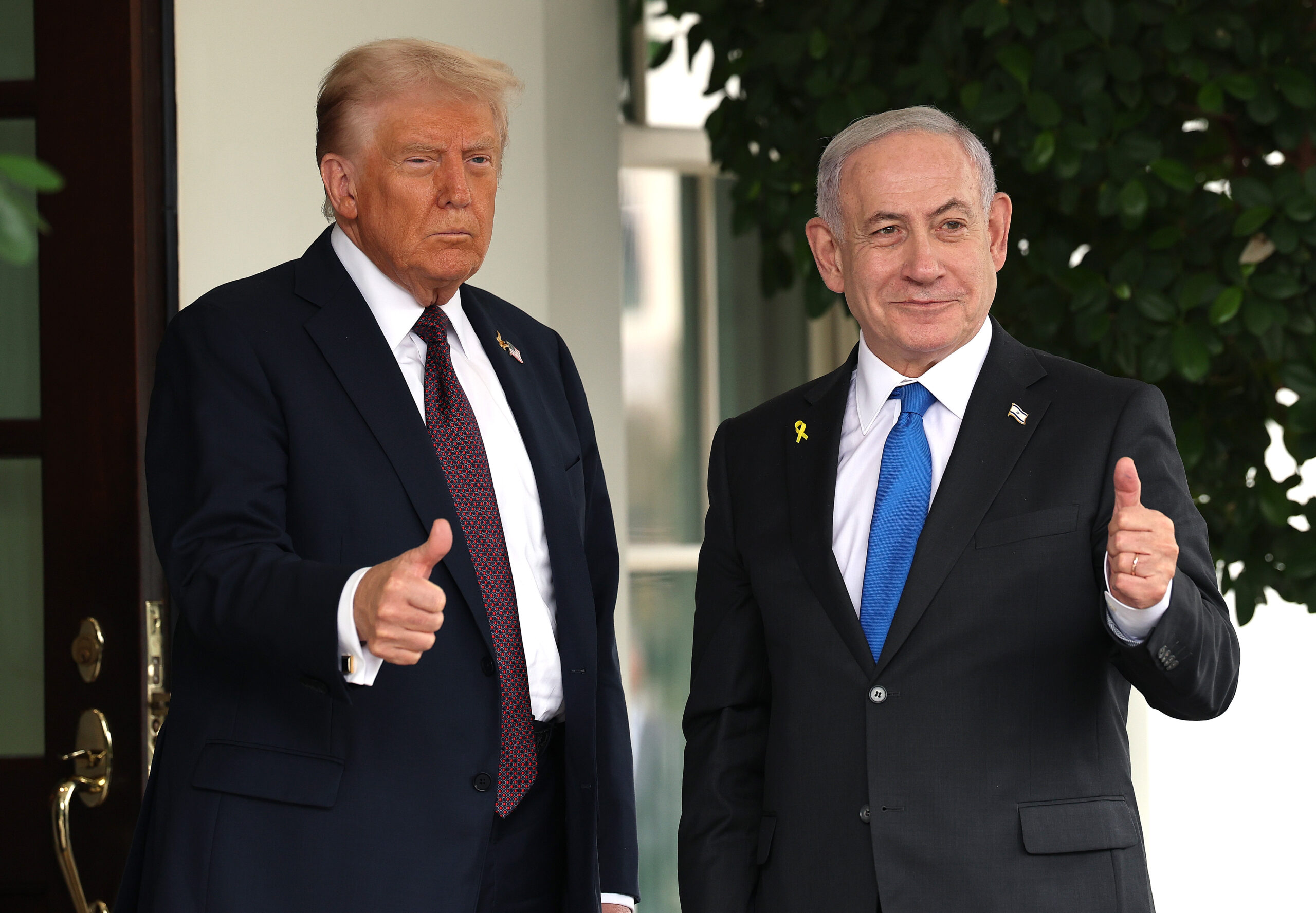
During a meeting between Israeli Prime Minister Benjamin Netanyahu and President Donald Trump at the White House on Monday, Netanyahu apologized to Qatar’s prime minister, Sheikh Mohammed bin Abdulrahman al-Thani, for killing a Qatari serviceman in an attempted strike on Hamas leadership in Doha and promised not to violate Qatari sovereignty again, Jewish Insider’s Marc Rod reports. News of the apology has been met with frustration and scorn from Netanyahu’s political allies and opponents in Israel.
Notable quotable: According to remarks released by the Israeli government, Netanyahu told Al Thani, “I want you to know that Israel regrets that one of your citizens was killed in our strike. I want to assure you that Israel was targeting Hamas, not Qataris. I also want to assure you that Israel has no plan to violate your sovereignty again in the future, and I have made that commitment to the president.” Netanyahu also acknowledged Qatar’s “grievances against Israel” as well as Israel’s own issues with Qatar “from support for the Muslim Brotherhood to how Israel is portrayed on Al Jazeera to support for anti-Israel sentiment on college campuses.”
CONFERENCE CONTROVERSY
Khanna distances himself from pro-terror speakers at anti-Israel conference and defends ‘free speech’

Rep. Ro Khanna (D-CA) distanced himself from some speakers and attendees at the ArabCon conference that he attended in Dearborn, Mich., while defending their First Amendment right to free speech, Jewish Insider’s Marc Rod reports. At the conference, held last week, several panelists laughed at the notion of condemning the Oct. 7, 2023, Hamas attacks, defended Hamas as “Palestinian resistance” and said the group should not be condemned and defended convicted terrorists and terrorist financiers, according to excerpts of the event shared online.
Responding: During his own separate panel at the event, Khanna dismissed the notion that there were any “pro-terror radical[s]” speaking at the event or attending the conference, referencing criticism he faced prior to the event. “I don’t agree with everyone who spoke at the conference, but I do believe in free speech. You can’t just be for free speech when it’s convenient. I’ve unequivocally condemned the Oct. 7 attacks and called for the release of the hostages,” Khanna said in a statement to JI on Monday, when pressed about whether he considered the comments of other speakers and attendees to constitute pro-terror radicalism.
HARBORING HATE
Study: Antisemitism ‘thriving in plain sight’ on X
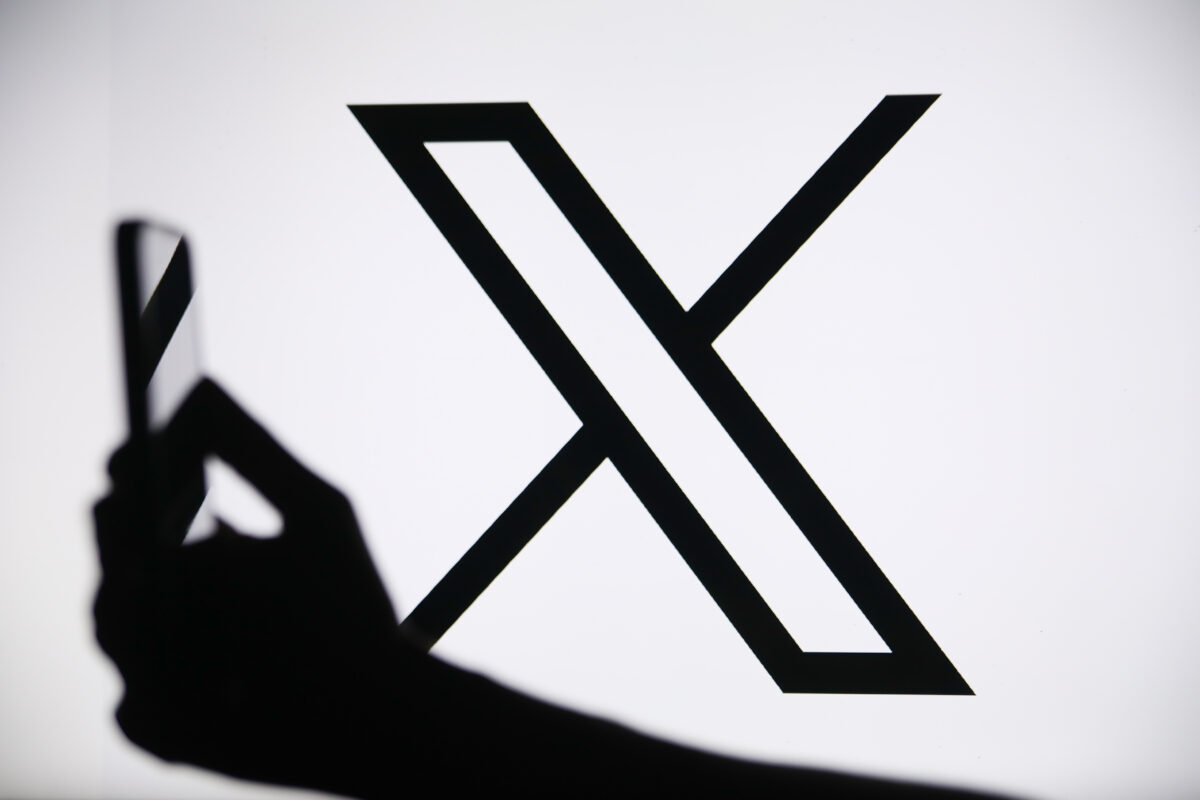
Antisemitism is “thriving in plain sight” on Elon Musk’s social media platform X (formerly Twitter), according to a new study by the Center for Countering Digital Hate and the Jewish Council for Public Affairs, Jewish Insider’s Danielle Cohen-Kanik reports.
Breakdown: The study, first shared with CNN, conducted an analysis of over 679,000 antisemitic posts made over a year on the site and found that, despite the platform’s own anti-hate policies and commitment to reduce visibility of hateful content, X “not only tolerates” antisemitic conduct “but allows users to monetize it, giving antisemitic influencers both reach and revenue.” With the assistance of ChatGPT, the study categorized the posts into Jewish control or power conspiracies, Jewish satanic conspiracies and Holocaust denial, with control or power conspiracies accounting for the plurality (44%) of the total likes and views. All posts included were viewed 193 million times in total.
DOJ SUIT
Justice Department sues individuals involved in demonstration at N.J. synagogue

The Department of Justice filed a civil suit on Monday against several protesters and anti-Israel groups for their involvement in a demonstration last November at a West Orange, N.J., synagogue, Congregation Ohr Torah, Jewish Insider‘s Marc Rod reports.
The details: The DOJ complaint alleges that the Party for Socialism and Liberation-New Jersey, American Muslims for Palestine-New Jersey and six individuals engaged in physical assaults and antisemitic and threatening chants, as well as defied police orders. The suit was brought under the Freedom of Access to Clinic Entrances (FACE) Act, traditionally used against those who block access to abortion clinics, but which also includes provisions barring the use of force, threats, intimidation or physical obstruction to interfere with the right to worship.
EXCLUSIVE
Senate, House lawmakers to reintroduce Pray Safe Act
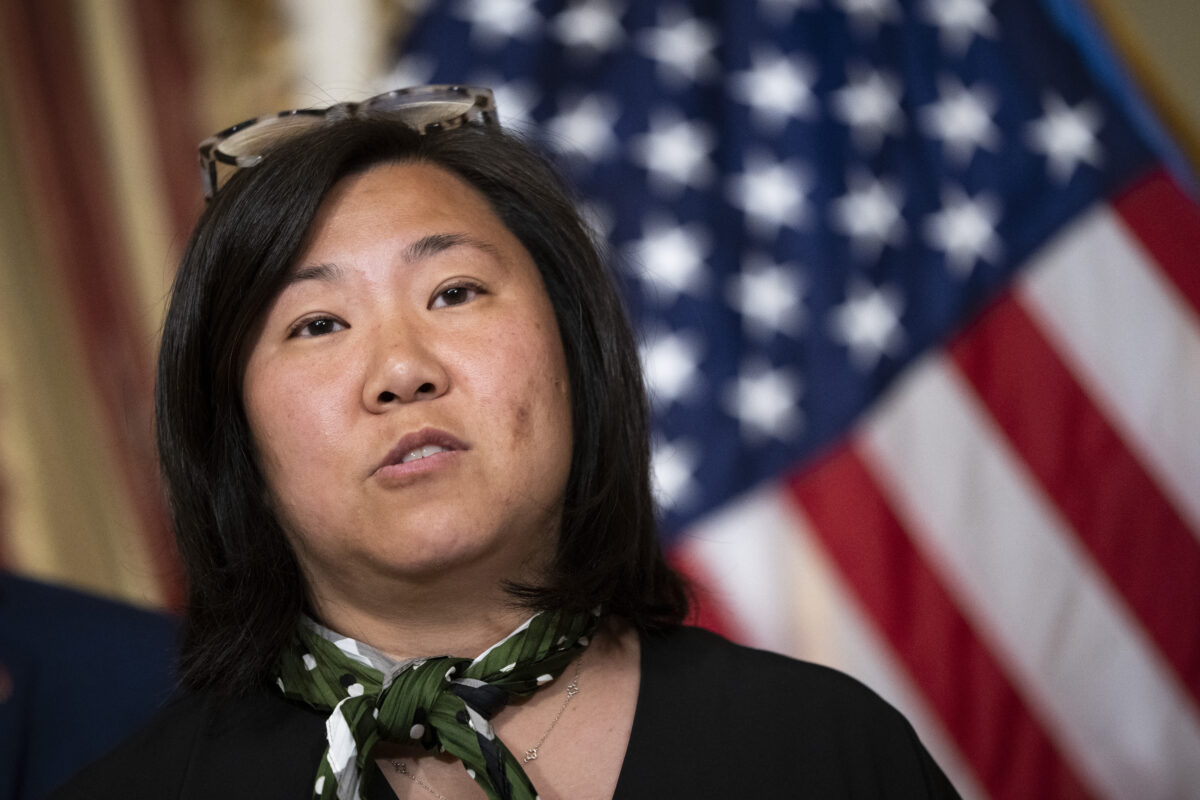
Senate and House lawmakers on Tuesday are expected to reintroduce the Pray Safe Act, a long-gestating bill that would create a federal database and clearinghouse for security best practices, training materials and grant opportunities for religious nonprofits, Jewish Insider’s Marc Rod reports.
The latest: The legislation is being led by Sens. Maggie Hassan (D-NH) and Ron Johnson (R-WI) and Reps. Grace Meng (D-NY) and Maria Elvira Salazar (R-FL) and comes after a series of high-profile attacks at religious institutions, including mass shootings at a Catholic church in Minneapolis and a Mormon church in Michigan.
Worthy Reads
Jean Mutation: The Wall Street Journal’s Suzanne Kapner interviews American Eagle CEO Jay Schottenstein about the company’s marketing success, months after its viral Sydney Sweeney “great jeans” ad campaign. “Schottenstein uses a Yiddish word to describe his long-held goal for American Eagle: ‘to put a pair of jeans on every tuchis in the United States.’ The 71-year-old has an uncanny ability to discern what young shoppers want. … While visiting Israel with his granddaughters in 2017, he noticed they were going wild for flow ring bracelets that looked like slinkies. He tracked down the manufacturer and sold them in American Eagle stores, generating nearly $1 million in sales. Schottenstein has honed his instincts over decades in a retail business founded by his grandfather, Ephraim, a Lithuanian immigrant, who opened a department store in Columbus, Ohio, in 1917.” [WSJ]
Door Opening to Peace?: The Washington Post’s David Ignatius weighs in on President Donald Trump’s 20-point plan to end the Israel-Hamas war. “The ‘New Gaza’ proclaimed by Trump would ease the agony of Palestinian civilians ravaged by the war while marking an end to the suffering Israel has endured since the brutal Hamas terrorist attack of Oct. 7, 2023. Gaza’s buildings are mostly shattered ruins, and the ground is soaked in blood. Palestinian civilians live in hunger and fear, as do Israeli hostages. It’s time for the fighting to end. Trump often overstates the significance of his actions, but not here. His ‘Board of Peace’ to oversee political transition in Gaza is a potential game changer. … The door to something different seemed to open slightly Monday. On this, Trump deserves the credit he craves. We can only hope and pray that he and his new coalition of Arab and Israeli allies will keep pushing.” [WashPost]
Word on the Street
The Pentagon is pushing missile suppliers to increase production rates amid concerns regarding low U.S. stockpile levels and in preparation for a potential future conflict with China…
Michael Friedman, who previously served as special assistant to the president for presidential personnel, was appointed chief of staff to Treasury Secretary Scott Bessent…
House Education Committee Chairman Tim Walberg (R-MI) and Rep. Elise Stefanik (R-NY) wrote to Harvard‘s president requesting information about whether the school is taking promised steps to address antisemitism on campus. The letter accuses the school of obstructing a law enforcement investigation into an antisemitic attack and supporting those involved, failing to follow through on its commitment to implement the International Holocaust Remembrance Alliance’s working definition of antisemitism and slow-walking a decision on whether to end its partnership with Birzeit University…
The Office for Civil Rights in the Department of Health and Human Services sent a letter to Harvard beginning a process that could render the school ineligible for future federal grants…
A new New York Times/Siena poll found that 51% of Americans oppose sending U.S. military aid to Israel; a 36% plurality said they sympathize more with the Palestinians, 35% said they sympathize more with the Israelis and 31% said “both equally” or they didn’t know…
Staff and allies of former New York Gov. Andrew Cuomo told Politico that more money has begun flowing into his mayoral campaign and allied super PACs since Mayor Eric Adams suspended his campaign, giving Cuomo an outside chance to consolidate voters who oppose front-runner Zohran Mamdani with just over a month to go in the race…
A circuit court in Virginia found that American Muslims for Palestine to be in civil contempt of court for failing to comply with a request from the commonwealth’s attorney general, Jason Miyares, regarding the group’s potential violations of Virginia’s charitable solicitation laws…
Apollo announced yesterday the launch of Apollo Sports Capital, to be helmed by Al Tylis with the goal of investing in sports franchises, media and events…
New York Gov. Kathy Hochul announced a competition to design a memorial for Supreme Court Justice Ruth Bader Ginsburg, which will be situated in Brooklyn Bridge Park…
Maurice Shnaider, the uncle of slain Israeli hostage Shiri Bibas, filed a complaint against Iran at the International Criminal Court, accusing the Islamic Republic of complicity in crimes against humanity, war crimes and genocide and demanding the issuance of arrest warrants for Iranian Supreme Leader Ayatollah Ali Khamenei and Islamic Revolutionary Guard Corps head Esmail Qaani…
Former Israeli MK Michal Cotler-Wunsh, resigned as Israel’s special envoy to combat antisemitism, a voluntary position, citing what she said was the government’s failure to take the issue seriously…
The U.S. deported approximately 100 Iranian migrants back to Iran, in a deal made between Washington and Tehran amid a broader illegal immigration crackdown by the Trump administration…
Sarah Adler Hartman was named the next CEO of the Texas Tribune; read JI’s 2021 profile of Hartman here…
Pic of the Day
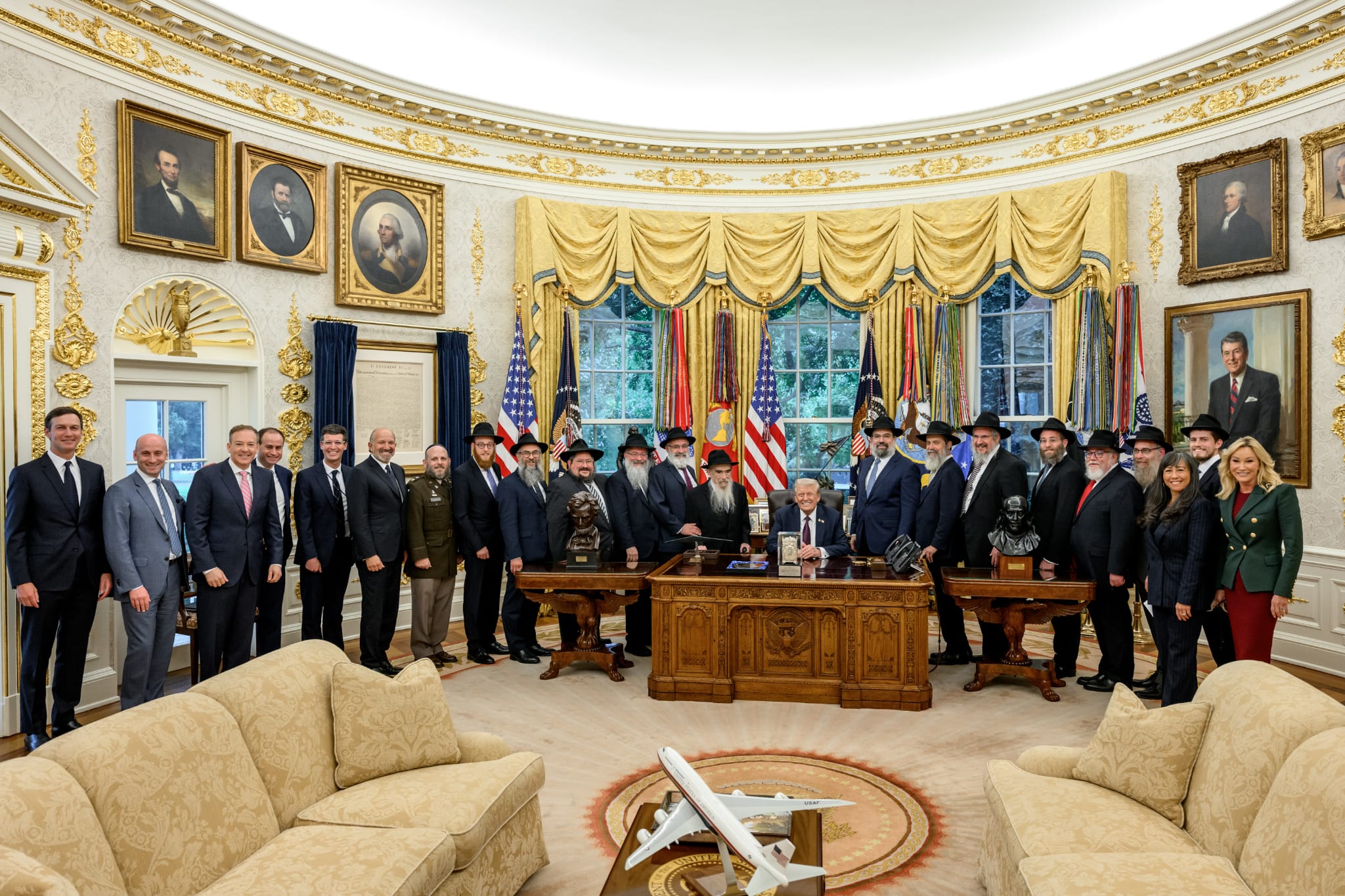
A delegation from Chabad-Lubavitch met on Monday with President Donald Trump, Jared Kushner, White House Deputy Chief of Staff Stephen Miller, EPA Administrator Lee Zeldin, Staff Secretary Will Scharf, Liaison to the Jewish Community Martin Marks, Commerce Secretary Howard Lutnick, Chief of Staff Susie Wiles and Paula White. The meeting was a belated celebration of Education and Learning Day USA, which honors the Lubavitcher Rebbe, Rabbi Menachem Mendel Schneerson.
Birthdays
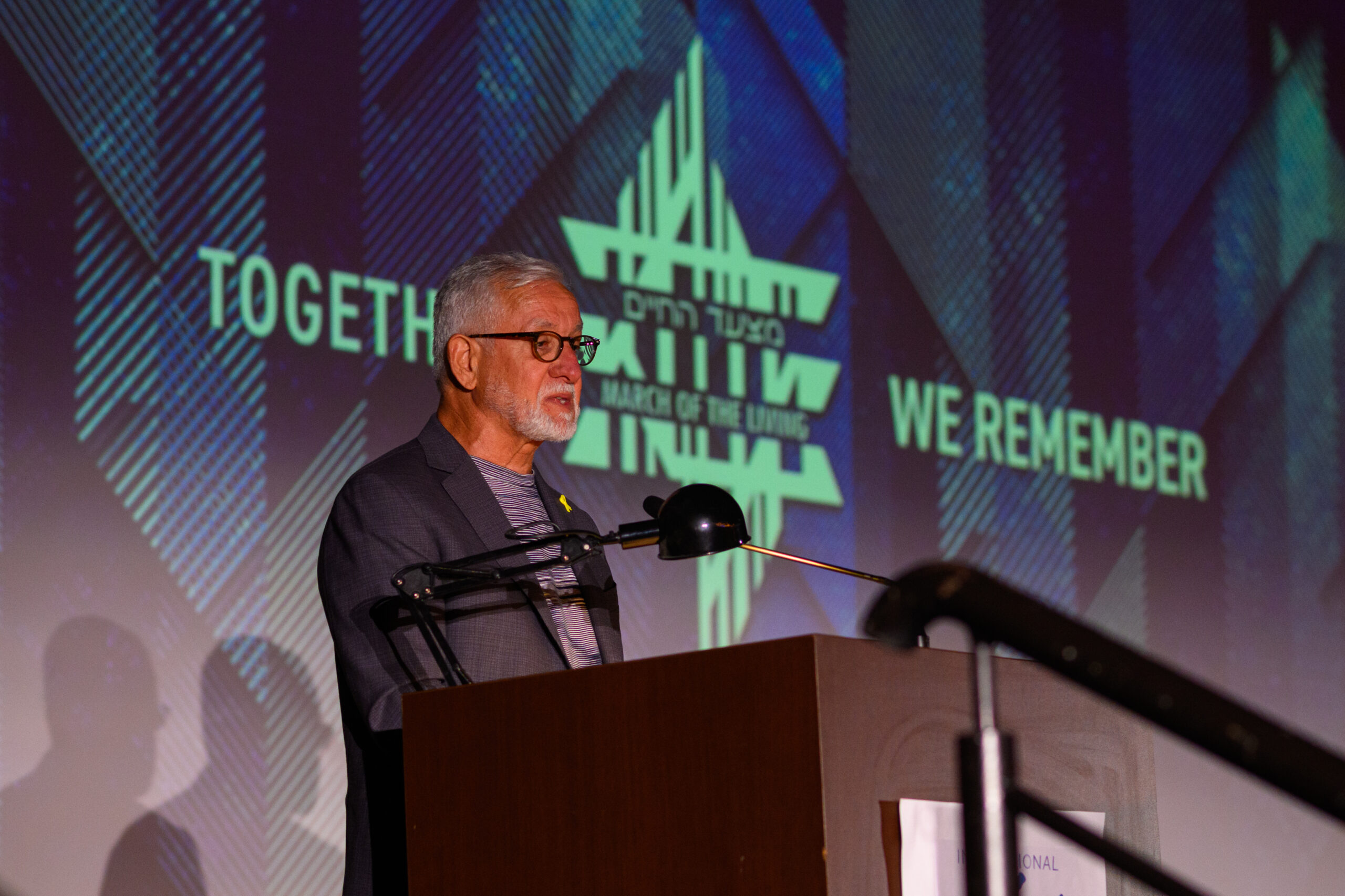
Founder and president of the Menomadin Group and president of the Menomadin Foundation, Haim Taib turns 65…
Former prime minister of Israel, Ehud Olmert turns 80… IT developer and business analyst, Sanford Kadish… Past president of The Washington Institute for Near East Policy, she is on the board of The Tikvah Fund, Rochelle A “Shelly” Kassen… Chairman and CEO of AMC Entertainment, he is a co-owner of the Philadelphia 76ers, Adam Maximilian Aron turns 71… Actress and activist, she completed her second term as president of the SAG-AFTRA trade union a few weeks ago, Fran Drescher turns 68… Professor of mathematical logic at Oxford, Ehud Hrushovski turns 66… Journalist for Haaretz, Allison Kaplan Sommer… Professor of healthcare economics at MIT and an architect of Romneycare and Obamacare, Jonathan Gruber turns 60… Leora Lily Ihilevich Usman… Lisa K. Robbins… Israel’s U.N. ambassador until 2024, now global president of Magen David Adom, Gilad Menashe Erdan turns 55… Former SVP of digital product management at The Advertising Council, now a consultant to nonprofits, Anastasia Goodstein… European affairs editor for The Washington Post, David Herszenhorn… CEO of Via Trading Corporation, Jacques Stambouli… President and CEO of Hadar Institute in Manhattan, Rabbi Eliezer “Elie” Kaunfer… Founder and partner at Artemis Strategies, a boutique consultancy, Hildy Kuryk turns 48… Host of NPR’s “All Things Considered,” Ari Michael Shapiro turns 47… Member of the Kentucky House of Representatives since 2023, Daniel Grossberg turns 47… Screenwriter, director, producer and actor, Jonathan Peter Kasdan turns 46… Founder of the Jerusalem-based Interfaith Center for Sustainable Development, Yonatan Neril turns 45… Computer scientist and entrepreneur, he is a co-founder and president of Palantir Technologies, Stephen Cohen turns 43… Chief news editor at Business Insider, Steven Russolillo… Mixed martial artist who competed in the lightweight division in the Ultimate Fighting Championship, Natan Levy turns 34…
Whether Hamas would agree to release the hostages first, before Israel makes any concessions other than stopping the fighting, remains to be seen
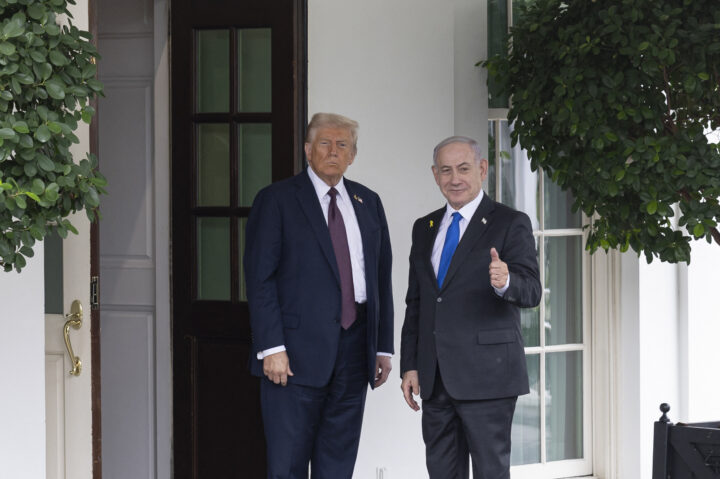
MEHMET ESER/Middle East Images/AFP via Getty Images
President Donald Trump welcomes Israeli Prime Minister Benjamin Netanyahu upon his arrival at the White House West Wing in Washington, DC, on September 29, 2025.
With Israeli Prime Minister Benjamin Netanyahu accepting President Donald Trump’s 20-point plan to end the war in Gaza at the White House on Monday, the ball is now in Hamas’ court.
Whether Hamas would agree to release the hostages first, before Israel makes any concessions other than stopping the fighting, remains to be seen. There is also newfound pressure on Qatar, a chief patron of Hamas, to convince the terror group to accept the deal.
The late Israeli elder statesman Abba Eban famously said, “The Arabs never miss an opportunity to miss an opportunity.” In readily accepting Trump’s plan, Netanyahu is counting on Hamas to do just that.
That’s not to say that Netanyahu opposes the plan. His calculus may be that he will be able to execute the parts he supports, while the aspects he finds less favorable are unlikely to materialize anyway — largely, he believes, due to the Palestinians’ own intransigence.
As Netanyahu noted in the press conference, the plan meets all of Israel’s war aims: Bringing back the hostages, dismantling Hamas — most of which Israel already did in the war — and making sure it no longer poses a threat to Israel, through demilitarization and deradicalization. Other elements of the plan that Israel has long said would be part of the “day after” for Gaza are a technocratic government with help from international partners, and the IDF retaining a buffer zone inside Gaza’s perimeter. Netanyahu also reportedly secured 11th-hour edits to the plan regarding the IDF’s withdrawal and Hamas’ disarmament prior to the press conference.
But the details are tricky.
For example, point 17 of the plan: “In the event Hamas delays or rejects this proposal, the above, including the scaled-up aid operation, will proceed in the terror-free areas handed over from the IDF to the [International Stabilization Force].”
In other words, if Hamas rejects the plan, humanitarian aid “without interference” — likely including dual use items that could be exploited by terrorist organizations — would still be immediately and significantly scaled up and managed by the United Nations and Red Crescent, among others. Once an international force is put together, the IDF would still be expected to retreat from areas in which it has defeated Hamas. And a transitional, technocratic government overseen by Trump and former British Prime Minister Tony Blair’s “Board of Peace” would be put into place.
All of that is meant to happen even if the hostages are not freed and Hamas refuses to lay down its arms.
Yet, Trump said that if Hamas rejects the plan: “You know, Bibi, you have the full backing to do what you have to do.” And Netanyahu made clear what that means to him — continuing the war: “Israel will finish the job by itself. This can be done the easy way or it can be done the hard way, but it will be done. We didn’t fight this horrible fight, sacrifice the finest of our young men, to have Hamas stay in Gaza.”
Arab countries that would potentially take part in the “Board of Peace” and the International Stabilization Fund have said repeatedly that they would not participate in administering Gaza until the war ended, which makes it unclear if, as the plan says, all of that will really happen if Hamas rejects the deal and the war continues.
Then there’s the part of the plan that is most controversial in Netanyahu’s political base: the potential involvement of the Palestinian Authority in governing Gaza, and the creation of a pathway to Palestinian statehood.
“Gaza will have a peaceful administration that is run neither by Hamas nor the Palestinian Authority,” Netanyahu said in the press conference.
Yet the text of the plan says that the Gaza transitional government will only stay in place “until such time as the Palestinian Authority has completed its reform program, as outlined in various proposals, including President Trump’s peace plan in 2020 and the Saudi-French proposal, and can securely and effectively take back control of Gaza.”
The 2020 proposal includes things such as “a constitution … that provides for freedom of press, free and fair elections, respect for human rights for its citizens” and more, as well as “transparent, independent, and credit-worthy financial institutions” and ending incitement.
Netanyahu said on Fox News’ “Sunday Briefing” that “if all of that is turned on its head, there’s a tremendous transformation … Good luck. Some people believe it happens. I don’t think it’s going to happen.”
The plan also says that the “credible pathway to Palestinian self-determination and statehood” would only happen “when the PA reform program is faithfully carried out.” Netanyahu appears to be calculating that Ramallah is unlikely to meet those conditions.
That being said, Netanyahu did sign a document that says unequivocally “we recognize [statehood] as the aspiration of the Palestinian people,” which is disturbing to some on the Israeli right, who argue that even acquiescence in principle is a problem.
While there is significant opposition to the plan from the right flank of Netanyahu’s governing coalition, it has been neutralized for now, in that most of the plan will not go to any kind of vote in the Cabinet. Any attempts to bring the government down over it would have to wait three weeks for the Knesset to come back from its recess, and even then they are likely to fail, with some of the opposition offering Netanyahu a “safety net.”
But as Netanyahu heads back to Israel having said “yes,” plenty of doubts remain as to whether this plan will actually be enacted. First, whether Hamas agrees, and then, new questions and challenges every step of the way.
Sen. Lindsey Graham sounded skeptical that Hamas would accept the deal: ‘Distrust and verify with these guys’

Amir Levy/Getty Images
Senator Lindsey Graham (R-SC) speaks at a press conference on US-Israel relations on February 17, 2025 at the Kempinski Hotel in Tel Aviv, Israel.
Senators reacted with cautious optimism — and a degree of skepticism — to President Donald Trump’s announcement on Monday of a sweeping deal that would end the war in Gaza, see the release of the remaining hostages and facilitate reconstruction of the Gaza Strip.
Sen. Lindsey Graham (R-SC) warned that the execution of the deal would require close monitoring of Hamas’ compliance and that long-term peace in the region will likely require eliminating Iran’s other proxies, in addition to Hamas.
“I hope Hamas agrees — we’ll get the hostages home. Distrust and verify with these guys,” Graham said. “A lot of loopholes if you don’t watch it, but I hope we can land this deal.”
“When you talk about normalizing the Mideast, I’m all for that. But after Oct. 7, we have to learn one thing: As long as radical Islamic terrorist groups exist, you can’t have a normal Mideast,” Graham continued. “I hope we can land this deal and bring the hostages home and start a new chapter in Gaza and the West Bank, but I will never support normalization until Hezbollah is dealt with. You cannot say the Mideast is a normal place as long as Hezbollah is a threat the way it is today.”
He said that he’s concerned that Hezbollah would replicate Hamas’ Oct. 7 attack if Israel and Saudi Arabia again begin to move toward normalization again before the Lebanese terror group is eliminated.
“If we do the Hamas deal, we should insist that the region deal with Hezbollah and take them both down, then eventually the Houthis,” he continued. “My takeaway of Oct. 7 is if you don’t have these radical groups in a box, you can never really achieve peace.”
Sen. John Cornyn (R-TX) said that there are “some details to be filled in, but I think by and large this seems like a very encouraging development.”
Sen. Rick Scott (R-FL) was hesitant to offer an assessment of the deal before Hamas had agreed to the terms.
“It’s the deal that hasn’t happened yet. It’d be nice. I mean, I guess it would be great if we get the hostages back and we get a ceasefire and we get to rebuild Gaza. That all sounds really good. I’m glad that Trump cares about this. It seems optimistic,” he told JI.
Sen. Kevin Cramer (R-ND) expressed some hesitation about engaging with the Qataris and taking a deal, but suggested Trump was ready to bring the conflict to a close.
“It’s bold. It’s gutsy on the president’s part. I just will believe it when I see it. I’m just so skeptical of one side in this, getting Qatar in there and involved,” Cramer told JI. “Clearly we’re playing along a little. I don’t know. I just don’t know. I think the timing for Trump is sort of like, ‘Okay, now’s the time [for a ceasefire]. We’ve done the dance long enough.’”
Sen. Ted Budd (R-NC) said he’s reviewing the plan, adding that the elimination of Hamas is a necessity.
“You can’t have Hamas promising the destruction of Israel,” he continued. “As long as there’s no threat, I see an opportunity here, but you can’t make a deal with somebody that wants to exterminate you.”
Senate Foreign Relations Committee chair Jim Risch (R-ID) praised the plan on X. “President Trump again shows his commitment to peace with his plan to bring all the hostages home, end the war in Gaza and transition to a future that allows the Palestinian people to prosper without Hamas’ terror schemes,” Risch said. “Anyone who wants a better future for the Palestinian people should join this pursuit of peace.”
Sen. John Kennedy (R-LA) told Jewish Insider he’s “glad they look like they’re moving toward peace.”
“I don’t think Israel is worried any longer about being popular. I think Israel was worried about its survival, and I respect that. And they’re going to do whatever it takes,” Kennedy continued. “Now, will Hamas accept it? I don’t know. I really don’t know. I hope they do. But if they don’t, I think Israel needs to continue to do what it’s been doing and wipe Hamas off the face of the earth.”
Democrats expressed hope that the deal would bring the war to a close.
Sen. Chris Coons (D-DE) told JI, “I’m encouraged the president’s engaging directly and saying this war must end. Humanitarian relief needs to go in, hostages need to come out, there needs to be a plan going forward for Gaza,” but said he hadn’t seen the details of Trump’s announcement.
Sen. Richard Blumenthal (D-CT) said that he was not familiar with the specifics of the plan. “If there’s a ceasefire and return of the hostages and humanitarian relief, bravo,” Blumenthal said.
Sen. Peter Welch (D-VT), one of the most vocal critics of Israel’s Gaza operations in the Senate, told JI he hadn’t reviewed the plan but “my main concern [is to] start getting food and medicine in. That has to happen immediately.”
Sen. Jeanne Shaheen (D-NH), the ranking member of the Foreign Relations Committee, said in a statement. “I call on Hamas to accept, and Israel to faithfully implement, the proposal laid out by the United States.”
Prior to the meeting, leading Senate Democrats had urged Trump to press Israeli Prime Minister Benjamin Netanyahu to accept a hostage deal that ends the war, as well as to pressure Netanyahu to rule out annexation of the West Bank.
Plus, new study suggests X is safe harbor for antisemitism
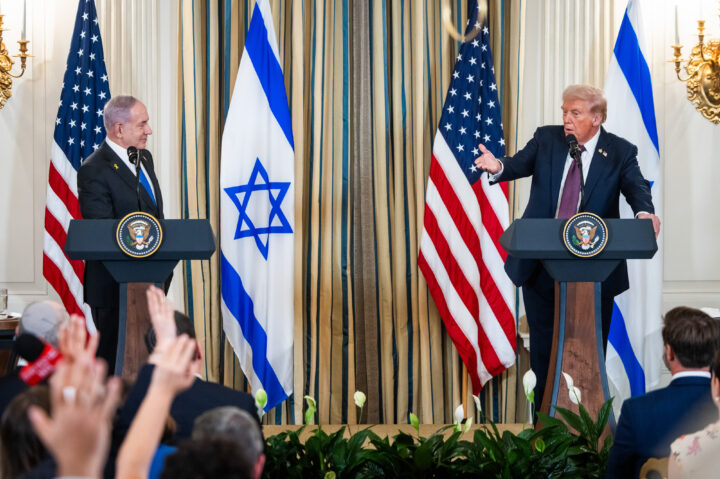
Jim Lo Scalzo/EPA/Bloomberg via Getty Images
President Donald Trump, right, and Benjamin Netanyahu, Israel's prime minister, during a news conference in the State Dining Room of the White House in Washington, DC, US, on Monday, Sept. 29, 2025.
Good Monday afternoon.
This P.M. briefing is reserved for our premium subscribers like you — offering a forward-focused read on what we’re tracking now and what’s coming next.
I’m Danielle Cohen-Kanik, U.S. editor at Jewish Insider and curator, along with assists from my colleagues, of the Daily Overtime briefing. Please don’t hesitate to share your thoughts and feedback by replying to this email.
📡On Our Radar
Notable developments and interesting tidbits we’re tracking
In a press conference this afternoon at the White House, President Donald Trump and Israeli Prime Minister Benjamin Netanyahu announced that Israel had agreed to sign onto the White House’s 20-point peace plan to end the war in Gaza.
The plan, which has not yet been agreed to by Hamas, would see the release of all of the remaining hostages in Gaza in exchange for an immediate end to the war and the release of 2,250 Palestinians in Israeli jails, including 250 serving life sentences. Hamas would be removed from power in Gaza with its members offered amnesty if they “commit to peaceful co-existence and to decommission their weapons.”
Netanyahu and Trump weren’t in lockstep on the future of Gaza, though. The Israeli PM said in his remarks that “Gaza will have a peaceful civilian administration that is run neither by Hamas nor by the Palestinian Authority,” while the White House’s plan says that the PA will control Gaza once the body has reformed (a process that could take years).
Even if Hamas rejects the plan, humanitarian aid operations will continue to be scaled up, and terror-free areas of Gaza will be handed over from the IDF to an international stabilization force. But Trump said that Israel will have the “full backing” of the U.S. to resume fighting in Gaza if Hamas does not accept.
“If Hamas rejects the deal — which is always possible, they’re the only one left. Everyone else has accepted it. But I have a feeling that we’re going to have a positive answer. But if not, as you know, Bibi, you’d have our full backing,” said Trump. Read JI’s coverage of the press conference here…
During their meeting beforehand in the Oval Office, Netanyahu and Trump held a phone call with Qatar’s prime minister, Sheikh Mohammed bin Abdulrahman al-Thani, where Netanyahu apologized for killing a Qatari serviceman in an attempted strike on Hamas leadership in Doha and promised not to violate Qatari sovereignty again.
The conversation came after Trump has repeatedly expressed his dissatisfaction with Israel’s decision to strike a major non-NATO U.S. ally without providing sufficient notice to the White House.
The apology was met with frustration and scorn from Netanyahu’s right-wing political allies and left-wing opponents in Israel. Finance Minister Bezalel Smotrich compared the apology to U.K. Prime Minister Neville Chamberlain’s appeasement of Adolf Hitler during World War II. Netanyahu’s “groveling apology to a state that supports and funds terror is a disgrace,” Smotrich said on X…
A New York Times/Siena College poll released today found dramatic declines in American support for Israel, with slightly more American voters saying they sympathize more with Palestinians (35%) than with Israelis (34%) for the first time since the Times started asking the question in 1998, though there remains a large segment of the population that is unsure or that sympathizes with both equally (31%).
Around 60% of voters said that Israel should end the war in Gaza “in order to protect against civilian casualties” even if the remaining hostages are not released and even if Hamas is not fully eliminated. Among Democrats, that figure is an overwhelming 81%.
The majority of the shifting sentiment against Israel comes from Democrats: 59% also think that Israel is intentionally killing Gazan civilians. Within the party, the biggest shift is coming from white, college-educated, older voters. In a similar poll two years ago, Democrats ages 45 and older “sympathized with Israel over Palestinians 2-to-1. That is now reversed, with 42% saying they sympathize more with Palestinians, compared with 17% who feel more sympathetic toward Israel”…
Among Israel’s detractors, New York City Democratic mayoral nominee Zohran Mamdani declined to denounce Hamas on Friday, when asked if he agreed with Netanyahu’s remarks at the U.N. General Assembly that Hamas is a terrorist group that needs to be destroyed.
“I’m not going to echo the words of Benjamin Netanyahu,” Mamdani said. “I can, however, share my own words and say them right here, which is that my politics is built on a universality. I can think of no better illustration of that than from the words of the hostage families themselves: Everyone for everyone.”
“What has been so infuriating to me and so many New Yorkers, frankly, is Benjamin Netanyahu’s use of the hostages as a justification to continue a war that has only continued to endanger the lives of those very hostages, as well as of so many Palestinians,” Mamdani said…
A new study by the Center for Countering Digital Hate and the Jewish Council for Public Affairs found that antisemitism is “thriving” on the social media platform X in an analysis of over 679,000 posts. The study found that X took action on only 36 out of the 300 most-viewed posts espousing antisemitic conspiracy theories and only four of them received community notes, which X owner Elon Musk has touted as the antidote to harmful content instead of increased moderation…
⏩ Tomorrow’s Agenda, Today
An early look at tomorrow’s storylines and schedule to keep you a step ahead
Keep an eye on Jewish Insider tomorrow morning for the latest reporting and analysis of the White House’s Gaza peace plan and a breakdown of the anti-Israel candidates running for all four open Chicago-area House seats in hotly contested Democratic primaries.
Tomorrow evening, Democratic Majority for Israel will host a virtual briefing with Rep. Greg Landsman (D-OH) and Jacob Magid, The Times of Israel‘s U.S. bureau chief, on the implications of today’s White House meeting, the status of the war, political developments in Jerusalem and Landsman’s reflections from his recent trip to Israel.
Stories You May Have Missed
BOWING OUT
Eric Adams’ campaign suspension may come too late to block Mamdani’s path to victory
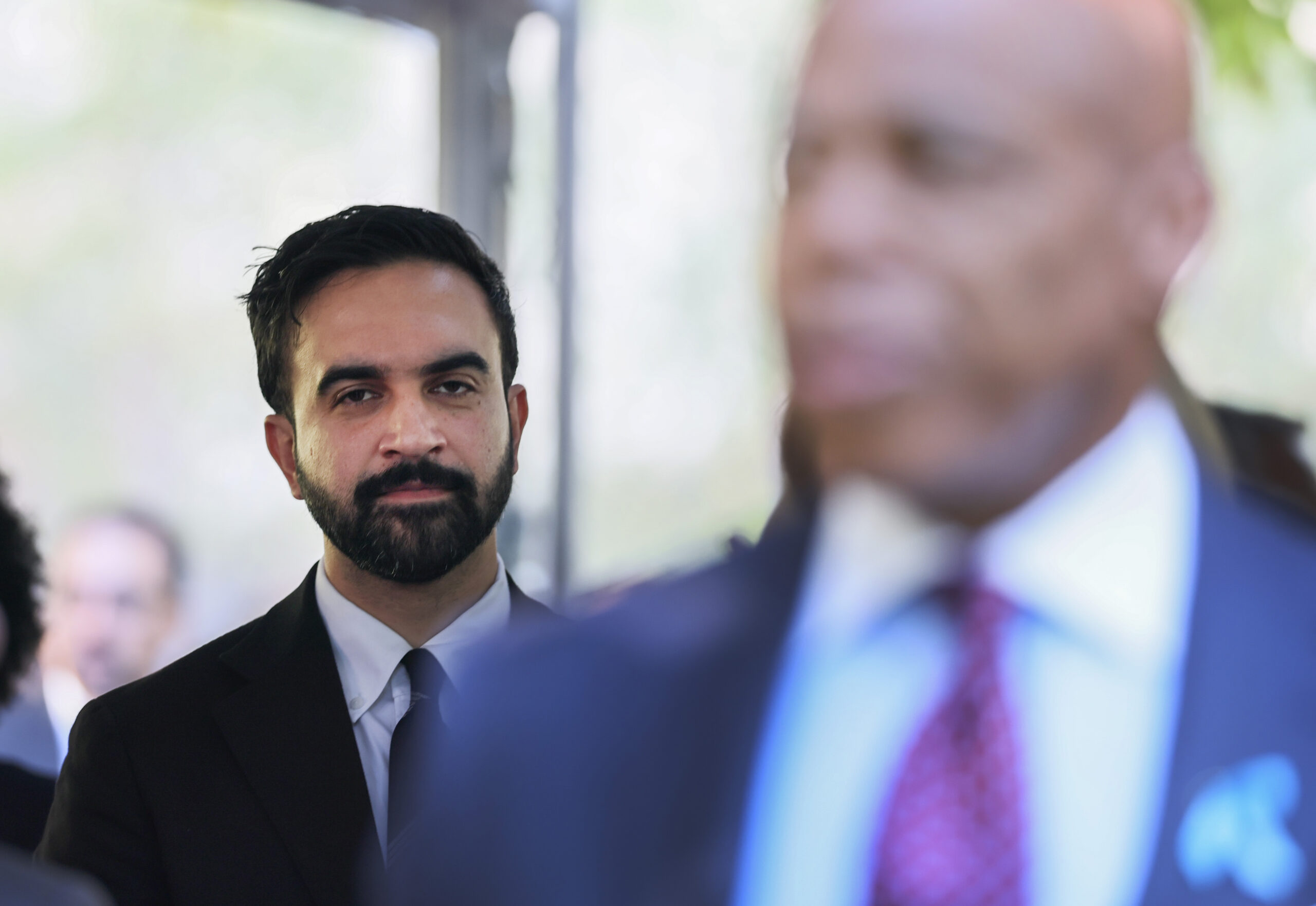
Individuals involved in the race told JI impediments remain to consolidating support behind Andrew Cuomo
INFLUENCER INSIGHTS
TikTok sale could be ‘consequential’ for Israel, Jews, Netanyahu tells influencers

‘We have to fight the fight’ on social media, shore up support on American right, Netanyahu says
But even as the Israeli prime minister embraced the deal, he indicated some disagreements with the specifics of the agreement

Jim Lo Scalzo/EPA/Bloomberg via Getty Images
President Donald Trump, right, and Benjamin Netanyahu, Israel's prime minister, during a news conference in the State Dining Room of the White House in Washington, DC, US, on Monday, Sept. 29, 2025.
President Donald Trump and Israeli Prime Minister Benjamin Netanyahu announced on Monday that Israel had agreed to sign onto the White House’s 20-point peace plan to end the war in Gaza, with Trump calling the development “one of the great days ever in civilization.”
Both leaders described the deal, which would release all of the remaining Israeli hostages in exchange for an immediate end of the war, as the starting point for greater regional integration, a goal that Trump described as “eternal peace in the Middle East.”
Senior Trump administration officials first introduced the plan last week in a meeting with Arab and Muslim leaders in New York, and Trump said he had buy-in from the Qataris, who have been a go-between in negotiations with Israel and Hamas, and that he had discussed the matter with the leaders of the United Arab Emirates and Saudi Arabia.
But the deal is not yet final: Hamas has not yet agreed to it, though Trump expressed hope that the terror group will do so. Trump said he would allow Netanyahu to continue the war with his “full backing” if Hamas does not agree to it.
“This can be done the easy way, or it can be done the hard way. But it has to be done,” Netanyahu said at the press conference. “All these goals must be achieved because we didn’t fight this horrible fight, sacrifice the finest of our young men, for Hamas to stay in Gaza.”
The plan would require the release of all the hostages still held by Hamas back to Israel within 72 hours, and an immediate end to the war, according to a copy of the plan published by the White House. In exchange, Israel would release 250 Palestinians serving life sentences in Israeli jails, along with nearly 2,000 Gazans detained since the Oct. 7 attacks in 2023.
The first principle of the plan is that Gaza would be deradicalized, with Hamas out of power and transitional mechanisms in place to take over governance of the beleaguered territory. Amnesty would be offered to Hamas members “who commit to peaceful co-existence and to decommission their weapons” once the hostages are returned. Hamas members who wish to leave would have safe passage to do so, although the plan does not explicitly state that they will be required to leave. The plan would also surge aid to Gaza through the United Nations and other international mechanisms as soon as the hostages are released.
An international transitional body, with Trump as chair and former U.K. Prime Minister Tony Blair heavily involved, would oversee the redevelopment of Gaza until the Palestinian Authority has been reformed and is able to take over leadership of the Gaza Strip. The U.S. and other Arab and international partners would develop a temporary stabilization force to deploy in Gaza, and Trump would oversee the creation of an economic development plan to facilitate investments in the seaside territory.
“I believe that today we are taking a critical step towards both ending the war in Gaza and setting the stage for dramatically advancing peace in the Middle East, and I think beyond the Middle East, with very important Muslim countries,” Netanyahu said. “We’re giving everybody a chance to have this done peacefully, something that will achieve all our war objectives without any further bloodshed.”
Several Muslim leaders announced their support for the deal, including the prime minister of Pakistan and the Emirati foreign minister.
As Trump and Netanyahu stood side by side, each heaping praise upon the other, they were not entirely on the same page about all aspects of the deal — in particular the role of the Palestinian Authority in the future governance of Gaza, which Netanyahu has all but written off, despite that goal listed as an objective in the White House’s plan.
“Gaza will have a peaceful civilian administration that is run neither by Hamas nor by the Palestinian Authority,” Netanyahu said, a contrast to the plan’s language that the PA — once it is reformed, an objective that could take years — will control Gaza.
The White House deal also recognizes “Palestinian self-determination and statehood” as “the aspiration of the Palestinian people.” Netanyahu, however, has said repeatedly that a Palestinian state is out of the question.
Trump did not refer to the plan’s language about Palestinian statehood in his remarks, instead offering leeway to Netanyahu. “Prime Minister Netanyahu is very clear about his opposition to a Palestinian state,” Trump said. “Several countries have foolishly recognized the Palestinian state.”
The leaders’ comments followed a three-hour meeting between Trump and Netanyahu. During the meeting, Trump orchestrated a phone call between Netanyahu and the Qatari emir, which Trump said afterward was a “a heart-to-heart conversation” in which Netanyahu apologized for Israel’s attack on Doha last month that targeted Hamas leaders and killed a Qatari security guard. The three nations agreed to launch a “formal trilateral mechanism” to “enhance mutual security, correct misperceptions and avoid future misgivings.”
The full text of the plan says that even if Hamas rejects the plan, the scaled-up humanitarian aid operation will continue, and terror-free areas will be handed over from the Israel Defense Forces to the international stabilization force. But Trump said that Israel will have the “full backing” of the U.S. to resume fighting in Gaza if Hamas does not accept the plan.
“If Hamas rejects the deal — which is always possible, they’re the only one left. Everyone else has accepted it. But I have a feeling that we’re going to have a positive answer. But if not, as you know, Bibi, you’d have our full backing,” said Trump.
White House readout: ‘Prime Minister Netanyahu expressed his deep regret that Israel’s missile strike against Hamas targets in Qatar unintentionally killed a Qatari serviceman’
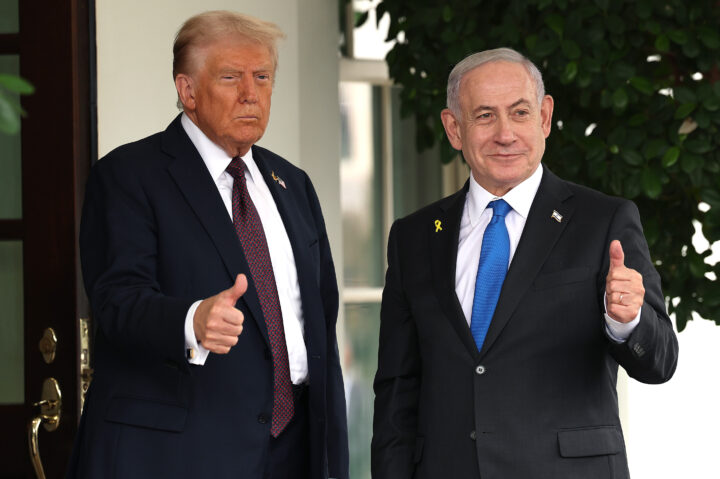
Win McNamee/Getty Images
President Donald Trump (L) greets Israeli Prime Minister Benjamin Netanyahu as he arrives at the White House on September 29, 2025 in Washington, DC.
During a meeting between Israeli Prime Minister Benjamin Netanyahu and President Donald Trump at the White House on Monday, Netanyahu apologized to Qatar’s prime minister, Sheikh Mohammed bin Abdulrahman al-Thani, for killing a Qatari serviceman in an attempted strike on Hamas leadership in Doha and promised not to violate Qatari sovereignty again.
The strike, which reportedly failed to eliminate any members of Hamas’ top political leadership, caused a public rift between the U.S. and Israel. The Trump administration attempted to warn Qatar about the strike before it happened and Trump said he promised Qatar that such attacks would not be repeated in the future.
According to a readout from the White House, “Prime Minister Netanyahu expressed his deep regret that Israel’s missile strike against Hamas targets in Qatar unintentionally killed a Qatari serviceman” and that “in targeting Hamas leadership during hostage negotiations, Israel violated Qatari sovereignty and affirmed that Israel will not conduct such an attack again in the future.”
According to remarks released by the Israeli government, Netanyahu told Al Thani, “I want you to know that Israel regrets that one of your citizens was killed in our strike. I want to assure you that Israel was targeting Hamas, not Qataris. I also want to assure you that Israel has no plan to violate your sovereignty again in the future, and I have made that commitment to the president.”
Netanyahu also acknowledged Qatar’s “grievances against Israel” as well as Israel’s own issues with Qatar “from support for the Muslim Brotherhood to how Israel is portrayed on Al Jazeera to support for anti-Israel sentiment on college campuses.”
Trump, during the call, “expressed his desire to put Israeli-Qatar relations on a positive track after years of mutual grievances and miscommunications,” and the three leaders agreed to establish a trilateral mechanism “to enhance coordination, improve communication, resolve mutual grievances, and strengthen collective efforts to prevent threats,” per the White House release.
According to his remarks, Netanyahu said that the mechanism is intended to “address both our countries outstanding grievances.”
Netanyahu and Al Thani “underscored their shared commitment to working together constructively and clearing away misperceptions, while building on the longstanding ties both have with the United States,” according to the White House readout.
The three leaders discussed efforts to end the war in Gaza as well as “the need for greater understanding between their countries.”
Al Thani “emphasiz[ed] Qatar’s readiness to continue contributing meaningfully to regional security and stability.”
Israel and Qatar do not have formal relations and public high-level diplomatic engagements between their leaders are rare.
From the Israeli side, news of the apology has been met with frustration and scorn from Netanyahu’s political allies and opponents.
Finance Minister Bezalel Smotrich compared the apology to U.K. Prime Minister Neville Chamberlain’s appeasement of Adolf Hitler during WWII. Netanyahu’s “groveling apology to a state that supports and funds terror is a disgrace,” Smotrich said on X.
National Security Minister Itamar Ben-Gvir expressed continued support for the Qatar strike, calling it “important, just, and supremely moral.”
Orit Strock, a member of the Israeli Cabinet, asked, “Did the Emir of Qatar apologize to PM Netanyahu for Oct. 7?”
Yair Golan, chairman of opposition party The Democrats, called the apology “a humiliation” and said that, “In order to beat Hamas, we need to replace Bibi and Qatar.”
Israeli political analyst and author Amit Segal said, “The Qatari scum have not condemned the October 7 massacre to this day. Even if there is a diplomatic need for this, it is repulsive and disgusting.”
Haaretz reporter Amir Tibon and others expressed anger that Netanyahu had apologized to the Qataris before he apologized to Israeli victims of Oct. 7.
Nadav Pollack, a lecturer at Israel’s Reichman University, said that the apology and promise show that Qatar holds stronger influence in the White House than Israel.
Foundation for Defense of Democracies CEO Mark Dubowitz downplayed the significance of the apology.
“Apology or not, Qatar is on notice that Israel will eliminate Hamas terrorists where and when it chooses,” Dubowitz told Jewish Insider. “The overarching message is more important: Get your Muslim Brotherhood cousins to agree to a deal, and release the hostages, or next time we won’t miss.”
Rich Goldberg, a senior advisor at FDD and a former Trump administration official, responded similarly.
“If that’s the worst thing Israel has to do to save face while Qatar acquiesces to U.S. pressure to secure the release of all hostages, let it be the last insult endured,” Goldberg told JI. “There is a cold dark place in hell awaiting all Hamas sponsors, and I expect the Mossad will help them find that place at the right time in the future.”
Both Dubowitz and Goldberg have publicly maintained that the U.S. was likely aware of and approved of the Israeli strikes in Qatar, in spite of Trump’s own public condemnations and denials.
Former U.S. Ambassador to Israel Dan Shapiro, a senior fellow at the Atlantic Council and former top Pentagon official in the Biden administration, told JI that the apology “was a useful diplomatic maneuver, likely pre-scripted, to ensure Qatar would do its part to deliver a yes from Hamas on release of all hostages and disarmament. Trump pressuring Netanyahu was necessary, but no less needed was his pressure on Qatar. The apology gave him that leverage.”
Michael Makovsky, the CEO of the Jewish Institute for National Security of America said that “Based on what we know, it’s understandable that Netanyahu felt compelled to apologize to the Qatari PM. Pres Trump asked him to do it, and Trump has collaborated with Israel in the 12-Day War, and backed Israel on Gaza.”
“But it’s unfortunate, because Israel doesn’t owe Qatar an apology—Qatar owes Israel an apology for supporting Hamas for so many years, by hosting its leaders, funding its operations, offering verbal support, etc.,” Makovsky continued. “Qatar should also apologize for spreading anti-Israel (and anti-American) hate on its al-Jazeera news organization. The bigger question is why Pres. Trump is so favorable to Qatar.”
Dana Stroul, the research director for the Washington Institute for Near East Policy and Shapiro’s predecessor at the Defense Department in the Biden administration, said that the statement echoes past engagements.
“It’s almost reverting to traditional US diplomacy of facilitating rapprochement between long-standing US partners,” Stroul said. “Recall then-President Obama brokering a phone call and an Israeli apology to Turkey in 2013 for its role in a 2010 Gaza flotilla incident. It also is a critical step in coalescing Arab support for providing meaningful support and resources to post war Gaza.”
She added that the administration “definitely believes it needs Qatar on its side.”
“When you read all of the various statements from the Trump administration about the peace and de-escalation agreements they are brokering, Qatar is very frequently thanked in these statements for its mediation role,” she explained.
If Hamas does not agree to the plan, it would still call for Israel to withdraw from parts of Gaza where Hamas is out of power and for an international stabilization force to take over

SAUL LOEB/AFP via Getty Images
President Donald Trump shakes hands with Israeli Prime Minister Benjamin Netanyahu during a meeting in the Oval Office of the White House in Washington, DC, on April 7, 2025.
As Israeli Prime Minister Benjamin Netanyahu heads into his meeting with President Donald Trump today, the key question is what kind of Gaza ceasefire plan he will agree to — and how Hamas will respond.
“We have a real chance for GREATNESS IN THE MIDDLE EAST,” Trump posted on Truth Social on Sunday, ahead of his meeting with Netanyahu. “ALL ARE ON BOARD FOR SOMETHING SPECIAL, FIRST TIME EVER. WE WILL GET IT DONE!!! President DJT.”
Netanyahu was more circumspect. “I hope we can make it a go because we want to free our hostages,” he told Fox News on Sunday.
“He won’t say no to Trump,” a source in the prime minister’s delegation said. But what Netanyahu has been saying is something like, “yes, but.”
While Trump clearly would like to make a big announcement at the end of Netanyahu’s White House meeting, having repeatedly said in public that the war will soon end, he has left out the specifics.
A version of the plan that Trump shared with Arab leaders has leaked, but the administration has not made it public or talked much about specific goals beyond ending the war and freeing the hostages. Trump’s Middle East Envoy Steve Witkoff and Jared Kushner, who held Witkoff’s role in the first Trump administration, met with Netanyahu twice in New York and again in Washington, quietly working out the details.
Among the elements of the plan Trump shared with a group of Arab countries at the U.N. General Assembly last week, are that the war would end and Hamas would release the 48 remaining hostages, 20 of whom are thought to be alive, within 48 hours of the ceasefire taking effect. In exchange, Israel would release over 1,000 Palestinian prisoners, including hundreds serving life sentences for serious acts of terror. Israel would not occupy or annex Gaza, and would gradually withdraw from territory.
If Hamas does not agree to the plan, it would still call for Israel to withdraw from parts of Gaza where Hamas is out of power and for an international stabilization force to take over.
Gaza would be deradicalized and demilitarized, and redeveloped, with a surge of aid entering the area. At first, Gaza would be administered by Palestinian technocrats supervised by a U.S.-backed international body with Arab and European countries taking part. This administration is meant to continue until reforms are completed in the Palestinian Authority.
Ultimately, the plan states, it may create the conditions for a pathway to Palestinian statehood, and the U.S. would facilitate a dialogue between Israel and the Palestinians.
The plan also marks a major shift in Trump administration policy. While the president said in February that all residents should leave Gaza, which would then be turned into a “Riviera,” it now says that Gazans would be encouraged to stay and build their future.
The plan contradicts Israel’s conditions to end the war in a number of ways, including that Israel retain a military presence along Gaza’s periphery, security control of Gaza and be allowed to strike anytime it sees terror rearing its head again.
Netanyahu also made clear in his speech to the UNGA on Friday that a Palestinian state is not acceptable to Israel, saying that “giving the Palestinians a state one mile from Jerusalem after Oct. 7 is like giving Al-Qaida a state one mile from New York City after Sept. 11. This is sheer madness. It’s insane, and we won’t do it.” He said in the interview on Fox News on Sunday that he was skeptical the PA could undergo such a “tremendous transformation.”
At home, Netanyahu faces pressure in both directions. Coalition partners like National Security Minister Itamar Ben-Gvir, who said Netanyahu has “no mandate to end the war without defeating Hamas,” and Finance Minister Bezalel Smotrich who publicly stated his red lines on Monday, including full Israeli security control of Gaza, a permanent IDF presence along Gaza’s perimeter and no Qatari or PA involvement. Others on the right say that the plan gives too much to the Palestinians without demanding enough in return. A delegation of West Bank mayors flew to the U.S. over the weekend to try to talk Netanyahu into insisting on annexation.
Yet, at the same time, some in Likud have been quietly urging Netanyahu to accept the broader strokes of the plan — the return of the hostages and demilitarization of Gaza – to bring about the end of the war. Foreign Minister Gideon Sa’ar said he trusts Netanyahu “to represent Israel’s interests as needed in talks with President Trump.”
While Netanyahu may be facing pressure from Trump to return to Israel with a ceasefire plan to enact, the quiet diplomacy — at least by Trump administration standards — indicates that they may give him some time and space to decide.
Yet there is another deadline ahead. Between all of the sports, culture, arms and other boycotts, there is a far more consequential threat emerging: the potential suspension of free trade between Israel and the EU, its largest trading partner, until at least 2027, which could send Israel’s economy into a tailspin.
The European Commission is set to vote on the matter on Oct. 20, and it requires a qualified majority to pass. Germany, Italy, the Czech Republic and Hungary are on Israel’s side, but whether that will be enough remains to be seen. A ceasefire agreement could put a stop to Brussels’ initiative.
And lest we forget, there’s the likelihood that Hamas will reject the plan. While there are elements of it that could go forward without Hamas’ acquiescence, for Israel freeing the hostages is a necessary condition for the reconstruction of Gaza.
Less than one-quarter of House Democrats signed the letter, even as several European allies recognized a Palestinian state at the U.N.

Chip Somodevilla/Getty Images
Rep. Ro Khanna (D-CA) leaves the U.S. Capitol on March 13, 2024 in Washington.
Forty-seven progressive House Democrats, led by Rep. Ro Khanna (D-CA), signed onto a letter to President Donald Trump and Secretary of State Marco Rubio calling for the U.S. to recognize a Palestinian state on the heels of similar decisions by European allies last week.
“It has long been acknowledged by much of the international community and previous U.S. administrations of both major political parties that a Palestinian state recognized as a full and equal member of the community of nations is necessary to fulfill the legitimate national rights of the Palestinian people and ensure the state of Israel’s survival as the democratic homeland of the Jewish people,” the letter, which was first reported on by Jewish Insider, reads.
The lawmakers argue that because the current Israeli government opposes a two-state solution — a position currently shared by much of Israeli society — and is “actively undermin[ing]” the prospects of an independent Palestinian state, “meaningful action is necessary to join the majority of the world in codifying Palestinian statehood and to unlock the potential for a broader regional peace and security arrangement.”
Trump vowed last week week that he would not allow Israel to annex the West Bank.
The letter also claims that recognizing Palestinian statehood would make reform of the Palestinian Authority “far more achievable and sustainable.”
Signatories to the letter include Reps. Becca Balint (D-VT), Donald Beyer (D-VA), André Carson (D-IN), Greg Casar (D-TX), Joaquin Castro (D-TX), Judy Chu (D-CA), Danny Davis (D-IL), Madeleine Dean (D-PA), Diana DeGette (D-CO), Chris Deluzio (D-PA), Mark DeSaulnier (D-CA), Maxine Dexter (D-OR), Lloyd Doggett (D-TX), Veronica Escobar (D-TX), Dwight Evans (D-PA), Bill Foster (D-MA), Maxwell Frost (D-FL), John Garamendi (D-CA), Chuy García (D-IL), Sylvia Garcia (D-TX), Robert Garcia (D-CA), Al Green (D-TX), Val Hoyle (D-OR), Jared Huffman (D-CA), Jonathan Jackson (D-IL), Sara Jacobs (D-CA), Pramila Jayapal (D-WA), Hank Johnson (D-GA), Marcy Kaptur (D-OH), Zoe Lofgren (D-CA), Stephen Lynch (D-MA), Betty McCollum (D-MN), James McGovern (D-CA), Chellie Pingree (D-ME), Mark Pocan (D-WI), Mike Quigley (D-IL), Emily Randall (D-WA), Mary Gay Scanlon (D-PA), Jan Schakowsky (D-IL), Bennie Thompson (D-MS), Mike Thompson (D-CA), Jill Tokuda (D-HI), Paul Tonko (D-NY), Nydia Velázquez (D-NY), Maxine Waters (D-CA) and Bonnie Watson Coleman (D-NJ).
Dexter and Garcia were both beneficiaries of significant outside spending from AIPAC’s United Democracy Project super PAC in their primary races, running against farther-left anti-Israel opponents.
Balint and Schakowsky are both Jewish. Davis, Evans and Schakowsky are retiring from Congress at the end of their current terms.
Many of the furthest-left lawmakers in the House, including some of the Jewish state’s most outspoken critics, did not sign onto Khanna’s letter, nor did some of the more moderate Democrats backing a concurrent effort to place strict restrictions on U.S. aid to Israel.
The letter is backed by groups including American Muslims for Palestine, DAWN, Emgage Action, Indivisible, J Street, MoveOn, MPower, Muslim Public Affairs Council, New Jewish Narrative and the Quincy Institute.
There is a notable split on this issue within the Democratic caucus: Khanna’s letter follows a letter from 30 moderate pro-Israel Democrats condemning unilateral recognition of a Palestinian state as “performative” and saying that doing so risks “emboldening Hamas, entrenching division, and undermining the very legitimacy and peace such recognition purports to advance.”
Plus, what the TikTok sale means for online hate speech
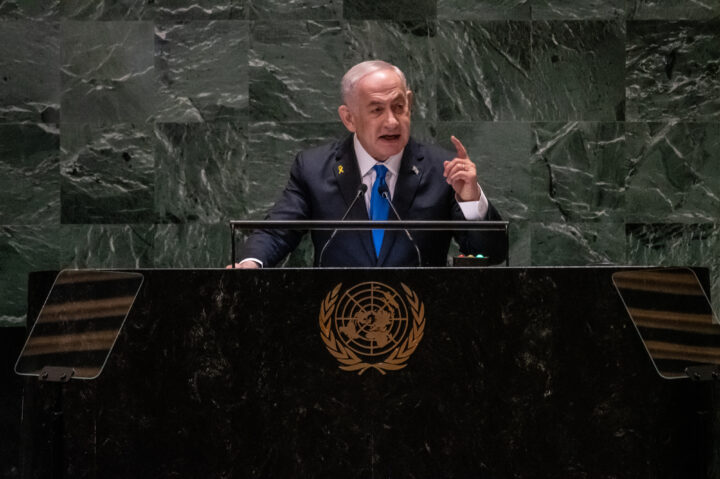
Stephanie Keith/Getty Images
Israeli Prime Minister Benjamin Netanyahu speaks during the United Nations General Assembly (UNGA) at the United Nations headquarters on September 27, 2024 in New York City.
Good Friday morning.
In today’s Daily Kickoff, we cover President Donald Trump’s meeting with Turkish President Recep Tayyip Erdogan yesterday as well as his pledge not to allow Israel to annex the West Bank, and preview Israeli Prime Minister Benjamin Netanyahu’s speech at the UNGA today. We explore how the U.S. investors set to take over the majority of TikTok could impact the issue of antisemitism on the platform and report on Zohran Mamdani’s Rosh Hashanah visit to a Brooklyn synagogue well-known for its anti-Zionist activism. We also report on Rob Malley’s remarks yesterday about the closure of the classified information investigation into his actions as the Biden administration’s Iran envoy. Also in today’s Daily Kickoff: May Mailman, Tony Blair and Jason Greenblatt.
Today’s Daily Kickoff was curated by Jewish Insider Executive Editor Melissa Weiss and Israel Editor Tamara Zieve, with assists from Gabby Deutch, Marc Rod and Danielle Cohen-Kanik. Have a tip? Email us here.
For less-distracted reading over the weekend, browse this week’s edition of The Weekly Print, a curated print-friendly PDF featuring a selection of recent Jewish Insider and eJewishPhilanthropy stories, including: Post-Paramount sale, Shari Redstone is ‘full speed ahead’ on addressing antisemitism; Shomer Collective launch Shiva Circle initiative to offer ‘life jacket for grievers’; Concern mounts in Jerusalem as Qatar, Egypt set to take key roles in UNESCO. Print the latest edition here.
What We’re Watching
- Israeli Prime Minister Benjamin Netanyahu will address the U.N. General Assembly at 9 a.m. ET. Netanyahu met with U.S. special envoy Steve Witkoff and Jared Kushner yesterday in New York.
- The U.N. Security Council is set to vote later today on a Russia– and China-led resolution delaying the implementation of snapback sanctions on Iran.
- The traveling Nova exhibition opens today in Boston.
- In London, center-left officials, including Illinois Gov. JB Pritzker, former Transportation Secretary Pete Buttigieg, U.K. Prime Minister Keir Starmer and Australian Prime Minister Anthony Albanese are gathering for the Global Progress Action Summit.
What You Should Know
A QUICK WORD WITH JI’S LAHAV HARKOV
Israeli Prime Minister Benjamin Netanyahu will have much to respond to when he stands in front of the United Nations General Assembly’s green marble wall today: a cascade of Palestinian state recognitions by Western countries, a flotilla of activists, influencers and parliamentarians — protected by Spanish and Italian naval ships — and accusations of genocide leveled from the UNGA stage.
On the tarmac at Ben Gurion Airport on Wednesday, Netanyahu vowed to “tell our truth — citizens of Israel, the truth of IDF soldiers, of our state.”
“I will condemn those leaders who, instead of condemning the murderers, rapists and burners of children, want to give them a state in the heart of Israel. This will not happen,” Netanyahu said ahead of his departure from Israel.
Netanyahu also plans on attacking what he perceives as the moral bankruptcy of countries he sees as rewarding the perpetrators of the Oct. 7 attack and casting Israel as a villain. His arrival in New York was accompanied by an advertising campaign launched by his office on billboards and trucks driving around Turtle Bay and Times Square with the message “Remember October 7.” The signs also feature a QR code that leads to a site depicting the atrocities of that day.
“The goal of the campaign is to remind world leaders and the public about the atrocities perpetrated by Hamas and the unbelievable brutality of the terrorist organization that continues to hold 48 hostages in captivity in Gaza,” Netanyahu’s office said.
Ahead of the speech, Wing of Zion — Israel’s version of Air Force One — took a route that is hundreds of kilometers longer than usual, apparently to avoid the airspace of countries that might act on the International Criminal Court’s warrant for Netanyahu’s arrest. Wing of Zion flew from Israel over the Mediterranean to Greek and Italian airspace, and then continued crossing over the Mediterranean until it reached the Atlantic Ocean.
The route was longer than the one he took to the U.S. in July, which overpassed France. A French diplomatic source said that Jerusalem asked Paris for authorization to fly over its airspace, which it provided, but the plane took another route anyway.
PLATFORM PIVOT
TikTok’s U.S. takeover: Will it curb antisemitic content?
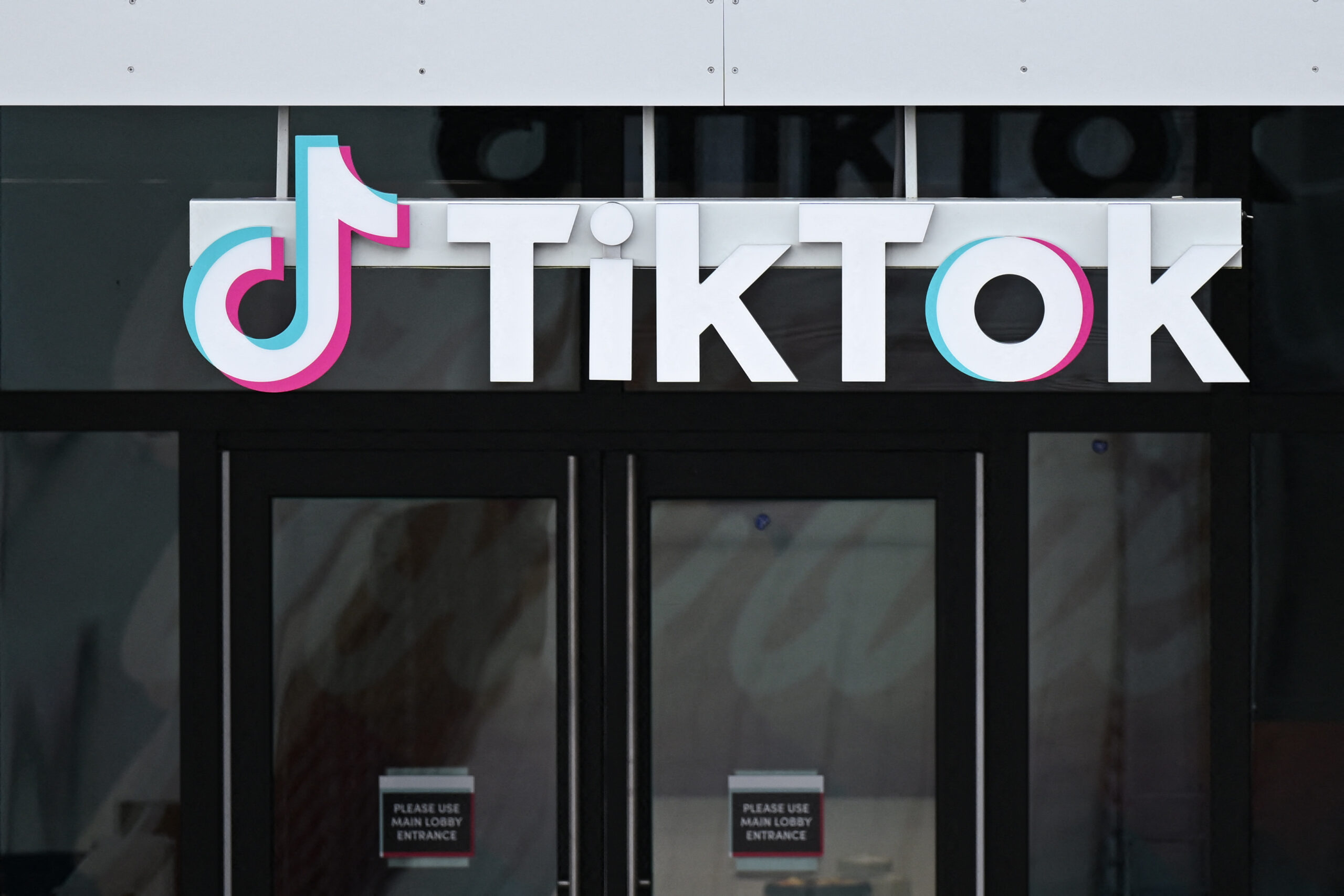
A new set of American power players appears set to take over ownership of TikTok’s U.S. business, a move pushed by Congress due to national security concerns over TikTok parent company ByteDance’s ties to the Chinese government and broader societal concerns with extremist, divisive and harmful content often funneled to users through the app’s powerful algorithm. That algorithm is now expected to be licensed by the American software company Oracle, which would also manage the app’s security. With new ownership comes one key question about the transfer of TikTok from Chinese to American control, Jewish Insider’s Gabby Deutch reports: Will American owners, with no ties to the Chinese Community Party, be more responsive to concerns about the proliferation of antisemitism, hate and extremism on the platform?
Wait and see: Anti-hate experts at the Anti-Defamation League and the U.K.’s Institute for Strategic Dialogue cautioned that it’s too soon to know, and that new ownership does not necessarily mean a major change in policy — or that a change would necessarily be in the direction of more content moderation. After all, TikTok’s algorithm, which feeds users personalized content it expects them to like via the app’s For You Page, is the source of the company’s success, because the more that users enjoy the content being recommended to them, the more time they spend on the app.
HOLDING THE LINE
Trump pledges he will not allow Israel to annex West Bank
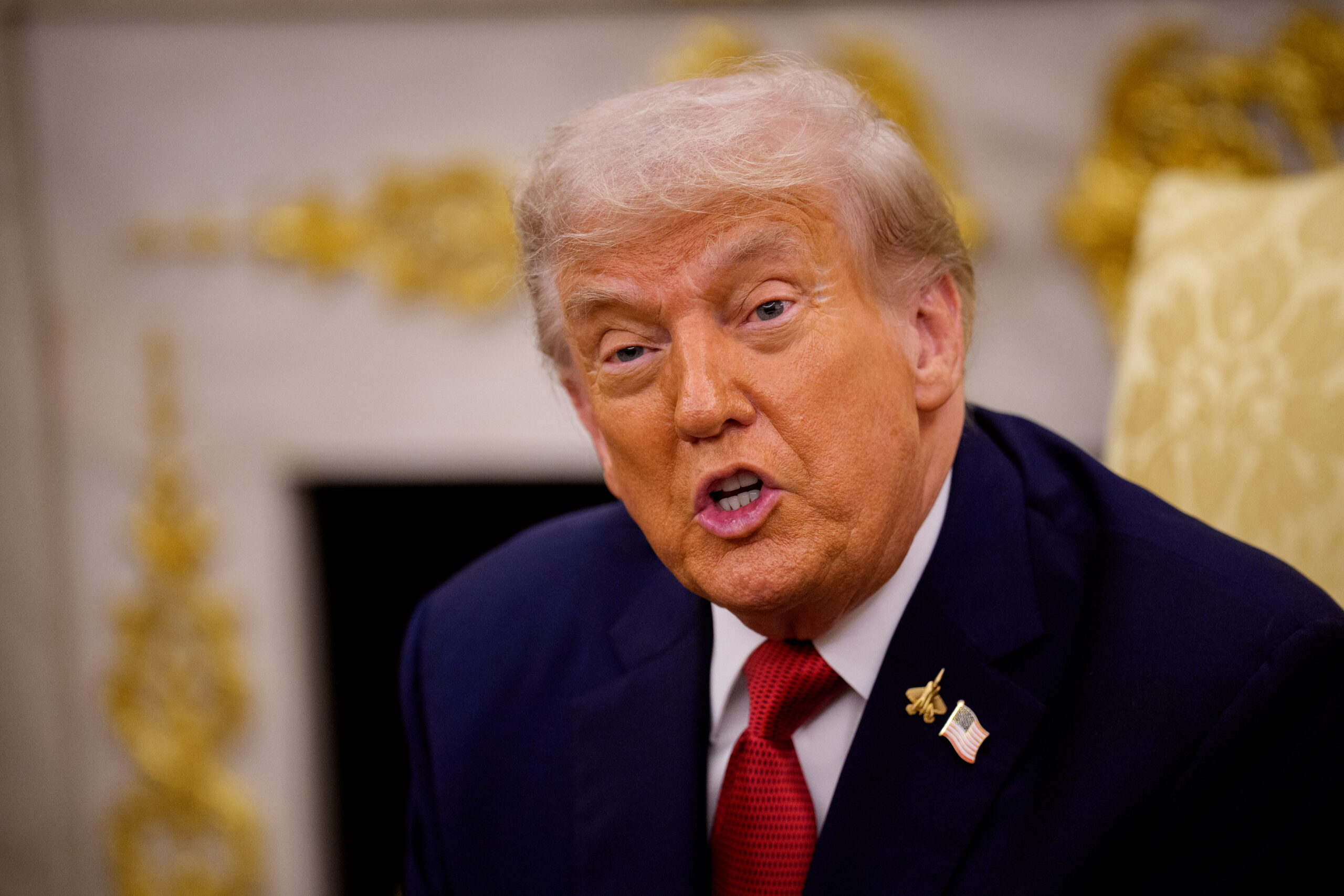
President Donald Trump pledged on Thursday that he will not allow Israel to annex the West Bank, the first time Trump has addressed the matter in his second term. Asked about reports that he told Arab leaders this week he would not permit Israel to make the move, Trump confirmed to reporters in the Oval Office that he opposes annexation, Jewish Insider’s Gabby Deutch and Danielle Cohen-Kanik report.
What he said: “I will not allow Israel to annex the West Bank, nope, I will not allow it. It’s not gonna happen,” he said, hours after a meeting with Turkish President Recep Tayyip Erdogan. Asked if he spoke with Israeli Prime Minister Benjamin Netanyahu about the issue, Trump said, “Yeah, but I’m not going to allow it. Whether I spoke to him or not — I did — but I’m not allowing Israel to annex the West Bank. There’s been enough, it’s time to stop now.”
In agreement: Jason Greenblatt, a key architect of the Abraham Accords, joined Trump in coming out against the Israeli government’s reported plans to annex portions of the West Bank, saying on Thursday evening that it was the wrong time to do so, eJewishPhilanthropy’s Nira Dayanim reports for Jewish Insider.
TALKING TURKEY
Alongside Erdogan, Trump suggests he’ll permit Turkey to buy F-35 fighter jets
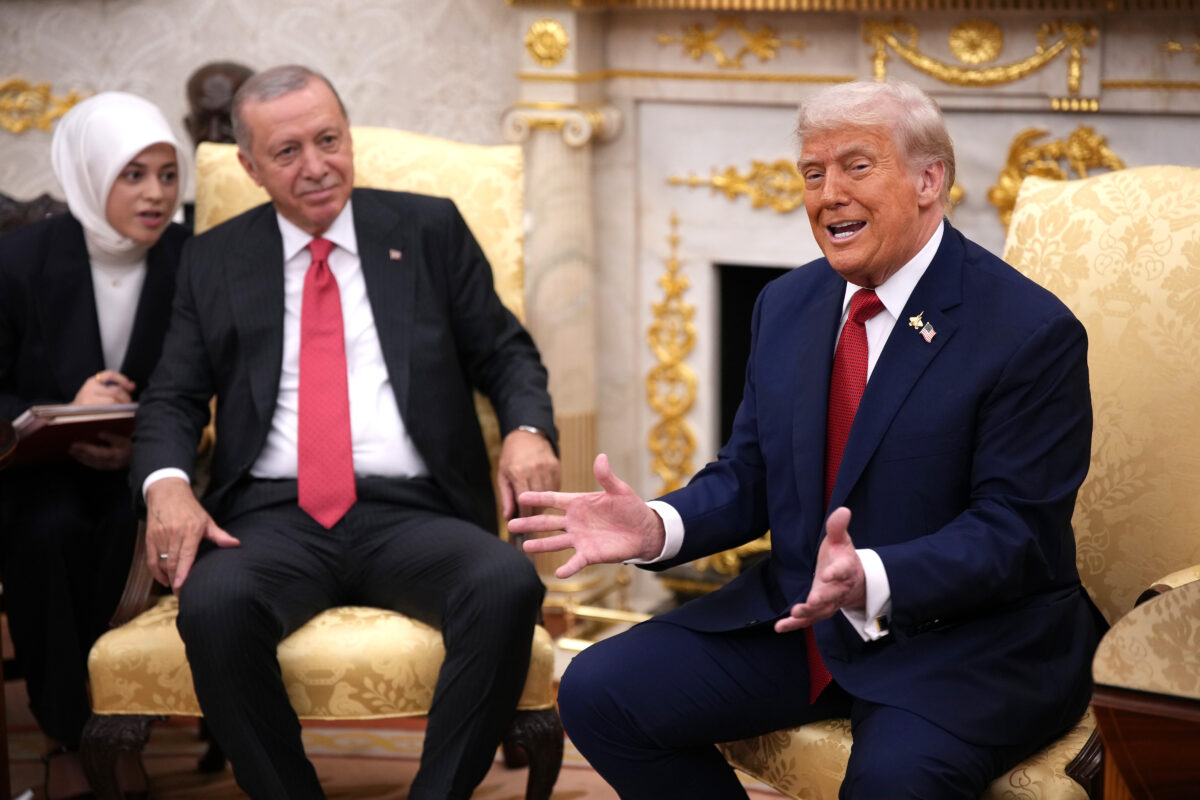
President Donald Trump suggested on Thursday that he was likely to permit Turkey to purchase F-35 fighter jets as soon as “the end of the day,” ending a nearly eight-year blockade on Ankara’s acquiring the state-of-the-art fighter jet as a result of its 2017 purchase of a Russian S-400 missile system, Jewish Insider’s Emily Jacobs reports.
Give-and-take: Speaking to reporters from the Oval Office alongside Turkish President Recep Tayyip Erdogan ahead of a meeting between the two and their respective teams, Trump said without mentioning the F-35s or the less-advanced F-16 jets by name that he expected the Turkish leader would “be successful with buying the things” he would “like to buy.” Speaking at the outset of his meeting with Erdogan, Trump said, “He needs certain things, and we need certain things, and we’re going to come to a conclusion. You’ll know by the end of the day.”
Damascus dealings: Stability in Syria could help ease tensions between Israel and Turkey — two countries with competing interests in the region — and the U.S. has a key role to play in shaping the security agreements needed to get there, experts from the Middle East Institute said Thursday during a panel titled “Can Turkey and Israel Find Common Ground in Syria?” Jewish Insider’s Haley Cohen reports.
VENUE CHOICE
On Rosh Hashanah, Mamdani visits synagogue known for anti-Zionist activism
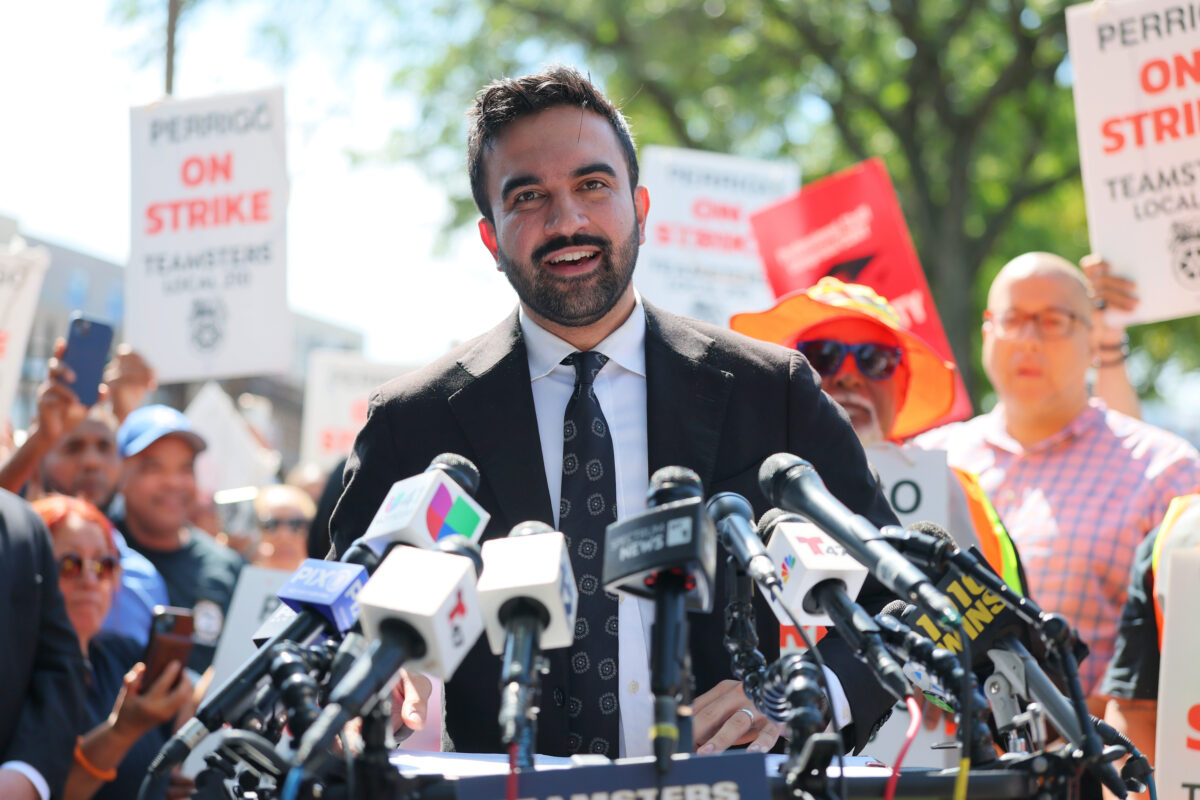
Zohran Mamdani, the Democratic nominee for mayor of New York City, attended his first Rosh Hashanah service on Monday night at a Brooklyn synagogue well-known for its anti-Zionist activism. The visit to Kolot Chayeinu, a nondenominational synagogue in Park Slope that has drawn controversy over its anti-Zionist orientation, comes as Mamdani is seeking to engage in increased outreach to Jewish voters ahead of the November election, Jewish Insider’s Matthew Kassel reports.
Polarizing position: But the venue choice also underscores his polarizing position in the broader Jewish community — where many Jewish leaders have continued to raise alarms over his anti-Israel policies and refusal to condemn calls to “globalize the intifada,” among other issues. Mamdani, an outspoken critic of Israel who has identified as anti-Zionist, was warmly received at the Monday service, where he sat in the front row in a mask and a yarmulke beside Brad Lander, the city comptroller who is a member of Kolot Chayeinu. Lander, a close ally of Mamdani, recently described the congregation, which was one of the first to call for an early ceasefire in October 2023, as a meeting point for anti-Zionist Jews and progressive Zionists like himself. The synagogue, which maintains an “open tent” policy on Israel and Palestine, has faced criticism for promoting anti-Israel views in its Hebrew school curriculum in the aftermath of Hamas’ Oct. 7, 2023, attacks.
CASE CLOSED
Ex-Iran envoy Rob Malley says classified information investigation has been closed

Rob Malley, the Biden administration’s Iran envoy, revealed Thursday that the investigation into his alleged mishandling of classified information, which prompted the suspension of his security clearance and his suspension from his post, was closed earlier this year, Jewish Insider’s Marc Rod reports.
Going deeper: Malley claimed that he was never aware and had never been told what classified information he was being accused of mishandling, but said that the Justice Department had closed the investigation around two years after it had begun. Discussing Iran talks under the Biden administration, a Carnegie senior fellow, Malley suggested that President Joe Biden was never as interested in or committed to reaching a nuclear deal as President Barack Obama had been, and was unwilling to expend the political capital needed on Capitol Hill or with Israel to make a deal happen.
BEHIND THE HEADLINES
Trump higher ed policy architect May Mailman explains antisemitism settlements
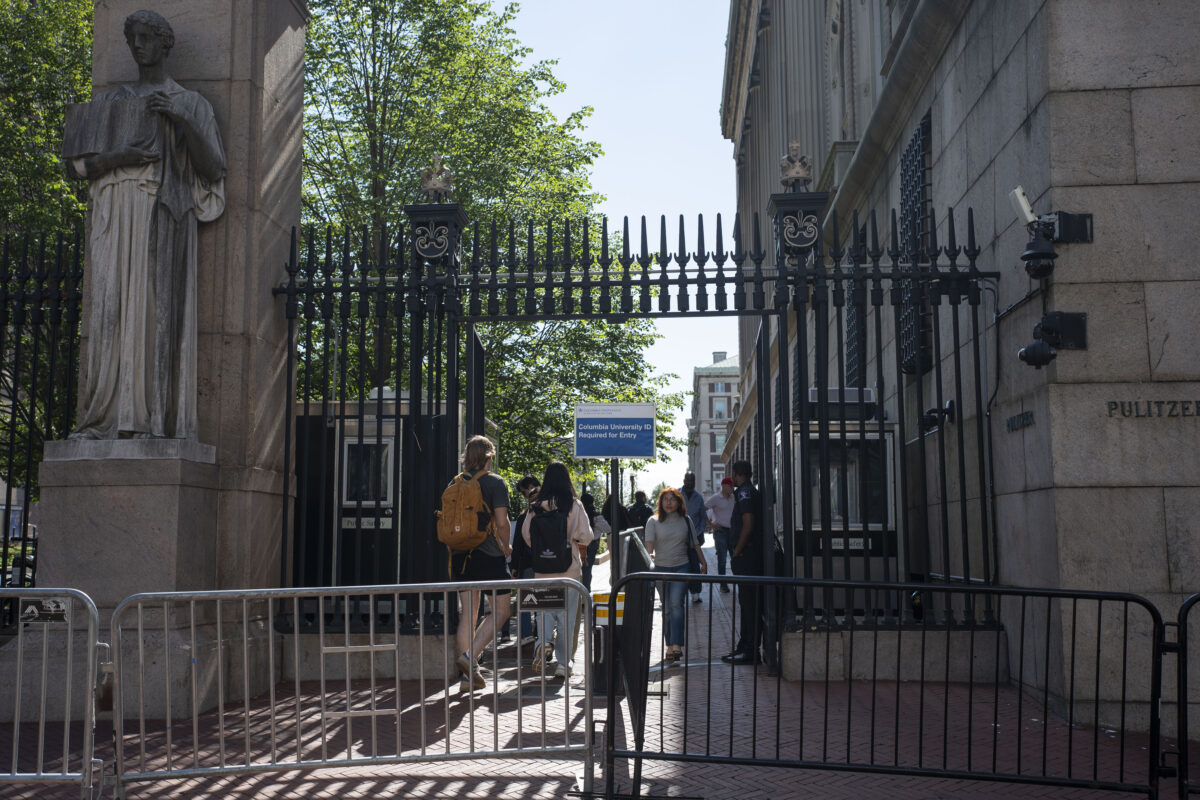
The Trump administration’s settlements with Ivy League universities, negotiated in response to alleged violations of federal civil rights law, are meant primarily as an attention-grabbing measure — a way to get more people to pay attention to President Donald Trump’s aggressive approach to tackling discrimination in higher education, according to an architect of those settlements, Jewish Insider’s Gabby Deutch reports.
Podcast playback: “When you see numbers like that, then you pay attention, and you look, and then you’re able to learn a little bit more, something maybe you wouldn’t normally learn,” May Mailman, a conservative attorney who until last month served as a senior White House strategist, told The New York Times’ Ross Douthat on an episode of his “Interesting Times” podcast that was released on Thursday. “A settlement on its own without a fine might not be taken as seriously by the public or by other universities as when there is a fine,” said Mailman. “These are small dollar figures compared to the amounts that they are getting every year from the federal government and from their donors — but I think it provides a seriousness and a focus on these in ways that promises only wouldn’t.”
Worthy Reads
Eye on Gaza Aid: In The Washington Post, Ken Isaacs, the vice president of programs and government relations at Samaritan’s Purse, reflects on his recent visit to Gaza and observation of the Gaza Humanitarian Foundation’s work. “I arrived in Gaza a skeptic of GHF but left an advocate. Simply put, the common portrayal of this organization radically distorts reality. I observed GHF’s relief operations firsthand. What I saw was not a textbook distribution — because no textbook exists for a war zone such as Gaza, where terrorist combatants hide among civilians. Instead, I saw GHF using unconventional means to successfully deliver food to civilians on a staggering scale under nearly impossible circumstances. It wasn’t perfect, but it was good. … What is needed: less ideology and more courage; less bureaucratic sclerosis and more moral clarity. Don’t let the pursuit of humanitarian perfection become the enemy of the practical good.” [WashPost]
Bibi Facing the Lions: Bloomberg’s Ethan Bronner gives historical context for Israeli Prime Minister Benjamin Netanyahu’s address to the U.N. General Assembly taking place this morning. “For the past decade, as Israel also became richer and more powerful, the Palestinian issue seemed almost to disappear for many. Palestinians were divided and despondent, and Arab powers increased their links to Israeli defense and high-tech industries, paying lip service to Palestinian sovereignty. … For many around the world, [Oct. 7] was proof that the Palestinian issue won’t be buried, that the oppressed will eventually burst with rage. They expected Israel to retaliate but then for it to negotiate a joint future. Israelis saw things differently. The assault, involving the killing and kidnapping of children and the abuse of women, combined with a pile-on from militias in Lebanon, Syria, Iraq and Yemen, which included the use of ballistic missiles and was backed by billions of dollars from Iran, drove for them a stake into the heart of a Palestinian state where, they feared, radicalism could flourish and produce another Oct. 7.” [Bloomberg]
A Friend in Jakarta: In The Wall Street Journal, Haisam Hassanein reflects on Indonesian President Prabowo Subianto’s address to the U.N. General Assembly, in which he said that a solution to the Israeli-Palestinian conflict must recognize and address Israel’s security concerns. “Why now? Mr. Subianto is a former general with pragmatic instincts. He knows that in a world fractured by Russia’s war in Ukraine, Middle East upheaval and U.S.-China rivalry, stability demands fresh thinking. He also knows Indonesia can’t become a global leader while clinging to outdated slogans. … Critics in Jakarta and elsewhere will accuse him of betraying the Palestinian cause. In truth, his statement reflects a hard reality: Palestinians won’t win independence by denying Israelis’ right to security, just as Israelis can’t win peace by ignoring Palestinian aspirations. Progress requires mutual legitimacy. Mr. Subianto’s speech was a rare reminder of that balance.” [WSJ]
Word on the Street
Defense Secretary Pete Hegseth is summoning hundreds of generals and military officials stationed around the world to Virginia next week…
El0n Musk’s xAI inked an agreement with the General Services Administration to provide federal agencies with access to the artificial intelligence chatbot…
A group of 30 House Democrats urged Secretary of State Marco Rubio to leverage a joint statement from the Arab League this summer, which called for Hamas’ disarmament and removal of power, the release of hostages and a path toward a two-state solution, as a potential diplomatic breakthrough for the region, Jewish Insider’s Marc Rod reports. The lawmakers also condemned the unilateral recognition of a Palestinian state recently undertaken by several close U.S. allies…
Former U.K. Prime Minister Tony Blair, who met in Washington last month with President Donald Trump, special envoy Steve Witkoff and Jared Kushner, is reportedly seeking a role in Trump’s postwar plan for Gaza…
The Justice Department is pressing federal prosecutors to investigate George Soros’ Open Society Foundations…
In The Wall Street Journal, Tikvah Fund President and CEO Eric Cohen explains how the organization will use its recent grant from the National Endowment for the Humanities, the largest in the endowment’s history, to counter antisemitism…
New England Patriots owner Robert Kraft will sell 8% of the football team, which he purchased for $172 million in 1994, to Sixth Street Partners and Dean Metropoulos, in a deal that values the franchise at $9 billion…
Microsoft ended the access given to the IDF’s Unit 8200 to its Azure cloud platform, alleging the IDF violated the company’s terms of service by storing surveillance information in the cloud; the termination comes after protests at Microsoft’s headquarters, including a sit-in in the office of President Brad Smith…
A California man was sentenced to nearly 20 years in prison for a series of firebombings and arson attacks in the Bay Area that he said were inspired by Hamas’ Oct. 7, 2023, terror attacks…
Gene Simmons, Lisa Edelstein and Mayim Bialik were among the more than 1,200 artists and media industry names who signed onto a letter opposing a recent call by other Hollywood boldfaced names to boycott Israeli film institutions…
The UEFA Europa League is slated to vote next week on banning Israel’s national soccer team…
The European Broadcasting Union will hold a vote in November on expelling Israel from the Eurovision Song Contest…
Israeli authorities arrested a dual U.S.-Israeli citizen who previously lived in Morocco on charges of spying for Iran after he was approached by operatives from Tehran earlier this year…
Newly obtained satellite photos indicate that Iran likely carried out an undeclared missile test last week…
New York Times puzzle creator Mel Taub died at 97…
Pic of the Day
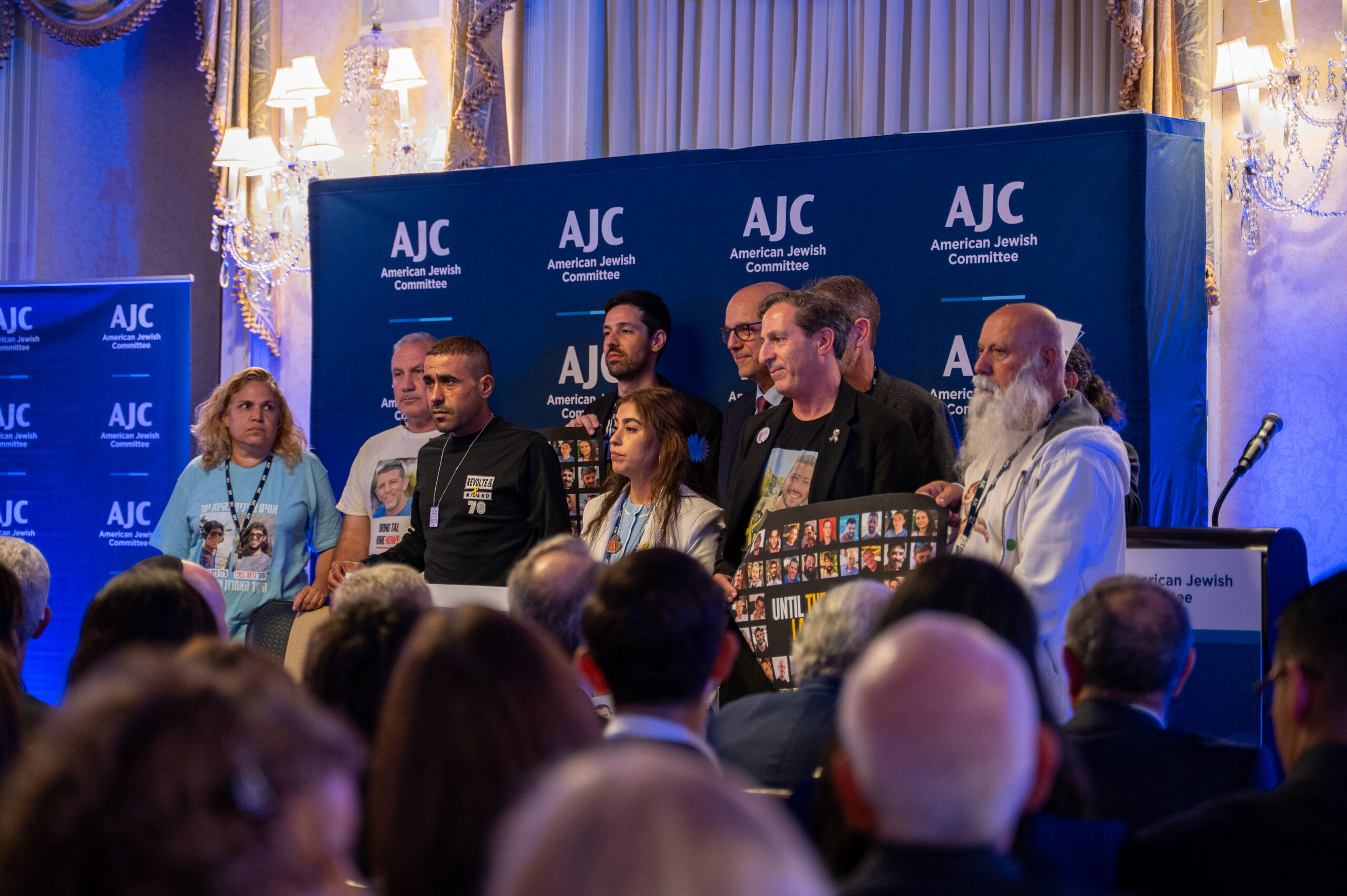
Hostage family members attended the American Jewish Committee’s annual Global Jewish Diplomacy Reception at Manhattan’s Harmonie Club last night on the sidelines of the United Nations General Assembly, some of whom offered staunch criticism of the Israeli government’s handling of the war in Gaza, eJewishPhilanthropy’s Nira Dayanim reports for Jewish Insider.
Birthdays
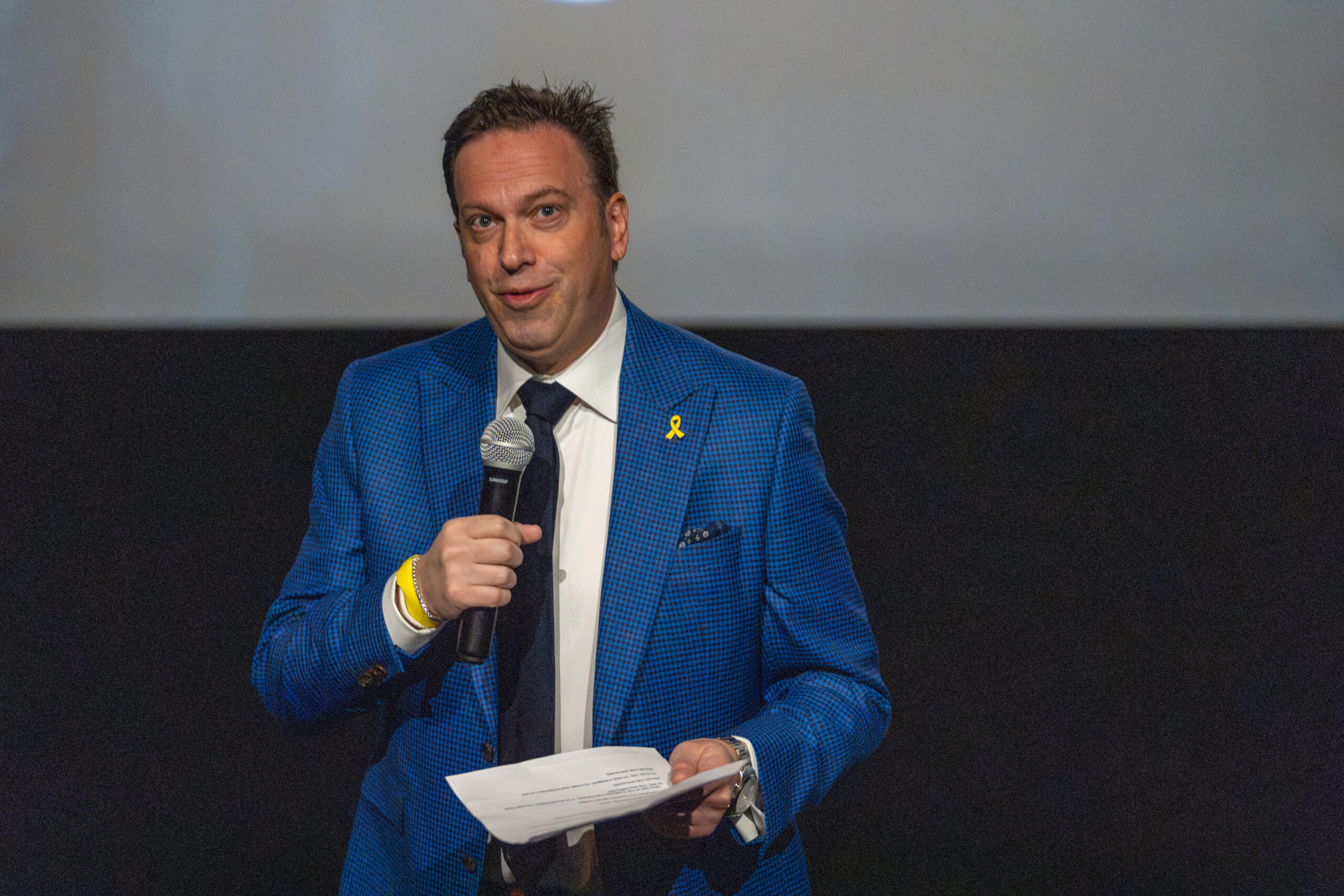
Hockey reporter for Sportsnet and as an insider for the NHL Network, Elliotte Friedman turns 55 on Saturday…
FRIDAY: Stage, film and television actor, he is best known as “The Most Interesting Man in the World” appearing in Dos Equis beer commercials, Jonathan Goldsmith turns 87… CEO of Israel Longhorn Project, dedicated to bringing Texas longhorn cattle to Israel, Robin Rosenblatt turns 77… Five Towns (N.Y.) resident, Barry Mandel… Former chairman and CEO of the French engineering conglomerate Alstom, he is the son of Holocaust survivors, Patrick Kron turns 72… Senior political advisor to President Bill Clinton during his second term and co-author of a New York Times best-seller on the future of politics in the U.S., Doug Sosnik turns 69… Chairman of Huntington National Bank and chairman of Jewish Federations of North America, Gary H. Torgow turns 69… Teaneck-resident with a Jersey City dental practice, Paul Lustiger, DDS… Historian, senior fellow at the Brookings Institution and a member of the Council on Foreign Relations, Robert Kagan turns 67… Chief of staff for U.S. Sen. Dave McCormick (R-PA), Mark Isakowitz turns 59… Professional poker player with four World Series of Poker bracelets, his lifetime winnings exceed $13.9 million, Josh Arieh turns 51… Men’s basketball head coach at the University of Nevada Las Vegas starting this year, he was the 2017 ACC Coach of the Year, Josh Pastner turns 48… CEO of the Metropolitan Council on Jewish Poverty, David G. Greenfield turns 47… Former communications director for New York Gov. David Paterson, Sen. Chuck Schumer (D-NY) and Rep. Jane Harman (D-CA), she now heads a NYC based PR firm, Risa Beth Heller turns 46… Television host and producer, in 2020 he came in second on “Dancing with the Stars,” Yaniv “Nev” Schulman turns 41… NYC-based senior editor of global digital video programming at Bloomberg LP, Henry Seltzer… Associate director of policy and government affairs at AIPAC, Joshua Nason… Joanna Weiss DiMarco turns 35… Senior director of development at Tamid Group, Alec Deer… Director of strategic initiatives at the National Black Empowerment Council, Marvel Joseph…
SATURDAY: Co-founder of The Home Depot and owner of the NFL’s Atlanta Falcons, Arthur M. Blank turns 83… Of counsel, business litigator at the Jaszczuk law firm, Stephen J. Landes turns 80… Board member of the Milken Family Foundation, Ellen Sandler… Chairman of the Victoria Beckham fashion brand, Ralph Toledano turns 74… Longtime Washington correspondent, he is the author of books on Israel’s defense, intelligence and diplomatic services, Dan Raviv turns 71… President of the Federal Reserve Bank of Richmond until 2017, he was a recent chair of the Richmond Jewish Foundation, Jeffrey M. Lacker turns 70… President of public relations firm BGR (Barbour, Griffith & Rogers), Jeffrey H. Birnbaum turns 69… Member of the Minnesota House of Representatives from 2003 until earlier this year, he is married to a Minneapolis rabbi, Marcia A. Zimmerman, Frank Hornstein turns 66… Comedian and author, he used to be a frequent guest on both Letterman and Conan O’Brien, Marc Maron turns 62… Chief rabbi of France since 2014, Rabbi Haïm Korsia turns 62… Member of the U.S. House of Representatives since 2005, she was chairperson of the DNC until 2016, Rep. Debbie Wasserman Schultz (D-FL) turns 59… Literary and film publicist based in Israel, she is also the publisher of Intelligentsia Books, Judy Tashbook Safern… President and CEO of the Jewish Federation of Greater Philadelphia, Michael Balaban turns 59… President of NBC News Editorial, Rebecca Blumenstein turns 59… Rabbi and kabbalist, Yoshiyahu Yosef Pinto turns 52… Israel’s special envoy for innovation, Fleur Hassan-Nahoum turns 52… Author of four books on North Africa and the Middle East and president of The Center for Peace Communications, Joseph Braude… Musician, actress, writer, director and comedian, Carrie Rachel Brownstein turns 51… State Treasurer of Ohio from 2011 until 2019, Josh Mandel turns 48… Architect, entrepreneur and author, Marc Kushner turns 48… Member of the Virginia House of Delegates from the D.C. suburbs, Daniel Isaac Helmer turns 44… SVP and rabbi-in-residence at the Jewish Council for Public Affairs, Rori Picker Neiss… Advisory manager for cyber and strategic risk at Deloitte, she was previously a Hebrew teacher and coordinator of Jewish programs at Zeta Beta Tau, Alexa Wertman Brown… Actor best known for his role as Geoff Schwartz in 161 episodes of ABC’s “The Goldbergs,” Sam Lerner turns 33…
SUNDAY: International Emmy Award-winning Scottish television producer, Sir Jeremy Israel Isaacs turns 93… Former governor of Vermont (the first Jewish woman elected to govern any state), she was also the U.S. ambassador to Switzerland, Madeleine May Kunin turns 92… Physician and theoretical biologist, he was a 1987 MacArthur genius fellow, Stuart Kauffman turns 86… Former president of Warner Home Video, Warren Lieberfarb turns 82… French businessman who, with his brother, own the controlling interest in the House of Chanel and several famous vineyards, Alain Wertheimer turns 77… Real estate agent in New York’s Hudson Valley, Jerry Weiss… Teaneck, N.J.-based real estate attorney, Gary E. Miller… Physician and U.S. senator (R-LA), Bill Cassidy turns 68… Pediatrician and author of the book Winning A Debate with An Israel Hater about the fight against BDS, Dr. Michael Harris… Best-selling author of more than 25 books, he is also a magazine journalist, Ben Greenman turns 56… President and CEO of the JCC Association of North America, Barak Hermann… Area director for San Diego and Orange counties for AIPAC, Elliott Nahmias… Winner of four Olympic gold medals in swimming for the USA (2000 and 2004), Leonid “Lenny” Krayzelburg turns 50… News editor and correspondent at Voice of America, Michael Lipin… Israeli Ironman triathlete, Nina Pekerman turns 48… SVP at the Katz Watson Group, Lauren France… Director of field marketing for the Anti-Defamation League, Samantha Collidge… Regional director for the Orthodox Union’s Teach Coalition, Hadassa Levenson Korn… VP of operations at Tel Aviv-based iAngels, Ayelet Cohen… 2023 graduate of Yale Law School and author of a coming-of-age novel set in the Modern Orthodox community, David Hopen turns 32… Former NFL, XFL and CFL wide receiver and kick returner, Daniel Braverman turns 32…
Greenblatt spoke at AJC’s Global Jewish Diplomacy Reception, where former Amb. Shapiro also decried Palestinian statehood recognition as a ‘mistake’

U.S. Mission to the U.N.
Jason Greenblatt, Special Representative for International Negotiations Delivers Remarks at a UN Security Council Briefing on the Middle East
Jason Greenblatt, a key architect of the Abraham Accords, joined President Donald Trump in coming out against the Israeli government’s reported plans to annex portions of the West Bank, saying on Thursday evening that it was the wrong time to do so.
“I think Israel has so many challenges right now, militarily, [with the] hostages. There’s enormous things going on. The world is turned against Israel. I don’t agree with those that are pushing Bibi. I don’t know if it’s Bibi himself, but I hope that Bibi could figure out a way to get out of that political space that he’s in. And I think President Trump is making the right call,” Greenblatt said, using Israeli Prime Minister Benjamin Netanyahu’s nickname.
Greenblatt made his remarks during an onstage interview with Jason Isaacson, the American Jewish Committee’s chief policy and political affairs officer, at the AJC’s annual Global Jewish Diplomacy Reception at Manhattan’s Harmonie Club on the sidelines of the United Nations General Assembly, which is being held this week. Shortly before the reception, Trump told reporters that he was firmly against Israeli annexation of the West Bank.
Greenblatt preceded his opposition to annexation by noting his right-wing bona fides.
“My answer is coming from somebody who’s on the right politically, both in Israel and here. In fact, some of my Palestinian friends would say that sometimes I was Bibi’s mouthpiece,” he said.
“But I agree with President Trump and what he said earlier today … I don’t think this is the time. I don’t think it’s the place. And I was part of the team that wrote the paperwork that would have allowed Israel to … apply Israeli sovereignty,” Greenblatt said, using the term the Israeli government prefers to refer to annexation. “I don’t think this is the time to do it.”
In addition to Greenblatt, speakers at the reception included Daniel Shapiro, former U.S. Ambassador to Israel under President Barack Obama, and Serge Berdugo, president of the council of Jewish communities of Morocco, who received AJC’s Akiba Award during the event. At least ten hostage family members were also present, some of whom offered staunch criticism of the Israeli government’s handling of the war in Gaza.
Responding to the growing number of Western countries recognizing Palestinian statehood, Shapiro called these moves an ineffectual “mistake.”
“It’s a purely rhetorical step that changes nothing and probably does little, if anything, to advance the stated goal of some sort of resolution of the Israeli-Palestinian conflict. And in many ways it may actually set it back in part because of the way it appears to — and certainly many Israelis understand it to, and I’m sorry to say, many Arabs understand it to — reward Hamas,” Shapiro said.
He also described the development, in part, as a response by world leaders to Israel’s refusal to develop a “day after” plan in Gaza.
“What is that vision of the day after? Not only when does it start, but what does it look like afterwards? And is it something that Arab states and European states can buy into and get behind,” Shapiro said. “That could have been a way of satisfying some of the domestic pressures, but it wasn’t really available. And so I think some of the leaders turned to this ill-advised move instead.”
Speaking on behalf of hostage families, Ruby Chen, father of slain American Israeli hostage Itay Chen, whose remains are still being held captive by Hamas in Gaza, thanked the AJC for their advocacy on behalf of the hostage families and criticized the Israeli government for the ongoing hostage crisis.
“I think I’m still in shock that … it wasn’t obvious that it should have been the number one objective of the government of Israel. But it’s unfortunate that there were other objectives, such as the disbanding of Hamas and making sure that Oct. 7 does not happen again, which are all legitimate,” said Chen.
Chen continued, “We call on President Trump to bring all the parties together and put on the table a deal that is acceptable by everybody, and we pray to God that… those of you who are meeting with [Netanyahu]… are able to send a message saying we hope that he shares the same conviction that President Trump has shown, as well as President Biden and the previous administration to bring all these hostages home.”
As the hostage family members gathered for a photograph following Chen’s speech, the father of Israeli hostage Nimrod Cohen, Yehuda Cohen, stepped up to the microphone and delivered a fiery impromptu speech criticizing Netanyahu.
“After two years, Netanyahu is prolonging an unneeded war. If you really want to help us as a Jewish organization, please help us advocating the push on Netanyahu, making Netanyahu, forcing Netanyahu to end the war and get a hostage deal,” he said.
Cohen, who came out in support of the countries recognizing Palestinian statehood — breaking ranks with the Hostages and Missing Families Forum and nearly all of Israel’s political leaders, which described it as a reward for Hamas — defended his position as a form of leverage over the prime minister.
“We are using the Europeans — their declaration of the Palestinian state, their sanctions of Netanyahu’s government … We have no choice. We are at war with Netanyahu. So if you really want to help us, that’s forcing Netanyahu to end the war and get a hostage deal, this is the real help,” said Cohen.
Plus, Mamdani rings in new year at anti-Zionist synagogue
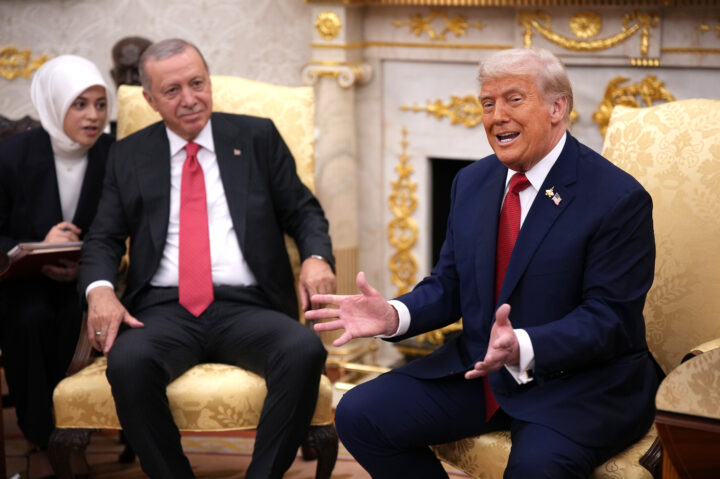
President Donald Trump (R) delivers remarks during a meeting with President of Turkey Recep Tayyip Erdogan in the Oval Office at the White House on September 25, 2025 in Washington, DC (Photo by Andrew Harnik/Getty Images)
Good Thursday afternoon.
This P.M. briefing is reserved for our premium subscribers like you — offering a forward-focused read on what we’re tracking now and what’s coming next.
I’m Danielle Cohen-Kanik, U.S. editor at Jewish Insider and curator, along with assists from my colleagues, of the Daily Overtime briefing. Please don’t hesitate to share your thoughts and feedback by replying to this email.
📡On Our Radar
Notable developments and interesting tidbits we’re tracking
Asked about reports that he had told Arab leaders this week he will not allow Israel to annex the West Bank, President Donald Trump confirmed to reporters in the Oval Office this afternoon, “I will not allow Israel to annex the West Bank, nope, I will not allow it. It’s not gonna happen.”
Pressed if he spoke with Israeli Prime Minister Benjamin Netanyahu about the issue, Trump said, “Yeah, but I’m not going to allow it. Whether I spoke to him or not — I did — but I’m not allowing Israel to annex the West Bank. There’s been enough, it’s time to stop now”…
The comments came shortly after Trump met with Turkish President Recep Tayyip Erdogan at the White House today, where Trump suggested that he may permit Ankara to purchase F-35 fighter jets, which it has been prohibited from doing since it acquired a Russian S-400 missile defense system in 2017.
Trump said without mentioning the F-35s or the less-advanced F-16 jets by name that he expected Erdogan would “be successful with buying the things” he would “like to buy.” “He needs certain things, and we need certain things, and we’re going to come to a conclusion. You’ll know by the end of the day,” Trump said.
The prospect of the sale has sparked concern from lawmakers: Bipartisan groups have urged the administration on several occasions not to change policy on the issue, including in a new letter today…
Elsewhere in the White House, one of the architects of the Trump administration’s negotiations with universities said that the large financial sums being extracted in the settlements are meant to bring attention to the administration’s aggressive approach to tackling discrimination in higher education, rather than punish the schools financially.
May Mailman, a conservative attorney who until last month served as a senior White House strategist, told The New York Times that “These are small dollar figures compared to the amounts that they are getting every year from the federal government and from their donors — but I think it provides a seriousness and a focus on these in ways that promises only wouldn’t.”
“When you see numbers like that, then you pay attention, and you look, and then you’re able to learn a little bit more, something maybe you wouldn’t normally learn,” Mailman said…
Getting in the holiday spirit, New York City Democratic mayoral nominee Zohran Mamdani joined Rosh Hashanah services on Monday night at Kolot Chayeinu, a Brooklyn synagogue known for its anti-Zionist activism, where the rabbi spoke extensively about Israel carrying out a “genocide” in Gaza.
The congregation, one of the first to call for a ceasefire just weeks after the Oct. 7 attacks, faced criticism last year for promoting anti-Israel views in its Hebrew school curriculum. One of its rabbis, a member of Jewish Voice for Peace’s Rabbinical Council, was kicked out of a White House event for disrupting former First Lady Jill Biden to call for an arms embargo on Israel.
Two of Mamdani’s challengers also spent time in NYC synagogues over the holiday: Former New York Gov. Andrew Cuomo joined the Park East Synagogue for its services and Mayor Eric Adams spoke to the Sephardic Lebanese Congregation.
Mamdani also plans to join Rep. Jerry Nadler (D-NY) for Yom Kippur services next week, where Nadler said some of the congregants will be “frankly very upset to see” Mamdani. It remains unclear which synagogue they will attend; the B’nai Jeshurun synagogue on the Upper West Side, which Nadler frequents, told Jewish Insider that Mamdani “will not be joining services with our community”…
Also in New York, Palestinian Authority President Mahmoud Abbas addressed the U.N. General Assembly by video today after the Trump administration revoked his visa to attend in person. He called Israel’s actions in Gaza “war crimes” and said the PA would be willing to govern the enclave, which he said is an integral part of a future Palestinian state…
Elon Musk’s xAI announced today it has reached a deal with the Trump administration to allow federal agencies to use its AI chatbot Grok, just months after the bot went rogue on X proclaiming itself to be “MechaHitler” and espousing extreme antisemitic rhetoric…
Over 1,200 celebrities including Mayim Bialik, Debra Messing, Sharon Osbourne, Howie Mandel, Haim Saban, Gene Simmons and Liev Schreiber have signed on to an open letter urging over 4,000 of their Hollywood colleagues to reconsider their signatures on a recent pledge to boycott Israeli film institutions. “We cannot stay silent when a story is turned into a weapon, when lies are dressed up as justice, and when artists are misled into amplifying antisemitic propaganda,” the letter reads…
⏩ Tomorrow’s Agenda, Today
An early look at tomorrow’s storylines and schedule to keep you a step ahead
Keep an eye on Jewish Insider for reporting on Microsoft’s decision to restrict the IDF’s use of its software after repeated protests by its employees and on what the sale of TikTok’s U.S. business may mean for the platform’s algorithm, which has been accused of promoting antisemitic and anti-Israel content.
This evening, UCLA Chancellor Julio Frenk will speak on Jews United for Democracy & Justice’s “America at a Crossroads” series about President Donald Trump’s approach to higher education. Read JI’s interview with Frenk here.
Israeli Prime Minister Benjamin Netanyahu will be the first world leader to speak at the U.N. General Assembly tomorrow morning, after many of the week’s speeches by world leaders included condemnations of Israel and recognition of a Palestinian state. On Monday, Netanyahu will meet with Trump at the White House.
Also tomorrow, the Nova Music Festival Exhibition opens in Boston.
We’ll be back in your inbox with the Daily Overtime on Monday. Shabbat shalom!
Stories You May Have Missed
Q&A
Post-Paramount sale, Shari Redstone is ‘full speed ahead’ on addressing antisemitism

The media mogul told JI she’s excited to show the world a different view of Israel through the Sipur production company, which she joined as chair
EYE ON UNESCO
Concern mounts in Jerusalem as Qatar, Egypt set to take key roles in UNESCO
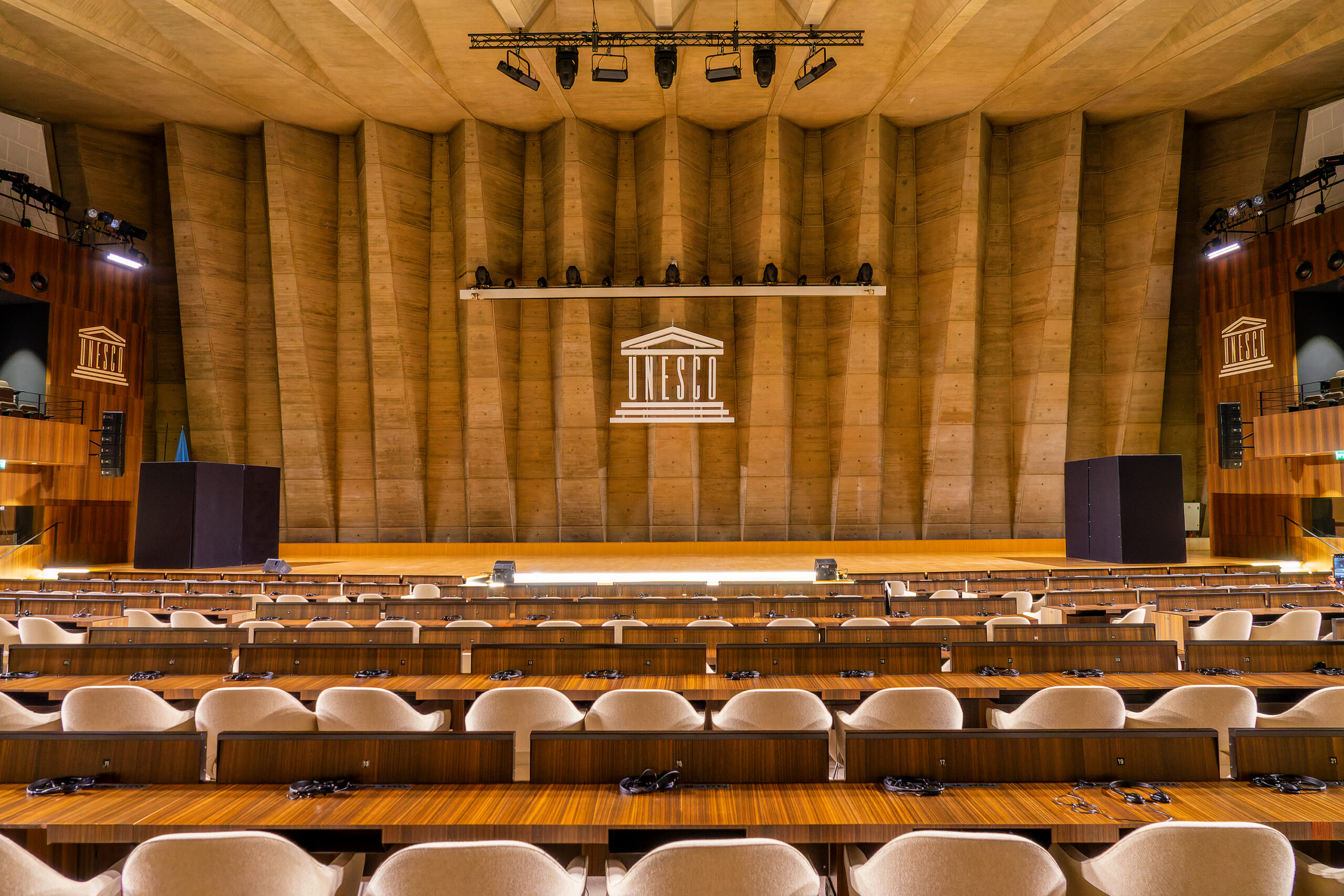
‘It’s bad for Israel and bad for America,’ an Israeli diplomat told JI this week
The comments, made after meeting with Turkish President Erdogan, are the first time Trump addressed the issue in his second term
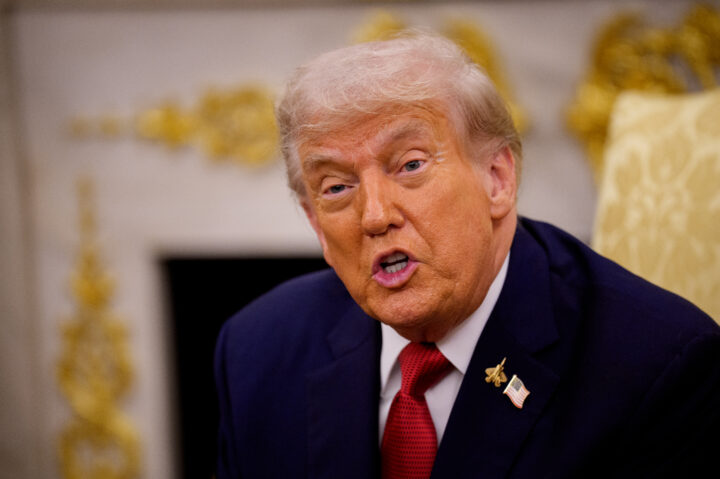
U.S. President Donald Trump wears a fighter jet lapel pin during a meeting with President of Turkey Recep Tayyip Erdogan in the Oval Office at the White House on September 25, 2025 in Washington, DC. (Photo by Andrew Harnik/Getty Images)
President Donald Trump pledged on Thursday that he will not allow Israel to annex the West Bank, the first time Trump has addressed the matter in his second term.
Asked about reports that he told Arab leaders this week he would not permit Israel to make the move, Trump confirmed to reporters in the Oval Office that he opposes annexation. “I will not allow Israel to annex the West Bank, nope, I will not allow it. It’s not gonna happen,” he said, hours after a meeting with Turkish President Recep Tayyip Erdogan.
Asked if he spoke with Israeli Prime Minister Benjamin Netanyahu about the issue, Trump said, “Yeah, but I’m not going to allow it. Whether I spoke to him or not — I did — but I’m not allowing Israel to annex the West Bank. There’s been enough, it’s time to stop now.”
Netanyahu will address the United Nations General Assembly in New York on Friday, and he and Trump will meet in the Oval Office on Monday, for their fourth White House meeting of the year.
In his own General Assembly address earlier this week, Trump pledged his support for Israel and sharply criticized several European nations who had unilaterally recognized a Palestinian state. He did not mention annexation or include any criticism of Israel in his remarks.
Netanyahu has pledged to respond to those moves next week, with annexation of the West Bank viewed as one possible action he could pursue, under pressure from right-wing elements of his governing coalition.
Trump: ‘He needs certain things, and we need certain things, and we’re going to come to a conclusion’

President Donald Trump (R) delivers remarks during a meeting with President of Turkey Recep Tayyip Erdogan in the Oval Office at the White House on September 25, 2025 in Washington, DC (Photo by Andrew Harnik/Getty Images)
President Donald Trump suggested on Thursday that he was likely to permit Turkey to purchase F-35 fighter jets as soon as “the end of the day,” ending a nearly eight year blockade on Ankara’s acquiring the top-of-the-line fighter jet as a result of its 2017 purchase of a Russian S-400 missile system.
Speaking to reporters from the Oval Office alongside Turkish President Recep Tayyip Erdogan ahead of a meeting between the two and their respective teams, Trump said without mentioning the F-35’s or the less-advanced F-16 jets by name that he expected the Turkish leader would “be successful with buying the things” he would “like to buy.”
“He needs certain things, and we need certain things, and we’re going to come to a conclusion. You’ll know by the end of the day,” Trump said at the outset of his meeting with Erdogan.
The White House declined to comment on what the president was referring to or if an announcement regarding resumed F-35 sales to Ankara was imminent.
Erdogan has focused his visit to the White House, his first such trip in six years, around securing U.S. sanctions relief and approval for new arms deals, including the F-35 jets and other fighter and Boeing aircraft. Trump implemented the sanctions during his first term after Turkey purchased a Russian air defense system that U.S. officials warned could be used by the Russians to harness data on the F-35’s capabilities and compromise the aircraft.
The sanctions, pursued through the Countering American Adversaries Through Sanctions Act, are still in place due to Turkey’s refusal to replace the Russian system. The Biden administration approved the sale of F-16 jets to Turkey in early 2023 on the condition of Ankara allowing Sweden to join NATO.
The prospect of Trump changing course on the sale has sparked bipartisan concern from some lawmakers. While some see such a sale as a way to incentivize better behavior from Ankara, others have warned that the embrace could have the opposite effect.
A bipartisan coalition of House lawmakers wrote a letter to Secretary of State Marco Rubio and Defense Secretary Pete Hegseth on Thursday urging the Trump administration against approving a deal for F-16s or F-35s.
It was signed by Reps. Chris Pappas (D-NH), Gus Bilirakis (R-FL), Dina Titus (D-NV), Nicole Malliotakis (R-NY), Brad Sherman (D-CA), Frank Pallone Jr. (D-NJ), Don Bacon (R-NE), Jim Costa (D-CA), Josh Gottheimer (D-NJ), Stephen Lynch (D-MA), Dan Goldman (D-NY), Brian Fitzpatrick (R-PA), Brad Schneider (D-IL), Tom Suozzi (D-NY), Wesley Bell (D-MO), Ted Lieu (D-CA), Mike Lawler (R-NY), Rob Menendez (D-NJ), Greg Landsman (D-OH) and Gabe Amo (D-RI). The American Jewish Committee, CUFI Action Fund and FDD Action were among the organizations that endorsed the letter.
“The security risks of Turkey’s acquisition and continued possession of the Russian S-400 system are well known. The S-400 poses a direct threat to U.S. military aircraft, including both the F-16 and F-35, by enabling Russian intelligence to gain insight into sensitive U.S. military technology if operated alongside these platforms,” the lawmakers wrote.
“Congress has consistently upheld bipartisan restrictions on Turkey’s access to the F-35. Any move to reverse this policy without first securing the statutorily required certification would be a clear violation of U.S. law, undermine Congressional authority, and signal to others that U.S. law and strategic principles can be disregarded,” they added.
Mailman: ‘When you see numbers like that, then you pay attention, and you look, and then you’re able to learn a little bit more, something maybe you wouldn’t normally learn’
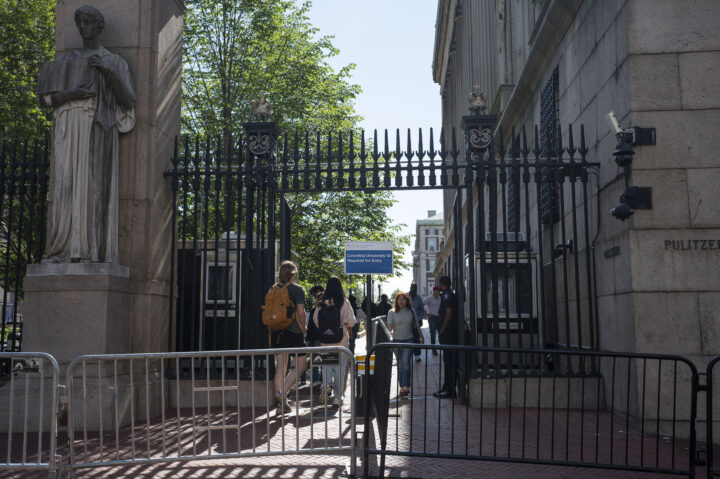
Mostafa Bassim/Anadolu via Getty Images
Students enter campus on the first day of the fall semester at Columbia University in New York City, United States on September 2, 2025.
The Trump administration’s settlements with Ivy League universities, negotiated in response to alleged violations of federal civil rights law, are meant primarily as an attention-grabbing measure — a way to get more people to pay attention to President Donald Trump’s aggressive approach to tackling discrimination in higher education, according to an architect of those settlements.
“When you see numbers like that, then you pay attention, and you look, and then you’re able to learn a little bit more, something maybe you wouldn’t normally learn,” May Mailman, a conservative attorney who until last month served as a senior White House strategist, told The New York Times’ Ross Douthat on an episode of his “Interesting Times” podcast that was released on Thursday.
The Trump administration has so far secured a $221 million payment from Columbia and a $50 million commitment from Brown. A deal with Harvard has been under negotiation for months, but no agreement has yet been reached.
These deals have included commitments from the universities on antisemitism policy, race-based hiring and admissions standards and diversity, equity and inclusion programs. What remains unclear is how they will be enforced. But Mailman told Douthat that the optics alone mark a significant achievement for the Trump administration.
“A settlement on its own without a fine might not be taken as seriously by the public or by other universities as when there is a fine,” said Mailman. “These are small dollar figures compared to the amounts that they are getting every year from the federal government and from their donors — but I think it provides a seriousness and a focus on these in ways that promises only wouldn’t.”
The deals have not included a recognition of fault on the part of the universities. But, Mailman added, they convey to the public “a sense of acknowledgment of wrongdoing, not a legal sense but sort of a moral sense of, ‘We’ve taken all this money, and we did it in ways that were not merit based, or they weren’t safe for our students, and so we’re paying a small amount of it back.’”
Douthat engaged Mailman in a conversation about what he called the “very blurry zone of critiques of the policies of the state of Israel and critiques of Zionism,” and suggested that the Trump administration had been “micromanaging” academic departments by asking them to discipline “radical critics of Israel.” Mailman seemed to acknowledge that some of those efforts appear to some as an infringement on free speech.
“I acknowledge that there are some letters that were sent by the antisemitism task force, in some way, that either incorporated the IHRA definition or otherwise were perceived to have been speech codes,” Mailman said, referring to the International Holocaust Remembrance Alliance’s working definition of antisemitism, which some on the left and right have argued marks a threat to free speech.
Still, she added that the deal at Columbia did not create a “speech code.” (Columbia did announce its adoption of the IHRA definition this summer, but that was not formally articulated in its deal with the federal government.)
“The Columbia deal — and I think everyone would acknowledge that Columbia had a major antisemitism problem — but the Columbia deal in no way creates any speech code, whether it be on Israel or anything else,” said Mailman. “It does not — it specifically says that this is not intended to create any First Amendment conflict or otherwise govern speech on Columbia’s campus.”
During a meeting with Arab and Muslim leaders, Trump reportedly promised that he would not allow Netanyahu to annex the West Bank
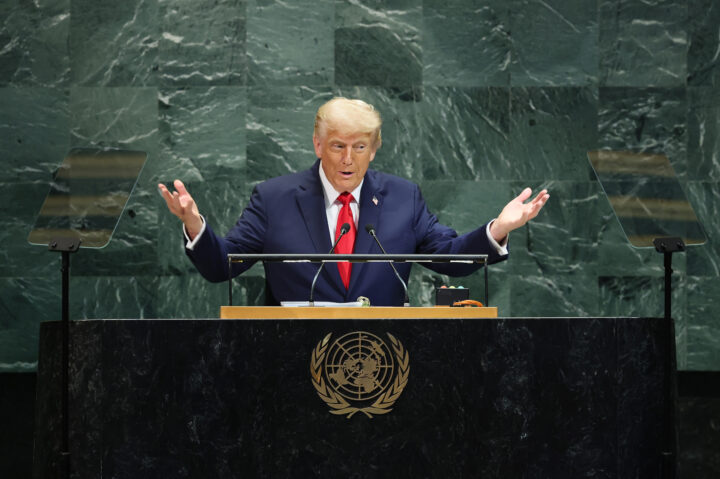
Michael M. Santiago/Getty Images
U.S. President Donald Trump speaks during the United Nations General Assembly (UNGA) at the United Nations headquarters on September 23, 2025 in New York City.
By calling the United Nations “useless” and saying many countries were “going to hell” by pursuing liberal governance, President Donald Trump was his usual provocative, impolitic self in his Tuesday speech at the United Nations General Assembly. Where other nations and the U.N. itself have promoted a vision of greater global cooperation in an interconnected world, Trump doubled down on a call for national sovereignty and closed borders. Where nearly all U.N. member states have pledged to make tackling climate change a priority, Trump took issue with the very concept of sustainable energy.
“Immigration and the high cost of so-called green renewable energy is destroying a large part of the free world and a large part of our planet,” Trump said at the close of his address. “Countries that cherish freedom are fading fast because of their policies on these two subjects.”
But it was Trump’s continued support of Israel, even in the face of growing hostility from European countries and other Western allies to the Jewish state, that may have stood out the most. Trump, in his General Assembly speech, blasted the European nations that this week formally recognized a Palestinian state.
“Now, as if to encourage continued conflict, some of this body is seeking to unilaterally recognize a Palestinian state,” he said. “This would be a reward for these horrible atrocities, including October 7th, even while they [Hamas] refuse to release the hostages or accept a ceasefire.”
The U.S. also joined Israel in boycotting the two-state solution conference on Monday, which was hosted by France and Saudi Arabia, and was joined by several major nations, including the United Kingdom, Australia and Canada.
But even while Trump used his nearly hourlong address to place himself firmly on Israel’s side in its nearly two-year-long war with Hamas, reports indicate that he is privately advocating for restraint. . During a meeting Tuesday with Arab and Muslim leaders where U.S. special envoy Steve Witkoff proposed a 21-point plan to end the war in Gaza, Trump promised the world leaders in attendance that he would not allow Israeli Prime Minister Benjamin Netanyahu to annex the West Bank, Politico and The Times of Israel reported.
Trump also touted the Abraham Accords in his keynote speech, which he described as a “very big thing.” The landmark 2020 agreement that normalized ties between Israel and the United Arab Emirates and several other Arab nations was predicated on Netanyahu not annexing the West Bank — and Saudi Arabia warned this week that annexation would be a “red line” to its own improved relations with Israel.
That warning comes as Trump eyes an expansion of the Accords, with Saudi Arabia widely considered the next target for a White House set on furthering its dealmaking prowess in the Middle East.
Netanyahu and Trump will hold their fourth Oval Office meeting of the year next week, offering the two leaders a chance to present a unified front on defeating Hamas — or, depending on what happens in New York this week, an opening for Trump to make the case against annexation, a demand that he and other administration figures have so far refrained from uttering in public.
His confirmation vote, by a 47-43 vote, comes days before the start of the U.N. General Assembly
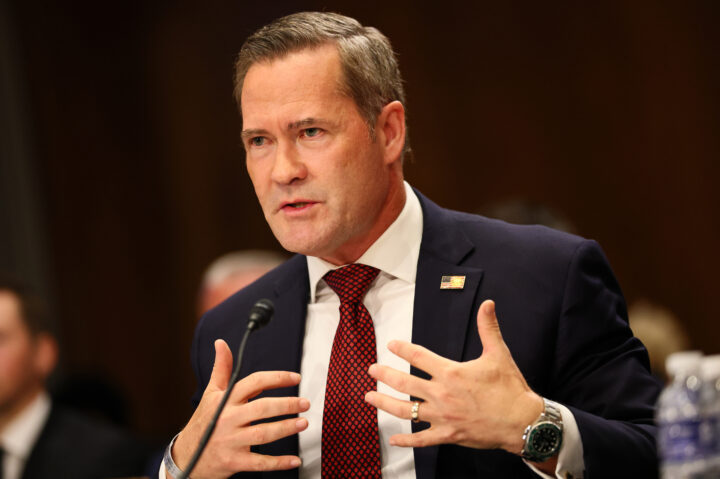
Michael M. Santiago/Getty Images
Former National Security Advisor Mike Waltz testifies during his confirmation hearing before the Senate Committee on Foreign Relations in the Dirksen Senate Office Building on July 15, 2025 in Washington, DC.
The Senate confirmed former National Security Advisor Mike Waltz on Friday to be U.S. ambassador to the United Nations, capping off a monthslong confirmation process that was marred by delays just days before the start of the U.N. General Assembly next week.
Waltz, a former congressman from Florida and a Green Beret, was confirmed by a 47-43 vote in the Senate on Friday afternoon, with three Democrats and one Republican crossing party lines. Sens. Jeanne Shaheen (D-NH), the ranking Democrat on the Senate Foreign Relations Committee, John Fetterman (D-PA) and Mark Kelly (D-AZ) voted in favor of Waltz’s nomination, while Sen. Rand Paul (R-KY) was the only Republican to oppose.
Waltz’s journey to his current role began when President Donald Trump removed him from his post as White House national security advisor in late April and selected him to replace Rep. Elise Stefanik (R-NY) as his pick for U.N. ambassador. The White House pulled Stefanik’s nomination in late March, more than two months after the Senate Foreign Relations Committee had advanced her nomination, amid concerns that her absence in the House could hurt Republicans’ ability to govern with their slim majority.
The former national security advisor was facing heavy scrutiny at the time over the Signal chat incident in which Waltz inadvertently added Atlantic Editor-in-Chief Jeffrey Goldberg to a group chat of top national security officials discussing imminent strikes on the Houthis on the non-secure messaging app. Prior to the “Signalgate” incident, Waltz had already been viewed as a vulnerable target for ideological rivals and personal foes in the administration because of his hawkish approach on foreign policy.
While Trump initially stood by Waltz, he eventually relented and in early May announced his intention to move the former congressman to the U.N. post. Waltz had already faced a setback after Trump fired six National Security Council officials whose views were aligned with Waltz. Their ouster was driven by an intervention by far-right activist Laura Loomer.
Waltz, a staunch supporter of Israel and an outspoken critic of Iran, faced delays of his own during his Senate confirmation process this summer, with Paul siding with all Democrats on the Foreign Relations Committee to block his nomination from advancing to the full Senate over concerns with Waltz’s national security and foreign policy positions.
Shaheen eventually broke the stalemate in July, voting for Waltz because of his public and private support for continued U.S. global engagement than other figures in the administration, as well as potential alternatives Trump could nominate.
Multiple outlets reported at the time that Shaheen, who is retiring next year, conditioned her support for Waltz on the Trump administration committing to providing $75 million in aid to Haiti and Nigeria, which had just been approved. Sen. Jim Risch (R-ID), the chairman of the committee, told Jewish Insider that the aid package was not directly tied to Shaheen’s support for Waltz.
During his confirmation hearing that month, Waltz said he would serve as a blockade to “anti-Israel resolutions” in the U.N. General Assembly and vowed to push for the dismantlement of the United Nations Relief and Works Agency over some of its employees’ involvement in the Oct. 7, 2023, Hamas attacks. He also said he supported U.S. sanctions against Francesca Albanese, the U.N. special rapporteur for Israel and the Palestinian territories, amid widespread accusations she has espoused antisemitic rhetoric in her commentary on Israel.
Waltz will take over for Dorothy Shea, the career diplomat who filled the role in an acting capacity as chargé d’affaires during the nine-month vacancy. His first full week on the job will coincide with the General Assembly, bringing world leaders together in New York City for high-level discussions on issues ranging from Russia’s war in Ukraine to European countries’ push for Palestinian statehood.
Plus, NY Dem party chair rejects Mamdani
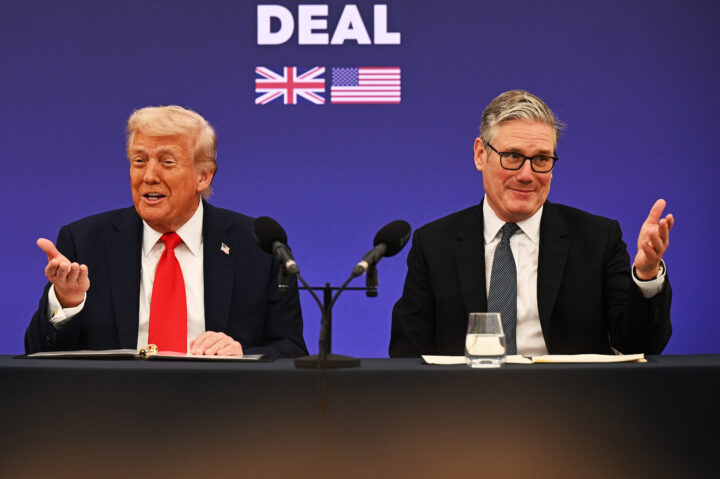
Leon Neal/Getty Images
President Donald Trump and U.K. Prime Minister Keir Starmer hold a press conference at Chequers at the conclusion of a state visit on September 18, 2025 in Aylesbury, England.
Good Thursday afternoon.
This P.M. briefing is reserved for our premium subscribers like you — offering a forward-focused read on what we’re tracking now and what’s coming next.
I’m Danielle Cohen-Kanik, U.S. editor at Jewish Insider and curator, along with assists from my colleagues, of the Daily Overtime briefing. Please don’t hesitate to share your thoughts and feedback by replying to this email.
📡On Our Radar
Notable developments and interesting tidbits we’re tracking
President Donald Trump said at a press conference with British Prime Minister Keir Starmer today that the recognition of a Palestinian state, which the U.K. plans to do this weekend, is “one of [the] few disagreements” between the two leaders.
“We want [the war] to end. We have to have the hostages back immediately. That’s what the people of Israel want, they want them back. And we want the fighting to stop,” the president continued.
Asked why he couldn’t recognize a Palestinian state next to Trump at the press conference — the British PM delayed the announcement of recognition until after Trump departs — Starmer said, “Let me be really clear about Hamas. They’re a terrorist organization who can have no part in any future government in Palestine.” Trump patted Starmer on the back and said, “That’s good”…
One of Starmer’s predecessors, former British Prime Minister Tony Blair, was authorized by Trump to develop a plan for postwar Gaza; a draft of that plan, obtained by The Times of Israel, would create a Gaza International Transitional Authority and guarantee Gazans the right to return to properties they vacate voluntarily in the enclave…
Syrian Foreign Minister Asaad al-Shaibani was on Capitol Hill today lobbying lawmakers to repeal the Caesar Syria Civilian Protection Act, the remaining congressionally mandated sanctions on Syria. The move has bipartisan support in both chambers.
Shaibani, fresh off a visit to London where he met with Israeli Strategic Affairs Minister Ron Dermer and U.S. envoy Tom Barrack to discuss Israel-Syria security arrangements, met with Sen. Lindsey Graham (R-SC), Sen. Jim Risch (R-ID), Rep. Joe Wilson (R-SC), Rep. Abe Hamadeh (R-AZ) and Treasury Department officials, among others, and is scheduled to meet with Secretary of State Marco Rubio tomorrow. It’s the first visit of a Syrian foreign minister to Washington in more than 25 years…
Syrian President Ahmad al-Sharaa told reporters yesterday that Syria and Israel could reach such a security agreement “within days”…
French President Emmanuel Macron told Israel’s Channel 12 that, despite European attempts at negotiating with Iran over its nuclear program, U.N. Security Council snapback sanctions will be implemented at the end of the month, likely on Sept. 27…
i24 News reports it has obtained recent audio of Macron speaking to former French parliament member Meyer Habib where Macron is heard saying, “I will not recognize a Palestinian state without the release of the hostages,” contrary to his reported plan to do so next week…
Two Israelis were killed today at the Allenby Crossing between Jordan and the West Bank by an assailant driving a truck of humanitarian aid destined for the Gaza Strip…
Reps. Josh Gottheimer (D-NJ) and Mike Lawler (R-NY) called on the House today to advance the long-stalled Antisemitism Awareness Act in response to New York City Democratic mayoral nominee Zohran Mamdani’s stated plans to revoke the city’s use of the International Holocaust Remembrance Alliance’s working definition of antisemitism.
The lawmakers, in a joint statement, called Mamdani’s effort “shameful, dangerous, and completely disgusting”…
Jay Jacobs, the chair of the New York Democratic Party, said in a statement today that he will not be endorsing Mamdani because he “strongly disagree[s] with [Mamdani’s] views on the State of Israel, along with certain key policy positions,” including the Queens assemblyman’s affiliation with the Democratic Socialists of America…
New York Gov. Kathy Hochul, meanwhile, facing backlash to her own endorsement of Mamdani, is still trying to “please the hyper-engaged hard-left, protect vulnerable House members and still win reelection with a statewide electorate that is far more moderate than in New York City,” per Politico.
“Behind closed doors, Hochul has pledged to anxious private sector leaders that she will use her power to act as a check on Mamdani’s agenda — much of which relies on state approval”…
Former President Barack Obama said that the firing of Karen Attiah — the anti-Israel Washington Post columnist who justified the Oct. 7 attacks and was let go from the Post earlier this week over social media posts on Charlie Kirk’s killing — is “precisely the kind of government coercion that the First Amendment was designed to prevent”…
The board of directors of Turning Point USA, the organization Kirk founded, unanimously named Erika Kirk, his widow, as its new CEO and board chair…
⏩ Tomorrow’s Agenda, Today
An early look at tomorrow’s storylines and schedule to keep you a step ahead
Keep an eye on Jewish Insider tomorrow morning for a look at how three Biden administration officials’ views have diverged over Israel since leaving the White House.
The Atlantic Festival continues in New York City through Saturday.
Also in New York, an event on “Breaking the Chain: Global Action Against Hostage-Taking” will take place tomorrow and feature the first public remarks from former Israeli hostage Na’ama Levy. Also speaking are a Yazidi survivor of ISIS captivity; Danny Danon, Israel’s ambassador to the U.N.; Dorothy Shea, acting U.S. representative to the U.N.; and Ibrahim Olabi, Syria’s ambassador to the U.N.; among others.
Chabad at Vanderbilt University will honor Vanderbilt Chancellor Daniel Diermeier with Chabad’s Lamplighter award tomorrow. Read JI’s interview with Diermeier and Washington University in St. Louis Chancellor Andrew Martin here.
On Saturday, the Milken Center for Advancing the American Dream is opening with its flagship exhibition, the “American Dream Experience,” in Washington.
On Sunday, Charlie Kirk’s memorial will be held at the State Farm Stadium in Arizona, where speakers will include President Donald Trump, Vice President JD Vance, White House Chief of Staff Susie Wiles, Secretary of State Marco Rubio, Secretary of Defense Pete Hegseth, Director of National Intelligence Tulsi Gabbard and far-right podcast host Tucker Carlson, who has advanced conspiracy theories in the aftermath of Kirk’s murder claiming the conservative activist was being pressured by Israel.
The high-level meetings of the U.N. General Assembly are set to begin next week, with several countries expected to announce their recognition of a Palestinian state.
We’ll be back in your inbox with the Daily Overtime on Monday. Shabbat shalom!
Stories You May Have Missed
BITING THE BULLET
New York Jewish leaders reckon with a potential Mamdani win
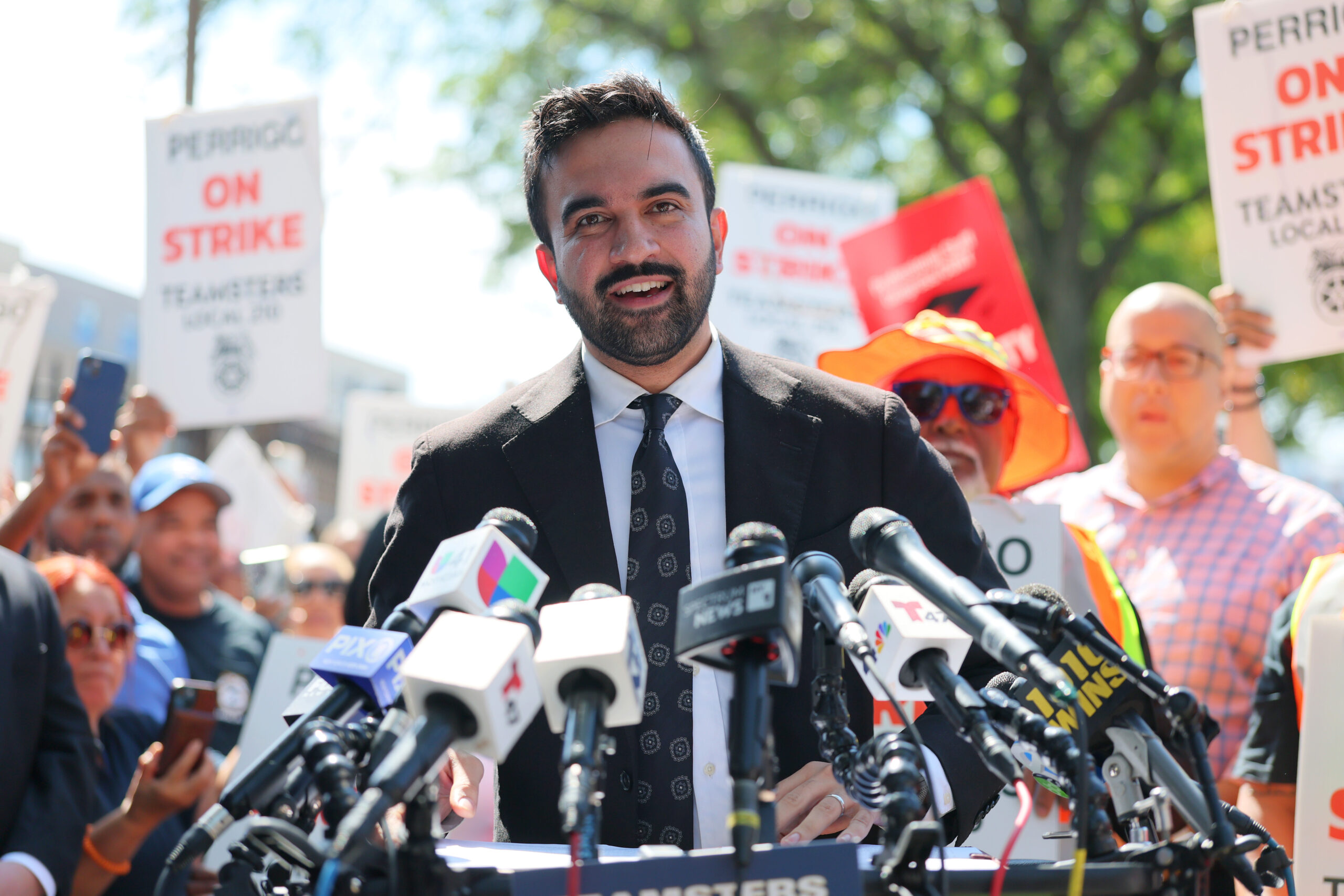
Several leaders in the community told JI they continue to have concerns about his record, while others are quietly engaging
EXPLAINING SNAPBACK
What to expect from snapback sanctions on Iran
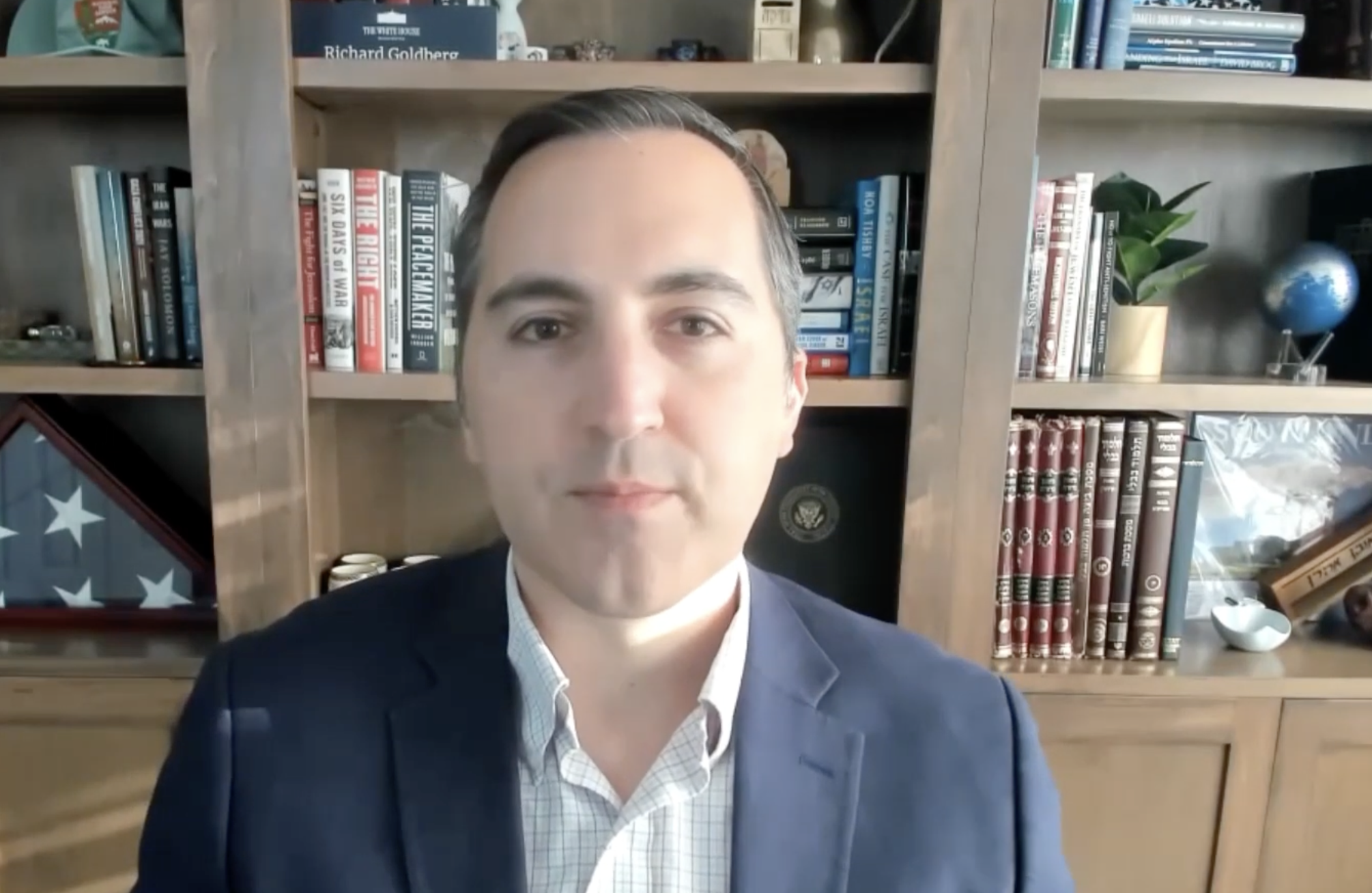
If sanctions return, the Iran nuclear deal ‘is dead, we’re sitting shiva, it is over. That is an unpredictable reality for the regime, for its economy and its financial stability,’ Rich Goldberg said
Plus, Iron Beam laser system ready for action

Paul Sancya/Pool/Getty Images
Sen. Elissa Slotkin (D-MI) rehearses the Democratic response to President Donald Trump's address to a joint session of Congress.
Good Wednesday afternoon.
This P.M. briefing is reserved for our premium subscribers like you — offering a forward-focused read on what we’re tracking now and what’s coming next.
I’m Danielle Cohen-Kanik, U.S. editor at Jewish Insider and curator, along with assists from my colleagues, of the Daily Overtime briefing. Please don’t hesitate to share your thoughts and feedback by replying to this email.
📡On Our Radar
Notable developments and interesting tidbits we’re tracking
In a moment of Democratic soul-searching, Sen. Elissa Slotkin (D-MI) said in remarks at a security briefing hosted by Jewish groups on Capitol Hill today that she’s grown concerned with left-wing animus towards the Jewish community.
“We’re used to the right-wing side. What is new and what I think has so many in the Jewish community on our heels is that new left-wing antisemitism and how to approach it. How do we counteract it? How do we protect against it? How do we educate?” she said.
“And certainly, we’re watching, on many college campuses, a lot of young people who actually maybe didn’t grow up with the Jewish community at all, get to campus and maybe repeat what they’re hearing, sometimes not even understanding or knowing. I would just say that one of our responsibilities as Jewish leaders and Jewish activists is to try and really parse through how to deal with antisemitism on the left, since antisemitism on the right isn’t good, but it’s more of a well-known threat,” Slotkin continued…
On the other side of the aisle, House Speaker Mike Johnson (R-LA) told a group of pro-Israel leaders in a private meeting today that he’s attempting to push back on the isolationist wing of the GOP in the House and in his candidate recruiting efforts, but that the party is likely bound for a major debate on the issue after President Donald Trump leaves office, attendees told Jewish Insider’s Marc Rod…
Sen. Bernie Sanders (I-VT) and Rep. Becca Balint (D-VT) separately accused Israel of committing genocide in Gaza today, the first Jewish lawmakers to do so…
British Prime Minister Keir Starmer delayed his announcement to recognize a Palestinian state until this weekend, after Trump has departed from his state visit to London…
On the campus beat, Education Secretary Linda McMahon said this morning at the Federalist Society and the Defense of Freedom Institute’s annual Education Law & Policy Conference that the Trump administration is hopeful in reaching a settlement with Harvard and seeing changes in its approach to antisemitism implemented on the elite campus without a protracted legal battle.
“Harvard has already started to put in place some of the things we wanted them to do. They reassessed their Middle East policies. They actually fired a couple of their professors. They are looking at having safe measures on campus, and so without even admitting any guilt in any way, they have started to change their policies, and that is the ultimate goal of our investigation, of making sure that things are proper on campus,” McMahon said.
A federal court recently ruled in favor of Harvard in its First Amendment lawsuit against the Trump administration; McMahon said they intend to appeal…
Engaged in its own negotiations with the Trump administration over hundreds of millions of dollars in frozen federal funding, regents of the University of California met today in San Francisco; this month, UC Berkeley notified 160 people connected to allegations of antisemitism that it had given their information to the federal government as part of the investigation into the school, sparking community uproar at the meeting…
The New York Times spotlights the upcoming governors’ races in New Jersey and Virginia, considered predictive for the 2026 midterms. Yesterday, the Democratic National Committee announced it was doubling its support of Rep. Mikie Sherrill (D-NJ) in the Garden State to a total of $3 million, the most it’s ever contributed to a New Jersey gubernatorial election, in a sign of tightening polls in the Democratic state…
Meanwhile in New York, The Gothamist reports on growing tensions between Democratic New York City mayoral nominee Zohran Mamdani and City Comptroller Brad Lander, just months after they cross-endorsed each other in the primary race.
Lander is reportedly insinuating behind closed doors that he’ll be appointed first deputy mayor, the mayor’s right hand, should Mamdani win the election, while Mamdani is said to have told him to back off and insists no personnel decisions have been made…
Billionaire pro-Israel philanthropist Ronald Lauder injected $750,000 to the Fix the City PAC, which is backing former New York Gov. Andrew Cuomo in his bid to defeat Mamdani as an independent, despite Cuomo’s recent turn away from his full-throated support of Israel…
The Israeli Ministry of Defense announced today that it has completed the development of the Iron Beam laser missile interception system, which will be operational by the end of the year. Each laser interception costs less than $5, while Iron Dome interceptions cost around $40,000-$50,000 each…
The Senate Foreign Relations Committee voted to advance several nominees out of committee for consideration of the full Senate, including Sergio Gor for ambassador to India, Mike Waltz for U.S. ambassador to the U.N., Michel Issa for ambassador to Lebanon and Richard Buchan for ambassador to Morocco…
Top EU diplomat Kaja Kallas announced plans today for the EU to impose tariffs on Israel and sanction Israeli National Security Minister Itamar Ben-Gvir and Finance Minister Bezalel Smotrich, following on European Commission President Ursula von der Leyen’s call last week for the EU to suspend free trade measures with Israel.
The tariffs on Israeli imports, which currently receive preferential access to the EU under existing free trade initiatives, would require a majority of EU countries’ support, while the sanctions would have to be unanimous, neither of which currently has the requisite support from European capitals to pass. While Kallas’ proposals are more limited than some European leaders have called for, the move is another sign of the increasing demand for action against Israel in Brussels…
⏩ Tomorrow’s Agenda, Today
An early look at tomorrow’s storylines and schedule to keep you a step ahead
Keep an eye on Jewish Insider tomorrow morning for a rundown of what to expect from the reimposition of U.N. Security Council snapback sanctions on Iran.
Tomorrow morning, the Senate Committee on Health, Education, Labor and Pensions will hold a hearing on the state of K-12 education.
The Atlantic Festival begins in New York City tomorrow, opening with a session including former Vice President Mike Pence and former National Security Advisor H.R. McMaster.
In the evening, the Israeli Embassy will host its Rosh Hashanah reception in Washington.
United Hatzalah will hold its 2025 Los Angeles gala with honorary guest Gal Gadot. Israeli Eurovision performer Yuval Raphael will receive United Hatzalah’s Hero Award and American venture capitalist Shaun Maguire, fresh off a visit to Israel, will receive its Am Israel award.
Stories You May Have Missed
KARP’S CALL
Palantir’s Alex Karp says Jews need to ‘leave their comfort zone’ to defend community

The Palantir CEO was honored at the American Friends of Lubavitch (Chabad) annual Lamplighter Awards in Washington, D.C.
scoop
Fifty Senate Republicans call on European foreign ministers to hold firm on snapback, enforce Iran sanctions

‘The regime has abused diplomatic processes for years to avoid penalties. Sanctions relief should only be negotiated after snapback is fully implemented,’ the lawmakers wrote
Plus, Shari Redstone's new Israeli venture

SAUL LOEB/AFP via Getty Images
President Donald Trump shakes hands with Israeli Prime Minister Benjamin Netanyahu during a meeting in the Oval Office of the White House in Washington, DC, on April 7, 2025.
Good Tuesday afternoon.
This P.M. briefing is reserved for our premium subscribers like you — offering a forward-focused read on what we’re tracking now and what’s coming next.
I’m Danielle Cohen-Kanik, U.S. editor at Jewish Insider and curator, along with assists from my colleagues, of the Daily Overtime briefing. Please don’t hesitate to share your thoughts and feedback by replying to this email.
📡On Our Radar
Notable developments and interesting tidbits we’re tracking
Israeli Prime Minister Benjamin Netanyahu announced today that President Donald Trump invited him to the White House on Sept. 29, after the prime minister’s Sept. 26 speech at the U.N. General Assembly in New York. This will be Netanyahu’s fourth visit to the White House during Trump’s second term…
At the same press conference, Netanyahu attempted to walk back comments he made yesterday about Israel needing to look towards a self-sufficient, or “autarkic,” economy after the Israeli market reacted negatively, saying that it was a “misunderstanding.”
Netanyahu pointed out the performance of the Israeli stock market and the shekel, unemployment numbers and foreign investment into the country as signs of economic strength, and said he had specifically been speaking about the Israeli defense industry, which has been impacted by western European arms embargoes…
As the IDF begins its takeover of Gaza City, Lt. Gen. Eyal Zamir, the IDF’s chief of staff, responded to concerns about the safety of the remaining hostages, many of whom are thought to be held in the city, in a statement on the operation, saying, “I want to emphasize: the return of our hostages is a war aim and a national and moral commitment.”
Noa Argamani, a former hostage whose boyfriend, Avinatan Or, remains held in Gaza after they were kidnapped together on Oct. 7 from the Nova Music Festival, said on X, “I cannot breathe watching the fighting inside Gaza City. As a former hostage, I know exactly what these moments feel like. The booming blasts, the gunfire, the walls shaking, the helplessness and despair that take over. The emotions come rushing back all at once, and it is unbearable. Right now, I fear deeply for Avinatan’s life”…
In a view from the U.S., former U.S. Ambassador to Israel Dan Shapiro said that as of May 2024, concessions that the U.S. would make to Saudi Arabia in exchange for Saudi-Israel normalization were “all but finished,” having continued to be negotiated even during the Israel-Hamas war, but that the deal cannot be finalized until the war ends.
Speaking at a briefing hosted by the Democratic Majority for Israel, he characterized Netanyahu’s “autarky” comments as the opposite of the goal of the Abraham Accords and regional integration.
Shapiro also called Hamas leaders in Doha “legitimate targets” and said it’s “appropriate” for Israel to eliminate them, but that the “who and the how and the where matters” and the Israeli strike in Doha has “backfired” for Israel.
Rep. Josh Gottheimer (D-NJ), who spoke after Shapiro, encouraged Israel to let Western press into Gaza to see that the issue with humanitarian aid is the U.N.’s failure to distribute it, rather than a lack of it. Shapiro said the humanitarian situation is “not nearly as dire” now as a few months ago but that international reporting hasn’t reflected that…
On the domestic front, Pennsylvania Gov. Josh Shapiro said in an address at the Eradicate Hate Global Summit today in Pittsburgh that “we need to create more opportunities for peaceful and respectful dialogue, respecting each other’s fundamental rights as Americans.”
He invoked the Priestly Blessing, sent to him by a chaplain of a local fire department after his residence was attacked by an arsonist last Passover, which he said he recites to his children every night. “Those are words of healing, words of hopefulness to me. They are also words that again remind us of our shared humanity.”
After his address, Shapiro, who is seen as a Democratic contender for the 2028 presidential election, answered questions from reporters about Israel’s campaign in Gaza City, saying, “I’ve been very outspoken about the fact that these children in Gaza need to be fed, that the violence needs to end, the hostages need to come home, and this war needs to be over.”
“I’ve also been very clear that I think Benjamin Netanyahu is taking Israel down a very dark and dangerous path, isolating Israel in the world even more than they were before, which I think threatens Israel’s security,” Shapiro continued, following on comments he made last month calling Netanyahu’s claim that there is no starvation in Gaza “quite abhorrent”…
Meanwhile in New York, Carl Heastie, the Democratic speaker of the New York State Assembly, is expected to endorse New York City Democratic mayoral nominee Zohran Mamdani this week, The New York Times reports, one of several state leaders in the party who have thus far resisted doing so. Rep. Yvette Clarke (D-NY), chair of the Congressional Black Caucus, is reportedly also set to do so on Monday…
Rep. Elise Stefanik (R-NY) introduced a bill that would “prohibit state and local law enforcement from arresting foreign nationals within the United States” solely based on warrants from the International Criminal Court, as Mamdani has threatened to do to Netanyahu…
After selling Paramount to Skydance Media, Shari Redstone has taken on a new venture: The media mogul was named chair of the Israeli production company Sipur, which she called a “hands-on investment” to build a “global production powerhouse”…
⏩ Tomorrow’s Agenda, Today
An early look at tomorrow’s storylines and schedule to keep you a step ahead
Keep an eye on Jewish Insider tomorrow morning for an analysis of a new poll of Gen Z conservatives’ views on Israel and antisemitism.
This evening, Sens. John Fetterman (D-PA) and Dave McCormick (R-PA) will join Fox News’ “Special Report” to discuss political civility.
Tomorrow morning, the House Foreign Affairs Committee will hold a markup of bills aimed at reorganizing and reforming the State Department. Read JI’s breakdown of the legislation here.
The Senate Foreign Relations Committee will vote to advance a series of nominees out of committee — including Michel Issa to be ambassador to Lebanon; Richard Buchan to be ambassador to Morocco; Ben Black to lead the U.S. International Development Finance Corporation; and a second vote on the nomination of Mike Waltz, the former national security advisor, to be U.S. ambassador to the U.N., in order to prevent a procedural challenge from Democrats.
Also on the Hill, the U.S. Helsinki Commission will hold a briefing on “conspiracy theories, antisemitism and democratic decline.”
The annual Defense of Freedom-Federalist Society Education, Law & Policy Conference begins in D.C. tomorrow, including featured speakers Secretary of Education Linda McMahon and Brandeis Center Chairman Ken Marcus.
Stories You May Have Missed
FIELD FRACTURES
Jewish social workers warn of growing antisemitism in the field: ‘Counter to everything that we learn in social work school’

A new report details the ‘exclusion, isolation and public targeting’ that Jewish social workers have faced — particularly since Oct. 7
WATER UNDER THE BRIDGE
Rubio looking to move past criticism of Israel after Qatar strike
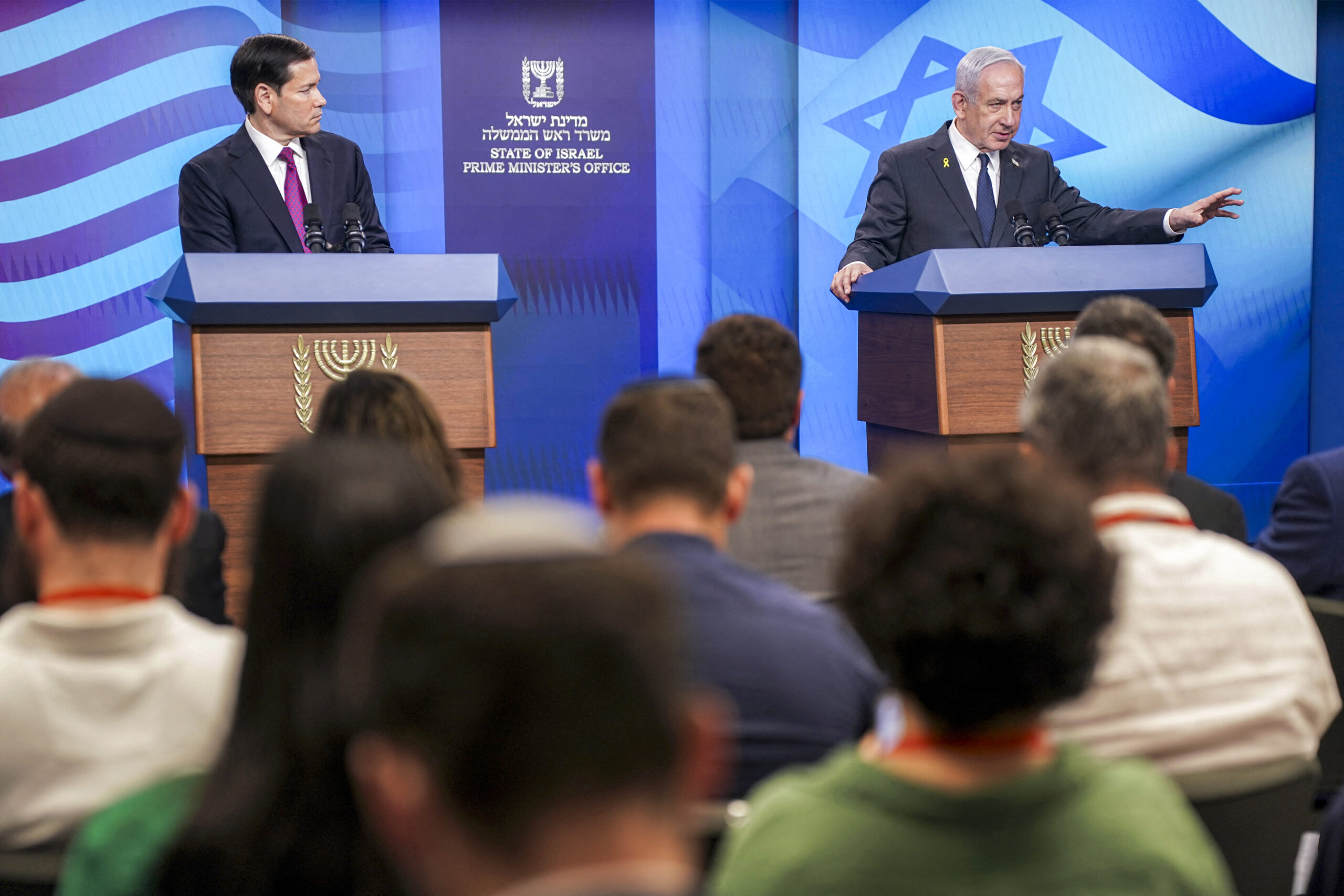
At a press conference with Israeli PM Netanyahu, Rubio said an agreement with Hamas to end war ‘probably won’t happen’ because ‘savage terrorists don’t often agree to disarm’
Speaking at the Eradicate Hate Global Summit on rising political violence, Shapiro called for ‘peaceful and respectful dialogue’
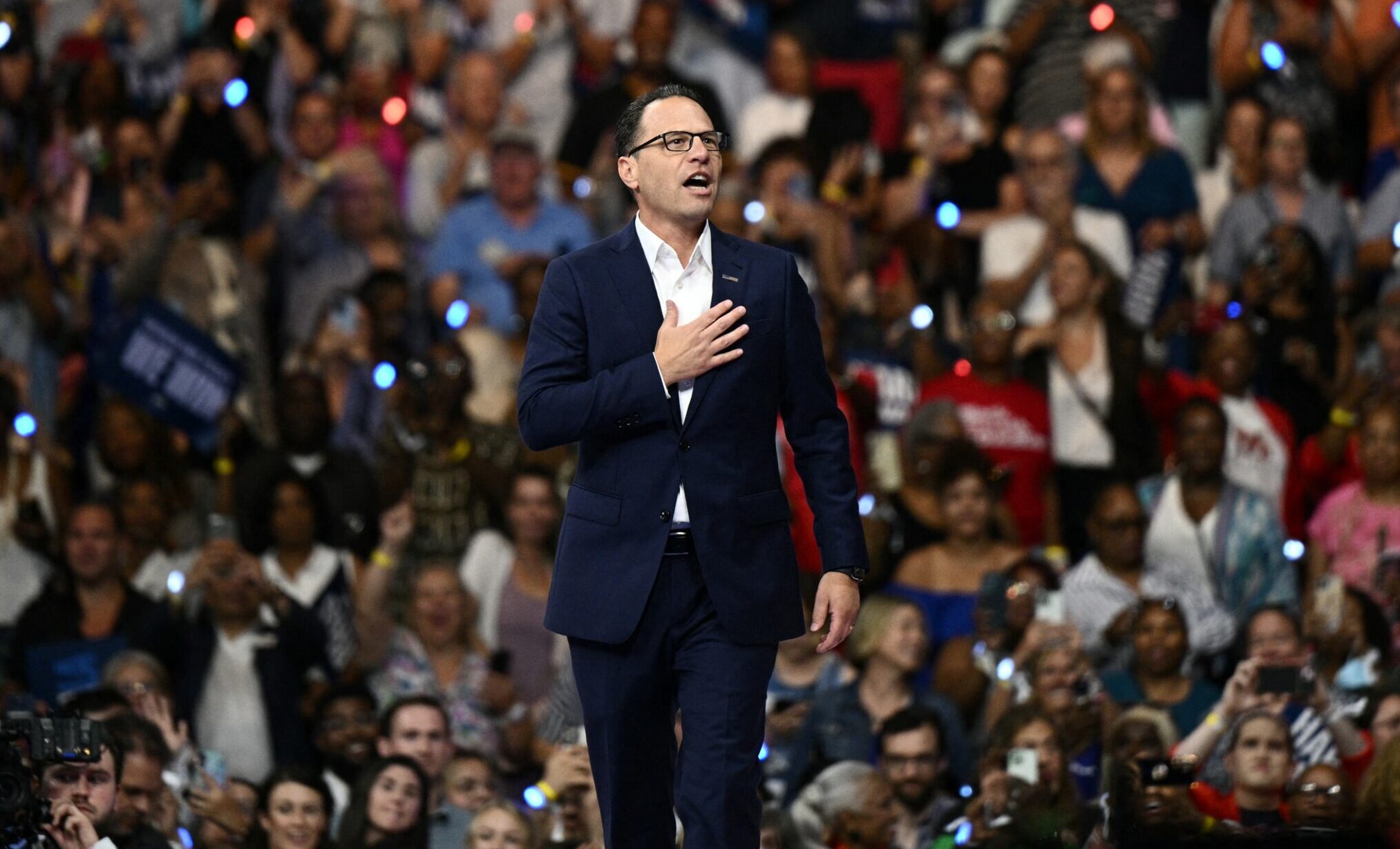
BRENDAN SMIALOWSKI/AFP via Getty Images
Pennsylvania Governor Josh Shapiro speaks before Democratic presidential candidate Kamala Harris in Philadelphia, Pennsylvania, August 6, 2024.
Amid an alarming rise in political violence, Pennsylvania Gov. Josh Shapiro said Tuesday that the way to combat extremism and division is by bringing people together and restoring their faith in the government — a civic-minded strategy that included some thinly veiled swipes at President Donald Trump and the hardline rhetoric he has adopted since conservative activist Charlie Kirk was killed in Utah last week.
Shapiro and his family survived an April arson attack that damaged the governor’s residence in Harrisburg while they slept, hours after hosting a Passover Seder there. The alleged arsonist acted to protest Shapiro’s stance toward the Palestinians, according to a police search warrant.
“I believe we have a responsibility to be clear and unequivocal in calling out all forms of political violence, making clear it is all wrong,” Shapiro said in a keynote address at the Eradicate Hate Global Summit, a Pittsburgh conference created in the aftermath of the 2018 mass shooting at the Tree of Life synagogue. “Unfortunately some, from the dark corners of the internet all the way to the Oval Office, want to cherry pick which instances of political violence they want to condemn.”
Shapiro called for dialogue and a rejection of the demands for revenge that have permeated social media since Kirk’s murder last week. The speech did not name Trump, although Shapiro called for Trump to act with “moral clarity” in a post on X on Monday.
Widely rumored to be considering a 2028 presidential run, the speech offered Shapiro a chance to deliver a wide-ranging speech to a national audience.
“We need to create more opportunities for peaceful and respectful dialogue, respecting each other’s fundamental rights as Americans,” said Shapiro. “Prosecuting constitutionally protected speech will only further erode our freedoms, deepen the mistrust. That is un-American.” Attorney General Pam Bondi said on Monday that the U.S. would be “targeting” hate speech, which she said was different from free speech — a statement she attempted to walk back a day later after facing bipartisan pushback.
There is a better way, Shapiro added: “That better way is the Pennsylvania way.”
“Those who stoke division will want to have us believe words are important, but we also need action,” said Shapiro. “We need to make sure people are safe here in Pennsylvania and all across America, safe to exercise their fundamental rights and freedoms, whether they’re debating on a college campus, praying at a synagogue or church or spending time at home with loved ones.”
Americans should do more to address hate online, and to teach people to better distinguish “fact from fiction” on the internet, argued Shapiro. But more than that, he said, they need to see and trust that the government actually can make their lives better.
“There’s a deeper issue at the root of this dangerous rise of political violence. Too many people don’t believe that our institutions and the people in them can solve problems anymore. They feel alone, ignored, shut out by a government that isn’t working for them,” said Shapiro. “It leads to a belief among some that the only way they can address their problems is through violence.”
The ways to prove otherwise, Shapiro said, are simple — helping people get driver’s licenses quickly, giving kids free breakfast at school and “building a government that works for Pennsylvanians and gets stuff done.”
Shapiro leaned on Jewish teachings in his speech, referring as he often does to how his faith underpins his public service.
During a speech at the Eradicate Hate Global Summit in Pittsburgh, Pennsylvania Gov. @JoshShapiroPA shared the story of an 82-year-old Christian chaplain of a local fire department, who gave Shapiro and his family a letter signed by each member of their department after an April… pic.twitter.com/jqTD9U7S3U
— Jewish Insider (@J_Insider) September 16, 2025
“My faith has taught me that no one is required to complete the task, but neither are we free to refrain from it. It means that each of us has a responsibility to get off the sidelines, get in the game and do our part,” Shapiro said.
After the attack on the governor’s mansion, Pennsylvanians “were united in speaking and acting with moral clarity, making clear that hatred and violence has no place here in Pennsylvania,” said Shapiro.
He shared the story of the 82-year-old Christian chaplain of a local fire department, who gave Shapiro and his family a letter signed by each member of their department. On the back, the chaplain had written by hand what he said was the most important blessing in his life, from the Book of Numbers.
May the Lord bless you and keep you. May the Lord make His face shine upon you and be gracious to you. May the Lord turn His face toward you and give you peace.
“I wept when I read that prayer that he wrote,” said Shapiro, who recalls then telling the chaplain that he recites that prayer — known as the Priestly Blessing in Judaism — to his children each night. He then proceeded to do so in Hebrew, and offered his own benediction about the power the prayer holds for a nation reeling from violence.
Yivarechecha Adonai v’yishmerecha. Ya’er Adonai panav eilecha v’chuneka. Yisa Adonai panav eilecha v’yasem l’cha shalom.
“Those are words of healing, words of hopefulness to me,” said Shapiro. “They are also words that again remind us of our shared humanity.”
Plus, anti-Israel WaPo columnist fired over Charlie Kirk commentary
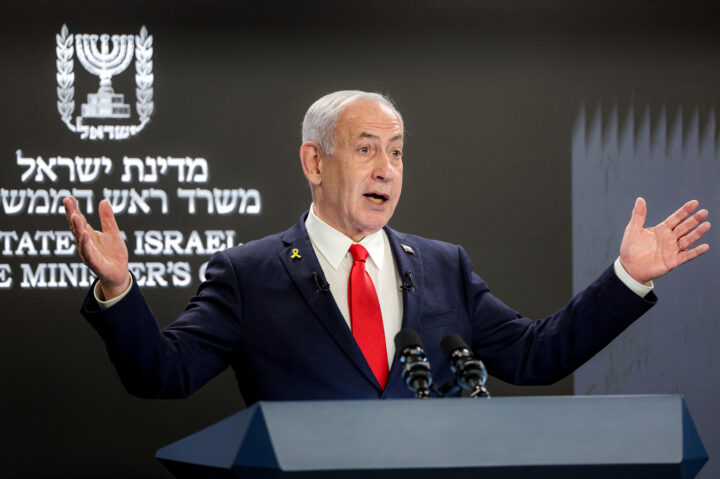
ABIR SULTAN/POOL/AFP via Getty Images
Israel's Prime Minister Benjamin Netanyahu gives a press conference at the Prime minister's office in Jerusalem on August 10, 2025.
Good Monday afternoon.
This P.M. briefing is reserved for our premium subscribers like you — offering a forward-focused read on what we’re tracking now and what’s coming next.
I’m Danielle Cohen-Kanik, U.S. editor at Jewish Insider and curator, along with assists from my colleagues, of the Daily Overtime briefing. Please don’t hesitate to share your thoughts and feedback by replying to this email.
📡On Our Radar
Notable developments and interesting tidbits we’re tracking
Israeli Prime Minister Benjamin Netanyahu predicted that Israel will have to become increasingly self-reliant as countries call for embargoes and sanctions against the Jewish state. Speaking at a Finance Ministry conference in Jerusalem today, Netanyahu said, “We will increasingly need to adapt to an economy with autarkic characteristics.”
“I am a believer in the free market, but we may find ourselves in a situation where our arms industries are blocked. We will need to develop arms industries here — not only research and development, but also the ability to produce what we need,” the Israeli PM said…
Secretary of State Marco Rubio met with Israeli President Isaac Herzog in Jerusalem today, where they gave remarks on the occasion of the fifth anniversary of the Abraham Accords. “Imagine, despite the difficulties the region has confronted over the last few years, how much more difficult it would have been had the Abraham Accords not been in place,” Rubio said…
Elsewhere in the region, after an emergency summit of Arab states convened in Qatar to discuss last week’s Israeli strike in Doha, the leaders of the Gulf Cooperation Council countries today directed the GCC defense ministers to hold an “urgent meeting” to “assess the defense situation of the Council states.”
The countries also issued a communique calling on states to “review diplomatic and economic relations” and “initiate legal proceedings” against Israel…
At the International Atomic Energy Agency’s annual conference happening now in Vienna, Iran is circulating a resolution to censure the U.S. and Israel over their strikes on Iran’s nuclear facilities in June. Iran was unexpectedly elected by other Middle Eastern countries to serve as vice president of the gathering.
Mohammad Eslami, the head of the Atomic Energy Organization of Iran, said in an interview that “if [participating countries] want to obey the law of the jungle and the rule of coercion and force” by blocking the motion, “it’ll end in chaos”…
Stateside, Rep. Tom Suozzi (D-NY) announced he will not be endorsing Democratic nominee Zohran Mamdani for New York City mayor, on the heels of New York Gov. Kathy Hochul’s announcement that she’s supporting the candidate.
Suozzi, who represents a swing district on Long Island, said that, “While I share [Mamdani’s] concern about the issue of affordability, I fundamentally disagree with his proposed solutions. Like the voters I represent, I believe socialism has consistently failed to deliver real, sustainable progress.”
On Hochul, Suozzi said that he did not discuss his decision with her and is “not in a position to give the Governor political advice considering the fact that when I ran against her she beat me soundly”…
In another high-profile New York race, Micah Lasher, a state assemblyman and former aide to Rep. Jerry Nadler (D-NY), officially launched his campaign for his former mentor’s congressional seat today, joining a Democratic primary that’s likely to become crowded in the heavily Jewish Manhattan district. Nadler is expected to offer Lasher his support, a key endorsement in the race…
The New York Times investigates a series of trade and business dealings over the UAE’s access to AI chips that appear to be connected with cryptocurrency windfalls for the Witkoff and Trump families.
When David Feith, then senior director for technology on the National Security Council, attempted to change AI chip policy, which would have inhibited that access, he was fired by President Donald Trump, after a conversation with his influential advisor Laura Loomer…
The fallout from Charlie Kirk’s killing continues: Semafor’s Editor-in-Chief Ben Smith writes about Kirk’s legacy on Israel within the GOP and how both the isolationist and pro-Israel camps of the party are now claiming him as their own.
“A bereft White House official told me that Kirk functioned as something like a Republican chairman and Rush Limbaugh ‘rolled into one.’ Clips of his speeches and debates are everywhere, but movement-building is a subtler thing, and Kirk’s public statements, friends said, often reflected attempts at intraparty diplomacy,” Smith wrote…
Karen Attiah, an opinion columnist at The Washington Post who regularly espoused anti-Israel views, was fired from the paper over her posts on social media about Kirk’s death, including mischaracterizing some of his positions and positing that her “journalistic and moral values” prevented her from “engaging in excessive, false mourning” for Kirk.
Attiah, the Post’s founding Global Opinions editor, retweeted social media messages justifying the Oct. 7 Hamas attacks on Israel as they were taking place and wrote a piece on Oct. 13, less than a week after the attacks, headlined, “We cannot stand by and watch Israel commit atrocities”…
Also in the media, Jewish influencer Hen Mazzig reacts to Jewish actress Hannah Einbinder’s pro-Palestinian commentary at the Emmys last night in The Hollywood Reporter: “Hannah should know there is no such thing as a ‘good Jew’ who can launder antisemitism. The ‘good Jews’ trope — the ones who sign boycott pledges or reassure progressives that this isn’t about hatred — are always used as cover. They are never enough. And at the end of the day, the people demanding ‘good Jews’ don’t actually believe there is anything good about being Jewish”…
After the Vuelta a Espana bike race in Madrid was called off during its finale on Sunday due to anti-Israel protests on the route, Spanish Prime Minister Pedro Sánchez called today for Israel to be banned from sports events due to its military campaign in Gaza, despite the team being protested, Israel-Premier Tech, not being an official Israeli team.
The international union of cyclists voiced its disapproval of Sánchez’s stance, saying in a statement that it “strongly condemns the exploitation of sport for political purposes in general, and especially coming from a government”…
Lynn Forester de Rothschild is exploring a sale of a minority stake in the parent company of The Economist magazine, according to Bloomberg, which would mark the publication’s first ownership shake-up in over a decade…
⏩ Tomorrow’s Agenda, Today
An early look at tomorrow’s storylines and schedule to keep you a step ahead
Keep an eye on Jewish Insider tomorrow morning for an interview with Yaakov Katz, former editor-in-chief of The Jerusalem Post, on his new book about Oct. 7 and an interview with Rep. Zach Nunn (R-IA), a rising national security voice on Capitol Hill.
Pennsylvania Gov. Josh Shapiro will deliver a major address on political violence at the Eradicate Hate Global Summit in Pittsburgh tomorrow, nearly a week after the fatal shooting of Charlie Kirk and several months after the firebombing of Shapiro’s residence over Passover.
Also speaking at the summit will be KIND Snacks founder and former CEO Daniel Lubetzky alongside Lonnie Ali, founder of the Muhammad Ali Center with her eponymous late husband.
The Senate Judiciary Committee will hold a hearing tomorrow morning on oversight of the FBI with FBI Director Kash Patel.
Democratic Majority for Israel will host a live briefing tomorrow with Rep. Josh Gottheimer (D-NJ) and former U.S. Ambassador to Israel Dan Shapiro on Gottheimer’s recent trip to Israel, next steps for the Abraham Accords and the latest in the Israel-Hamas war.
The Center for a New American Security will hold a live fireside chat tomorrow with Adam Boehler, the U.S. special envoy for hostage response.
Alan Dershowitz, a former Harvard Law School professor and prominent defense attorney and Israel advocate, will speak tomorrow at the JFK Jr. forum at Harvard at the first “Middle East Dialogues” event of the academic year, hosted by professor Tarek Masoud, who invites polarizing speakers to debate the Israeli-Palestinian conflict.
In the evening, American Friends of Lubavitch (Chabad) will host its Lamplighter Awards at D.C.’s Union Station. This year’s honoree is Palantir CEO Alex Karp, and House Minority Leader Hakeem Jeffries (D-NY) will receive a leadership award.
Magen David Adom will host its 2025 New York City Gala in Manhattan, where political commentator Meghan McCain will receive its Champion of Israel Award.
Stories You May Have Missed
INTERVIEW TACTICS
Isaac Chotiner, The New Yorker’s interrogator out to trip up Israel supporters

Chotiner recently devoted six consecutive Q&A interviews with guests about Israel, many of them contentious and combative
HAWKEYE STATE RACE
Ashley Hinson emerges as odds-on favorite to succeed Ernst in the Senate
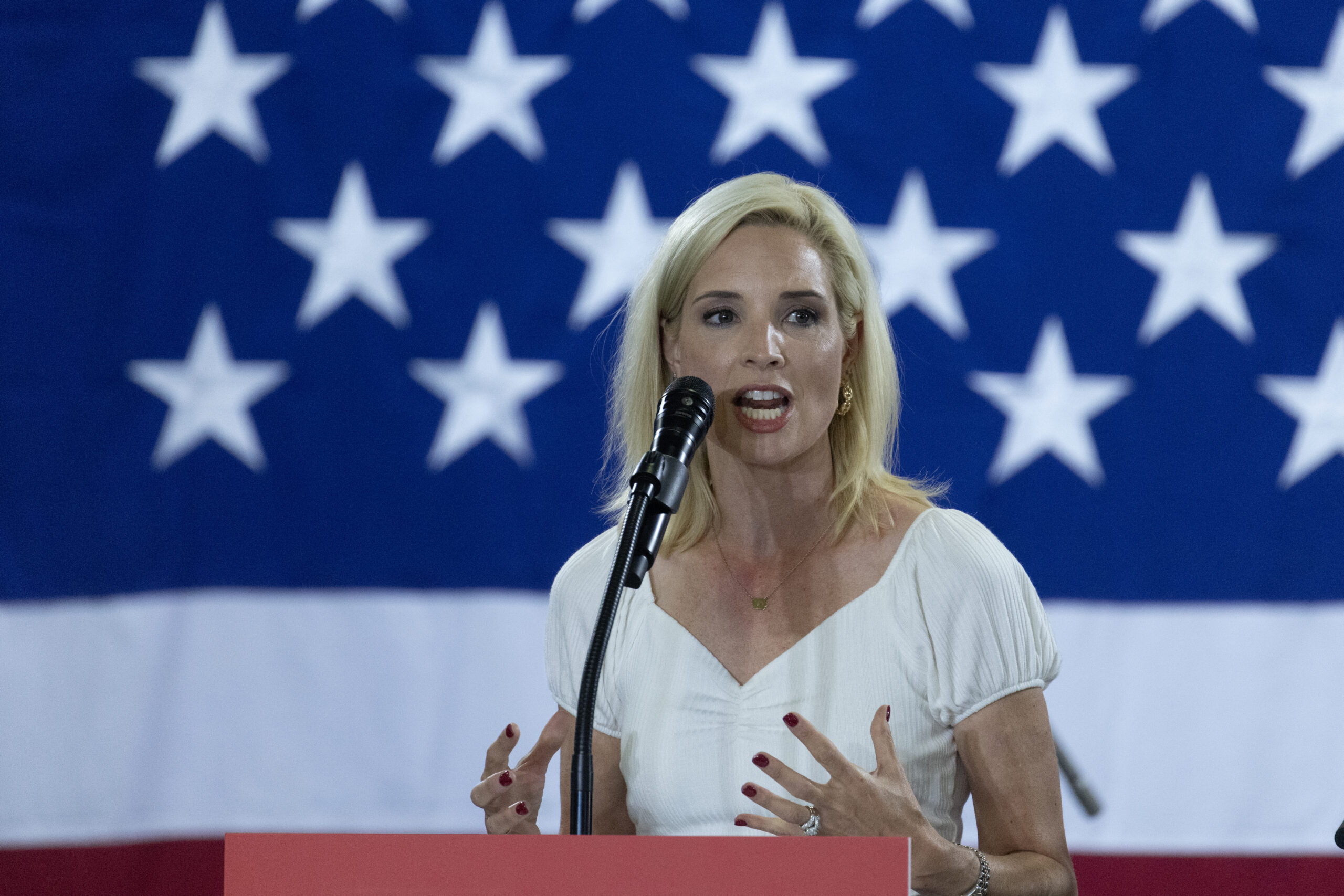
The former TV news anchor boasts a consistently conservative, pro-Israel voting record, and has a history of winning tough races
The former TV news anchor boasts a consistently conservative, pro-Israel voting record, and has a history of winning tough races
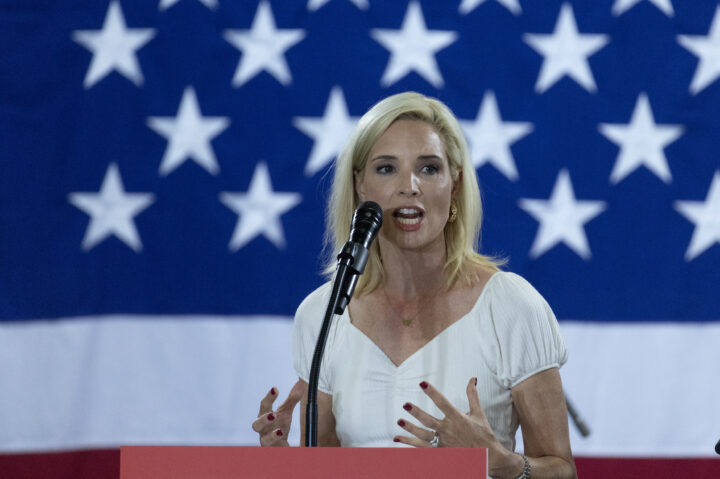
Scott Olson/Getty Images
U.S. Rep. Ashley Hinson speaks to guests during her Ashley's BBQ Bash fundraiser on August 23, 2025 in Cedar Rapids, Iowa. The event was the fifth annual, which she holds to support Iowa Republican causes and candidates.
Rep. Ashley Hinson (R-IA) has emerged as the front-runner in the contest to replace retiring Sen. Joni Ernst (R-IA), with national Republicans swiftly coalescing around her bid for the GOP nomination as they look to avoid a messy primary battle.
Hinson, a politically tested lawmaker who has long been viewed as a potential successor to Ernst, launched her Senate campaign within hours of Ernst’s announcement last Tuesday that she would not seek a third term.
Hinson, in her candidate announcement, said that she would be President Donald Trump’s “strongest ally” in the Senate and would work to “deliver the America First agenda.” She also praised Ernst for her military service and time in public office, saying that, “Our country and state are better off because of Joni’s selfless service.”
Hinson, a prolific fundraiser who entered the race with a $2.8 million war chest, began racking up endorsements shortly after her campaign launch. Trump endorsed Hinson on Friday, as did Senate Majority Leader John Thune (R-SD) and Sen. Tim Scott (R-SC), chairman of the National Republican Senatorial Committee, Senate Republicans’ campaign arm.
Trump described Hinson as “a wonderful person” whom he knows “well,” and praised her devotion to her family before touting her commitment to “our incredible Iowa workers.”
“She is working hard to Create Jobs, Cut Taxes, Promote Products and Services MADE IN AMERICA by our incredible Iowa Workers, Support our Great Farmers and American Agriculture, Champion Innovation, Continue to Help Secure our now very Secure Southern Border, Stop Migrant Crime, Murderers, and other Criminals from illegally entering our Country, Strengthen our Military/Veterans, and Defend our always under siege Second Amendment,” Trump wrote of Hinson on his Truth Social platform.
“From a foreign policy perspective, or even culturally with respect to antisemitism and all that sort of thing, I don’t think that you’re going to see a lot of difference between Joni Ernst, who’s been a strong supporter of Israel and who I think has been a really effective leader on the national stage, and Ashley,” David Kochel, a veteran GOP campaign operative, told JI.
Ernst and Hinson are close professionally and personally; in addition to being friends, the two have long been aligned on foreign and domestic policy and worked together on scores of bicameral legislative efforts.
Both lawmakers have been repeatedly endorsed by AIPAC and the Republican Jewish Coalition, though neither organizations have officially gotten behind Hinson’s Senate bid yet. While Ernst hasn’t endorsed in the race either, Hinson is the candidate she is most aligned with ideologically.
“From a foreign policy perspective, or even culturally with respect to antisemitism and all that sort of thing, I don’t think that you’re going to see a lot of difference between Joni Ernst, who’s been a strong supporter of Israel and who I think has been a really effective leader on the national stage, and Ashley,” David Kochel, a veteran GOP campaign operative, told Jewish Insider.
“On issues of concern to Jewish Americans, Ashley Hinson has been an absolute stalwart,” Sam Markstein, who serves as national political director for the RJC, told JI.
Markstein described Hinson as “an incredibly strong voice in Israel’s defense,” citing her “calling Hamas’ terror attack ‘evil,’ and affirming Israel’s right to defend itself immediately” after the Oct. 7, 2023, attacks on Israel as examples. He also noted that she has “consistently voted for vital military aid to Israel and Iron Dome defense systems,” and pointed to her cosponsoring legislation “to pressure the Biden administration to deliver critical aid that they were holding up as the Jewish state was fighting a seven-front war.”
“She has stood strongly against the Iranian regime by supporting measures to reinstitute maximum pressure and reimpose crippling sanctions. Ashley Hinson also has a very strong record on combating antisemitism. Notably, unlike some on the neo-isolationist far right, when Ashley Hinson says, ‘America First,’ for her, and for the RJC, that means standing strongly with our allies, like Israel, peace through strength, using decisive military action when necessary and rejecting forever wars,” Markstein said.
The swift action on Hinson’s part in launching her campaign and locking down major endorsements has propelled her campaign to front-runner status in the race, and a smooth primary contest could benefit what are already strong general election chances for Republicans in the Hawkeye State.
“Ashley’s been pretty good on the Trump record,” Kochel said. “I think things are going to consolidate pretty quickly around her.”
“She is definitely going to be the leading candidate in the Republican primary, and she’s going to be a very tough candidate in the general election as well,” he told JI.
Thus far in the primary, Hinson is facing Jim Carlin, a Republican former state senator who initially entered the contest to challenge Ernst from the right after winning 27% of the vote against Sen. Chuck Grassley (R-IA) in a 2022 primary, and Joshua Smith, a former libertarian and podcast host who is a sharp critic of the U.S.-Israel relationship.
Smith has espoused virulently anti-Israel beliefs on social media, posting in March of this year on X that Israel is a “fake state of anti Jesus heathens who are fine with killing children” and claiming in a post last May that Jewish people suffer from a “Jewish victim complex.”
Hinson began her career in local television as a broadcast journalist in Cedar Rapids, Iowa, and went on to win two Midwest regional Emmy Awards and become a health reporting fellow for the Radio Television Digital News Association. She entered politics in 2016, when she won a competitive seat in the Iowa state House of Representatives representing the purple Cedar Rapids area by a two-to-one margin.
Hinson was elected to the House in 2020 after defeating former Rep. Abby Finkenauer, a Democrat who flipped Iowa’s 1st Congressional District blue in 2018, by more than two points.
The other rumored candidate looking at the race is U.S. Ambassador to NATO Matt Whitaker, Trump’s former acting attorney general during his first term who lost to Ernst in the GOP primary for her Senate seat in 2014. But with Trump and leading Republicans rallying behind Hinson, the prospects of Whitaker running has dimmed.
The Democratic side of the aisle has a crowded field of candidates competing for the party’s nomination, including state Rep. Josh Turek, state Sen. Zach Wahls and Jackie Norris, chairwoman of the Des Moines Public Schools board.
“Whoever wins the Republican nomination for U.S. Senate in Iowa will have a very, very strong chance of succeeding Joni Ernst,” Sam Markstein, who serves as national political director for the RJC, told JI. “Regarding Ashley Hinson specifically, ask yourself what the telltale signs of a well-run operation are, and you’ll see she is clearly checking all of the boxes: the speed and efficiency of her campaign launch, announcing support from President Trump, as well as House and Senate leadership.”
Democrats have expressed an interest in contesting the open Senate seat in Iowa, a now reliably Republican state that was a battleground before Trump’s political ascendance.
The party has some renewed confidence in their political standing in the state, after Democrats flipped a state Senate seat in a special election last month. The state currently has one state elected official that’s a Democrat: State Auditor Rob Sand.
Whether national Democrats will allocate resources to the Hawkeye State remains to be determined, but winning statewide as a Democrat in deep red Iowa will be a difficult challenge. Democrats haven’t won a Senate race in Iowa since 2008, when former Sen. Tom Harkin handily won a fifth term, prompting Republicans to dismiss the notion that this race will be competitive.
“Whoever wins the Republican nomination for U.S. Senate in Iowa will have a very, very strong chance of succeeding Joni Ernst,” Markstein told JI.
“Regarding Ashley Hinson specifically, ask yourself what the telltale signs of a well-run operation are, and you’ll see she is clearly checking all of the boxes: the speed and efficiency of her campaign launch, announcing support from President Trump, as well as House and Senate leadership. This, and more, illustrates that she’s focused, organized, and has an excellent team around her, all of which is needed to win,” he continued.
The NRSC sent a memo to donors last week expressing confidence that Democrats would face an uphill slog in Iowa, and touted Hinson as a “formidable contender” who “would be exceedingly difficult for any Democrat to challenge.”
A source familiar with how the NRSC is viewing the contest told JI that, “Democrats are trying really hard to say that Iowa is in play and that it is a competitive race. That’s just not electorally where we view it.”
“It’s also just not ultimately what the field on their side signals. They have a very messy, competitive primary right now. It does not appear that [Senate Minority Leader Chuck] Schumer is going to be able to clear the field. That is obviously a direct contrast to what we’re seeing so far on our side,” the source said, noting the growing support for Hinson on the GOP side of the aisle.
Kochel noted that, “Iowa historically was a swing state. [Former President Barack] Obama won it twice and Trump’s won it three times, but certainly the registration advantage that Republicans have has been growing. As the electorate has changed in the last 10 years, more non-college [educated], white, working-class voters are becoming more and more Republican. We’ve got a lot of those in Iowa.”
“Demographically, Iowa is kind of getting away from the Democrats a little bit,” he continued, predicting, “We’ll see this race settle into a pretty familiar framework.”
Plus, Paramount Skydance looks to merge with Warner Bros
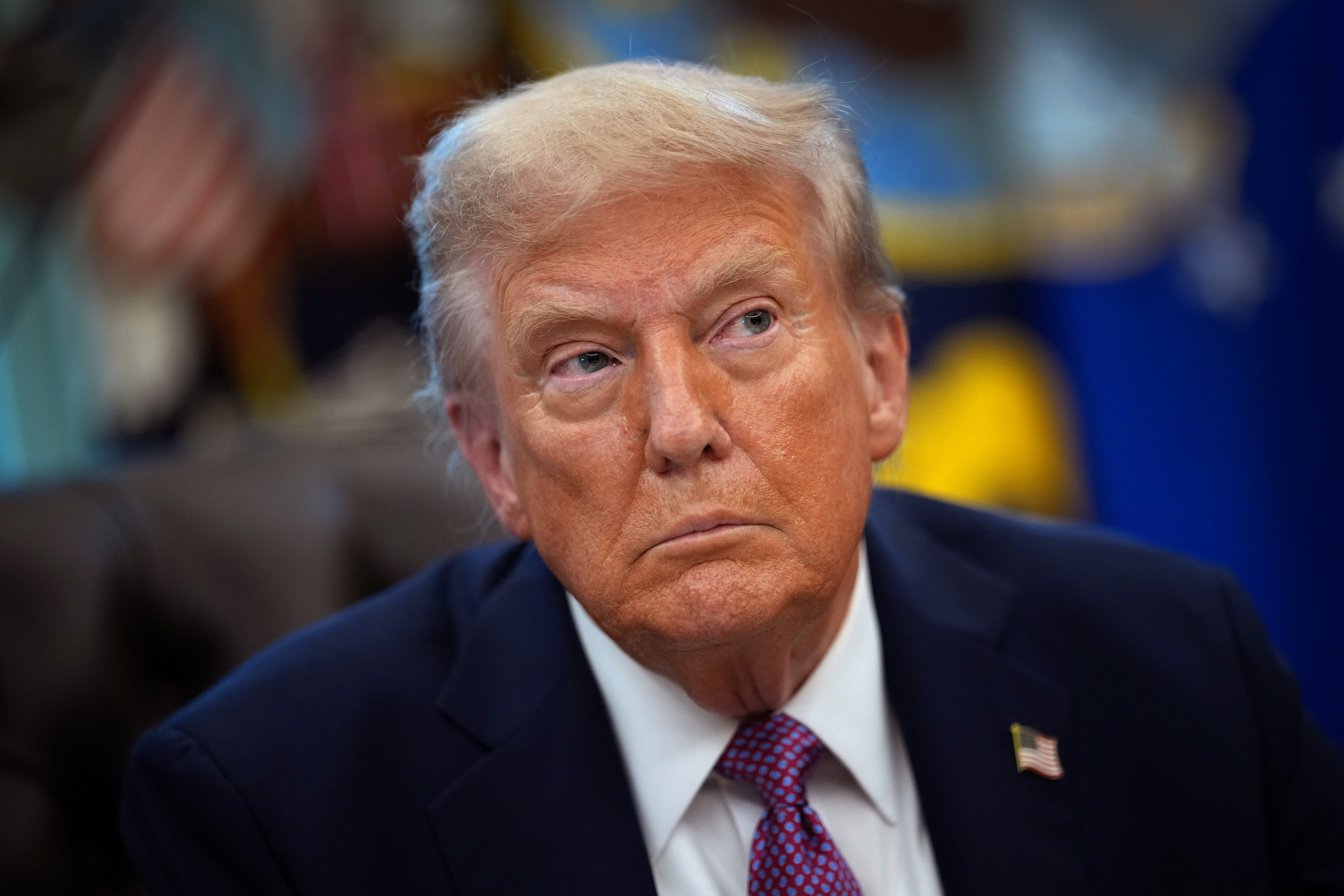
Kevin Dietsch/Getty Images
U.S. President Donald Trump speaks to members of the media as he signs executive orders during a press availability in the Oval Office of the White House on September 05, 2025 in Washington, DC.
Good Thursday afternoon.
This P.M. briefing is reserved for our premium subscribers like you — offering a forward-focused read on what we’re tracking now and what’s coming next.
I’m Danielle Cohen-Kanik, U.S. editor at Jewish Insider and curator, along with assists from my colleagues, of the Daily Overtime briefing. Please don’t hesitate to share your thoughts and feedback by replying to this email.
📡On Our Radar
Notable developments and interesting tidbits we’re tracking
Lawmakers, candidates and officials from across the political spectrum continued to reel in the aftermath of the killing of conservative activist Charlie Kirk in Utah yesterday, with many changing their planned appearances.
Vice President JD Vance went to pay his respects to the Kirk family in Salt Lake City instead of attending a 9/11 memorial ceremony at Ground Zero in New York. Kirk’s casket will be flown back to his home state of Arizona on Air Force 2 along with his family and friends.
In addition, President Donald Trump moved a Pentagon 9/11 memorial event to a more secure location, as his team was especially shaken by Kirk’s death; Texas Democratic Senate candidate James Talarico devoted his campaign kickoff speech in San Antonio last night to memorializing Kirk; right-wing media personality Ben Shapiro, a close friend of Kirk, canceled an event tonight at the Ronald Reagan Presidential Foundation in California; Rep. Alexandria Ocasio-Cortez (D-NY) announced she is postponing a rally in North Carolina this weekend out of respect for Kirk and security concerns; and more…
The fallout continues from Israel’s strike against Hamas leaders in Doha this week, with Democratic Majority for Israel accusing Trump in a new scathing statement of betraying Israel by coming out publicly against the strike and potentially foiling its effectiveness by tipping off Qatar (though U.S. and Qatari officials have said that the warning call from Middle East envoy Steve Witkoff came as the strike was already underway).
The statement puts the group at odds with many Democratic lawmakers, who have come out against the strike.
“After years of criticizing Democrats — despite our party’s 75-year history of supporting Israel — President Donald Trump yesterday broke with our vital ally in an unprecedented manner,” DMFI CEO Brian Romick said. “The White House must answer whether their pre-warning of the attack in any way compromised Israel’s ability to eliminate Hamas’ terrorist leadership”…
Doubling down in its displeasure, the Trump administration joined a unanimous U.N. Security Council statement today that condemns the strike, though it does not mention Israel nor Hamas.
“Council members underscored the importance of de-escalation and expressed their solidarity with Qatar. They underlined their support for the sovereignty and territorial integrity of Qatar, in line with the principles of the UN Charter. Council members recalled their support for the vital role that Qatar continues to play in mediation efforts in the region,” the statement read…
Qatari Prime Minister Sheikh Mohammed bin Abdulrahman Al Thani will travel to Washington tomorrow to discuss the incident, Israeli media reports, meeting with senior Trump administration officials and potentially the president himself, and Qatar will host an emergency summit beginning Sunday with Arab states.
Al Thani said in an interview that, prior to the strike, a meeting had been scheduled for Friday between himself, Egyptian and Turkish intelligence officials and Witkoff, but Israel’s attack “destroyed the mediation efforts” for a ceasefire with Hamas and “extinguished the last glimmer of hope”…
Back in Israel, Prime Minister Benjamin Netanyahu authorized a plan to build the long-disputed E1 settlement project, which would make a contiguous Palestinian state nearly impossible, at a signing ceremony today at the Ma’ale Adumim settlement, where the new units will be added.
“We said a Palestinian state will not be established — and indeed, a Palestinian state will not be established,” Netanyahu said at the event…
The New York Times’ Jerusalem bureau announced that David Halbfinger is returning to Israel to serve as the paper’s bureau chief, and Isabel Kershner was named senior correspondent.
The newly merged Paramount Skydance is now preparing a bid to purchase Warner Bros. Discovery, The Wall Street Journal reports, including its cable networks and movie studio. The bid is backed by the Ellison family — Paramount owner David Ellison is the son of billionaire Oracle co-founder Larry Ellison…
⏩ Tomorrow’s Agenda, Today
An early look at tomorrow’s storylines and schedule to keep you a step ahead
Keep an eye on Jewish Insider tomorrow morning for reporting on the belated passage of a K-12 antisemitism bill in the California Legislature that pitted Jewish Democrats and their allies against teachers’ unions in the state.
The Capital Jewish Museum in Washington will host a gala Sunday evening honoring Esther Safran Foer, the former executive director of D.C.’s Sixth & I Synagogue, and David Rubenstein, chairman of the Carlyle Group.
Secretary of State Marco Rubio is expected to land in Israel early next week, with a planned appearance at the opening of the Pilgrimage Road at the City of David archaeological site on Monday. (Read JI’s coverage of the Pilgrimage Road excavation here).
A bipartisan delegation of 250 U.S. state legislators will also land in Israel for a trip next week.
The Climate Solutions Prize Tour, in partnership with the Jewish Climate Trust, will begin in Israel on Sunday, after several days in the UAE.
We’ll be back in your inbox with the Daily Overtime on Monday. Shabbat shalom!
Stories You May Have Missed
IN MEMORIAM
Charlie Kirk remembered as a bulwark against antisemitism on the right
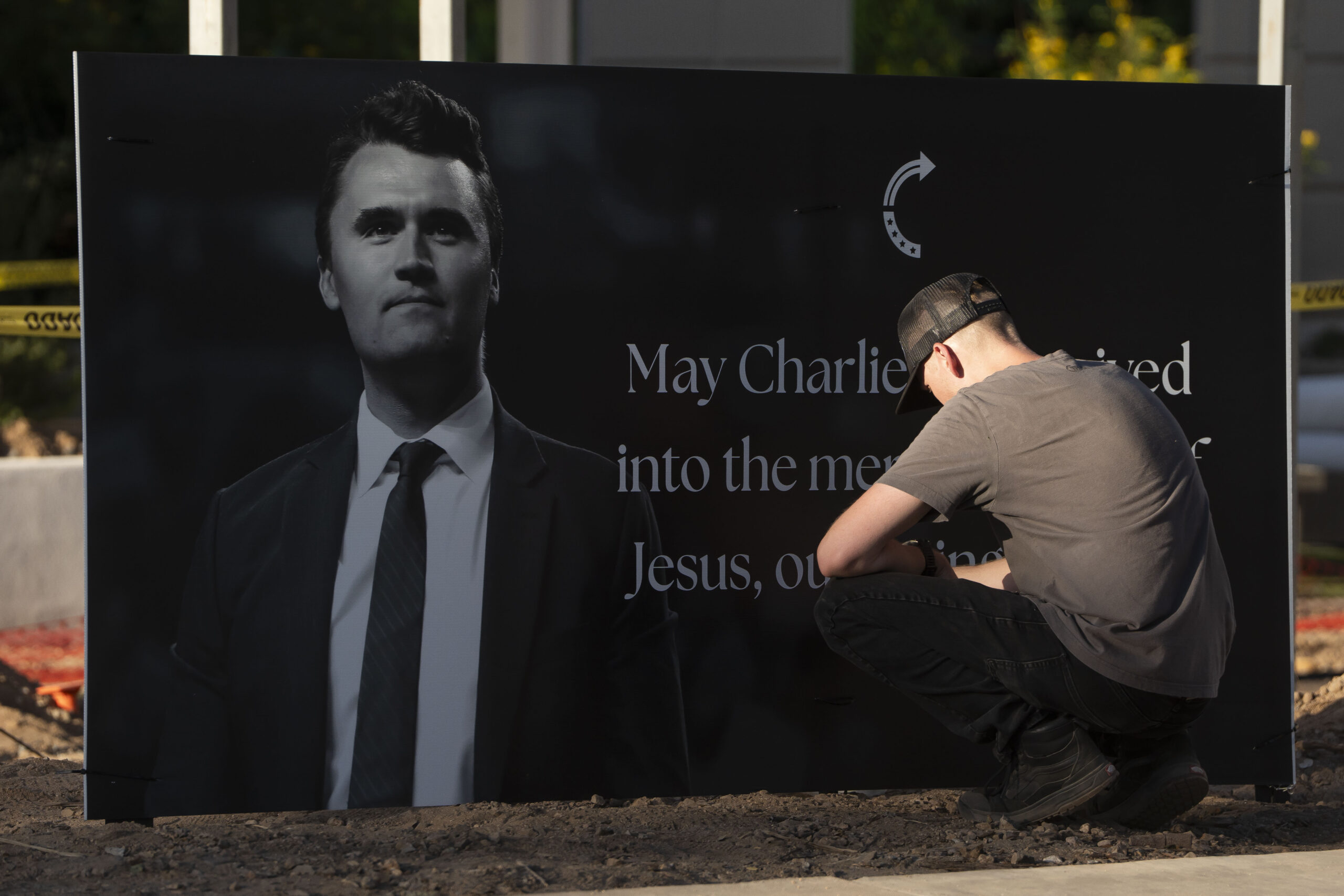
Josh Hammer told JI: ‘He was really holding back some really nasty stuff in some very young, far-right online circles. … Part of me kind of worries, frankly, about what that energy does from here in his absence’
DEFIANT DEFENSE
Amb. Leiter defends Doha strike, amid Trump criticism
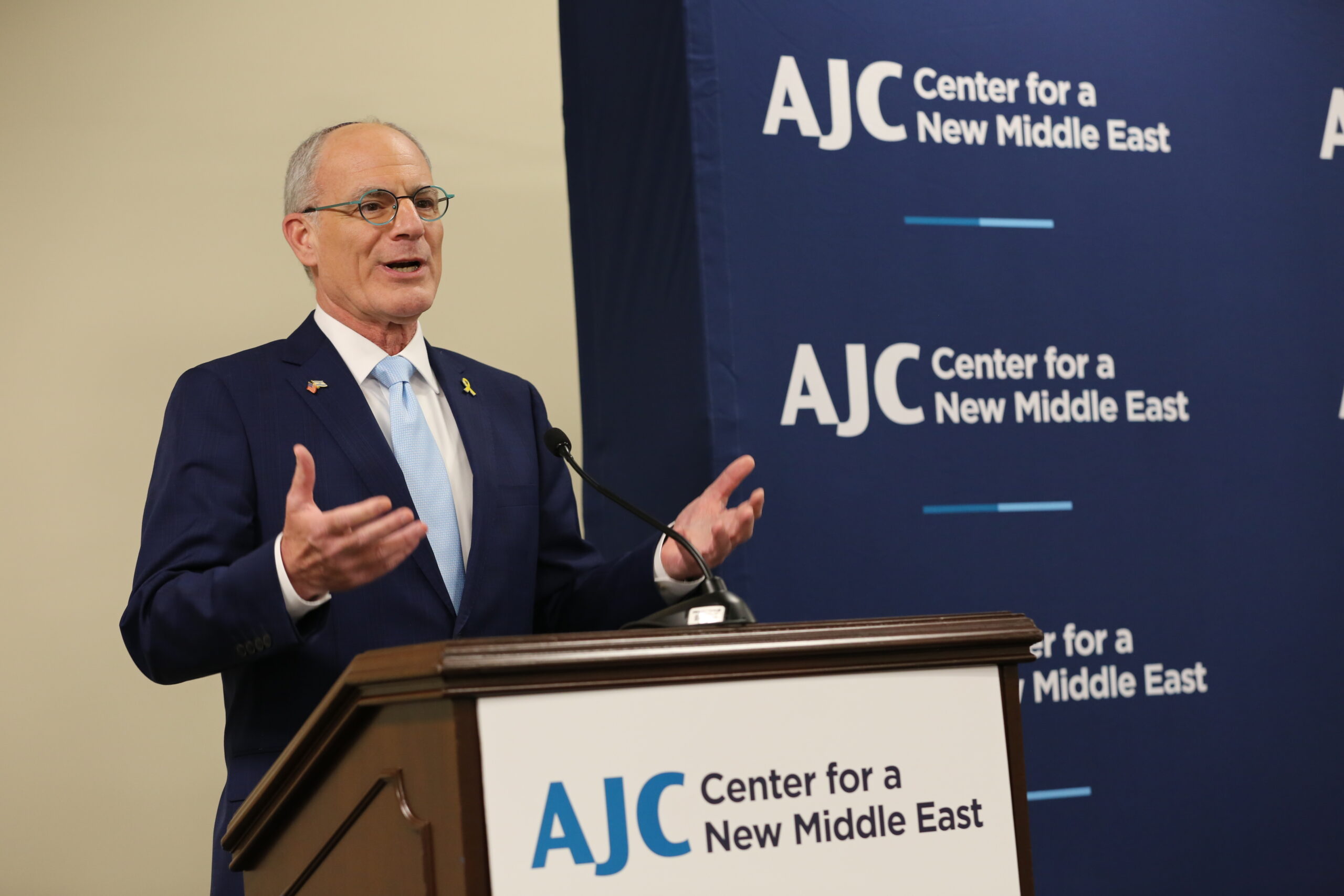
Leiter compared Israel’s campaign against Hamas to the U.S. pursuing the perpetrators of 9/11
Plus, Netanyahu links 9/11 to 10/7
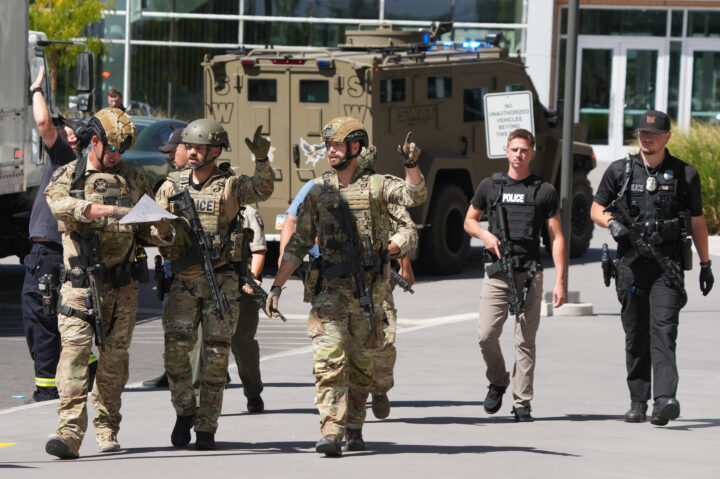
George Frey/Getty Images
Law enforcement responds to the scene where political activist Charlie Kirk was shot during an event at Utah Valley University on September 10, 2025 in Orem, Utah.
Good Wednesday afternoon.
This P.M. briefing is reserved for our premium subscribers like you — offering a forward-focused read on what we’re tracking now and what’s coming next.
I’m Danielle Cohen-Kanik, U.S. editor at Jewish Insider and curator, along with assists from my colleagues, of the Daily Overtime briefing. Please don’t hesitate to share your thoughts and feedback by replying to this email.
📡On Our Radar
Notable developments and interesting tidbits we’re tracking
Conservative activist Charlie Kirk died this afternoon after being shot in the neck while speaking at an event at Utah Valley University.
President Donald Trump posted on Truth Social, “The Great, and even Legendary, Charlie Kirk, is dead. No one understood or had the Heart of the Youth in the United States of America better than Charlie. He was loved and admired by ALL, especially me, and now, he is no longer with us.”
Kirk, 31, was a highly influential right-wing leader, co-founding Turning Point USA, one of the most prominent conservative youth organizations in the U.S. The Republican Jewish Coalition said in a statement, “Charlie has been a shining light in these troubled times for the American Jewish community, and we are deeply saddened at his passing. All people of good will must condemn this horrific murder and demand justice for Charlie.”
Law enforcement officials told CNN that there is no suspect in custody. Prior to news of Kirk’s death, the shooting was condemned by lawmakers and activists across the political spectrum…
Ahead of the 24th anniversary of the 9/11 attacks tomorrow, Israeli Prime Minister Benjamin Netanyahu said in a statement today that Israel “also [has] a Sept. 11,” comparing it to the Oct. 7, 2023 Hamas attacks, and drawing parallels between Israel’s strike yesterday targeting senior Hamas officials in Doha, Qatar, to the U.S. killing Osama bin Laden in Pakistan.
Netanyahu highlighted the U.S. resolution at the U.N. Security Council, passed two weeks after 9/11, that said “governments cannot give harbor to terrorists,” accusing Qatar of providing “terrorist chieftains” with “sumptuous villas” and safe haven.
“And I say to Qatar and all nations who harbor terrorists, you either expel them or you bring them to justice. Because if you don’t, we will,” Netanyahu concluded.
The Israeli PM’s remarks seem to contradict the White House, after Trump made clear yesterday that he’s “very unhappy with every aspect” of the strike and White House Press Secretary Karoline Leavitt said the president had assured Qatari leaders “that such a thing will not happen again on their soil”…
Netanyahu’s opposition was busy on Capitol Hill, meanwhile, with Israeli Opposition Leader Yair Lapid spotted walking into House Minority Leader Hakeem Jeffries’ (D-NY) office — Lapid declined to tell reporters what they discussed — and MK Benny Gantz meeting with Sen. John Fetterman (D-PA), the two of whom covered “the importance of leaving no stone unturned in eliminating terrorist Hamas; in Gaza or abroad.” Lapid and Gantz are both attending the MEAD Summit in Washington this week…
Nearby at the White House, Trump met with a delegation of former hostages, including Ohad and Raz Ben Ami, and hostage families, including Ilay and Yeela David, siblings of Evyatar David…
Another former hostage, Elizabeth Tsurkov, the Israeli-Russian academic held captive by an Iranian-backed militant group in Iraq since 2023 and released to the U.S. Embassy in Baghdad yesterday, has landed in Israel, the Prime Minister’s Office and Mossad announced…
On the campaign trail, Maine Democratic Gov. Janet Mills is reportedly interviewing staff for a potential bid against Sen. Susan Collins (R-ME), Punchbowl News reports. Mills would be a strong contender in the race, likely overshadowing Democratic candidate and oyster farmer Graham Platner, who has made his anti-Israel stance a focus of his bid thus far…
European Commission President Ursula von der Leyen said the body would propose suspending EU free trade measures with Israel, in an annual state of the union speech to the European Parliament today. The move is unlikely to be put into effect as it would need broad support from EU countries, which remain divided on the issue, but it’s a concerning step from the EU, which is Israel’s largest trading partner…
In an excerpt from former Vice President Kamala Harris’ forthcoming book, 107 Days, released in The Atlantic, Harris remarks on those in the Biden administration who were worried her visibility as VP would negatively impact President Joe Biden’s standing.
She writes about her appearance in Selma, Ala., in March 2024 where “I gave a strong speech on the humanitarian crisis in Gaza. … It was a speech that had been vetted and approved by the White House and the National Security Council. It went viral, and the West Wing was displeased. I was castigated for, apparently, delivering it too well”…
Oracle co-founder Larry Ellison surpassed Elon Musk as the world’s richest person today after the software giant reported higher quarterly earnings than expected, largely due to significant AI contracts…
Also getting in on the AI rush is Jared Kushner, whose AI firm Brain Co., co-founded with Israeli angel investor Elad Gil and former Mexican Foreign Minister Luis Videgaray, came out of stealth today with an announcement that it raised $30 million in its first funding round…
⏩ Tomorrow’s Agenda, Today
An early look at tomorrow’s storylines and schedule to keep you a step ahead
Keep an eye on Jewish Insider tomorrow morning for news on a surprising congressional endorsement of Democratic nominee Zohran Mamdani.
On the Hill, the Senate Foreign Relations Committee will hold a nomination hearing tomorrow for several diplomats including Sergio Gor, former head of the Presidential Personnel Office, to be ambassador to India. Read JI’s coverage of Gor’s departure from the White House here.
In Jerusalem, the Jewish National Fund and U.S. Embassy will be hosting a 9/11 Memorial Ceremony.
Stories You May Have Missed
SOMEBR DAY
‘We won’t normalize it’: Friends of Ziv and Gali Berman mark twins’ 28th birthday in Hamas captivity
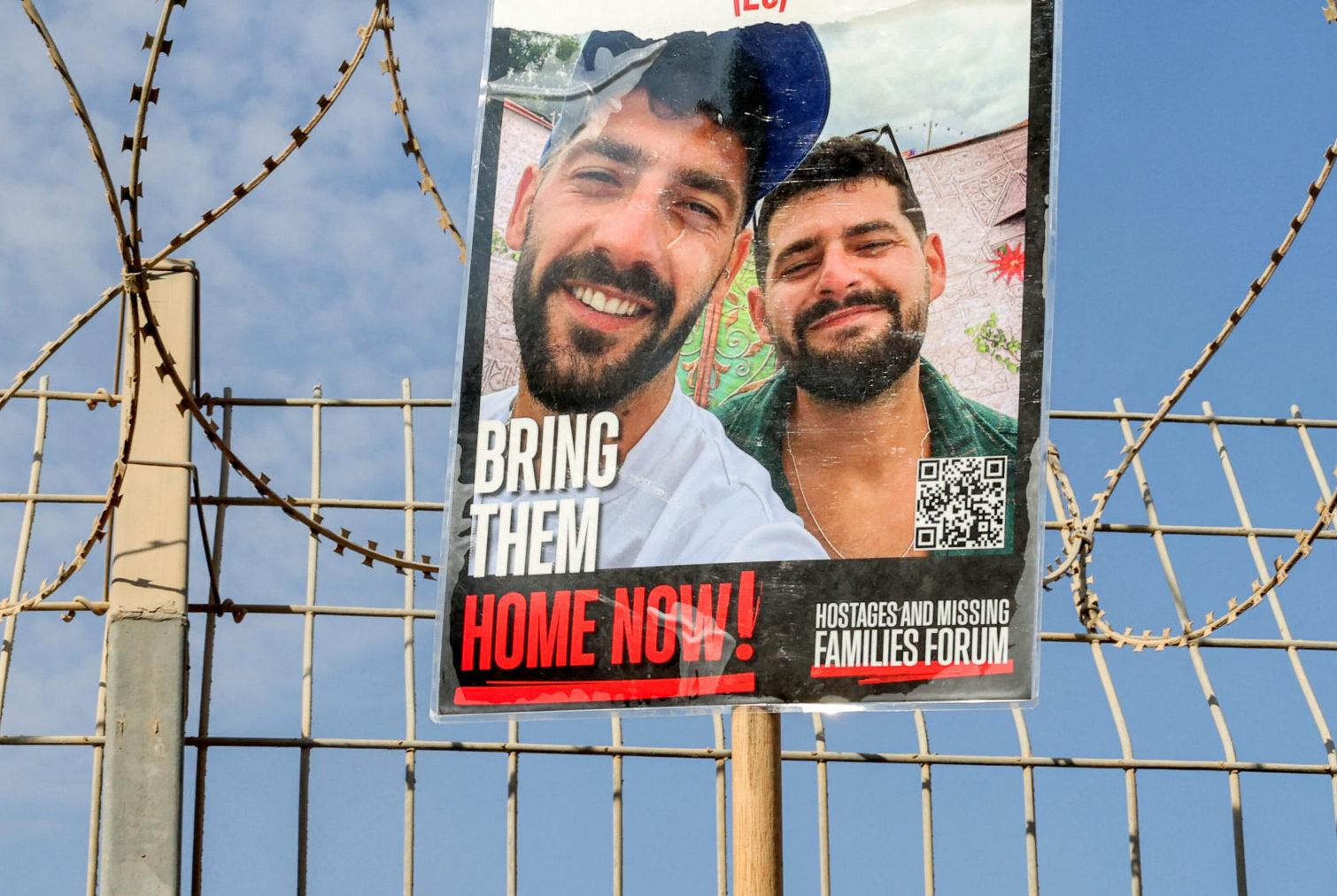
As the Israeli twins spend their second birthday in captivity in Gaza, their close-knit circle from Kibbutz Kfar Aza continues a grassroots campaign to keep their story alive — and push for their release
TALARICO TALK
Texas Democratic Senate recruit James Talarico takes critical view of Israel
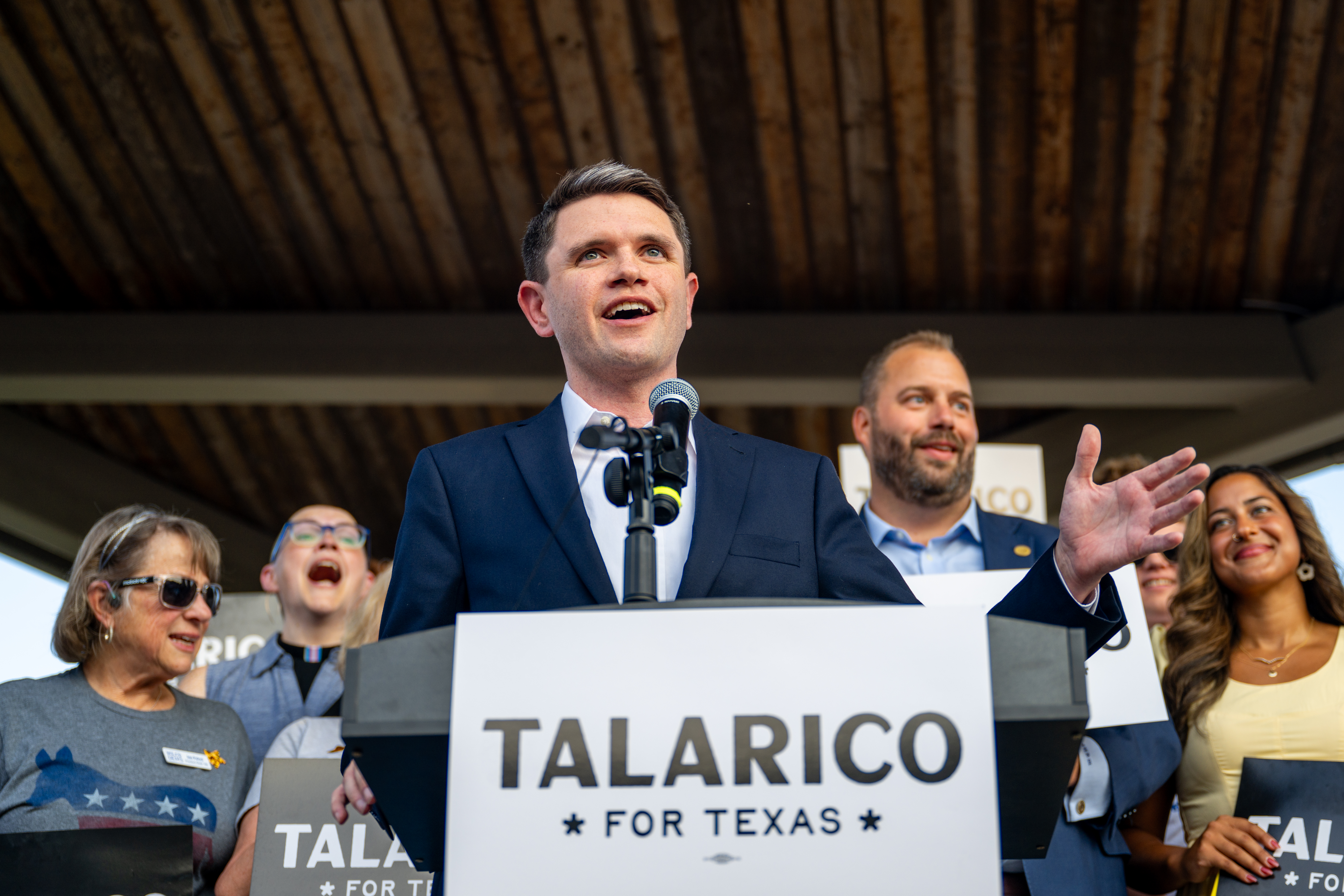
The newly minted candidate casts himself as a moderate, but called out his party for not criticizing Israel more in the 2024 election
President Donald Trump doubled down Tuesday evening on his criticism of the Israeli strike while Senate Republicans remain strongly supportive of the attack

Kevin Dietsch/Getty Images
U.S. President Donald Trump speaks to members of the media as he signs executive orders during a press availability in the Oval Office of the White House on September 05, 2025 in Washington, DC.
The Israeli strike targeting Hamas leaders in Qatar is dividing the White House, which strongly criticized Israel for attacking Qatari territory, and Senate Republicans, who have been overwhelmingly supportive of the Israeli action.
President Donald Trump told reporters on Tuesday evening he was “not thrilled about the way that went down” and “very unhappy with every aspect,” his first direct public comments on the Israeli strike, after White House Press Secretary Karoline Leavitt made comments to the same effect earlier in the day.
Sen. Lindsey Graham (R-SC), asked about the White House statement on the attack, told Jewish Insider, “I understand we have troops there, but my focus is Israel. Hamas has had every chance. … Lay down your weapons, release the hostages — you live. If you don’t — it keeps going.”
Sen. Markwayne Mullin (R-OK) told JI, “Israel has made this very clear, and the same as we’ve made it very clear, we’re going to go after terrorist organizations, no matter where you’re at. We have a good relationship with the Qataris. They didn’t target the Qataris. They were targeting Hamas, and they had the right to do that.”
Asked about the administration’s comments, he said, “I understand where they’re at. My opinion is the Qataris knew good and well that they were there and they were doing nothing about it.”
He said that he does not know the full context of the strike at this point, but that if Israel had asked Qatar to take action against the Hamas leaders sheltering inside the country and Qatar had refused, “then I don’t blame Israel for doing that. Now if they didn’t have a conversation beforehand, maybe it is a different story.”
When asked about the White House’s statement, which described the Israeli strike as “unfortunate,” Sen. Rick Scott (R-FL) responded, “I think it’s unfortunate that Qatar kept the Hamas leaders in their country, that was the unfortunate part.”
He said that he was surprised that the strike didn’t come sooner.
“Why did it take them so long? As soon as Oct. 7 happened, I met with the Qatari ambassador and I said, ‘Why are you hosting these people?’ He said, ‘Well, Obama asked.’ I said, ‘He gave you a bad job. Stop doing it,’” Scott continued. “I’m glad [Israel] did it. I’m impressed with what [Israeli Prime Minister Benjamin] Netanyahu’s done, the political leaders, the military leaders, the IDF, whether destroying Hamas, or Hezbollah or Iran — you have to really admire what they’re doing.”
Sen. Roger Marshall (R-KS), the most outspoken supporter of Qatar among Senate Republicans, stood alone in offering a full-throated criticism of the Israeli strike and fully backing Trump’s position.
“I fully agree with President [Trump]. At the request of the U.S. and Israel, Qatar is mediating a peace agreement. The Israeli attack on allied soil, where approximately 10,000 American troops are stationed, is highly ill-advised,” Marshall said on X. “Grateful that [Secretary of State Marco Rubio] is finalizing a Defense Coordination Agreement with Qatar to prevent Israel from repeating this action.”
The Israeli-Russian Princeton researcher was kidnapped in Baghdad in 2023 by Kataib Hezbollah, an Iranian-backed terrorist group

Eric Tucker/AP Photo
In this Sept., 2018 selfie image provided by Emma Tsurkov, right, she and Elizabeth Tsurkov are shown in Santa Clara Valley, Calif.
President Donald Trump announced Tuesday that Elizabeth Tsurkov, an Israeli-Russian researcher at Princeton University, was released by an Iranian-backed terrorist group in Iraq to the U.S. Embassy in Baghdad.
Tsurkov was kidnapped in Baghdad in 2023 while working on her doctoral thesis by Kataib Hezbollah, an Iranian-backed terrorist group separate from Lebanese Hezbollah.
“I am pleased to report that Elizabeth Tsurkov, a Princeton Student, whose sister is an American Citizen, was just released by Kata’ib Hezbollah (MILITANT Hezbollah), and is now safely in the American Embassy in Iraq after being tortured for many months,” Trump said on Truth Social. “I will always fight for JUSTICE, and never give up. HAMAS, RELEASE THE HOSTAGES, NOW!”
Tsurkov’s sister Emma, who has been a vocal advocate for her freedom, thanked the Trump administration in an X post, noting that her sister had been in captivity for more than 900 days.
“We are so thankful to President Trump and his Special Envoy, Adam Boehler. If Adam had not made my sister’s return his personal mission, I do not know where we would be,” Tsurkov said. “We also want to thank Josh Harris and his team at the US Embassy in Baghdad for the support they provided to our sister and the team at the nonprofit Global Reach who advocated relentlessly for my sister’s safe return.”
Princeton University President Christopher L. Eisgruber also celebrated her release.
“The release of Princeton graduate student Elizabeth Tsurkov brings relief and joy to the University community, and we celebrate that she will be reunited with her family. We thank President Trump for securing Elizabeth’s release,” Eisgruber said. “We are also grateful to those who worked tirelessly to bring an end to her terrible ordeal, including her family, friends and advocates.”
Multiple groups of U.S. lawmakers had appealed to administration officials to work to secure Tsurkov’s release. Kataib Hezbollah, the group that kidnapped Tsurkov, holds an official role in the Iraqi government.
Tsurkov’s captors released a video in 2023 in which Tsurkov claimed to be an Israeli and American spy, which Emma Tsurkov said was clearly made under duress.
Sen. Andy Kim (D-NJ), who helped lead efforts earlier this year to advocate for Tsurkov’s release, told Jewish Insider he spoke on Tuesday evening with Emma Tsurkov while she was on a videoconference with her sister, a conversation he said was “very emotional.”
The Tsurkov family, Kim said, has been through “so much” and “I can’t even imagine what it’s been like for Elizabeth.”
“My immediate thoughts [are] just making sure she’s getting the care she needs. I’ve done a lot in the past … when I was at the State Department on hostages and the kind of care they need coming out of it,” he said. “So it’s going to be a long road ahead.”
He said that he wishes Emma “all the best with the recovery” and offered the family any help he can provide to ensure she receives the care she needs. He said he hopes to see both sisters in the United States in the future.
He added that Emma Tsurkov’s “strength as a sister, just being there, just holding that hope for Elizabeth … it’s amazing, it’s inspiring.”
Kim said he had not yet been briefed by the administration on Tsurkov’s release, including the terms by which the administration was able to secure Tsurkov’s freedom.
Sen. Jacky Rosen (D-NV), who joined a push with Kim for Tsurkov’s freedom, said in a statement, “I’m relieved to hear the news that Elizabeth Tsurkov has finally been released after being held hostage by extremists in Iraq for over two years. I’ve been proud to advocate for her release and applaud all the efforts that made this possible. My thoughts are with Elizabeth and the Tsurkov family as they reunite, and I wish them peace and healing.”
Rep. Jamie Raskin (D-MD), who led an appeal from House members for Tsurkov’s release, told JI, “I am overjoyed for Elizabeth Tsurkov’s family and loved ones on this happy occasion. I have long pushed for Elizabeth’s safe return and I’m sending her my prayers and solidarity as she returns home to recover from a 903-day-long nightmare.”
Sen. Cory Booker (D-NJ) said on X, “I am deeply grateful that Elizabeth Tsurkov has been released and will finally be reunited with her family and loved ones. Thankful for all who partnered in advocating for her release and for all who tirelessly worked to ensure her safe return.”
Plus, Elizabeth Tsurkov released from captivity
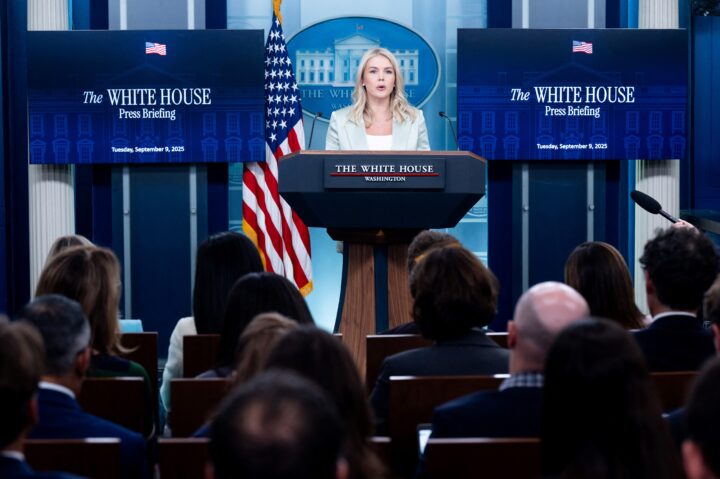
SAUL LOEB/AFP via Getty Images
White House Press Secretary Karoline Leavitt speaks during a press briefing in the Brady Briefing Room of the White House in Washington, DC, on September 9, 2025.
Good Tuesday afternoon.
This P.M. briefing is reserved for our premium subscribers like you — offering a forward-focused read on what we’re tracking now and what’s coming next.
I’m Danielle Cohen-Kanik, U.S. editor at Jewish Insider and curator, along with assists from my colleagues, of the Daily Overtime briefing. Please don’t hesitate to share your thoughts and feedback by replying to this email.
📡On Our Radar
Notable developments and interesting tidbits we’re tracking
President Donald Trump was unhappy with Israel’s surprise strike this morning on Hamas leaders in Doha, Qatar, White House Press Secretary Karoline Leavitt conveyed in a statement on behalf of the president today.
Leavitt said Trump was made aware of the strike by the U.S. military, without specifying whether Israel had alerted it or if the operation was detected independently, and “immediately directed” Middle East envoy Steve Witkoff to notify Doha about the impending attack.
(The Qatari Ministry of Foreign Affairs said reports that Qatar was informed in advance are “baseless” and the “call from a U.S. official came during the sound of explosions caused by the Israeli attack.”)
“Unilaterally bombing inside Qatar, a sovereign nation and close ally of the United States that is working very hard and bravely taking risks with us to broker peace, does not advance Israel or America’s goals,” Leavitt said. “The president views Qatar as a strong ally and friend of the United States and feels very badly about the location of this attack.”
The White House spokeswoman said Trump had spoken with Qatari leaders and assured them “that such a thing will not happen again on their soil” and conveyed his displeasure about the location of the strike to Israeli Prime Minister Benjamin Netanyahu…
The president’s reaction puts him at odds with many senior Senate Republicans, who told Jewish Insider’s Marc Rod that they view the attack as justified and unsurprising. Sen. Roger Wicker (R-MS), chair of the Senate Armed Services Committee, said, “I think Hamas has got to be destroyed, and there’s no sense in doing half measures.”
Sen. Lindsey Graham (R-SC) posted on X, “To those who planned and cheered on the October 7 attack against Israel, the United States’ greatest ally in the region: This is your fate.”
Senate Democrats, meanwhile, described the strike as “aggressive,” “provocative” and “unfortunate,” saying it jeopardized ceasefire negotiations and was an insult to Qatar, a longtime U.S. ally.
Sen. Jack Reed (D-RI), the ranking member of the Senate Armed Services Committee, called the move “extremely disruptive, provocative and dangerous” and a “great strategic mistake.” (Read comments from more lawmakers here).
The only Democrats to publicly break with the partisan line were Sen. Richard Blumenthal (D-CT), who told JI that “anything done to destroy Hamas’ leadership or its terrorist capability or military capacity is a step in the right direction,” and Sen. John Fetterman (D-PA)…
Also condemning the strike are several world leaders, including French President Emmanuel Macron who called it “unacceptable, whatever the reason,” and U.K. Prime Minister Keir Starmer, who said it “violate[s] Qatar’s sovereignty and risk[s] further escalation”…
Hamas released a statement claiming Israel failed to assassinate its top leadership in the strike but killed five of its members, including the son of the group’s chief negotiator…
In another hostage crisis, Elizabeth Tsurkov, a Russian-Israeli academic from Princeton University, has been released from captivity of the Kata’ib Hezbollah Iraqi militant group, Trump announced on Truth Social this afternoon.
Tsurkov was kidnapped while doing research in Baghdad in March 2023 and was “tortured for many months,” Trump said.
Tsurkov’s sister, Emma, said on X that their family is “so thankful to President Trump and his Special Envoy, Adam Boehler. If Adam had not made my sister’s return his personal mission, I do not know where we would be”…
Meanwhile, the IDF ordered the first full-scale evacuation of Gaza City in preparation for Israel’s impending takeover, after several days of issuing limited evacuations before targeted strikes and demolitions of buildings in the area. Leaflets dropped by the IDF in the city instructed residents to follow a coastal road to designated humanitarian zones in the south of the enclave…
In Jerusalem, Netanyahu appeared at a belated U.S. Embassy Fourth of July celebration at the Museum of Tolerance where he said in remarks that he convened the heads of Israel’s security organizations earlier today to authorize “a surgical precision strike” on Hamas leaders in Doha after the terror group took responsibility for the death of four IDF soldiers in Gaza and six civilians at a bus stop in Jerusalem yesterday.
“These are the same terrorist chiefs who planned, launched and celebrated the horrific massacres of Oct. 7 … They were meeting in exactly the same place where they celebrated this savagery almost two years ago. At the beginning of the war, I promised that Israel would reach those who perpetrated this horror. And today, Israel and I have kept that promise,” Netanyahu continued.
The event was later briefly interrupted by a missile fired by the Houthis, with rocket sirens causing guests to move temporarily into bomb shelters.
The celebration continued with a musical performance, including U.S. Ambassador to Israel Mike Huckabee on guitar and philanthropist and major Republican donor Paul Singer playing the keyboard, as captured by JI’s Lahav Harkov…
Hedge fund billionaire Bill Ackman is also in Jerusalem this week, meeting with Israeli President Isaac Herzog today and reportedly attending Jefferies TechTrek, Israel’s largest institutional investor technology conference.
Also attending Jefferies are Singer, DreamWorks CEO Jeffrey Katzenberg, venture capitalist Shaun Maguire, hedge fund manager Daniel Loeb and former U.S. Ambassador to Israel Tom Nides…
The MEAD Summit in Washington is lacking some punch this year with no Saudi representation, as opposed to years past, Israeli journalist Yaakov Katz said during an on-record panel with Sen. Jim Risch (R-ID) at the convening…
Down south, Texas state Rep. James Talarico, seen as an up-and-coming leader in Texas politics, jumped into the Democratic primary to run against Sen. John Cornyn (R-TX) today. Talarico will face a competitive race against former Rep. Colin Allred (D-TX), also a former NFL player. Cornyn faces his own high-stakes primary against Texas Attorney General Ken Paxton.
Talarico, 36, is pitching himself for Senate as a Washington outsider coming to shake up the system. When asked by HuffPost today if Israel’s war in Gaza constitutes a genocide, Talarico answered, “I worry that some of these debates happening within elite political circles tend to be a distraction from the immediate goal, which is stopping the human suffering in Gaza. And so getting into discussions about particular legal terms, or, you know, history from, you know, a century ago, to me, feel like more like playing politics than actually trying to get something done”…
⏩ Tomorrow’s Agenda, Today
An early look at tomorrow’s storylines and schedule to keep you a step ahead
Keep an eye on Jewish Insider tomorrow morning for an interview with friends of twins Gali and Ziv Berman who are turning 28 tomorrow, the second birthday they’ve marked in Hamas captivity.
“The Road Between Us: The Ultimate Rescue,” a documentary about retired Israeli general Noam Tibon’s historic rescue of his family from Kibbutz Nahal Oz on Oct. 7, is scheduled to premiere at the Toronto International Film Festival tomorrow, after the festival initially canceled the screening due to the film’s usage of Hamas footage from the attacks, saying the terror organization had not approved it for use.
The House Committee on Education and Workforce’s Subcommittee on Early Childhood, Elementary and Secondary Education will hold a hearing tomorrow morning titled “From Playground to Classroom: The Spread of Antisemitism in K-12 Schools.”
Also on the Hill, the American Jewish Committee will host an event marking the fifth anniversary of the Abraham Accords including remarks from Israeli Ambassador to the U.S. Yechiel Leiter and co-chairs of the House and Senate Abraham Accords caucuses: Sens. James Lankford (R-OK), Joni Ernst (R-IA) and Jacky Rosen (D-NV) and Reps. Sheila Cherfilus-McCormick (D-FL), Brad Schneider (D-IL), Debbie Wasserman Schultz (D-FL), Mike Lawler (R-NY) and Craig Goldman (R-TX).
Around Washington, Sen. Ed Markey (D-MA) will give remarks at the National Press Club at a Brandeis University event on “Reimagining Liberal Arts Education: A National Conversation on Real-World Readiness,” and Sen. Ted Cruz (R-TX) will speak at the Heritage Foundation on “the Muslim Brotherhood Threat, National Security, and America’s Global Leadership.”
In Pittsburgh, Talya Lubit will be sentenced on charges of conspiracy and defacing and damaging a religious building for vandalizing the Chabad of Squirrel Hill and the Jewish Federation of Pittsburgh in July 2024.
Abroad, Israeli President Isaac Herzog is heading to London on a trip his office said was organized to deliver speeches at Jewish organizations’ conferences and to “show solidarity with the Jewish community, which is under severe attack and facing a wave of antisemitism.” His office did not say if he would meet with Prime Minister Keir Starmer or other officials; though Starmer hosted Palestinian Authority President Mahmoud Abbas yesterday.
Stories You May Have Missed
BOOK SHELF
In new book, former Obama speechwriter calls on Jews to stand proud for their values

Sarah Hurwitz said she hopes her second book, As a Jew, resonates with progressive Jews who have distanced themselves from Zionism
ONLINE FOOTPRINT
Newly appointed GM head of global philanthropy has long record of anti-Israel hostility
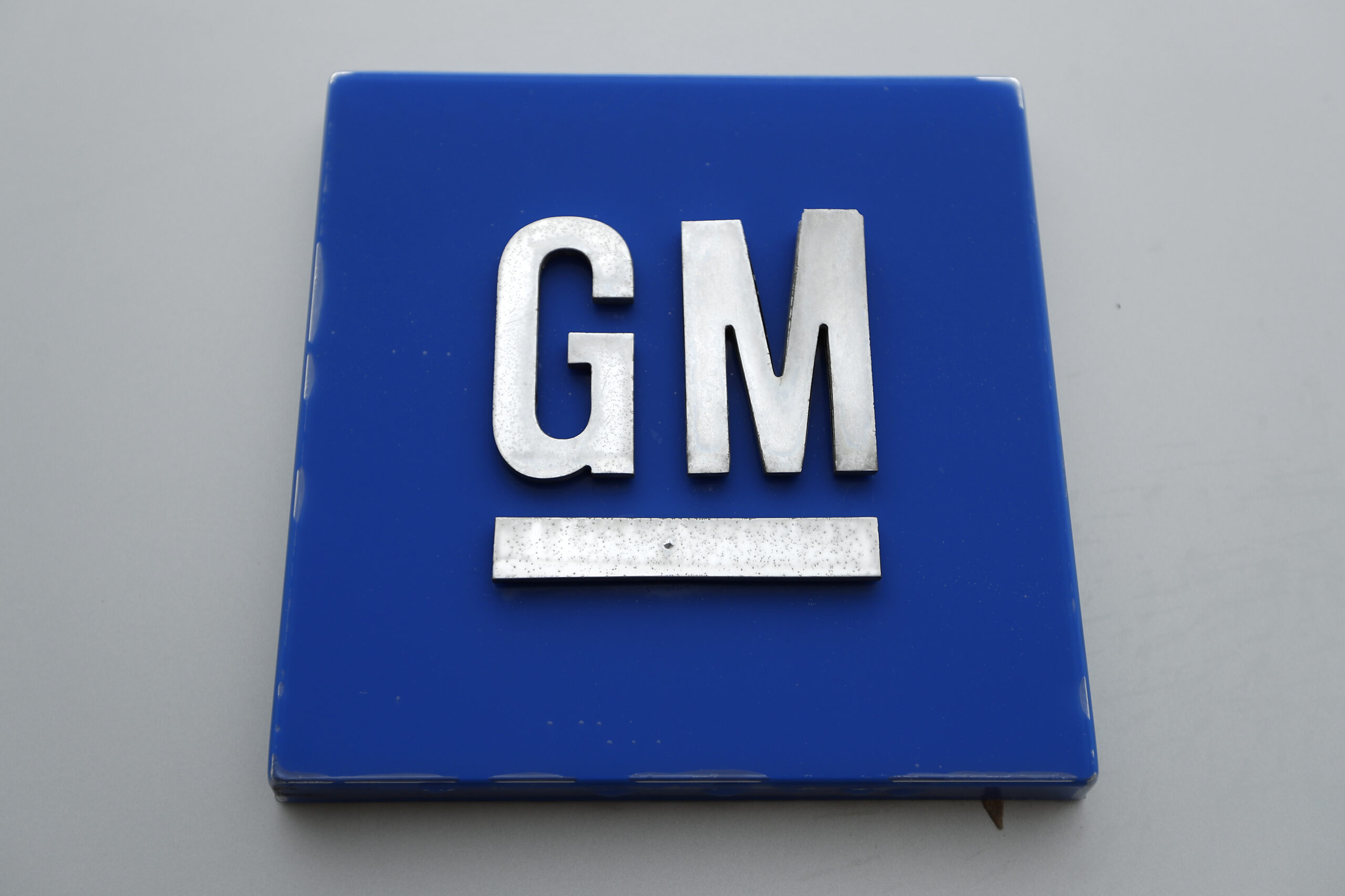
Sirene Abou-Chakra claimed that pro-Hamas protests during Netanyahu’s D.C. visit were part of a pro-Israel op
White House Press Secretary Karoline Leavitt: ‘Unilaterally bombing inside Qatar … does not advance Israel or America’s goals’

SAUL LOEB/AFP via Getty Images
White House Press Secretary Karoline Leavitt speaks during a press briefing in the Brady Briefing Room of the White House in Washington, DC, on September 9, 2025.
In a prepared statement on behalf of President Donald Trump, White House Press Secretary Karoline Leavitt on Tuesday criticized the Israeli strike on Hamas leaders in Qatar and expressed regret that it had taken place in Doha, adding that the U.S. had warned Qatar about the strike when the U.S. itself became aware.
She said Trump had also vowed to Qatari leaders that such an attack would not be repeated in Qatari territory.
“This morning, the Trump administration was notified by the United States military … as Israel was attacking Hamas, which very unfortunately was located in a section of Doha, the capital of Qatar,” Leavitt said. “Unilaterally bombing inside Qatar, a sovereign nation and close ally of the United States that is working very hard and bravely taking risks with us to broker peace, does not advance Israel or America’s goals.”
Pressed repeatedly on whether Israel had notified the U.S. about the attack, as some reports indicated, or whether the U.S. military had detected it independently, Leavitt did not specify, repeating only that the U.S. military had notified the White House.
She said that Trump “immediately directed” Middle East envoy Steve Witkoff to notify Qatar about the upcoming attack when the administration learned about it.
“The president views Qatar as a strong ally and friend of the United States and feels very badly about the location of this attack,” Leavitt continued.
She did add, however, that the administration views eliminating Hamas as “a worthy goal.”
Asked whether Trump would impose “consequences” on Israeli Prime Minister Benjamin Netanyahu for the strike or provide a “directive … to Netanyahu in terms of what’s allowed in the future,” Leavitt said that “that’s a decision only the president can make.”
Leavitt said that Trump had spoken to Qatari Emir Tamim bin Hamad Al Thani, Prime Minister Mohammed bin Abdulrahman Al Thani and Netanyahu after the attack.
She said the president “assured [the Qatari leaders] that such a thing will not happen again on their soil” and thanked Qatar for “their support and friendship to our country.”
She said that both Trump and Netanyahu agreed that they want to make peace quickly and said Trump “believes this unfortunate incident could serve as an opportunity for peace,” and that Trump had conveyed his displeasure about the location of the strike to Netanyahu.
“He expects all of our friends and allies in the region — that includes both Qatar and Israel — to seek peace as well, and he wants to see that happen, and he’s working with all of our allies in the region to get that done,” Leavitt said.
Leavitt denied that Trump’s post on social media over the weekend offering a “last warning” to Hamas to accept a ceasefire deal was a reference to the impending Israeli attack.
The White House’s expressed concern about the location of the attack puts the administration at odds with many senior members of Trump’s own party in the Senate, who were quick to express support for the Israeli attack, and aligns more closely with top Senate Democrats who have been more critical of the attack and where it took place.
Asked about the White House’s opposition to the strike, multiple Senate Republicans who had earlier in the day expressed support for the Israeli attack declined to comment.
Meanwhile, Sen. Chris Coons (D-DE) said, “I will actually agree with President Trump that it doesn’t advance our interests in terms of advancing negotiations for the release of hostages or the ceasefire that is urgently needed in Gaza.”
“I have not gotten any briefing on the details of how it was approved, whether or not the Trump administration was aware and supported it, but in the middle of a hostage negotiation that is urgently needed to free the hostages, to end the fighting, to deliver humanitarian relief and to address Hamas — to take a strike in Doha against Hamas leaders, I think puts at risk any peace process,” Coons said. He added that he wants to be briefed on further details.
The parade was an example of how Beijing has used WWII not only to encourage nationalism, but to project power internationally, from Jerusalem to Taipei and beyond
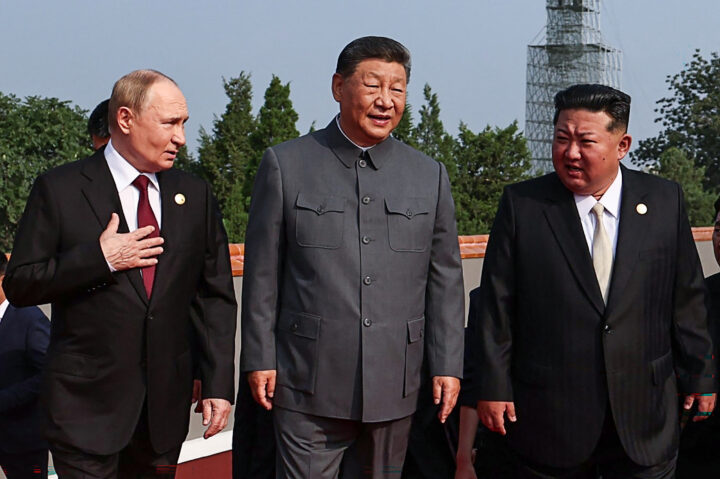
Alexander KAZAKOV / POOL / AFP) (Photo by ALEXANDER KAZAKOV/POOL/AFP via Getty Images
Russia's President Vladimir Putin walks with China's President Xi Jinping and North Korea's leader Kim Jong Un before a military parade marking the 80th anniversary of victory over Japan and the end of World War II, in Beijing's Tiananmen Square on September 3, 2025.
China showcased its growing aggressiveness on the world stage in a major military parade on Wednesday, showing off missiles and fighter jets to mark the 80th anniversary of Japan’s surrender in World War II with Russian President Vladimir Putin and North Korea’s Kim Jong Un in attendance.
The parade was an example of how Beijing has used WWII not only to encourage nationalism, but to project power internationally, from Jerusalem to Taipei and beyond.
President Donald Trump pushed back against the spectacle in Beijing, writing on Truth Social that Chinese leader Xi Jinping ought to “mention the massive amount of support and ‘blood’ that the United States of America gave to China in order to help it secure its FREEDOM from a very unfriendly foreign invader. Many Americans died in China’s quest for Victory and Glory. I hope that they are rightfully Honored and Remembered for their Bravery and Sacrifice! …Please give my warmest regards to Vladimir Putin, and Kim Jong Un as you conspire against The United States of America.”
The parade came shortly after China hosted a summit with Putin, Indian Prime Minister Narendra Modi and other Eurasian leaders, deepening ties among major powers not aligned with the West. The attendees issued a communique last week strongly condemning “the military aggression launched by Israel and the United States against Iran” in June.
China has also used World War II and Holocaust terminology in recent weeks as it continues its hostility against Israel, calling Israel’s war a “genocide,” even as the Chinese Embassy in Israel held an event highlighting Beijing’s positioning with the Allies in World War II.
The recent statements reflect a broader double game China has played in its relations toward Israel, consistently showing hostility to Israel on the international stage since the Oct. 7, 2023 Hamas-led attacks, while within Israel, the Chinese ambassador has pursued a friendlier posture.
Last month, Beijing, in a statement from the Chinese Communist Party’s Information Office, accused the U.S. of “serving as an accomplice to the genocide in Gaza.” The statement, Tuvia Gering, a fellow at the Atlantic Council and the Institute for National Security Studies at Tel Aviv University, said, marked the first time an official Chinese document accused Israel of genocide.
Gering told Jewish Insider that “you see the word [genocide] being used more and more by Chinese academics, and they are the ones who help formulate China’s Middle East policy … In recent months, I have been seeing it used much more frequently, as well as other accusations against Israel and Jewish people.”
“From the beginning of the war, there have been comparisons between the Jewish state and Japanese imperialists,” Gering said. “From the Chinese perspective, [Japan] did some of the most terrible things, like what the Nazis did to us. That vile, inhumane violence is ingrained in every child in China’s psyche from a young age.”
The Chinese consul-general in Osaka, Japan, has published posts on X over the course of the Gaza war comparing Israel to Nazis and “a demon … that will even devour a baby,” and saying “we must get rid of it once and for all.” Beijing has not apologized for the diplomat’s statements.
That being said, Gering posited that the use of the word “genocide” was unlikely to reflect a policy shift by Beijing “because of the sensitivity to how the word is being used against China” in relation to its Uyghur minority.
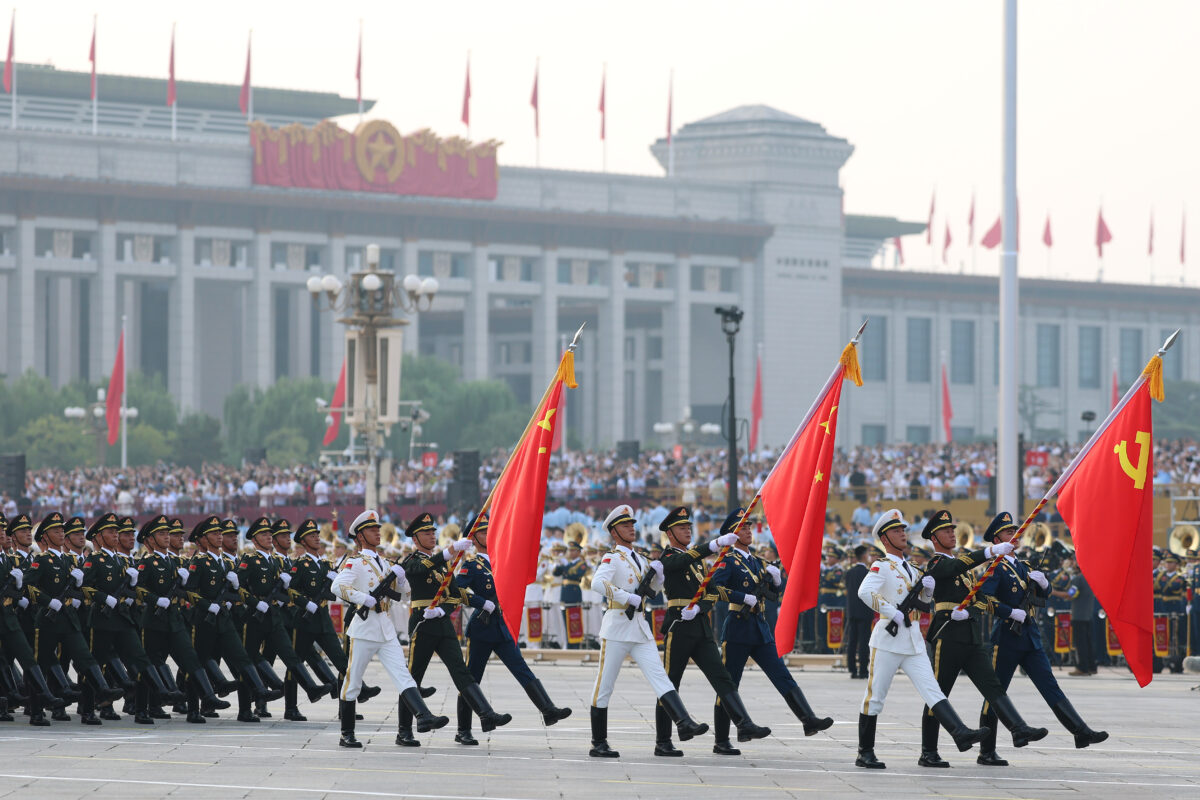
The genocide accusation came in response to the State Department’s report on human rights practices in China in 2024, which opened by stating that “Genocide and crimes against humanity occurred … in China against predominantly Muslim Uyghurs.”
As such, Gering said the use of “genocide” in an official document is primarily meant to target the U.S.
Similarly, Carice Witte, founder of SIGNAL Group, a think tank focused on China-Israel relations, told JI that the statement is an example of Beijing “using Israel as a tool.”
To China, she said, “the Middle East and Israel are much more about great power competition than the local issues.”
“Israel is a very small country that is no longer of great interest to China, and its positions on Israel are not about Israel as much as they are about China’s global interests,” Witte said. “By saying the U.S. supports genocide in Gaza, that is not about Israel, but about the U.S. and the global south. Because so many countries hate Israel, [China] believes that if they criticize Israel, more countries will support them.”
A source involved in China-Israel relations who spoke on condition of anonymity told JI they heard a Chinese diplomat say that “they use the Palestinians to make trouble for the U.S. the way the U.S. uses Taiwan to make trouble for them.”
Ten days after Beijing accused Israel of genocide, the Chinese Embassy in Israel held a ceremony marking 80 years since the end of World War II in the Pacific arena, and honoring “Jakob Rosenfeld, a Jewish doctor whose heroic contribution to the Chinese people’s fight against fascism is a lasting symbol of international solidarity,” the invitation read.
Gering also noted that China has made diplomatic use of the fact that over 20,000 Jews escaped the Holocaust to Shanghai, including, famously, the entire Mir Yeshiva from Lithuania. They fled to an enclave in Japanese-occupied Shanghai that did not require a visa for entry, until 1941, when Japan forced the Jewish refugees into a ghetto and banned Jewish immigration to the city. The only Chinese diplomat known to have played a role in helping Jewish refugees was a representative of the Republic of China, which the Chinese Communist Party that currently rules China later defeated in a civil war.
Like many other countries, including China’s ally Russia, which also holds WWII victory parades, Beijing “employs selective historical memory,” Gering said. “There is a very obvious, explicit utilization of memory … Undermining or silencing the voices of victims of the Holocaust and refugees in Shanghai … When you listen to Chinese ambassadors, you think that there was a unique civilizational benevolence by the Chinese people, who opened their arms when the rest of the world rejected Jews … It’s a complete distortion of the story of the Jewish refugees who lived in squalid conditions.”
Israel generally does not push back against that narrative for “political expedience,” Gering said, explaining that “it is good for soft power to say we share their sentiment of anti-fascism.”
Witte said that China’s politicization of World War II and the Holocaust reflects a broader “two-pronged path. On the one hand, China has a big-picture policy and the Beijing stage is for the track that is harsh on Israel. Local policy, where the embassy is the stage, is the pro-Israel track.”
“Obviously, Beijing is exponentially louder, more recognized and more heard than the embassy,” she added.
Gering pointed out that Chinese Ambassador to Israel Xiao Junzheng, who arrived at his post in December, “emphasizes friendship between Jews and Chinese people, while Chinese propaganda says Israel is committing genocide and compares Jews to Nazis.”
Xiao “has been given a mandate to act like nothing [bad] happened,” Gering added. “He even wrote an article saying not to let the war define the relationship. Even though … [the CCP] legal advisor said the Hamas attack [on Oct. 7, 2023] was A-OK, don’t split hairs, let’s talk about Chinese cars and how many Jews we saved. They’re kind of forgetting about Jews living today.”
**
Gering also expressed concerns about Beijing’s recent use of Nazi terminology to describe the government in Taiwan.
The CCP newspaper, People’s Daily, published an article that compared Taiwan’s President William Lai and the ruling Democratic Progressive Party to the Nazis. The article also described civil society groups seeking to educate Taiwanese citizens to be prepared for possible missile attacks from China and to recognize Chinese propaganda in the media as “Nazi-like.”
The article “even feigns concern for their democracy, which is ironic in a CCP mouthpiece,” Gering said.
Gering expressed concern that the language is similar to that used by Russia in the years before its invasion of Ukraine.
“The denazification card is what Putin’s Kremlin used as a pretext for its invasion and its ongoing war in Ukraine,” Gering noted. “This prompts us to ask if this is a precursor to a People’s Liberation Army [Chinese military] denazification campaign in Taiwan.”
Still, Gering said, Taiwanese politics are very divisive, and opposition politicians have also called the current government Nazis, leading to condemnation by Israeli and German diplomats in Taipei. “That gave a hechsher [kosher certification] for the CCP to use this kind of pernicious rhetoric, as well,” he said.
“In the more immediate term, it’s probably just a tactical way for the CCP to sow division and weaken the Taiwanese leadership and democratic institutions,” he added.
Plus, Qatari editor calls for more hostage-taking

ABIR SULTAN/POOL/AFP via Getty Images
Israel's Prime Minister Benjamin Netanyahu gives a press conference at the Prime minister's office in Jerusalem on August 10, 2025.
Good Wednesday morning.
In today’s Daily Kickoff, we report on yesterday’s votes on Israel-related resolutions at the Democratic National Committee’s summer meeting and subsequent decision to create a task force on the issue, and cover Rep. Adam Smith’s support for leveraging arms sales to Israel. We report on a call from a prominent Qatari journalist tied to the country’s royal family to kidnap IDF soldiers, and report on a push from Jewish groups, led by the Jewish Federations of North America, for the Trump administration to move forward with its nominations for antisemitism envoy and religious freedom ambassador. Also in today’s Daily Kickoff: Avraham Tahari, Jonathan Karp and Shmuel and Anat Harlap.
What We’re Watching
- President Donald Trump will lead a meeting at the White House today focused on winding down the war in Gaza and increasing humanitarian aid to the country. Steve Witkoff, the Trump administration’s Middle East envoy, told Fox News that the administration believes “that we’re going to settle this one way or another, certainly before the end of this year.”
- Israeli Foreign Minister Gideon Sa’ar, who is in the U.S. this week, will meet with Secretary of State Marco Rubio this afternoon in Washington.
- This evening, the Florida Democratic Party Jewish Caucus is hosting a briefing with Rep. Debbie Wasserman Schultz (D-FL).
What You Should Know
A QUICK WORD WITH JI’S JOSH KRAUSHAAR
In the run-up to the U.S. presidential election last year, one common refrain heard in Israeli leadership was to wait out the election in the hope of a friendlier Trump administration taking over.
Increasingly, many pro-Israel voices in the United States are quietly saying the same thing about upcoming Israeli elections, which polls suggest could usher in a more moderate coalition, and diminish the influence of far-right leaders in the current Israeli government.
The possibility of new elections taking place soon, more than any particular shift in military strategy or policy decisions, is looking like the most likely factor that could advance progress in the region.
While Israeli elections are not guaranteed to take place until October 2026, the legislative crisis over Haredi conscription in the IDF is looking like it could collapse Israeli Prime Minister Benjamin Netanyahu’s coalition, and move up the election timetable to as early as next January.
What has prevented elections until now is the fact that all members of the governing coalition are projected to lose seats if elections are held. That most Israelis want new elections is the very reason why they haven’t happened – yet.
Indeed, if elections were held today, Netanyahu would be in serious trouble. A recent poll commissioned by Israel’s Channel 12 found the anti-Netanyahu bloc making up a narrow majority of 61 of the Knesset’s 120 seats, with the current Likud-led coalition sitting at 49 seats, and Arab parties making up the remaining 10 seats.
minneapolis moment
Under pressure from left-wing activists, DNC Chair Ken Martin withdraws Israel resolution
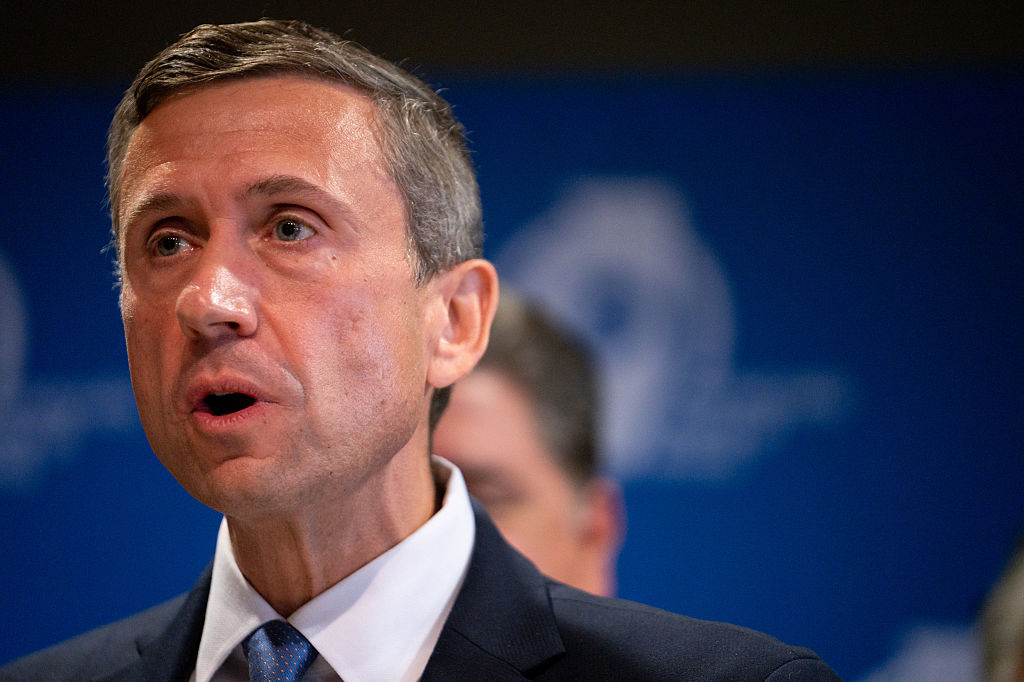
Shortly after members of the Democratic National Committee passed a resolution on Tuesday voicing support for humanitarian aid to Gaza and calling for the release of hostages held by Hamas, Ken Martin, the party chair, announced that he would withdraw the measure, which he had introduced, and instead form a task force to continue discussing the matter, Jewish Insider’s Matthew Kassel reports.
Dem divide: The surprise reversal came even as the DNC, now holding its annual summer meeting in Minneapolis, had voted to reject a dueling and more controversial resolution that had backed an arms embargo as well as a suspension of U.S. military aid to Israel, raising alarms among Jewish and pro-Israel Democrats who rallied behind Martin’s effort, co-sponsored by DNC leadership. “There is a divide in our party on this issue. This is a moment that calls for shared dialogue and calls for shared advocacy,” Martin said after the competing measure had been voted down. He said that he would “appoint a committee or a task force comprised of stakeholders on all sides of this to continue to have the conversation, to work through this, and bring solutions back to our party.”
‘Inside baseball’: Pro-Israel Democrats expressed cautious optimism about the unexpected decision. Despite Martin’s 11th-hour reversal, Halie Soifer, the CEO of the Jewish Democratic Council of America, told JI’s Matthew Kassel she was satisfied with the outcome, noting the DNC also passed a resolution condemning antisemitism that, coupled with its rejection of the arms embargo proposal, “reflects where the party stands” on major issues concerning Israel and the Jewish community. Brian Romick, Democratic Majority For Israel’s president and CEO, said that he viewed the outcome as “a win” for the pro-Israel community, in light of the potential for a more hostile debate. “The bad resolution was rejected and Ken’s compromise resolution also passed the committee,” Romick said. “That all happened publicly” and “reaffirmed where the party stands on Israel,” he said. “Anything else beyond that is just inside baseball.”
the center shifts
Leading moderate House Democrat calls for ‘leveraging’ arms sales to Israel
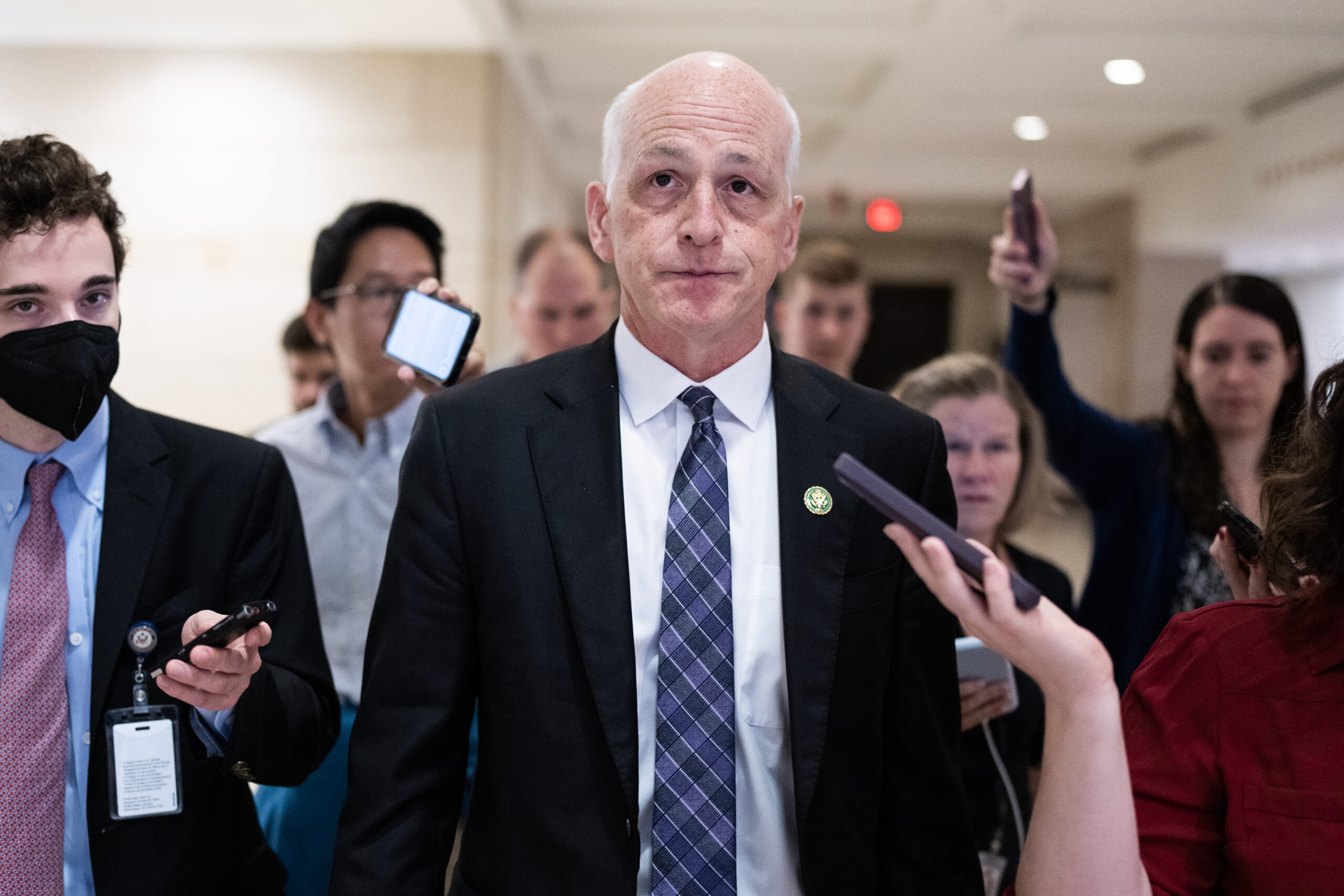
Rep. Adam Smith (D-WA), ranking member of the House Armed Services Committee, said in a statement on Tuesday that he “believe[s] it is time for the United States government to stop the sale of some offensive weapons systems to Israel as leverage to pressure Israel” into implementing a ceasefire, increasing humanitarian aid in Gaza and stopping the expansion of West Bank settlements, Jewish Insider’s Danielle Cohen-Kanik reports. The Washington state Democrat, who has served his Seattle-area district since 1997, said he changed his position on blocking weapons sales to Israel because the “situation in the Middle East has changed dramatically in recent months.”
Nuanced stance: Smith, a member of the moderate New Democrat Coalition who has played a leading role in Democratic foreign policy, was careful to emphasize that he supports Israel and “recognize[s] both the threats they face and the reality that the actions of Hamas and their supporters have driven this conflict.” He also affirmed that “Yes, the hostages must be returned. It is outrageous that Hamas took the hostages and has continued to hold them.” However, Smith said, “six months of war since the end of the last ceasefire has done nothing to bring the hostages home” and it is “impossible to see how further military action in Gaza could degrade Hamas … further than what has already occurred.”
media mania
Qatari government-aligned newspaper editor called on Hamas to kidnap IDF soldiers

The editor-in-chief of Qatar’s pro-government newspaper Al Sharq called on Hamas “heroes” to kidnap more IDF soldiers in a since-deleted tweet, Jewish Insider’s Haley Cohen reports. “If success is not achieved this time in capturing Zionist soldiers at the hands of the heroes of #AlQassamBrigades, then the second, third, and fourth attempts will succeed, God willing, by adding new rats to the tally held by the heroes of the Brigades,” Qatari journalist Jabar Al-Harmi wrote in Arabic last week.
Propaganda push: Al Sharq, which is published in Doha by a privately held media company founded and owned by Sheikh Khalid bin Thani Al Thani, a member of the Qatari ruling family, is one of the four leading private daily Arabic newspapers in Qatar, all of which have a pro-government bent. Ghaith Al-Omari, a senior fellow in The Washington Institute for Near East Policy’s Irwin Levy Family Program in the U.S.-Israel Strategic Relationship, told JI that the tweet is “not surprising” and comes amid widespread praise for Hamas in Qatari media. “The Qatari media landscape is rife with statements, selective reporting and editorials that support Hamas,” said Al-Omari, former executive director of the American Task Force on Palestine. “Under the guise of supporting the Palestinian people, many Qatari media outlets have been a key vehicle for amplifying Hamas propaganda.”
beirut or bust
Graham advocates for mutual defense agreement with Lebanon during bipartisan visit

Sen. Lindsey Graham (R-SC) championed a U.S. defense agreement with Lebanon during a bipartisan congressional delegation to Beirut on Tuesday, saying it would be the “biggest change in the history of Lebanon,” Jewish Insider’s Danielle Cohen-Kanik reports. Speaking at a press conference alongside Sen. Jeanne Shaheen (D-NH) and Rep. Joe Wilson (R-SC), Graham asked, “How many nations have a defense agreement with the United States? Very few. … The number of nations that America is willing to go to war for is very few. Why do I mention Lebanon being in that group? You have one thing going for you that is very valuable to me: religious diversity.”
Making the case: “Christianity is under siege in the Mideast. Christians are being slaughtered and run out of all over, all over the region, except here. And so what I am going to tell my colleagues is, ‘Why don’t we invest in defending religious diversity in the Mideast? Why don’t we have a relationship with Lebanon where we would actually defend what you’re doing?’” Graham continued. “I think it’s in America’s interest to defend religious diversity, whether you’re Druze or Alawite or a Christian or whatever. The idea that America may one day have a defense agreement with Lebanon changes Lebanon unlike any single thing I could think of,” Graham said.
granite state race
Top N.H. congressional candidate balances support of U.S.-Israel relationship with criticism of Gaza aid strategy
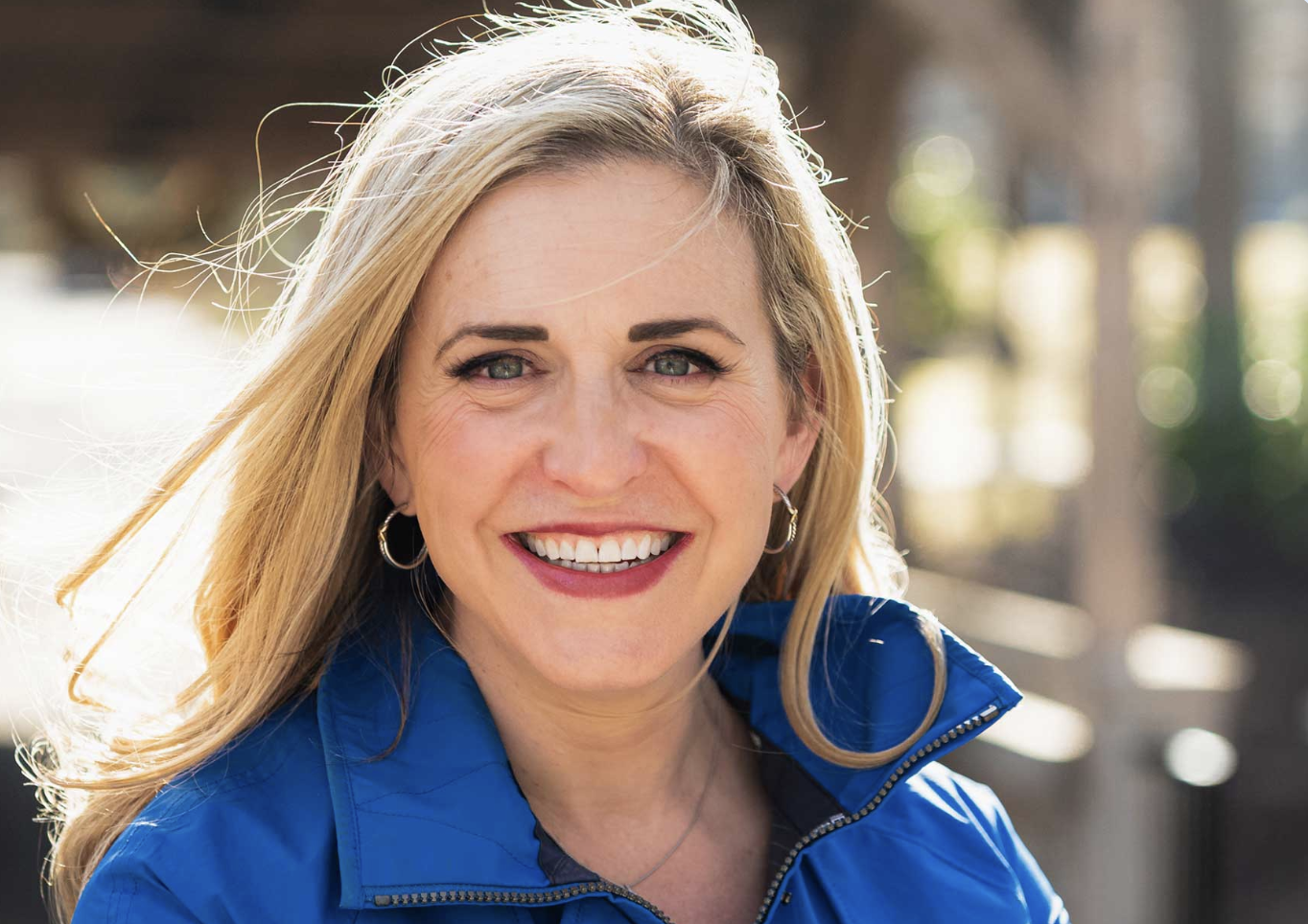
Maura Sullivan, a Marine veteran who served in Iraq and later worked as a senior Defense Department official, is aiming to leverage that experience to win the New Hampshire congressional seat currently held by Rep. Chris Pappas (D-NH), who is running for the Senate. She’s also leaning on “that firsthand perspective, experience and knowledge” as she stakes out her positions on the conflict in the Middle East, she told Jewish Insider’s Marc Rod in a recent interview.
Military mindset: As a Pentagon official, Sullivan, who noted that she’d be seeking a spot on the House Armed Services Committee if elected, said she spent time in the Middle East on “allied reassurance tours,” visiting allies and meeting with top officials to learn about Israel’s challenges and capabilities and “talking about the incredibly important relationship between the United States and Israel and strongly reaffirming the United States commitment” to Israel. “I’ve been very clear since the devastating, absolutely deplorable Oct. 7 attacks that Hamas perpetrated that Israel has the right to defend itself,” Sullivan continued. “I also want to be clear that the conditions in Gaza are inhumane, they’re deplorable and they must be improved immediately. … Hamas can be destroyed and significant aid can be let in at the same time. It’s a false choice to think that those two objectives cannot occur simultaneously.”
scoop
Jewish groups to urge Senate to confirm antisemitism envoy, religious freedom ambassador
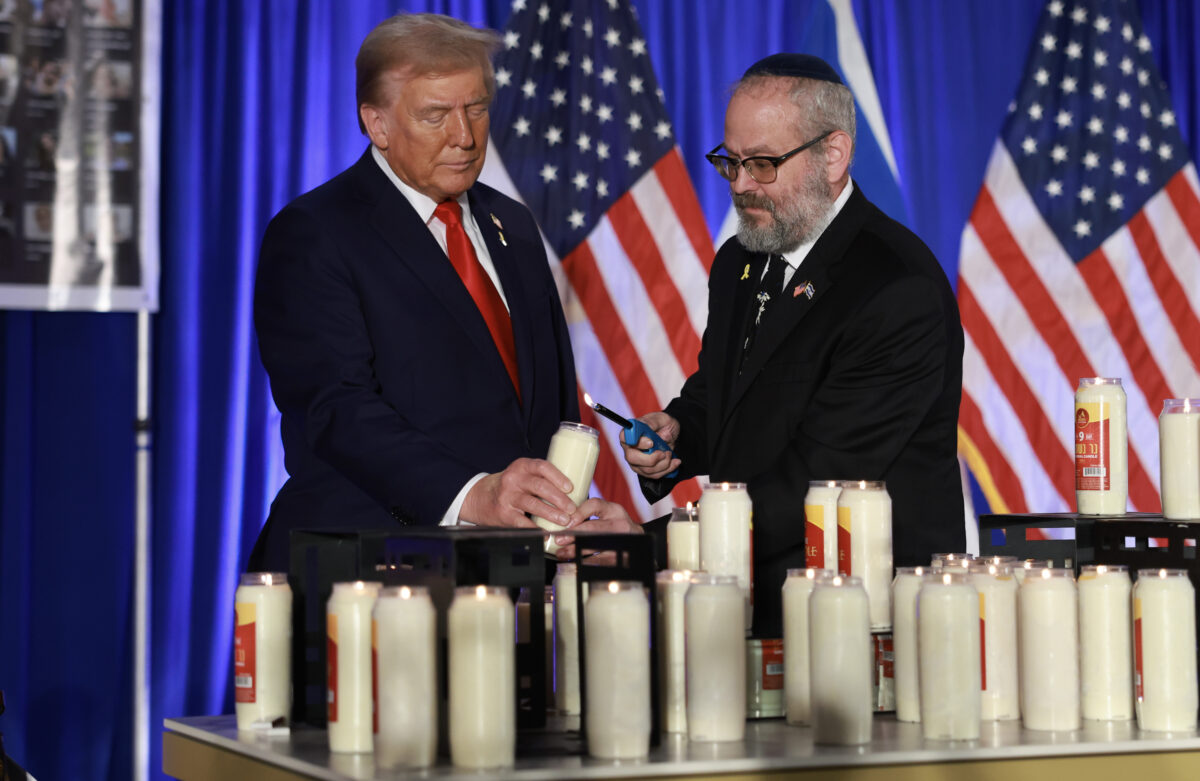
Several major Jewish organizations are calling on the Senate to “swiftly” confirm President Donald Trump’s nominees for special envoy to monitor and combat antisemitism and international religious freedom ambassador, Jewish Insider’s Gabby Deutch reports. In April, Trump tapped Rabbi Yehuda Kaploun, an Orthodox businessman and Chabad rabbi who served as a campaign surrogate, to serve as the next U.S. special envoy to monitor and combat antisemitism, and has named former Rep. Mark Walker (R-NC) as the U.S. ambassador-at-large for international religious freedom. Both positions require Senate confirmation, and neither has had a confirmation hearing yet.
‘Utmost importance’: The groups, led by the Jewish Federations of North America, wrote in a letter to Senate Majority Leader John Thune (R-SD) and Senate Minority Leader Chuck Schumer (D-NY) that filling the roles is “of utmost importance in fighting growing antisemitism and ensuring freedom of religion or belief worldwide,” according to a draft obtained by JI. “We dare not delay in filling these critical positions that protect human rights around the world,” the letter states. “To that end we strongly urge you to prioritize filling these positions, sending a powerful signal to governments around the world that the United States upholds our constitutionally guaranteed rights to life and liberty, to freedom of religion and belief, and calls on them to do the same.”
Worthy Reads
The Heck With Hasbara: The Wall Street Journal’s Elliot Kaufman interviews Israeli Foreign Minister Gideon Sa’ar about the diplomatic and public relations hits the country has taken as it nears two full years of war against Hamas in Gaza. “Hamas took over and Israel is still paying the price, in diplomacy and in lives. The logic leads me to the conclusion that whether the Gaza war ends now or in some months seems less important for Israel — and even for its foreign relations — than whether Hamas is left with the ability to draw it into another war a few years on. In general, Mr. Sa’ar says, ‘We need to survive first. After that, there comes popularity and how much we are able to convince others around the world.’ Later, he catches himself, and adds, ‘I’m not saying diplomacy shouldn’t be taken into consideration. I’m the last to say that — I’m foreign minister.’” [WSJ]
Southern Comfort: The Atlantic’s Rose Horowitch spotlights the growing popularity of southern universities among prospective Jewish students, as many of the Ivies and small liberal arts colleges in the Northeast face widespread anti-Israel and at times antisemitic activism. “The line between criticism of Israel and anti-Semitism is nearly always contested; the anti-Israel protest movement on some campuses counts many Jewish students among its ranks. Meanwhile, southern colleges are becoming more popular with northeastern students of all backgrounds. No doubt some Jewish students have opted out of the Ivy League simply because they think the South is the place to be. Even so, an atmosphere of fear has clearly taken hold among many Jewish families. Jewish leaders at Columbia, Harvard, and Yale told me that just about every parent of a prospective student asks if their child will be safe on campus. (Here I will resist the temptation to make any quips about Jewish moms.)” [TheAtlantic]
Crimson Coexistence: In The New York Times, Jacob Miller and Tommy Barone, who served as chairs of the Harvard Crimson’s editorial board during the last academic year, reflect on how they worked to maintain civil discourse in the publication’s pages. “The two of us faced a measure of internal criticism, but we consistently underscored the importance of principled, rational disagreement. Meeting by meeting, the board rallied behind this approach. Disagreeing civilly about big stories — the Israeli-Palestinian conflict, but also D.E.I., free speech and admissions policies — became routine, and we published thoughtful editorials that helped earn back disillusioned readers’ respect. Refined by dissent, our editorials, regardless of their ideological tilt, offered stronger reasoning and more engagement with counterarguments. They passed the test our previous editorials on controversial issues had too often failed.” [NYTimes]
Split With Hamas: In Haaretz, Haisam Hassanein considers the outcomes of the Arab League’s call for Hamas to be disarmed and removed from Gaza. “On paper, this new declaration is historic. But it seems most Israelis don’t even know it exists. If Arab leaders are serious, they can’t stop at communiqués read in Cairo or Riyadh. They have to step into Israel’s conversation. That means Hebrew language interviews, Israeli TV, op-eds in this paper and others. Spell it out directly: Arab states are ready to put money into rebuilding Gaza. They are ready to back one Palestinian leadership. They themselves are also ready to move toward normalization. But all of it hinges on Israel doing its part – stopping the drift into endless conflict and opening a real path toward a two-state solution. That’s the message. And Israelis deserve to hear it unfiltered. Right now, they don’t.” [Haaretz]
Word on the Street
Dan Scavino, the longest-serving aide to President Donald Trump, was tapped to head the White House Presidential Personnel Office, replacing Sergio Gor, who was nominated to be U.S. ambassador to India…
U.S. Ambassador to Turkey Tom Barrack received pushback from Lebanese journalists and commentators after warning journalists at a press conference in Beirut to “act civilized” and not be “animalistic”…
Microsoft is weighing disciplinary measures against employees who, protesting the company’s tech sales to Israel, participated in a sit-in in the office of President Brad Smith at the company’s Washington state headquarters that temporarily locked down the building…
Business executives and Jewish leaders in Chicago are preparing to open a college preparatory Jewish high school in the city’s Lakeshore East neighborhood after purchasing the unfinished building, where construction on another school stalled six years ago…
Police in St. Louis County, Mo., charged an area man with defacing a sign outside the city’s Jewish Student Union, which provides programming and community events to Jewish high schoolers in the city…
The Wall Street Journal spotlights the high-profile, high-stakes divorce proceedings of David Geffen, who did not sign a prenuptial agreement with his now-estranged husband, amid allegations of drug use and unequal power dynamics…
Elie Tahari co-founder Avraham Tahari listed his Alpine, N.J., home for $24.75 million, 15 years after buying the property for $4.25 million…
The Woodstock, N.Y., property that was featured on the cover of Bob Dylan’s “Bringing It All Back Home” sold for $4.6 million…
Simon & Schuster CEO Jonathan Karp is stepping down after five years in the role; Karp will remain at the publisher, overseeing its newly created Simon Six imprint…
In The Wall Street Journal, Tevi Troy reflects on the slow pace encouraged by vacation life…
Norges Bank Investment Management, Norway’s sovereign wealth fund, is ending its investments in Caterpillar as well as five Israeli banks, after its ethics council reviewed the companies’ ties to Israeli construction and Palestinian home demolitions in the West Bank…
Israel said that a strike on the Nasser Hospital in Khan Younis earlier this week that killed 20 people had targeted a camera the army alleged had been positioned by Hamas to observe IDF troop movements…
Israeli Prime Minister Benjamin Netanyahu praised the decision by Australia to expel Iran’s ambassador in Canberra, calling it a positive “first step,” days after he had criticized Australian Prime Minister Anthony Albanese for being “weak” and failing to adequately address antisemitism in the country…
French President Emmanuel Macron doubled down in his support for Palestinian statehood, writing in a letter to Netanyahu, which was published in several European newspapers, that a lasting Israeli-Palestinian peace “is essential to the State of Israel’s security”…
German Chancellor Friedrich Merz said Berlin would not join other foreign powers in recognizing a Palestinian state at the United Nations General Assembly next month; Merz, speaking at a press conference with Canadian Prime Minister Mark Carney, said that Germany doesn’t “see the requirements met” for statehood…
The Financial Times looks at how the 12-day war between Israel and Iran has sparked calls inside Iran for political change…
Philanthropists Shmuel and Anat Harlap made a $180 million donation to the Rabin Medical Center in central Israel, the largest-ever single gift to an Israeli hospital, eJewishPhilanthropy’s Judah Ari Gross reports…
Commentator Batya Ungar-Sargon is joining NewsNation, where she will host an eponymous weekend program…
Jewish communal activist and fundraiser Jacqueline Levine, who was active in the Civil Rights Movement as well as the movement to free Soviet Jewry, died at 99…Physicist Rainer Weiss, who won the Nobel Prize in 2017 for his role in developing a mechanism to predict intergalactic events, died at 92…
Pic of the Day
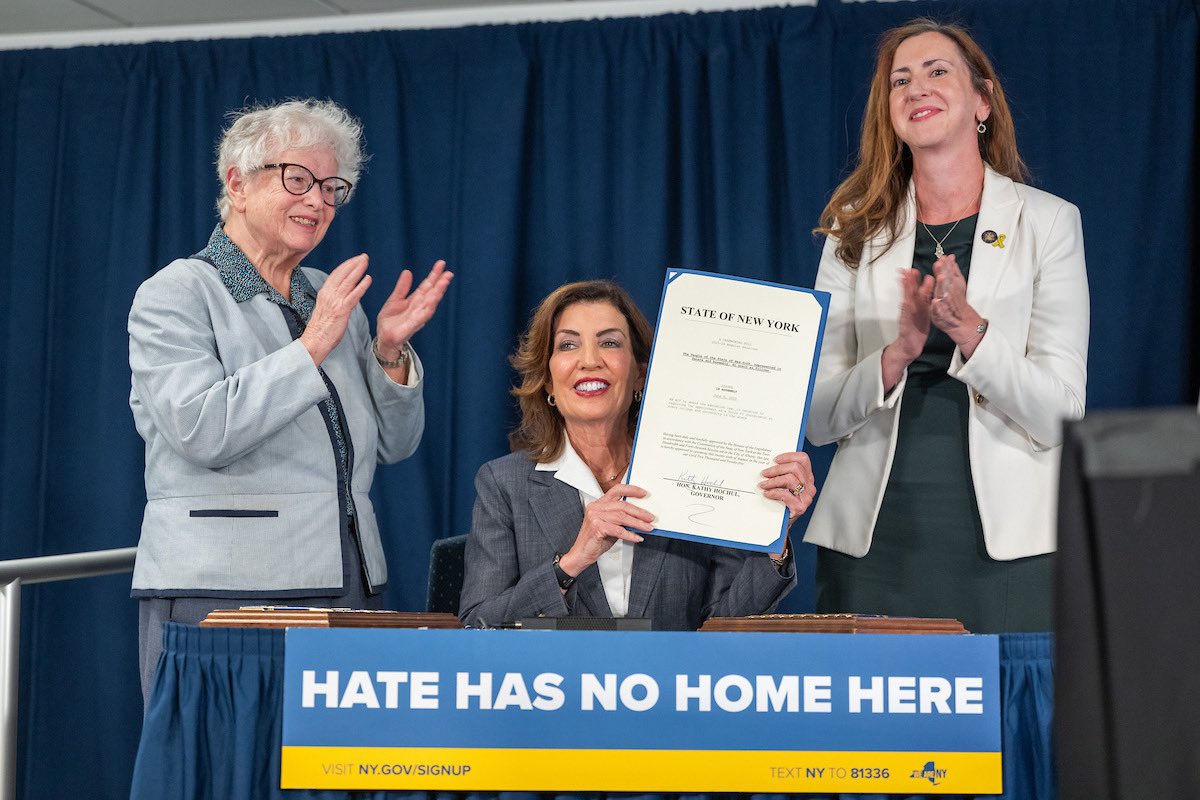
New York Gov. Kathy Hochul (center) signed into law legislation that requires all colleges in the state to designate anti-discrimination coordinators to enforce Title VI of the Civil Rights. Hochul was joined by state Sen. Toby Ann Stavisky (left) and Assemblywoman Nily Rozic (right), who sponsored the legislation in their respective chambers.More on the new law here.
Birthdays

Member of AJR, an indie pop multi-instrumentalist trio, together with his two brothers, Adam Metzger turns 35…
Chatsworth, Calif., resident, Ruth Ann Kerker Hapner… Board chair for North America at the Pardes Institute of Jewish Studies, Mark S. Freedman turns 74… Author, essayist and journalist, Michael Wolff turns 72… President of the Israeli Jewish Congress focused on battling antisemitism, he is a former senator in the Russian Federation, Moshe Shlomo (Vladimir) Sloutsker turns 69… President of Cornell University until June 2024, Martha Elizabeth Pollack turns 67… Governor of New York State since 2021, Kathy Hochul turns 67… Israel’s ambassador to the Czech Republic, Anna Azari turns 66… Vice chairman at IBM and lead independent director on the board of Apollo Global Management, Gary Cohn turns 65… Executive director of J Street Israel, he served as Israel’s consul general to New England from 2006 until 2010, Nadav Tamir… Contributing editor at the National Interest, he is also chairman and CEO of Widehall, Steve Clemons turns 63… Private equity investor and a trustee of the Jewish Federations of North America’s Board, Neil A. Wallack… Israeli-born CEO of Insitro, she was a professor at Stanford for 18 years and a 2004 winner of a MacArthur genius fellowship, Daphne Koller turns 57… Director of National Intelligence throughout the four years of the Biden administration, Avril Haines turns 56… Co-founder of the 2017 Women’s March which she departed citing concerns over antisemitism, Vanessa Wruble turns 51… Managing partner and founder of G2 Investment Partners, Joshua Goldberg… Former director general of the Israeli Ministry of Finance, now CEO of the Strauss Group, Shai Babad turns 49… Mayor of Evanston, Ill., Daniel Kalman Biss turns 48… Senior advisor at the Foundation for Defense of Democracies, Richard Goldberg turns 42… Director of the JCRC at the Jewish Federation & Foundation of Northeast Florida in Jacksonville, Nelson France… Co-founder of theSkimm, Danielle Merriah Weisberg turns 39… Michael Weiss… Director of the Botanical Garden and senior lecturer, both positions at Tel Aviv University, Yuval Sapir… Talia Rubin…
Yehuda Kaploun and former Rep. Mark Walker have not yet had committee hearings scheduled

Joe Raedle/Getty Images
President Donald Trump and Rabbi Yehuda Kaploun light a candle during an Oct. 7th remembrance event at the Trump National Doral Golf Club on Oct. 7, 2024 in Doral, Florida.
Several major Jewish organizations are expected to call on the Senate to “swiftly” confirm President Donald Trump’s nominees for special envoy to monitor and combat antisemitism and international religious freedom ambassador.
The groups, led by the Jewish Federations of North America, are writing in a letter to Senate Majority Leader John Thune (R-SD) and Senate Minority Leader Chuck Schumer (D-NY) that filling the roles is “of utmost importance in fighting growing antisemitism and ensuring freedom of religion or belief worldwide,” according to a draft obtained by Jewish Insider. The letter is set to be sent on Tuesday, according to a source with knowledge of the draft.
“We dare not delay in filling these critical positions that protect human rights around the world,” the letter states. “To that end we strongly urge you to prioritize filling these positions, sending a powerful signal to governments around the world that the United States upholds our constitutionally guaranteed rights to life and liberty, to freedom of religion and belief, and calls on them to do the same.”
In April, Trump tapped Rabbi Yehuda Kaploun, an Orthodox businessman and Chabad rabbi who served as a campaign surrogate, to serve as the next U.S. special envoy to monitor and combat antisemitism. In the Biden administration, that role was filled by Deborah Lipstadt, a Holocaust historian at Emory University. In May, the two authored a joint op-ed, with former antisemitism envoy Elan Carr, calling for action after two Israeli Embassy staffers were killed outside the Capital Jewish Museum in Washington.
Trump named former Rep. Mark Walker (R-NC) as the U.S. ambassador-at-large for international religious freedom. Both positions require Senate confirmation, and neither has had a confirmation hearing yet.
“We believe that these ambassador-at-large positions are crucial to protecting vital human rights, promoting religious freedom and vigorously confronting the global surge in antisemitism,” the Jewish organizations wrote.
JFNA CEO Eric Fingerhut told JI on Tuesday that the positions must be filled to help Jewish organizations combat rising antisemitism.
“The 141 Jewish Federations across our system are on the front lines of responding to and combatting antisemitism, and every single day we hear from them about the elevated levels of antisemitism our communities are facing,” Fingerhut said. “The government is a critical partner in our fight against antisemitism, both at home and around the world, so we must make sure that these roles do not remain vacant.”
A spokesperson for Thune did not respond to a request for comment.
A spokesperson for Schumer referred to the hold the Senate minority leader currently has on dozens of Trump nominees, and Trump’s recent message to Schumer to “go to hell” after bipartisan negotiations broke down. The spokesperson declined to comment specifically on Kaploun or Walker.
“President Trump has focused on promoting religious freedom and fighting antisemitism in a historic way,” White House deputy press secretary Anna Kelly told JI in a statement. “He wants all of his nominees confirmed as quickly as possible, including Yehuda Kaploun and Mark Walker, whose roles will be critically important to protecting Americans of faith.”
Current signatories to the letter include the Conference of Presidents of Major American Jewish Organizations, the Anti-Defamation League, the Orthodox Union, the Israeli-American Council, the Zionist Organization of America, Hadassah, American Jewish Committee, Agudath Israel, B’nai Brith International, the Louis D. Brandeis Center for Human Rights Under Law, NORPAC, Combat Antisemitism Movement, Religious Zionists of America and the American Association of Jewish Lawyers and Jurists.
A White House spokesperson did not respond to a request for comment.
This story was updated at 9:35 a.m. ET on Aug. 27, 2025.
The president spoke with Fox News host Mark Levin about his administration’s strike on Iran’s nuclear facilities

Tasos Katopodis/Getty Images
President Donald Trump
President Donald Trump said in an interview with Fox News host Mark Levin on Tuesday that at the time of the U.S. strikes on Iran’s nuclear facilities in June, he believed Tehran “would have had nuclear weapons in a period of four weeks.”
Calling in to Levin’s radio show, Trump said that, “if we didn’t [strike Iran], they would probably by this time, just about this time, have a nuclear weapon and they would have used it.”
Trump said that, despite news reports questioning his assessment of the efficacy of the strikes, “it turned out that” the impacts were “even more so than I said. It was obliteration.”
“The Atomic Energy Commission said, this place is gone. [Iran] can maybe start up, but they’re not starting up there,” Trump said of the Iranian nuclear facilities targeted in the operation. The Israel Atomic Energy Commission found that the U.S. strike on the Fordow nuclear facility “destroyed the site’s critical infrastructure” and rendered it “inoperable,” though reports differ on the extent of the damage.
The president told Levin that the U.S. Air Force pilots who conducted the strikes told him that they and their predecessors had been practicing the flight to Iranian airspace for 22 years.
Trump lauded his peacemaking abilities, saying, “I’ve settled six wars and we did the Iran night, wiped out their whole nuclear capability, which they would have used against Israel in two seconds if they had the chance.”
He called Israeli Prime Minister Benjamin Netanyahu a “war hero” and said, “I guess I am, too. … I mean, I sent those planes.”
Even as the president has prioritized tackling antisemitism in his second term, leading conservatives are quietly pushing for more engagement against far-right hate
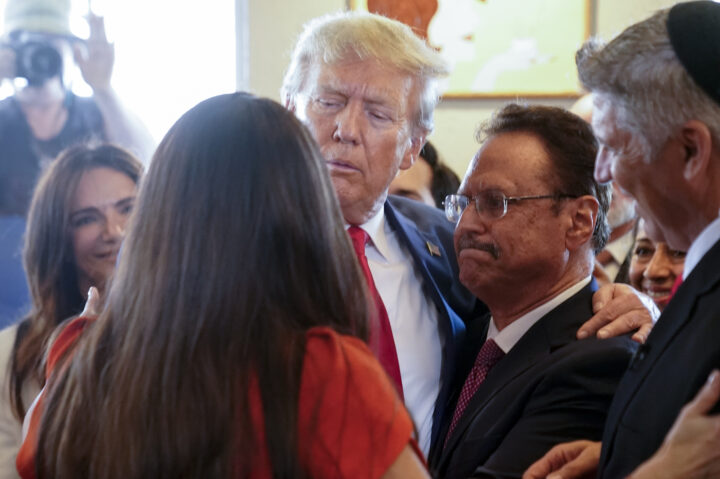
AP Photo/Alex Brandon
President Donald Trump talks with supporters while standing with pastor Mario Bramnick, second from right, at Versailles restaurant on Tuesday, June 13, 2023, in Miami.
President Donald Trump came into office with a promise to make tackling antisemitism a priority of his second term. So far, the focus of that effort has been almost exclusively on addressing left-wing and Islamist antisemitism, primarily tied to anti-Israel extremism — while leaving out antisemitism emerging from the political right.
Now, a group of staunch Trump allies from within the evangelical Christian community is urging Republicans to also focus on countering what they describe as a growing threat of antisemitism from within their own camp. They see prominent MAGA-aligned figures such as podcast hosts Tucker Carlson and Candace Owens platforming overtly antisemitic views, and worry that those voices — with massive social media followings — could play a role in shaping the direction of the Republican Party.
Last month, an organization called the Conference of Christian Presidents for Israel hosted a meeting to discuss the topic at the Family Research Council, a powerful Christian advocacy group. Billed as a “private roundtable for key Christian leaders,” according to the event invitation, it identified right-wing antisemitism as a high-stakes challenge: “It is vital that Christian leaders counter the forces on the right who are demonizing the state of Israel, its leadership and the Jewish people,” stated the invitation, which was obtained by Jewish Insider.
“We’ve been very concerned about the progressive leftist [antisemitism],” Mario Bramnick, a pastor in South Florida who is the president of the Latino Coalition for Israel, told JI on Tuesday. He is also the founder of the Christian Conference, and he organized last month’s event with Luke Moon, the executive director of the Philos Project. “But some of the statements coming out on the right, to me, are possibly more brazen and more troubling and clearly, clearly, do not represent President Trump or his administration,” added Bramnick.
The meeting was attended by Rabbi Yehuda Kaploun, Trump’s nominee to serve as the special envoy to monitor and combat antisemitism, as well as Mark Walker, a former congressman from North Carolina who is Trump’s pick to serve as ambassador-at-large for international religious freedom. Yair Netanyahu, the eldest son of Israeli Prime Minister Benjamin Netanyahu, addressed the group virtually.
“Antisemitism is a bipartisan issue and needs to be condemned anytime, anyplace,” Kaploun told JI. “It is imperative that all parties educate their members about the dangers of antisemitism.”
The Christian group is concerned about a small but growing anti-Israel faction within the Republican Party. In a press release on Tuesday, Bramnick called out Carlson and Owens, as well as two figures who remain close to Trump: Steve Bannon and Rep. Marjorie Taylor Greene (R-GA). A Trump administration spokesperson did not respond to a request for comment on Tuesday.
“It’s almost like we have more of an onus to handle this, because it’s our own camp, our own family. Imagine something goes wrong with someone in your family, you feel more of an obligation,” Bramnick told JI. “Who better than us to be able to handle it?”
Bramnick met last week with Justice Department senior counsel Leo Terrell, the chair of the federal government’s antisemitism task force, to raise the issue of antisemitism on the right.
“They are clearly on this and following it, from my understanding, and wanting to work with us,” Bramnick said. A spokesperson for Terrell did not respond to a request for comment.
The Conference of Christian Presidents has ties to influential conservative groups in Washington. Hours after the meeting at the Family Research Council, the Conference co-hosted an event on the Trump administration’s policies in the Middle East with the Heritage Foundation. The event featured video remarks from U.S. Ambassador to Israel Mike Huckabee and a keynote speech by evangelical leader Rev. Johnnie Moore, executive chair of the Gaza Humanitarian Foundation.
Last year, the Heritage Foundation released a policy document focused on antisemitism, called Project Esther, which identified left-wing antisemitism as the main form of antisemitism in the U.S., without mentioning any issues on the right. An inquiry to the authors of the Project Esther report did not garner a response.
Christians United for Israel, the largest Christian pro-Israel group with more than 10 million members, is not part of the Conference of Christian Presidents for Israel. But Sandra Hagee Parker, chair of the CUFI Action Fund, told JI that the organization agrees with the need to combat antisemitism on the right.
“One cannot be a Christian and antisemitic. The two are mutually exclusive,” Parker said in a statement. “Just as liberals must condemn those who use human rights as cover for their Jew-hatred, conservatives must call out those who drape themselves in the flag or the banner of the cross while bastardizing the former and defiling the latter.”
Republican Jewish Coalition CEO Matt Brooks said antisemitism is “percolating out there at the extreme ends of the far right, well outside of the mainstream of the Republican Party.”
“I don’t know that it’s growing. It’s gotten a little louder,” he told JI. “Our challenge and our effort going forward is to ensure that it doesn’t take hold in the Republican Party as it did in the Democratic Party.”
As his party becomes more critical of Israel, Brown’s views on the Middle East will likely be in the spotlight for his political comeback
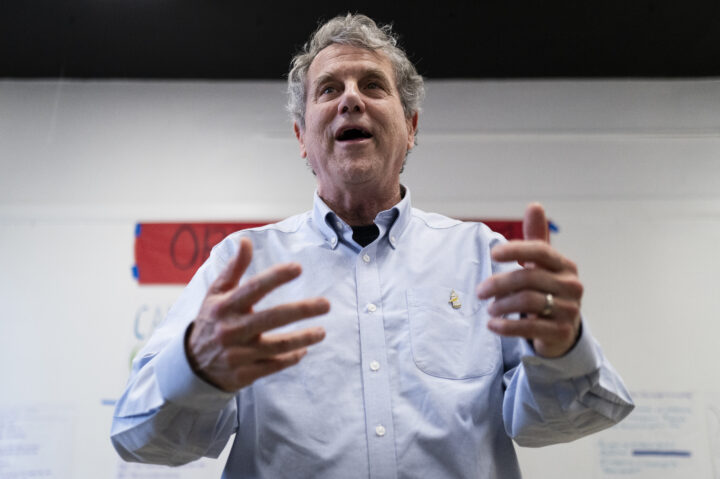
Stephen Maturen/Getty Images
Democratic senate candidate, then-Sen. Sherrod Brown (D-OH), addresses volunteers at a campaign office on November 4, 2024 in Cleveland Heights, Ohio.
Former Sen. Sherrod Brown (D-OH) is set to make a bid to return to the Senate in 2026, according to the Cleveland Plain Dealer.
Brown, who lost his 2024 reelection race by four points to Sen. Bernie Moreno (R-OH), will challenge Sen. Jon Husted (R-OH), who was appointed earlier this year to fill Vice President JD Vance’s seat. President Donald Trump carried the state by more than 11 points in 2024.
The progressive Brown remained relatively popular in the state even as it has trended increasingly red in recent years, and maintained strong ties with the state’s large Jewish community. He had also been floated as a potential gubernatorial candidate in 2026, but was strongly courted by Senate Democrats to make a comeback bid.
In late 2024, Brown voted against Sen. Bernie Sanders’ (I-VT) first efforts to block certain U.S. arms transfers to Israel.
“Senator Brown strongly believes that Israel has a clear and undeniable right to defend itself against Hamas’ brutal terrorism and voted to send military aid to Israel, along with much-needed humanitarian aid to Gaza,” a Brown spokesperson said prior to the vote. “Ultimately, Senator Brown believes that Israel and Hamas must agree to a ceasefire that ends the war, frees the hostages, and delivers desperately needed humanitarian aid to the Palestinian people.”
Numerous Democrats have since shifted their position on the issue, citing the worsening humanitarian situation in Gaza.
In 2022, Brown said that he believed that support for Israel was a majority position in both parties, and that those who opposed the Jewish state were a small group of “outliers,” rejecting the notion that “progressive values” were incompatible with support for Israel.
The former Ohio senator, then the chairman of the Senate Banking Committee, took a relatively hawkish position on Iran last year, pressing the administration, after Hamas’ Oct. 7, 2023, terror attacks, to re-freeze Iranian funds previously released under a deal to free Americans held hostage in Iran.
Brown also called on the Biden administration, in early 2024, to re-impose a Foreign Terrorist Organization designation on the Houthis.
Husted has generally been seen as a moderate and has maintained a pro-Israel record in office, opposing efforts to block weapons transfers to Israel, joining with nearly all other Senate Republicans in demanding full dismantlement of Iran’s nuclear program, supporting American and Israeli strikes on Iran and backing legislation to increase sanctions on Iran.
Speaking at a Senate hearing on campus antisemitism, Husted said that the disruptions in the days after the Oct. 7, 2023 terror attacks appeared coordinated.
A letter signed by prominent House progressives said such a state ‘will need to fully recognize Israel’ and guarantee ‘the disarmament of and relinquishing of power by Hamas’

Chip Somodevilla/Getty Images
Rep. Ro Khanna (D-CA) leaves the U.S. Capitol on March 13, 2024 in Washington.
Rep. Ro Khanna (D-CA) is circulating a letter to President Donald Trump and Secretary of State Marco Rubio among House lawmakers calling for the United States to recognize a Palestinian state.
Khanna, a prominent progressive voice in the House with aspirations for higher office, has become increasingly vocal in recent weeks about the humanitarian crisis in Gaza and in his criticism of the pro-Israel lobby group AIPAC.
“We are writing to request that the United States officially recognize a Palestinian state, as this tragic moment has highlighted for the world the long overdue need to recognize Palestinian self-determination,” a draft version of the letter obtained by Jewish Insider reads. “Just as the lives of Palestinians must be immediately protected, so too must their rights as a people and nation urgently be acknowledged and upheld.”
The letter had nine co-signatories, in addition to Khanna, as of Thursday evening.
The signatories said they welcome French President Emmanuel Macron’s decision to recognize a Palestinian state, and urged other governments to do the same. The U.K. and Canada said this week that they intend to do so as well, given certain conditions.
“It has long been acknowledged by much of the international community and previous U.S. administrations of both major political parties that a Palestinian state recognized as a full and equal member of the community of nations is necessary to fulfill the legitimate national rights of the Palestinian people and ensure the state of Israel’s survival as the democratic homeland of the Jewish people,” the letter continues.
U.S. policy has long opposed the unilateral recognition of a Palestinian state outside of a negotiated two-state solution between the Israelis and Palestinians.
“A viable Palestinian state will need to fully recognize Israel and adopt a framework to guarantee Israel’s security, including the disarmament of and relinquishing of power by Hamas in order to be broadly embraced by the community of nations,” the letter continues. “We will need to work closely with the Palestinian people, the Palestinian Authority, our Arab allies, and Israel to make this feasible.”
The letter argues that “recognizing Palestinian statehood and obligating Palestinian leaders to abide by the international law binding on states and their governments will make that far more achievable and sustainable than decades of statelessness and repression have.”
The letter has been co-signed by Reps. Greg Casar (D-TX), Lloyd Doggett (D-TX), Veronica Escobar (D-TX), Maxwell Frost (D-FL), Al Green (D-TX), Jared Huffman (D-CA), Pramila Jayapal (D-WA), Mark Pocan (D-WI) and Bonnie Watson Coleman (D-NJ) — all prominent progressive lawmakers in the House — since opening on Tuesday evening.
In a statement to JI, Khanna said, “This is the moment for the United States to officially recognize a Palestinian state. All 22 states in the Arab League this week called for a non Hamas Palestinian state that recognizes Israel.”
He said that his office had begun outreach on the issue this week, but did not plan to send the letter until the United Nations General Assembly in September, when France and others said they plan to formally recognize a Palestinian state. He described the response from his fellow lawmakers as “overwhelming.”
“It’s disappointing someone would leak the letter thinking it would sabotage the effort,” Khanna continued. “But you cannot sabotage an idea whose time has come.”
Khanna said in a memo to colleagues about the letter, “Recognition of Palestinian statehood — alongside continued efforts to secure Israel’s safety and guarantee its future as a democratic homeland for the Jewish people — is essential to achieving peace.”
He continued, “As the devastating toll of the war in Gaza continues to mount, this tragic moment has underscored the urgent need to acknowledge Palestinian self-determination and take meaningful steps toward a just and lasting resolution to the Israeli-Palestinian conflict.”
Previously, a resolution supporting Palestinian statehood, introduced in the House by Green in December 2023, received five co-sponsors — Watson Coleman, Frost, Doggett, Escobar and Rep. Andre Carson (D-IN).
Anti-Israel activists on the left are working to win over Democratic lawmakers to their side — and are finding some unlikely allies moving in their direction amid the sustained pressure
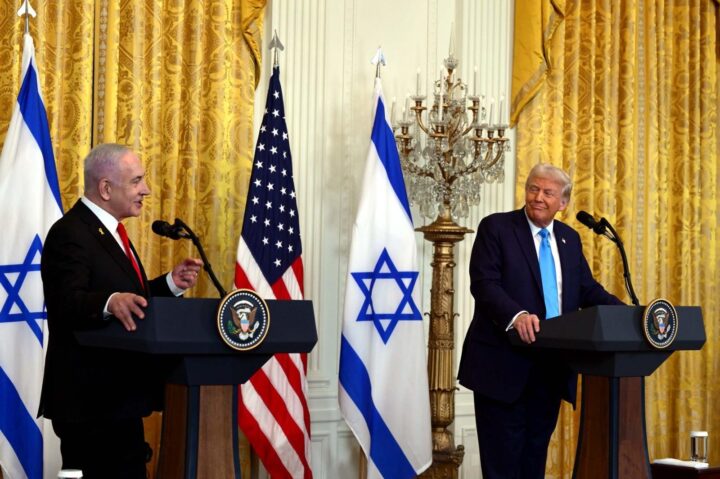
Avi Ohayon (GPO)
Israeli Prime Minister Benjamin Netanyahu and President Donald Trump hold a joint press conference at the White House on February 4, 2025
A new Gallup poll underscores the degree to which Israel’s security is now dependent on support from President Donald Trump and the Republican Party, the Jewish state having drained much of its political capital from both Democrats and independents amid the ongoing war against Hamas in Gaza and the resulting humanitarian crisis.
The numbers are clear: Support for Israel is now becoming a partisan issue after the Jewish state enjoyed decades of bipartisan support in the United States. Anti-Israel activists on the left, looking to exploit the moment, are working to win over Democratic lawmakers to their side — and are finding some unlikely allies moving in their direction amid the sustained pressure.
The data is sobering: Only about one-third of Americans now support Israel’s military action in Gaza, with 60% disapproving. At the beginning of the war, exactly half of Americans supported Israel’s war against Hamas. The drop-off has come entirely from Democrats (36% supported in November 2023, while 8% do now) and independents (47% supported in November 2023 while 25% support now).
Among Republicans, however, support for Israel’s military efforts has remained significant. The exact same share of Republicans who backed Israel’s war against Hamas in November 2023 (71%) continue to support Israel’s efforts today. Trump’s decision to strike Iran’s nuclear facilities has, if anything, bolstered GOP support for Israel and undermined the isolationist and small anti-Israel faction within the party.
Israeli Prime Minister Benjamin Netanyahu’s close relationship with Trump, a partnership that has led to major policy successes, like the successful, coordinated attacks against Iran’s nuclear program, has nonetheless also played a role in the growing partisanship. Netanyahu, for the first time, is viewed unfavorably by a majority of Americans — with Democrats now registering more overt disapproval of the Israeli leader since Trump reentered office.
The Gallup polling shows there was already soft support for Israel among Democrats before the war began, with majorities of Democrats opposed to the Jewish state’s efforts at self-defense just weeks after the Oct. 7 attacks. That said, a clear majority of Democratic lawmakers maintained their support for Israel’s war against Hamas, with only a relatively small faction calling for ceasefires before Hamas’ leadership and terror infrastructure could be degraded.
But there are signs that some of the more mainstream voices are succumbing to the anti-Israel shifts within the party’s base. Over half of Senate Democrats supported a Bernie Sanders-led resolution last night that would block U.S. arms sales to Israel — up from the 15 Democrats who voted for a similar measure back in April. Sen. Elissa Slotkin (D-MI), a pragmatic Democratic senator, who was absent for the vote, sounded open to cutting off “offensive” military aid to Israel. Sen. Angus King (I-ME), a pro-Israel independent who caucuses with Democrats, changed his tune and called for ending all military aid to Israel this week.
What’s alarming is how some of this consuming anti-Israel sentiment among Democrats is showing some signs of evolving into, at least, a tolerance of antisemitism. Pennsylvania Gov. Josh Shapiro received blowback from the left for simply calling out New York City Democratic mayoral nominee Zohran Mamdani over failing to condemn “globalize the intifada” rhetoric. Slotkin felt the need, while on an anti-Israel podcast, to pander that she’s a Jewish senator who wasn’t backed by Jewish groups. Progressive spaces are becoming increasingly inhospitable to Jews, at least those who don’t renounce their support for a Jewish state.
The many liberal-minded, pro-Israel Jewish Democrats have felt increasingly homeless politically as a result of the shifts within the party — and the accommodation of views that, until very recently, have been beyond the political pale. If the party’s reaction to its 2024 defeat is to tack even further leftward and alienate core parts of their coalition, it could well be lurching towards its own McGovern moment in the future.
The House speaker said he wants to see the war in Gaza come to an end soon

Kent Nishimura/Getty Images
House Speaker Mike Johnson (R-LA) does an interview with CNN at the U.S. Capitol on April 17, 2024 in Washington, D.C.
House Speaker Mike Johnson (R-LA) expressed strong concern about the humanitarian crisis in Gaza in an appearance on CNN’s “The Lead” on Wednesday.
Johnson’s comments, made days after President Donald Trump said that there is “real starvation” happening in Gaza, indicate growing concern even among pro-Israel Republicans about the humanitarian situation in Gaza, at the same time that such concerns on the Democratic side have reached new heights.
“I do hope it comes to an end soon,” Johnson said about the war in Gaza, “and we bring an end to this suffering and misery, because it is quite sad and quite alarming to see.”
He said that “we’ve got a humanitarian crisis in Gaza — I mean the pictures tell 1,000 words and it’s heartbreaking.” Israeli Prime Minister Benjamin Netanyahu has said that there is “no starvation” happening in the enclave.
The House speaker said that he wants to see an end to the conflict and peace, adding that “President Trump is using a strong hand to try to forge that, and we’re moving in the right direction.”
He also credited Israel with opening up new channels for aid and noted that the U.S. and its partners are going to work to provide additional aid as well.
Johnson did not mention Hamas, which some supporters of Israel argue should shoulder the blame for any aid shortages and the lack of a ceasefire in Gaza.
Johnson didn’t directly address a question from host Jake Tapper about whether he’s concerned that Israel is at risk of becoming a global pariah.
After meeting with U.K. Prime Minister Starmer, the president said the U.S. will be getting more involved in providing aid

Tasos Katopodis/Getty Images
President Donald Trump
President Donald Trump decried the humanitarian situation in Gaza on Monday, telling reporters that he does “not particularly” agree with Israeli Prime Minister Benjamin Netanyahu’s assessment that there is no starvation taking place in the enclave.
“That’s real starvation stuff,” Trump said, following a meeting in Scotland with U.K. Prime Minister Keir Starmer. “I see it, and you can’t fake that.”
Trump said the U.S. will be getting “even more involved” in taking steps toward addressing hunger in Gaza, including by setting up “food centers.” A White House spokesperson declined to comment when asked for specifics about what this plan might entail. Trump said “all of the European nations” would be part of the project.
“We’re going to do it in conjunction with some very good people, and we’re going to supply funds,” said Trump.
Food distribution in Gaza is currently being operated by the Gaza Humanitarian Foundation, which is backed by both the U.S. and Israel. The organization has faced criticism for failing to meet the needs of Gazans, and scenes of chaos at the gates of its distribution centers have spread online.
Without mentioning GHF by name, Trump appeared to take aim at the existing aid mechanisms, saying that the new “food centers” will not have fences to keep people out.
“We’re also going to make sure that they don’t have barriers stopping people here. You’ve seen the areas where they actually have food, and the people are screaming for the food in there, they’re 35-40 yards away, and they won’t let them because they have lines that are set up,” said Trump. “And whether they’re set up by Hamas or whoever, but they’re very strict lines. We have to get rid of those lines.”
Trump blamed Hamas for the failure of recent ceasefire talks and for prolonging the war, including the humanitarian crisis. The president’s comments come after European leaders have pressed Israel to allow a freer flow of humanitarian aid into Gaza.
“We have a good group of countries who can help with the humanitarian needs, which is food, sanitation, some other things. It’s very difficult to deal with Hamas,” said Trump. “Hamas has become very difficult to deal with in the last couple of days, because they don’t want to give up these last 20 [hostages], because they think as long as they have them, they have protection. But I don’t think it can work that way.”
Fifty hostages remain in Gaza, and Israel believes at least 27 of them are dead. The most recent ceasefire proposal would only have seen the release of about half of the living hostages.
Trump also said Iran played a role in the failure of ceasefire talks, saying Iran “interjected themselves in this last negotiation.”
“I think they got involved in this negotiation, telling Hamas and giving Hamas signals and orders. And that’s not good,” Trump said. “For a country that just got wiped out, they’ve been sending very bad signals, very nasty signals. And they shouldn’t be doing that.”
Pou is one of the few House Democrats representing a district that President Trump carried in 2024
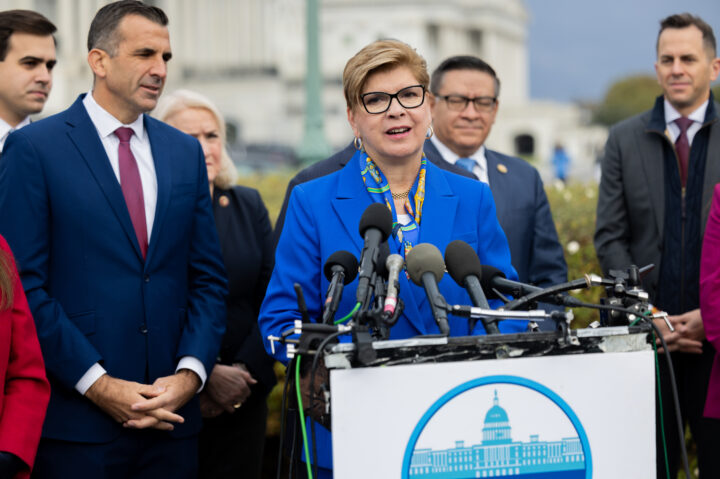
Nathan Posner/Anadolu via Getty Images
Rep.-elect Nellie Pou (D-NJ) speaks during a press conference introducing new members of the Congressional Hispanic Caucus in Washington, DC on November 15, 2024.
The leading Republican candidates in a New Jersey swing district that President Donald Trump narrowly carried in 2024 hold questionable track records on Israel and antisemitism as the GOP targets the district in the midterms next year.
Rosemary Pino, the Clifton, N.J., City Council member who recently entered the race against Rep. Nellie Pou (D-NJ), posted a video last month from a Palestinian flag-raising event in Clifton where speakers accused Israel of genocide.
“The Palestine Flag Raising event was more than a gathering. To everyone who showed up, spoke up, and raised their voices alongside the flag thank you. Your presence matters. Your solidarity matters,” Pino wrote in a Facebook post she shared alongside clips from the event.
The event, hosted by the Palestinian American Community Center in Clifton, included denunciations by several speakers of Israel, and featured a condemnation of the Trump administration’s deportation policies that it says are aimed at combating antisemitism.
Speakers accused Israel of “genocide” in Gaza and of deliberately manufacturing a famine in the territory, which a speaker described as a “war crime,” and called for “no money for wars.”
Another speaker at the event condemned the Trump administration’s detention of Columbia University anti-Israel activist Mahmoud Khalil, saying, “His story is a reminder that this system seeks to fracture us and oppress and repress our people. It’s part of a broader system designed to criminalize dissent, fracture our communities and punish those who resist it.”
Pino said in a statement to Jewish Insider, “The City of Clifton conducts more than a dozen flag raisings every year. As a Councilwoman, I attend as many of the flag raisings as I can. I attend the flag raisings to show that I care about the various communities in our city, not as a political nor ideological statement.”
“I support the State of Israel, its right to exist, and its right to defend itself,” she added. “I believe that what happened on October 7th was a horrific and evil terrorist act by Hamas. Israel is a strong ally of the United States, and I believe we must maintain that alliance, not cut it.”
Pino continued, “Like President Trump, I support a ceasefire and an end to the hostilities in Gaza. I support a two-state solution where Hamas’s rule of terror ends. I support ensuring humanitarian aid is made available to those who need it. I believe President Trump is working to bring lasting peace to the region, and I support those efforts.”
The PACC organization has a long record of anti-Israel activity. The group sent a bus of community members to protest Israeli Prime Minister Benjamin Netanyahu’s 2024 speech to Congress, which devolved into violence and vandalism of D.C.’s Union Station, and the group’s magazine published a poem in its March 2024 issue advocating for a free Palestine “from the river to the sea” — a call for the elimination of Israel.
The flag-raising event Pino attended did not, however, include some of the eliminationist anti-Israel and anti-American rhetoric and slogans that have proliferated at other pro-Palestinian events in the past two years, and speakers also called for peace, justice and security for all, and recited the Pledge of Allegiance.
In 2023, Pino, as a member of the city council, also expressed concerns about legislation that would have adopted the International Holocaust Remembrance Alliance’s working definition of antisemitism in Clifton, highlighting concerns from the Arab-American community, according to contemporaneous news reports.
The resolution was ultimately tabled and never passed the city council. Pino also argued against assigning the resolution to be discussed by the Civil Rights Committee, which she chaired, saying the committee was too new at the time and not “equipped to handle this,” adding that “it’s only right that we not pawn it off to the committee.”
Pino told JI, “I strongly condemn antisemitism in all shapes and forms.”
“At the time, there were concerns in the community regarding the [First] Amendment implications of that specific resolution. Although that particular resolution did not pass, the Civil Rights Committee did, in fact, take up the issue,” she continued. “The Committee, and subsequently the City Council, passed a resolution which explicitly condemned antisemitism and called for renewed efforts to combat it in the City of Clifton.”
The 9th Congressional District has significant Jewish and Palestinian populations, making Israel policy and antisemitism potentially critical flashpoints in the upcoming race. It is also an unexpectedly competitive battleground, swinging from backing President Joe Biden by 19 points in the 2020 presidential election to narrowly backing Trump four years later.
Pou is one of only 13 House Democrats representing a district that Trump carried in 2024.
The other Republican candidate in the race, Billy Prempeh, who was the 2024 GOP nominee, was endorsed by the New Jersey chapter of the Council on American-Islamic Relations last year, supported cutting off U.S. aid to Israel to stop the war in Gaza, opposed Israeli strikes on Gaza and opposed the Antisemitism Awareness Act.
Mayor Andre Sayegh, a potential primary challenger to Pou, also attended the flag-raising event, and delivered a speech.
Pou is a supporter of Israel, though she has a mixed voting record in the House on issues related to Israel and antisemitism.
Press Secretary Karoline Leavitt: ‘In both accounts, the president quickly called the prime minister to rectify those situations’

ANDREW CABALLERO-REYNOLDS/AFP via Getty Images
President Donald Trump (R) meets with Israel's Prime Minister Benjamin Netanyahu in the Oval Office of the White House in Washington, DC, on February 4, 2025.
White House Press Secretary Karoline Leavitt said on Monday that President Donald Trump was “caught off guard” by recent Israeli actions in Syria and Gaza, noting that he had called Israeli Prime Minister Benjamin Netanyahu to air his concerns.
Leavitt made the comments after being asked if the president had “expressed his frustration” with Netanyahu directly over the fatal attack on the Holy Family Catholic Church, the only Catholic church in Gaza, and the IDF’s move to strike government buildings in Damascus, Syria’s capital, last week during sectarian clashes that drew in Syrian government forces and left more than 1,000 people dead. The strikes on Syria came as the Trump administration has thrown its full support behind the new government and urged Israel to normalize relations with the war-torn country.
“The president enjoys a good working relationship with Prime Minister Bibi Netanyahu and stays in frequent communication with him. He was caught off guard by the bombing in Syria and also the bombing of the Catholic Church in Gaza,” Leavitt told reporters outside the White House.
The White House press secretary went on to note that Trump and Secretary of State Marco Rubio stepped in to prevent an escalation in Damascus and to demand answers on the church strike.
“In both accounts, the president quickly called the prime minister to rectify those situations, and we saw Secretary Rubio intervene when it came to Syria. We saw a deescalation there. And as for the bombing of the Catholic church in Gaza, the prime minister did put out a statement saying this was an accident and they deeply regretted that action on behalf of the State of Israel following his conversation with the president,” Leavitt explained.
The strike on the church killed three and injured 10, including a priest.
Leavitt later added when asked about the church bombing, “The president’s message on this conflict we’ve seen in the Middle East taking place for far too long, that has become quite brutal, especially in recent days, you’ve seen reports of more people dying. I think the president never likes to see that. He wants the killing to end.”
Earlier Monday, U.S. Ambassador to Turkey Tom Barrack, who is also serving as special envoy to Syria, criticized Israel’s actions in the country, telling the Associated Press that Jerusalem’s intervention in Syria “creates another very confusing chapter” in the region and “came at a very bad time.”
“The United States was not asked, nor did they participate in that decision, nor was it the United States’ responsibility in matters that Israel feels is for its own self-defense,” Barrack told the outlet of Israel’s strikes on Syria.
Barrack conceded that “both sides did the best they can” in negotiations leading up to the ceasefire he announced between Israel and Syria over the weekend, praising the two countries for trying to find common ground on issues such as the transfer of Syrian forces and military equipment from Damascus to Sweida, where members of the Druze religious minority have been under frequent attacks from Sunni Muslim Bedouin tribes.
According to a new poll, Republicans remain the strongest advocates of a muscular American role in world affairs, with 52% supporting America taking a leading role and 47% opposed
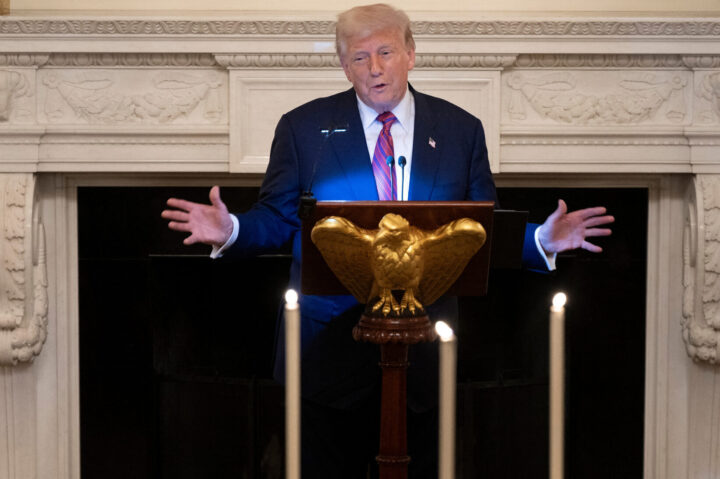
BRENDAN SMIALOWSKI/AFP via Getty Images
US Senator Markwayne Mullin (R-OK) (L) and US Senator John Thune (R-SD) (R) listen as US President Donald Trump speaks during a dinner for Republican US Senators in the State Dining Room of the White House July 18, 2025, in Washington, DC.
A newly released CNN poll, conducted this month, illustrates the resilience of a hawkish DNA within the Republican Party and among its voters even amid the rise of an isolationist strain that has sought to gain influence in the GOP during President Donald Trump’s second term.
The poll asked respondents: “Do you think the United States should or should not take the leading role among all other countries in the world in trying to solve international problems?” Overall, 43% took the more active approach, while 56% took a more isolationist view.
Republicans, however, remained the strongest advocates of a muscular American role in world affairs, with 52% supporting America taking a leading role and 47% opposed. By contrast, just 42% of Democrats and 39% of independents shared the more hawkish worldview.
Notably, the shift in more isolationist sentiment was almost entirely driven by Democrats and independents since the last CNN survey in March, which found majority support for significant American global engagement. In the March survey, a 57% majority of Democrats preferred more American involvement in the world, a number that dropped 15 points in the last four months. The Republican share of those preferring American engagement remained steady at 52%.
The results from the CNN polls suggest there’s a more committed core of Republican-voting hawks that is more resilient than the shifting political winds, whereas the Democratic foreign policy worldview appears more dependent on partisanship and what’s happening in the news at the time.
In March, at the time of the first CNN poll, Democrats showed a surge of support for foreign engagement — in large part, because they were responding to the hostile reception Trump delivered at the time to Ukrainian President Volodymyr Zelensky, who was seeking American military aid to his country. Back then, Trump wrongly blamed Zelensky for causing the war, and attacked him as a dictator in the run-up to the ugly confrontation at the White House. It was the high point of isolationism in Trump’s second term — and prompted an uptick of hawkishness among Democrats.
But since then, Trump has sharpened his rhetoric against Russian President Vladimir Putin and agreed to send Ukraine offensive weapons, in a reversal of his previous reluctance. He also decided to strike Iran’s nuclear facilities despite alarmism from an isolationist faction within his party, which turned out to be a major military (and political) success.
A recent Echelon Insights survey underscored that Trump’s hawkish turn has broadened and deepened support for strongly supporting American allies within the party. A clear 49-36% of Trump voters, asked if they supported continuing to give weapons to Ukraine, said yes. When informed that it was Trump’s decision to aid Ukraine further, nearly two-thirds of Trump supporters embraced the decision.
The actions on Capitol Hill are consistent with the polling. When Rep. Marjorie Taylor Greene (R-GA) proposed a series of amendments cutting off aid to foreign allies, the vast majority of Republicans voted against them. Even on her proposal to cut military aid for Ukraine, 141 of the 217 House Republicans took the pro-Ukraine side.
And when Greene proposed to block missile defense funding that the U.S. gives to Israel, only one other Republican, Rep. Thomas Massie (R-KY), joined her. Indeed, there were more Democrats who joined with MTG (four) than Republicans — in a sign of the “horseshoe theory” of the far left and far right uniting in their extremism.
Trump’s decision to strike Iran’s nuclear program appears to have created a momentum shift within the party, pushing back the faction of isolationists seeking to gain influence in the administration but also building support for a familiar brand of muscular engagement that has defined the party for generations.
The event, which is drawing some of the world’s leading tech and energy moguls, aims to turn Pennsylvania into an AI hub

Kayla Bartkowski/Getty Images
President Donald Trump attends the NCAA Division I Wrestling Championship with Sen. Dave McCormick (R-PA) on March 22, 2025 in Philadelphia, Pennsylvania.
PITTSBURGH — A who’s who of U.S. and Gulf officials and some of the world’s leading tech and energy investors are en route to Pittsburgh ahead of Sen. Dave McCormick’s (R-PA) first-ever innovation summit on Tuesday, where he and President Donald Trump will announce $70 billion in investments aimed at turning Pennsylvania into a hub for artificial intelligence and new energy technologies.
More than 60 CEOs and scores of top energy and AI investors are slated to be at the freshman senator’s inaugural Pennsylvania Energy and Innovation Summit at Carnegie Mellon University, home to one of the world’s most advanced AI programs. Among the CEOs expected to appear are BlackRock’s Larry Fink, Palantir’s Alex Karp, Bridgewater’s Nir Bar Dea, Anthropic’s Dario Amodei, Amazon Web Services’ Matt Garman, Bechtel’s Brendan Bechtel, Chevron’s Mike Wirth, GIC’s Lim Chow Kiat, Brookfield’s Bruce Flatt, CPP Investments’ John Graham, EQT’s Toby Rice and ExxonMobil’s Darren Woods. (McCormick’s wife, Dina Powell McCormick, is on the ExxonMobil board of directors.)
Others on the guest list include Ruth Porat, Alphabet’s president and chief investment officer; Raj Agrawal, global head of real assets at KKR; and Khaldoon Khalifa Al Mubarak, managing director and group CEO of Mubadala Investment Company.
Gov. Josh Shapiro, a Democrat, and Sen. John Fetterman (D-PA) will both be in attendance, with Shapiro taking part in a midday panel discussion alongside McCormick titled, “Investing Big in Pennsylvania: A Case Study.” Several state legislators and members of Pennsylvania’s congressional delegation — including Rep. John Joyce (R-PA) of the House Energy Committee and GOP state Sen. Kim Ward, president pro tempore of the body — are also participating.
At least seven senior Trump administration officials are expected in Pittsburgh for Tuesday’s gathering, including White House Chief of Staff Susie Wiles, Treasury Secretary Scott Bessent, Interior Secretary Doug Burgum, Commerce Secretary Howard Lutnick, Energy Secretary Chris Wright, EPA Administrator Lee Zeldin and White House AI and crypto czar David Sacks.
McCormick told Jewish Insider in March that organizing this summit was a focus of his early work in the Senate, which he said involved “thinking about big opportunities to change the trajectory of Pennsylvania.” He pointed to “the intersection of artificial intelligence and energy” and potential areas of growth in the state for the defense industry.
“We’ve got a huge opportunity in defense. The defense budget is going to increase. Pennsylvania has an enormous opportunity to be key to shipbuilding with our shipyard, robotics with Pittsburgh AI and manufacturing of weapons and ammunition,” he said at the time.
Another reason for the summit was to help make Pittsburgh and the Keystone State more competitive with neighboring states in what McCormick described to The Wall Street Journal this month as a “data-center arms race” that pits parts of Pennsylvania against Northern Virginia and areas of Ohio, including Columbus.
“We haven’t been competing adequately. For God’s sake, Columbus? What’s Ohio got on Pennsylvania?” McCormick asked, referencing Google’s announcement in June of a $2.3 billion in data centers based in Columbus and surrounding Lancaster and New Albany.
The two leaders were in New Jersey on Sunday for the match between Chelsea FC and Paris Saint-Germain
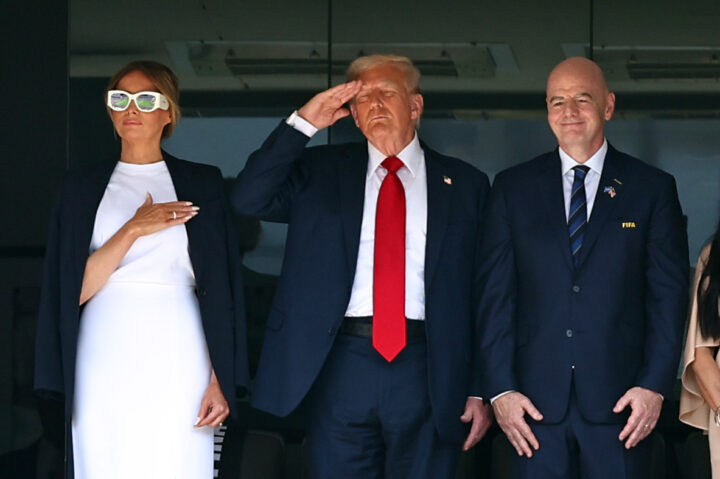
Robbie Jay Barratt - AMA/Getty Images
President Donald Trump and first lady Melania Trump with FIFA President Gianni Infantino during the FIFA Club World Cup 2025 final match between Chelsea FC and Paris Saint-Germain at MetLife Stadium on July 13, 2025 in East Rutherford, N.J.
President Donald Trump and Qatari Emir Sheikh Tamim bin Hamad Al Thani both attended the FIFA Club World Cup 2025 Final match on Sunday between Chelsea FC and Paris Saint-Germain, the latter of which is owned by Al Thani, at MetLife Stadium in New Jersey, where the two leaders were reportedly planning to meet.
Bishara Bahbah, the national chair of Arab Americans for Trump who is facilitating talks between Hamas and Israel for the Trump administration, said ahead of the match that the two leaders planned to meet to discuss ceasefire and hostage-relief efforts.
Others spotted at the match included Jared Kushner, the president’s son-in-law and architect of the Abraham Accords, New England Patriots owner Robert Kraft and White House Middle East envoy Steve Witkoff, who told reporters ahead of the game that he planned to meet with Qatari officials on the sidelines of the match in East Rutherford.
Witkoff’s meetings come as indirect negotiations in Doha, Qatar, between Israel and Hamas to reach a temporary ceasefire remain stalled. Witkoff had initially planned to travel to Doha last week to participate in talks, but the trip was postponed as negotiators remain deadlocked over a series of issues, including Israeli control over key corridors in the Gaza Strip.
Trump and Al Thani last met in May in Doha during the president’s trip to the Middle East that also included stops in Saudi Arabia and the United Arab Emirates.
The GOP lawmakers’ comments come after the president, taking a tougher line against Putin, overruled top Defense Department officials

BRENDAN SMIALOWSKI/AFP via Getty Images
US Under Secretary of Defense for Policy Elbridge Colby (R) and US Secretary of Defense Pete Hegseth look on during a meeting with Foreign Affairs Minister of Peru Elmer Schialer and Defense Minister of Peru Walter Astudillo at the Pentagon in Washington, DC on May 5, 2025.
Senate Republicans on Tuesday emphasized that Trump administration officials need to follow the president’s lead on foreign policy, after President Donald Trump publicly overrode a Defense Department-instituted halt on weapons for Ukraine.
The public back-and-forth indicated discord between the president and the Pentagon. Trump on Tuesday appeared to suggest he was out of the loop about the Ukraine military freeze; when a reporter asked him who had ordered the halt, Trump responded, “I don’t know, you tell me.”
Top Pentagon policy official Elbridge Colby reportedly led the move, citing a review allegedly showing U.S. missile defense interceptor shortages. Secretary of Defense Pete Hegseth approved the decision without informing the White House, CNN reported, and Trump did not specifically direct him to halt the weapons transfers. Politico reported that a series of other unilateral moves by Colby have surprised and frustrated Trump administration officials and U.S. allies.
Trump’s own policy on Ukraine as it defends itself against Russian aggression has been inconsistent since taking office, but in recent months he has grown publicly frustrated with Russian President Vladimir Putin’s approach to the war. Trump is now also backing a bipartisan Senate sanctions bill targeting Russia, according to the bill’s lead sponsor, Sen. Lindsey Graham (R-SC).
Republican hawks on Capitol Hill praised Trump’s decision to reinstate U.S. aid to the country, with several warning Pentagon officials against working at cross purposes with the president, though they declined to directly address the behind-the scenes machinations.
“Policy on defense and otherwise, it’s clear, is set by the president, it’s not set by his underlings,” Sen. John Kennedy (R-LA) told Jewish Insider, adding that he thinks that Trump’s own position on the issue has hardened because “President Trump is rapidly becoming fed up with President Putin and starting to see him for what he is, which is a pirate and a liar” who only responds to pressure.
Kennedy denied that the Pentagon had been at odds with Trump, however, adding, “Whether you like it or dislike it, the people who generally get crosswise with the president that work for him only do it one time.”
Sen. Thom Tillis (R-NC) told JI, “Generally speaking, I don’t think [Trump] likes people getting out ahead of him. So they need to coordinate that. I assume they did, it could have just been one situation, but you need to coordinate with the president.”
Tillis added that “anything that cuts short or challenges Ukraine’s resupply and support is a bad idea, and it’ll be a disastrous mistake.”
Sen. Mike Rounds (R-SD) told JI, “I’m in favor of additional aid for Ukraine. Whether it is simply a matter of having the Department of Defense get very clear orders from the president, or if it’s a matter of clarifying for the rest of the world to hear that we’re not walking away from Ukraine, I think it’s a very important message to send.”
Sen. Mitch McConnell (R-KY), the former Republican Senate leader, offered the most pointed criticism of those in the administration who have advocated for cutting off aid to Ukraine.
“This time, the President will need to reject calls from isolationists and restrainers within his Administration to limit these deliveries to defensive weapons,” McConnell said in a statement. “And he should disregard those at DoD who invoke munitions shortages to block aid while refusing to invest seriously in expanding munitions production. The self-indulgent policymaking of restrainers — from Ukraine to AUKUS — has so often required the President to clean up his staff’s messes.”
According to Politico, Colby independently ordered a review of the AUKUS submarine pact with the U.K. and Australia, which also surprised other elements of the Trump administration.
Sen. Roger Wicker (R-MS), the chair of the Senate Armed Services Committee, declined to comment on “palace intrigue” and said he was “just glad to see Washington, D.C., on a bipartisan basis moving in the right direction in favor of the good guys.”
“Facts become clearer, and more and more people, including the president and members of the administration, are coming to the realization that Putin wants nothing but conquest, and if he gets it in Ukraine, he won’t stop there,” Wicker told JI. “So it’s just a matter of the truth coming to light.”
Sen. Ted Budd (R-NC) suggested that the change had come about as a result of new information, rather than discord within the administration.
“Well, I think all of us have the right to change your mind when you have new information, so he’s not happy with the situation,” Budd said. “Again, I think all of our hearts are supportive of Ukraine. We want to make sure they have the right leadership, and transparency that they’re doing the right thing. So I think he’s making the right decision with the information that he’s given in real time.”
Sen. Markwayne Mullin (R-OK) said he wasn’t familiar with the exchange between Trump and the Pentagon, but noted concerns about U.S. stockpiles.
“I don’t know what the back-and-forth is,” Mullin said. “I know what we’re trying to do right now is build up our stockpiles, because we let things get pretty low with some of our missile systems, but I haven’t heard the back and forth between Trump and the Pentagon.”
Among Democrats, Sen. Jeanne Shaheen (D-NH), the ranking member of the Senate Foreign Relations Committee, called out Colby and Hegseth by name.
“I am pleased that President Trump appears to have reversed course on the dangerous and shortsighted decision made by Secretary Hegseth and Under Secretary Colby to continue critical assistance to Ukraine,” Shaheen said in a statement. “Unfortunately, last week’s decision sent exactly the wrong message. And it came with a tragic human cost.”
Analysts outside the administration emphasized that Trump’s policy is his own and hard-liners inside the Pentagon should be mindful that their views are not necessarily the same as Trump’s.
“I think over the last few years, it has been very, very clear that the only person who speaks for President Trump is President Trump,” Carrie Filipetti, the executive director of the Vandenberg Coalition and an official in the first Trump administration, told JI. “There are a lot of people, specifically within the Pentagon, that are much more ideological, who have assumed that President Trump shares their ideology, when really President Trump has always been much more flexible and responsive.”
Filipetti added that, from her experience in the first Trump administration, the president could get frustrated when officials “tried to speak for him” or “got over their skis and assumed that they knew the direction he was going in.”
She said that the administration’s recent moves, as well as some of Trump’s hawkish policies dating back to his first administration, show that the calculated use of force and economic power are key to Trump’s foreign policy.
“This is really a vindication of what Trump has always said was America First, which includes the willingness to use force if he can see how it will prevent a longer-term conflict,” Fillipetti explained. “Right now, I think the people who have pushed for a more hawkish policy are gaining more influence, partially because they’re proving that the goal was never to start wars. The goal was to end wars by using force and strength as a deterrent.”
Heather Conley, a nonresident senior fellow at the American Enterprise Institute and the former president of the German Marshall Fund, said it seemed clear that the Pentagon had not coordinated its moves with other parts of the administration or Congress, catching the White House off-guard.
“I think this was probably a very important lesson that the senior leadership in the Pentagon learned: that there’s no independent review, that these things are all connected and are all highly political and need to be coordinated with the White House, and Congress, most certainly, as well,” Conley said. “I think this will be a reinforcing lesson for the Pentagon to not get ahead of the president.”
Referencing Colby specifically, Conley said, “He may have very strong views about what is needed, but the president is shaping this policy, he’s shaping it every hour and every day, and that means it’s moving very quickly. … [Administration officials] have to be in alignment for there to be success. And they also may not be able to pursue their own independent view of where things should go.”
Conley said that the capability review that prompted the cutoff was necessary — given proper coordination — for any administration, in light of the multiple draws on American weapons reserves.
She said that the situation highlights the need for the U.S. to significantly accelerate its missile-defense production capacity and find ways to prompt Ukraine to expand its domestic production capacity, explaining that the U.S. lacks the ability to produce sufficient interceptors to cover Ukraine, the Middle East and potentially Taiwan.
Conley also noted that this isn’t the first time the Pentagon has appeared to be acting out of step with the White House, pointing to moves by Hegseth on Ukraine policy dating back to February.
Administration spokespeople have denied any discord or lack of coordination within the administration.
Kingsley Wilson, the Pentagon’s press secretary, told CNN in a statement that said in part, “Secretary Hegseth provided a framework for the President to evaluate military aid shipments and assess existing stockpiles. This effort was coordinated across government.” White House press secretary Karoline Leavitt said that Trump “has full confidence in the secretary of defense.”
The Department of Defense and National Security Council did not respond to requests for comment.
Jewish Insider’s congressional correspondent Emily Jacobs contributed reporting.
The ad, airing on broadcast TV in the Washington area, says the U.S. strikes on Iran ‘made the world safer … Only President Trump had the courage to stop them’

Ethan Miller/Getty Images
President Donald Trump is introduced at the Republican Jewish Coalition's Annual Leadership Summit at The Venetian Resort Las Vegas on October 28, 2023 in Las Vegas, Nevada.
The Republican Jewish Coalition is launching a new television ad buy in the Washington area timed to coincide with Israeli Prime Minister Benjamin Netanyahu’s visit this week praising President Donald Trump’s decision to support Israel in striking Iran’s nuclear program.
The 30-second spot, titled “Peacemaker,” will air on Fox News, Fox Business Network and Newsmax through the end of this week, after the conclusion of Netanyahu’s U.S. visit.
“President Trump’s strike on Iran’s nuclear weapons facilities made the world safer. For decades, Iran has waged war on America, even plotting to assassinate President Trump. Their goal: death to America, destruction of Israel, terror. Only President Trump had the courage to stop them,” the narrator says in the ad.
RJC’s national political director, Sam Markstein, told Jewish Insider, “Certainly, eliminating or obliterating Iran’s nuclear weapons program should go down as one of the great peacemaking actions ever taken by any president.”
“If you believe in Western civilization, if you believe in America, if you believe in support for Israel, all the things that generations of our people have cared about, there’s no question that this action taken by Donald Trump will be heralded by generations to come. It really is hard to quantify how important and legacy defining this will be — not just for the president himself, but for our country and for Israel,” Markstein said.
Markstein said the organization created the ad “specifically to align with the prime minister’s trip to Washington,” which is Netanyahu’s third visit since Trump began his second term. The frequency in visits, Markstein argued, serves as evidence of “how the cooperation is so intertwined and how the relationship [between the U.S. and Israel] has been strengthened so quickly at this decisive time in history.”
Plus, NEA nixes collaboration with the ADL
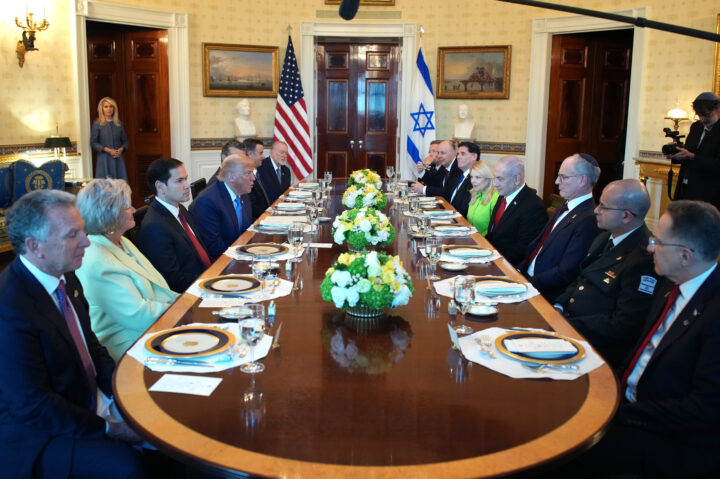
Andrew Harnik/Getty Images
President Donald Trump hosts Israeli Prime Minister Benjamin Netanyahu for a dinner in the Blue Room of the White House on July 7, 2025, in Washington, DC. Trump is hosting Netanyahu to discuss a potential ceasefire agreement to end the fighting in Gaza.
Good Tuesday morning.
In today’s Daily Kickoff, we report on last night’s meeting between Israeli Prime Minister Benjamin Netanyahu and President Donald Trump, and cover the National Education Association’s recent passage of a measure banning coordination with the Anti-Defamation League. We look at concerns from Jewish community security groups and congressional Democrats over plans to shrink the Department of Homeland Security’s Office of Intelligence and Analysis, and spotlight Pepperdine University’s new Middle East policy graduate program, which is being launched in partnership with The Washington Institute for Near East Policy. Also in today’s Daily Kickoff: Sam Altman, Effie Phillips-Staley and Amb. Tom Barrack.
What We’re Watching
- Israeli Prime Minister Benjamin Netanyahu’s Washington trip continues today. He’s slated to meet with Vice President JD Vance, and will head to Capitol Hill later this morning for meetings with House and Senate leadership, including Senate Majority Leader John Thune (R-SD), Senate Minority Leader Chuck Schumer (D-NY) and House Speaker Mike Johnson (R-LA).
- Elsewhere on the Hill, the Senate Armed Services Committee’s subcommittees continue their markups of the NDAA.
- In Sun Valley, Idaho, the annual Allen & Co. gathering formally kicks off today. Look out for the paparazzi photos of vest- and fleece-wearing tech and media moguls arriving at the Sun Valley Lodge.
What You Should Know
A QUICK WORD WITH JI’S MARC ROD
Israeli Prime Minister Benjamin Netanyahu’s third visit to Washington since the start of the Trump presidency kicked off Monday with closed-door meetings with President Donald Trump, Secretary of State Marco Rubio and Middle East envoy Steve Witkoff.
Trump and Netanyahu were on warm terms during remarks to the press ahead of their dinner. Netanyahu offered effusive praise for Trump for the U.S. strikes on Iran’s nuclear facilities and said he nominated Trump for a Nobel Peace Prize, as well as following Trump’s lead in expressing openness to the new Syrian government.
Trump, for his part, deferred to Netanyahu on a question about a two-state solution. “We’ll work out a peace with our Palestinian neighbors, those who don’t want to destroy us,” Netanyahu said. “I think the Palestinians should have all the powers to govern themselves, but none of the powers to threaten us. That means that certain powers like overall security will always remain in our hands. Now that is a fact and no one in Israel will agree to anything else because we don’t commit suicide.”
White House Press Secretary Karoline Leavitt told reporters earlier in the day that Trump’s “utmost priority … is to end the war in Gaza and return all of the hostages” and that Trump and Netanyahu would discuss “peace in Gaza and ending that conflict.”
But that agenda item saw little discussion in Trump and Netanyahu’s public remarks. Asked about talks with Hamas, Trump instead spoke about Iran.
A senior Israeli official in Netanyahu’s delegation told reporters following the Trump-Netanyahu meeting that a deal to end the Gaza war is not on the table because “Hamas is not responsive to the conditions that would allow a comprehensive agreement,” such as demilitarization for Gaza and exile for remaining Hamas leaders, the senior official explained. Without those conditions, “Hamas could do [the Oct. 7, 2023, attacks] again.” More on this from JI’s Lahav Harkov here.
At the same time, the differences between the two leaders’ comments on potential further strikes on Iran indicated a possible point of friction in the future.
Asked about further strikes, Trump said he “can’t imagine wanting to do that” and maintained that Iran’s nuclear program had been “knocked out completely.” Trump added, “I think they want to make peace and I’m all for it,” while also suggesting that there is no need for negotiations or a deal, saying “What’s the purpose of talking?” He said that the U.S. is “ready, willing and able” if further strikes are necessary, “but I don’t think we’re going to have to be.”
SPECIAL RELATIONSHIP
Trump-Netanyahu bromance returns with Nobel Peace Prize nomination
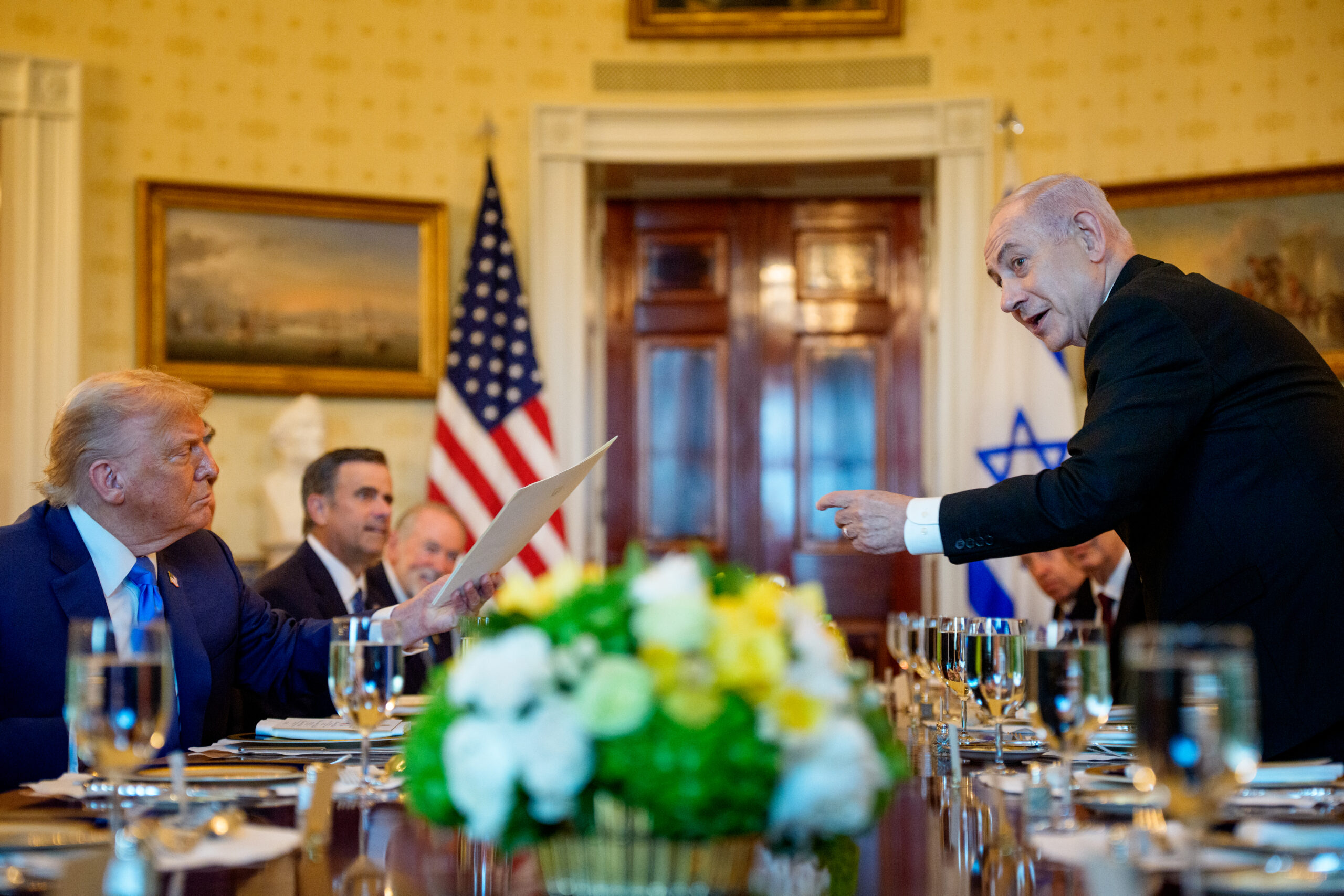
Israeli Prime Minister Benjamin Netanyahu greeted President Donald Trump in the White House Monday evening with effusive warmth, expressing the “appreciation and admiration” of Israel, the Jewish people and “the leadership of the free world” for the U.S.’ recent bombing campaign against Iran’s nuclear facilities. He also offered Trump an avenue toward his elusive goal: receiving a Nobel Peace Prize, Jewish Insider’s Gabby Deutch reports.
Prize goals: “He is forging peace as we speak, in one country and one region after the other. So I want to present you, Mr. President, the letter I sent to the Nobel Prize Committee,” Netanyahu announced, saying it would be a “well-deserved” honor for Trump. “Coming from you in particular, this is very meaningful,” Trump said. “It’s a great honor.”
Notable quotable: U.S. Ambassador to Turkey Thomas Barrack, who is serving as special envoy to Syria, said on Monday that Hezbollah could have a future in Lebanese politics, despite the organization’s designation by the U.S. State Department as a Foreign Terrorist Organization, Jewish Insider’s Jake Schlanger reports. “Hezbollah is a political party. It also has a militant aspect to it,” Barrack said at a press conference on Monday morning in Beirut, following a meeting with Lebanese President Joseph Aoun. “Hezbollah needs to see that there is a future for them, that the road is not not harnessed just solely against them, and that there’s an intersection of peace and prosperity for them also.”
EDUCATION CONSTERNATION
As teachers unions target ADL and oppose antisemitism bill, Jewish educators sound the alarm
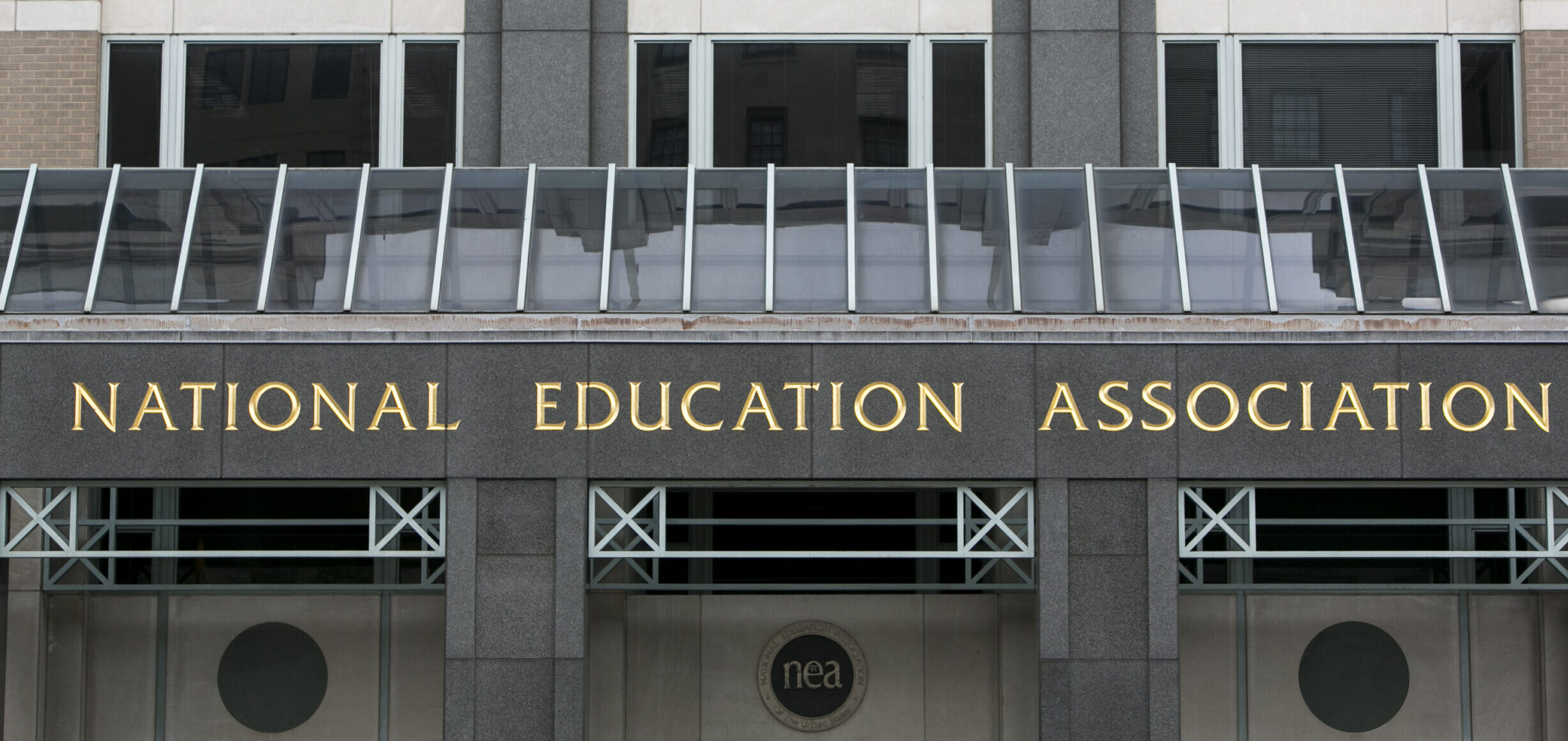
A grassroots campaign urging educators to stop using teaching materials from the Anti-Defamation League reached the highest levels of K-12 education over the weekend. Inside a packed conference hall in Portland, Ore., the thousands of delegates who make up the governing body of the National Education Association — the largest teachers union in the country — passed a measure that bars the union from using, endorsing or publicizing any materials from the ADL, Jewish Insider’s Gabby Deutch reports.
School ties: The NEA’s adoption of a measure targeting the leading Jewish civil rights organization may be an escalation, but it is only the most recent example of antisemitism — and divisive politics surrounding the war in Gaza — spilling into K-12 education, and teachers unions in particular. Just this week, the largest teachers union in California, a 300,000-person NEA affiliate, published a letter urging state senators to vote against a bill focused on fighting and preventing antisemitism. In May, the state assembly voted unanimously to approve the bill. But the bill’s fate is now in jeopardy as senators face pressure from one of the state’s most powerful unions to reject it.
Case closed: Barnard College reached a settlement on Monday in a lawsuit brought by Jewish students which claimed that the school violated Title VI of the Civil Rights Act of 1964 by failing to address antisemitism, Jewish Insider’s Haley Cohen reports.
campus competition
Pepperdine, Washington Institute launch Middle East policy graduate program

As the federal government continues its battles with dozens of colleges over campus antisemitism, the field of Middle East studies has been particularly scrutinized for advancing a one-sided, anti-Israel curriculum contributing to a rise of hostility towards the Jewish state in the classroom and beyond. Aiming to address that bias, Pepperdine University’s School of Public Policy will launch a new Middle East Policy Studies master’s program this fall. The tuition-free, fully accredited, two-year master’s program on Pepperdine’s D.C. campus is a partnership with The Washington Institute for Near East Policy. It will be funded solely by American citizens — unlike many similar university programs that take foreign funds, Jewish Insider’s Haley Cohen reports.
Seeking balance: The program comes as critics of the field have long alleged that it imparts to students a one-sided history of the Middle East in which Israel is a perpetual villain, particularly since the Oct. 7, 2023, Hamas terrorist attacks. “We wouldn’t be in these conversations had it not been revealed what’s been happening on college campuses since Oct. 7,” Pete Peterson, dean of Pepperdine’s public policy school, told JI.
WORKFORCE WORRIES
Jewish groups, congressional Democrats raise concerns about DHS intelligence cuts

Jewish community security groups and congressional Democrats are raising concerns about the Department of Homeland Security’s plans to slash 75% of the staff for the department’s Office of Intelligence and Analysis (I&A), Jewish Insider’s Marc Rod reports.
What they’re saying: I&A plays a role in collecting and disseminating to local law enforcement and private partners intelligence to counter threats including terrorism and foreign adversaries. But the office has also faced criticism from various fronts in recent years. “Hollowing out the office risks leaving the homeland dangerously exposed to these threats, especially at a time when the FBI’s budget is being substantially reduced,” top congressional Democrats said. A coalition of Jewish groups said, “We are deeply concerned that any wholesale changes to the operations of I&A will have an adverse effect on countering antisemitism and ensuring the safety of the Jewish community in the United States.”
HUDSON VALLEY SHOWDOWN
Effie Phillips-Staley plays to progressive base as she targets Rep. Mike Lawler

Effie Phillips-Staley, running on a progressive platform in the crowded Democratic field looking to unseat Rep. Mike Lawler (R-NY) in a swing congressional district, is taking a firm stance against the U.S. and Israeli strikes on Iran’s nuclear program, even as she has expressed concern about Iran’s nuclear ambitions, Jewish Insider’s Marc Rod reports.
Positioning: “For the leader of the free world to decide to strike Iran based on Fox News coverage and without deliberation or the approval of Congress is alarming and unprecedented,” she said in a statement to JI on Monday, a position shared by many congressional Democrats. “We cannot have a nuclear armed Iran under any circumstances and Congress must hold this President accountable by upholding the War Powers Act and requiring a full diplomatic process.” Despite her criticisms of the Iran strikes, Phillips-Staley has otherwise not embraced elements of the left-wing policy agenda that have alienated Jewish voters.
Blast from the past: Former Rep. Sean Patrick Maloney (D-NY) is mulling entering the crowded Democratic primary in New York’s 17th Congressional District after falling short in his 2022 matchup against Lawler.
legal case
New legal report by Israeli NGO finds systematic use of sexual violence by Hamas on Oct. 7
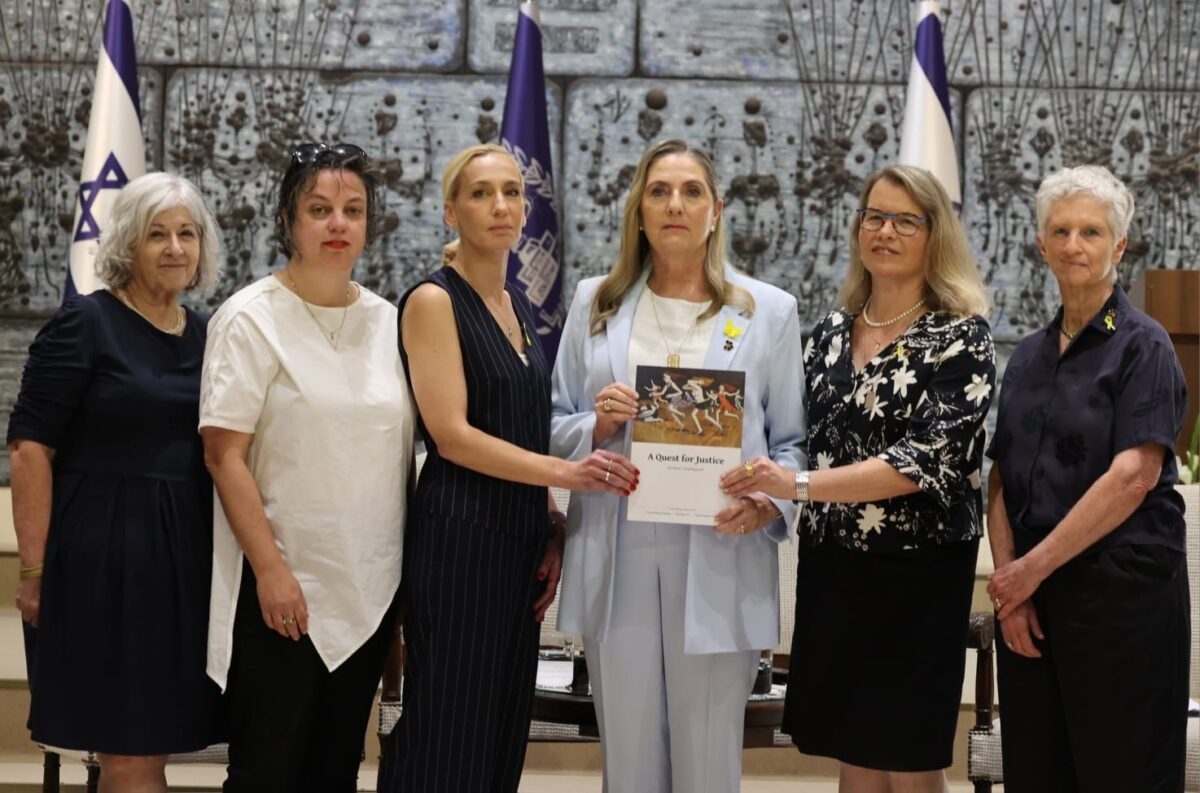
A report released by The Dinah Project on Tuesday that seeks to “set the record straight” on the sexual assaults that occurred during the Oct. 7, 2023, Hamas attacks on southern Israel found that the terror group systematically used sexual violence as a tactical weapon of war, acts that the report argues constitute crimes against humanity. The study, which was led by legal and feminist experts and has been compiled into a book, offers a new evidentiary and legal framework to prosecute such crimes as its authors call on international bodies to hold the perpetrators accountable, Jewish Insider’s Tamara Zieve reports for eJewishPhilanthropy.
The painful truth: The 80-page report, “A Quest for Justice: October 7 and Beyond,” is described by its authors as the most comprehensive legal analysis to date of the sexual and gender-based crimes committed during the-Hamas led attacks, and afterwards against hostages in captivity. It argues that the acts of sexual violence committed constitute crimes against humanity and that the acts were not isolated, but deliberate, widespread and systematic. The authors call for the development of a new legal protocol to handle cases of sexual violence in armed conflicts. The report was presented on Tuesday to Israeli First Lady Michal Herzog at a press event at the President’s Residence in Jerusalem. “The report presents the truth as it is — shocking, painful, but necessary. On behalf of all those who were affected, we are committed to continuing to fight until their cry is heard everywhere and until justice is done,” Herzog said.
Read the full story here and sign up for eJewishPhilanthropy’s Your Daily Phil newsletter here.
Worthy Reads
Bringing Harvard to Heel: The New York Times’ Stephanie Saul and Steven Rich look at how Harvard’s fiscal ties to China, which boosted its giving to the school following the 2008 recession that significantly impacted Harvard’s financial stability, have contributed to the Trump administration’s legal battles targeting the Ivy League school. “Now Harvard’s ties with China are coming back to haunt the university. Those connections were forged when Harvard was more financially vulnerable and when much of the foreign policy establishment believed that higher education could play a part in pushing America’s democratic ideals to China and the rest of the world. But American foreign policy has turned sharply hawkish against China, and even though Harvard has steadily reduced its ties there, the Trump administration has made the relationship another line of attack in its broader effort to bring the university to heel.” [NYTimes]
What Mamdani Means: The Wall Street Journal’s Gerard Baker considers how New York City Democratic mayoral nominee Zohran Mamdani’s primary success underscores the present political climate that allows more extreme positions and views to take hold. “But while we may mock the radicalism of Mr. Mamdani and his fellow socialists seemingly on the rise in the Democratic Party, I see in the man’s appeal, his evident popularity among a certain type of young voter especially, more signs of the continuing crack-up of American politics. Many Republicans like to think that the extremism represented by the likes of Mr. Mamdani and Rep. Alexandria Ocasio-Cortez is a signal of the Democrats’ growing irrelevance and unelectability. But his ascent — provisional though it may still be — is more likely a reflection of the fissures that continue to stretch our national cohesion than some proof of the marginalized nature of Donald Trump’s opponents.” [WSJ]
Alarmed in Algeria: The Financial Times’ Heba Saleh and Leila Abboud report on how the shifting dynamics and power structures across the Middle East and North Africa — including Israel’s warming ties with Morocco — have affected Algeria. “Algerian leaders feel surrounded by hostile forces, with Morocco, Israel and the United Arab Emirates all increasing their influence in the region, analysts say. Algiers has also fallen out with France, the former colonial power and a key partner. … Staunchly pro-Palestinian Algiers has been particularly riled by the Moroccan normalisation deal with Israel, which was the price Rabat paid for US recognition of its sovereignty over Western Sahara. It is also wary of Israeli-Moroccan military co-operation.” [FT]
Word on the Street
President Donald Trump overruled Pentagon policy chief Elbridge Colby in calling for a restoration of weapons to Ukraine, one week after the Defense Department announced a holdup of arms earmarked for the country; “We have to, they have to be able to defend themselves,” Trump said in his Monday meeting with Netanyahu…
The Senate Foreign Relations Committee will hold a confirmation hearing next week for former National Security Advisor Mike Waltz, the Trump administration’s nominee to be U.S. ambassador to the U.N.…
The U.S. revoked the Foreign Terrorist Organization designation of Hay’at Tahrir al-Sham, the militant group led by Syrian President Ahmed al-Sharaa that overthrew the Assad regime last year…
Syrian media reports that Syrian President Ahmed al‑Sharaa met an Israeli official on Monday in Abu Dhabi during his official visit to the United Arab Emirates; the reports named Israeli National Security Advisor Tzachi Hanegbi as the official, but Hanegbi is said to be in Washington as part of Israeli Prime Minister Benjamin Netanyahu‘s delegation…
The IRS, in a new court filing, said it will allow places of worship to endorse political candidates, exempting them from a law prohibiting tax-exempt organizations from engaging in political activity…
eJewishPhilanthropy’s Nira Dayanim looks at how Jewish organizations in central Texas are mobilizing to assist in relief and recovery efforts following storms and flash floods that have killed more than 100 people across the region…
A federal court in Massachusetts heard opening arguments on Monday in a lawsuit brought against the Trump administration by two faculty associations over the government’s targeting of noncitizen U.S. residents who have espoused or engaged in anti-Israel activity that could be seen as supporting Hamas…
The Wall Street Journal reports on the support that New York City Mayor Eric Adams is receiving from city real estate executives following Democratic mayoral nominee Zohran Mamdani’s victory over former Gov. Andrew Cuomo last month…
OpenAI CEO Sam Altman described himself in a recent social media post as “politically homeless”; addressing Mamdani’s recent suggestion that billionaires shouldn’t exist, Altman said he would “rather hear from candidates about how they are going to make everyone have the stuff billionaires have instead of how they are going to eliminate billionaires”…
Mubadala Capital, a subsidiary of Abu Dhabi-based sovereign wealth fund Mubadala Investment Company, hired Ophir Shmuel as its new head of business development, The Circuit reports…
U.K.-based American stand-up comic Reginald Hunter appeared in a London court to face charges for sending offensive, antisemitic messages on multiple occasions to an organizer of the city’s hostage-awareness events…
Five IDF soldiers were killed and more than a dozen injured when an explosive detonated in the northern Gaza city of Beit Hanoun; four of the soldiers killed were members of the army’s Haredi “Netzah Yehuda” battalion…
Iran has expelled more than 800,000 Afghans since March, the majority of whom were forced to leave the country in the last five weeks amid a crackdown on undocumented individuals in the Islamic Republic…
Two people were injured and two others are missing following a Houthi attack on a Liberian-flagged ship transiting through the Red Sea; the attack came a day after the crew of a second Liberian-flagged vessel was forced to abandon ship following an attack believed to have been conducted by the Houthis…
Psychoanalyst Dr. Anna Ornstein, who as a teenager survived the Holocaust and would go on to pioneer a school of thought in her field that prioritized empathy, died at 98…
Playwright Ronald Ribman died at 82…
Pic of the Day
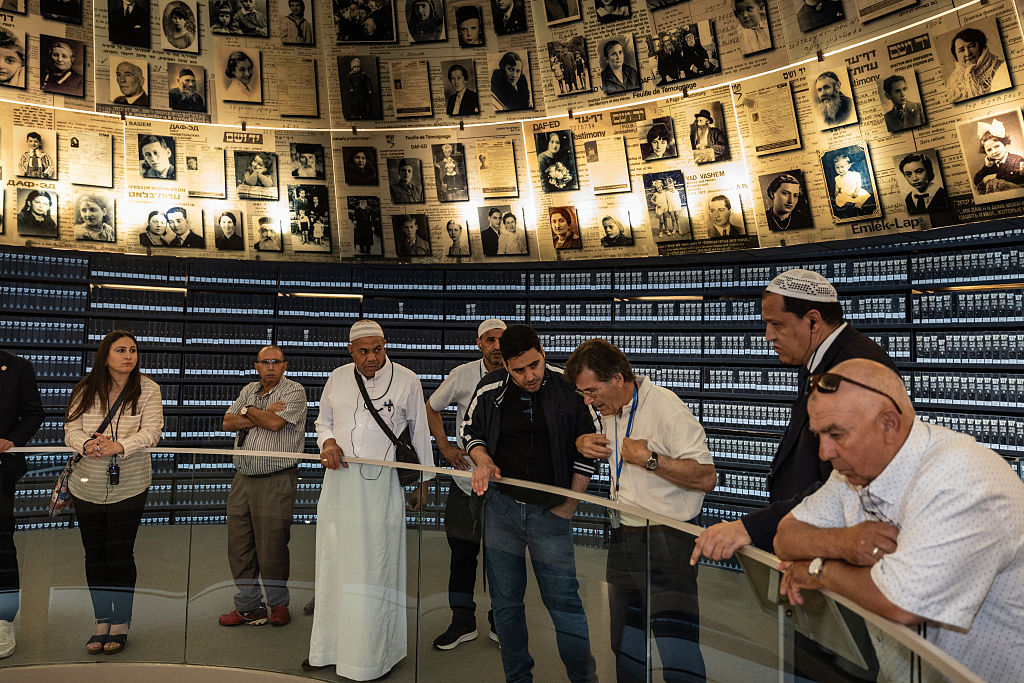
Imams and Muslim community leaders from France, Belgium, the Netherlands, Italy and the U.K. visited Israel’s Yad Vashem Holocaust Memorial Museum in Jerusalem on Tuesday as part of a trip focused on coexistence that also included a meeting with Israeli President Isaac Herzog.
Birthdays

Israeli film director, producer and researcher, Eyal Boers turns 50…
Retired in 2016 after 26 years as executive director of the Baltimore Jewish Council, Arthur “Art” Abramson turns 77… Democratic candidate for president of the U.S. in 2020 and 2024, Marianne Deborah Williamson turns 73… Mayor of Farmington Hills, Mich., until 2023, she is a former member of the Michigan House of Representatives, Vicki Barnett turns 71… Attorney and Democratic politician from Texas, Barbara Ann Radnofsky turns 69… Attorney and a former U.S. ambassador to Belgium in the Obama administration, Howard Gutman turns 69… Partner of the global law firm Dentons, when he was elected attorney general of Georgia in 2010 (and reelected in 2014) he became the first Jewish person to win statewide office in Georgia, Samuel Scott Olens turns 68… Former member of Knesset who had served as Israel’s foreign minister, justice minister, agriculture minister and housing minister, Tziporah Malka “Tzipi” Livni turns 67… Retired rabbi at Temple Emanuel in Beaumont, Texas, Rabbi Joshua Samuel Taub… Co-president of Rochester, N.Y.-based Hahn Automotive Warehouse, he is on the board of governors of the Jewish Federation of Greater Rochester, Eli N. Futerman… SVP and COO of New York’s Jewish Communal Fund, Marina W. Lewin… Former Washington bureau chief of the Jewish Telegraphic Agency, Ron Kampeas turns 65… Consultant strategist, policy advisor and writer, he served as corporate counsel to Allstate Insurance for 28 years, Steven Richard Sheffey turns 65… Writer, television producer, ventriloquist and puppeteer, Mallory Hurwitz Tarcher Lewis turns 63… Managing partner at DGA’s Albright Stonebridge Group, Dan K. Rosenthal turns 59… Former ice hockey player, her three sons were seventh, first and fourth picks overall, respectively, in the 2018, 2019 and 2021 NHL Drafts, Ellen Weinberg-Hughes turns 57… Higher education reporter for The Wall Street Journal, Douglas Belkin… New York City comptroller, Brad Lander turns 56… Managing director of investor relations for Harbor Group International, Meir Raskas… EVP of the Atlantic Council, Jenna H. Ben-Yehuda… Atlanta-based educator, activist and writer, Robbie Medwed… Sports journalist, known for his coverage of mixed martial arts and professional wrestling, Ariel Jacob Helwani turns 43… Senior legal counsel at Horizons Law and Consulting, Alon Sachar… Policy and communications consultant, Stefanie Feldman… Diplomatic correspondent at the Jerusalem Post and i24NEWS, Amichai Stein…
Netanyahu, Trump project unity in D.C., but diverging views on Iran, Gaza hint at future fault lines
Differences between the two leaders’ comments on potential further strikes on Iran indicated a possible point of friction in the future

Andrew Harnik/Getty Images
President Donald Trump, seated next to Secretary of Defense Pete Hegseth, hosts Israeli Prime Minister Benjamin Netanyahu for a dinner in the Blue Room of the White House on July 7, 2025, in Washington, DC.
Israeli Prime Minister Benjamin Netanyahu’s third visit to Washington since the start of the Trump presidency kicked off Monday with closed-door meetings with President Donald Trump, Secretary of State Marco Rubio and Middle East envoy Steve Witkoff.
Trump and Netanyahu were on warm terms during remarks to the press ahead of their dinner. Netanyahu offered effusive praise for Trump for the U.S. strikes on Iran’s nuclear facilities and said he nominated Trump for a Nobel Peace Prize, as well as following Trump’s lead in expressing openness to the new Syrian government.
Trump, for his part, deferred to Netanyahu on a question about a two-state solution, “We’ll work out a peace with our Palestinian neighbors, those who don’t want to destroy us,” Netanyahu said, while adding that in any future peace agreement, “the sovereign power of security, always remains in our hands.”
White House Press Secretary Karoline Leavitt told reporters earlier in the day that Trump’s “utmost priority … is to end the war in Gaza and return all of the hostages” and that Trump and Netanyahu would discuss “peace in Gaza and ending that conflict.”
But that agenda item saw little discussion in Trump and Netanyahu’s public remarks. Asked about talks with Hamas, Trump instead spoke about Iran.
At the same time, the differences between the two leaders’ comments on potential further strikes on Iran indicated a possible point of friction in the future.
Asked about further strikes, Trump said he “can’t imagine wanting to do that” and maintained that Iran’s nuclear program had been “knocked out completely.” Trump added, “I think they want to make peace and I’m all for it,” while also suggesting that there is no need for negotiations or a deal, saying “What’s the purpose of talking?” He said that the U.S. is “ready, willing and able” if further strikes are necessary, “but I don’t think we’re going to have to be.”
Netanyahu seemed somewhat less certain that Iran’s nuclear and ballistic missile programs had been permanently stopped, even as he called the strikes a “historic victory.” “When you remove a tumor, that doesn’t mean that it can’t come back,” the Israeli prime minister said. “You have to constantly monitor the situation to make sure that there’s no attempt to bring it back.”
The two leaders downplayed another potential test of U.S.-Israel relations, the potential election of Democratic nominee Zohran Mamdani, who has pledged to arrest Netanyahu — following the International Criminal Court’s warrant against him — as mayor of New York City. Netanyahu dismissed the notion as “folly.”
Trump interjected that he’d “get him out of there” and suggested that he could use federal funding to force Mamdani to “behave.” Both men also said that Mamdani’s election is not guaranteed.
Trump also said that he would send more weapons, particularly defensive weapons, to Ukraine, shipments reportedly halted as a result of a push by top Pentagon official Elbridge Colby. Hours later, the Pentagon confirmed it would send additional defensive weapons to Ukraine.
It’s another sign that Trump’s instincts on foreign policy don’t always line up with those of vocal isolationist members of his team. Colby also reportedly resisted moving U.S. systems and personnel, including missile defense platforms, from Asia to the Middle East.
Today, Netanyahu heads to Capitol Hill, where he’s set to sit down with House Speaker Mike Johnson (R-LA) and a group with Senate leaders including Majority Leader John Thune (R-SD), Minority Leader Chuck Schumer (D-NY) and Senate Foreign Relations Committee Chairman Jim Risch (R-ID).
Most House members will likely not be in town to meet with the Israeli leader this week, with the House out of session. The Israeli prime minister will return to the Capitol on Wednesday for one-on-one meetings with several close allies in the Senate.
The Israeli prime minister also expressed an openness for a new relationship with Syria after Trump removed sanctions on the country
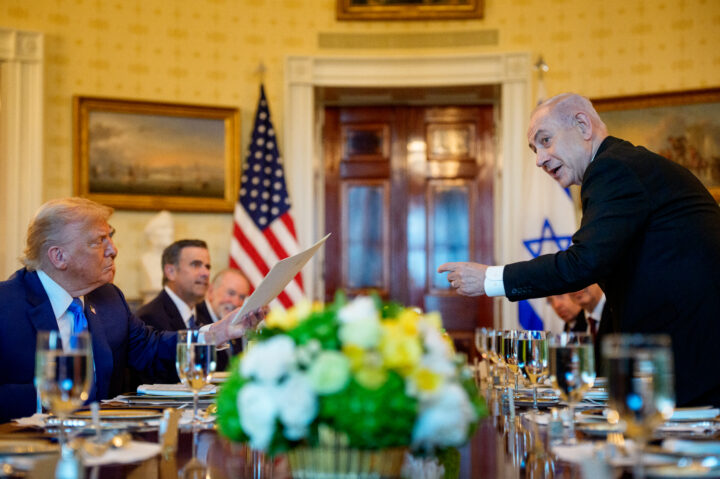
Andrew Harnik/Getty Images
Israeli Prime Minister Benjamin Netanyahu hands off a letter he sent to the Nobel Peace Prize committee to nominate U.S. President Donald Trump for the Nobel Peace Prize during a dinner in the Blue Room of the White House on July 07, 2025 in Washington, DC.
Israeli Prime Minister Benjamin Netanyahu greeted President Donald Trump in the White House Monday evening with effusive warmth, expressing the “appreciation and admiration” of Israel, the Jewish people and “the leadership of the free world” for the U.S.’ recent bombing campaign against Iran’s nuclear facilities.
He also offered Trump an avenue toward his elusive goal: receiving a Nobel Peace Prize.
“He is forging peace as we speak, in one country and one region after the other. So I want to present you, Mr. President, the letter I sent to the Nobel Prize Committee,” Netanyahu announced, saying it would be a “well-deserved” honor for Trump.
“Coming from you in particular, this is very meaningful,” Trump said. “It’s a great honor.”
Similar exchanges of flattery are not an unusual occurrence in the Trump White House. But the warmth and back-slapping present a marked shift even from Netanyahu’s last visit to Washington in April — when he sought to head off U.S. tariffs and urge Trump not to make a nuclear deal with Iran — and a sign of how much has changed in the last three months.
In April, Netanyahu avoided reporters’ questions about Iran. This time, he and Trump took a victory lap together after a 12-day war in which Israel, with key support from the U.S., exacted significant damage on Iran’s nuclear program.
“It was an amazing job,” Trump said of the American bombers’ attacks on three nuclear sites in Iran. “This stopped a lot of fighting. When that happened, it was a whole different ballgame.”
Asked whether he would support additional strikes on Iran, Trump said that he “can’t imagine wanting to do that,” saying that he thinks Iran wants peace.
“They want to meet. They want to work something out. They’re very different now than they were two weeks ago,” Trump said. He ceded the floor to Netanyahu when a reporter asked if the war between Israel and Iran was over.
“I think the partnership between Israel and the United States, the partnership between President Trump and me, produced a historic victory. It’s an incredible victory,” Netanyahu said. He likened Iran to a tumor, noting that doctors must still check in on cancer patients after a tumor has been removed.
“You have to constantly monitor the situation to make sure that there’s no attempt to bring it back,” Netanyahu said. “This has already changed the face of the Middle East, but it’s not over.”
Taking cues from Trump, Netanyahu offered tentative hope for a new relationship with Syria. Israeli leaders, including Netanyahu, have been cautious when considering how to deal with Ahmed al-Sharaa, the new president of Syria. Trump, meanwhile, has expressed optimism about al-Sharaa and moved to remove sanctions on Syria. The Trump administration on Monday removed Hayat Tahrir al-Sham, a group previously led by al-Sharaa, from its list of foreign terrorist organizations.
But on Monday, Netanyahu said there is an “opportunity to explore” with the new government in Israel’s northern neighbor — and gave Trump some credit for it.
“I think this presents opportunities for stability, for security and eventually for peace,” said Netanyahu. “I think that opportunity has been opened by the president and by the changed security situation, which we brought about with the collapse of the Assad regime.”
Trump and Netanyahu did not share much publicly about the recent reports suggesting a ceasefire deal between Israel and Hamas is under consideration.
When asked if he thinks there can be a two-state solution, Trump again handed the mic to Netanyahu.
“You have the greatest man in the world to answer that age-old question,” said Trump. Netanyahu said no.
“We’ll work out a peace with our Palestinian neighbors, those who don’t want to destroy us, and we’ll work out a peace in which our security, the sovereign power of security, always remains in our hands,” said Netanyahu. “People will say, ‘It’s not a complete state, it’s not a state, it’s not that’ — we don’t care. We vow never again.”
Plus, Ireland draws Risch’s ire

Avi Ohayon/PMO
Good Monday morning.
In today’s Daily Kickoff, we preview Israeli Prime Minister Benjamin Netanyahu’s meeting with President Donald Trump that is slated for this evening, and talk to former Rep. Mike Rogers, who is mounting a Senate bid in Michigan, about the Trump administration’s approach to Iran. We also interview the chancellors of Washington University and Vanderbilt about their approaches to antisemitism and anti-Israel activity on campus, and look at the regional effects of the deepening relationship between Israel and Azerbaijan. Also in today’s Daily Kickoff: Sen. Jim Risch, Yoram Hazony and Dennis Ross.
What We’re Watching
- If it’s the week after July 4, all eyes are turning to Sun Valley, Idaho, for the annual Allen & Co. leadership retreat, which is set to kick off tomorrow. Attendees this year include Mark Zuckerberg, Jeff Bezos, Andy Jassy, Sam Altman, Barry Diller, Alex Karp, Evan Spiegel, Ynon Kreiz, Charles Rivkin, David Zaslav, Brian Grazer, Bob Iger, David Ignatius, Bari Weiss, Senate Minority Leader Chuck Schumer (D-NY), Mike Bloomberg, Govs. Wes Moore and Glenn Youngkin, Jeffrey Katzenberg and Casey Wasserman.
- Israeli Prime Minister Benjamin Netanyahu will meet with President Donald Trump this evening at the White House. Earlier in the day, Netanyahu will meet at the Blair House, where he is staying, with Secretary of State Marco Rubio and Middle East envoy Steve Witkoff to prepare for his sit-down with the president.
- Elsewhere in Washington, the Senate Armed Services Committee’s subcommittees will hold markups on the National Defense Authorization Act.
- Leaders from the BRICS alliance wrap up their two-day summit in Rio de Janeiro today. Absent from the gathering of officials from Brazil, Russia, India, China and South Africa was Chinese President Xi Jinping, while Russian President Vladimir Putin, who has largely curbed his travel abroad since Russia’s invasion of Ukraine, addressed the gathering by video.
What You Should Know
A QUICK WORD WITH JI’S MELISSA WEISS AND LAHAV HARKOV
When Israeli Prime Minister Benjamin Netanyahu sits down with President Donald Trump today, one question will be on observers’ minds: What will each walk away with?
Netanyahu appeared to come away empty-handed from his April meeting in Washington, after the U.S. imposed tariffs on Israel, among other countries. Weeks later, Trump skipped Israel on his first trip abroad, while visiting three other countries in the region.
Few knew at the time about Netanyahu’s plans to take on Iran. Following last month’s joint U.S.-Israel military effort to degrade Iran’s nuclear program and military infrastructure, relations between the two leaders have improved to such a degree that last week Trump called twice for an end to the legal proceedings against Netanyahu. A post-strikes-on-Iran victory lap is top of the public agenda for Netanyahu’s White House visit today, while Trump’s other goals, as they relate to Israel, remain works in progress.
The White House wants to wind down the war in Gaza, as Trump has said many times in recent months. After the American bunker busters dealt Iran the final punch that Israel pushed for, the president has newly gained leverage to push Netanyahu to end the war in Gaza — a move the Netanyahu government has thus far resisted until it has achieved its goal of “total victory” against Hamas. Trump told reporters on Sunday night that “there’s a good chance we have a deal with Hamas during the week pertaining to quite a few of the hostages.”
ROGER THAT
Michigan Senate hopeful Mike Rogers underscores his support for Trump’s strikes on Iran’s nuclear program
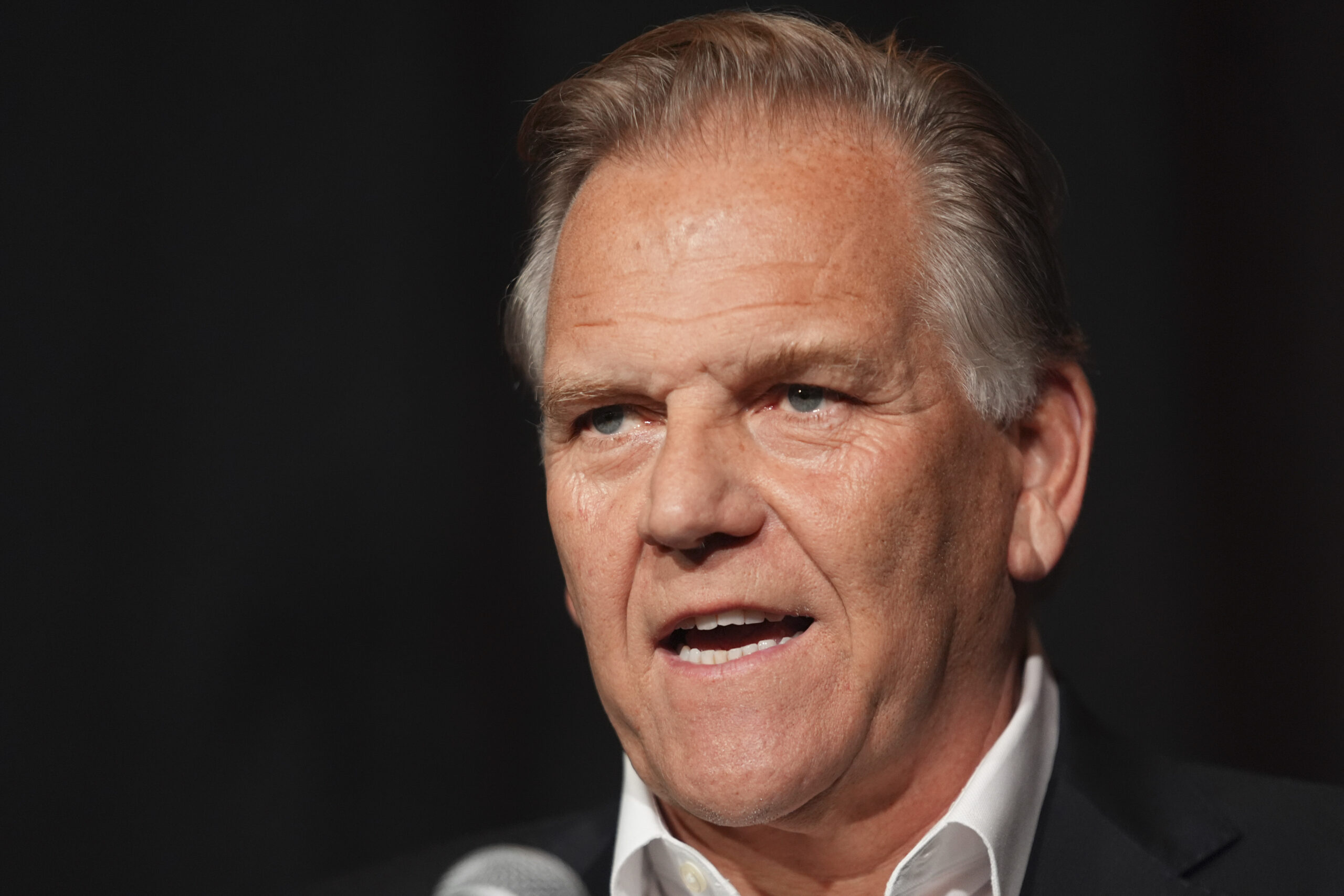
Former Rep. Mike Rogers (R-MI), making his second bid for Michigan’s Senate seat, is leaning into his support for the Trump administration’s decision to strike Iran’s nuclear program on the campaign trail, Jewish Insider’s Marc Rod reports.
Iran angle: Rogers emphasized, in an interview with JI last week, that he has long been suspicious and concerned about Iran’s nuclear program and other malign activities dating back to his time as the chairman of the House Intelligence Committee in the early 2010s, when he had access to highly classified information. “I couldn’t have supported [the operation] more,” Rogers, who served in the House from 2001 to 2015, said. “I was for all of this when it wasn’t very cool to be for all of this. The former lawmaker said he believes that Iran was much closer to a nuclear weapon than many believe, noting that its development of advanced supercomputers would likely have allowed it to reliably simulate a nuclear weapons test, an undetectable alternative to actually testing a nuclear bomb.
Bonus: Rogers’ Senate campaign recently named a conservative influencer with an extensive history of anti-Israel posts as county chair for his campaign in five counties — but Rogers distanced himself from the volunteer’s views on the Middle East in an interview with Jewish Insider’s Marc Rod.
CAMPUS BEAT
Vanderbilt, WashU leaders pitch Jewish students on a winning post-Oct. 7 strategy
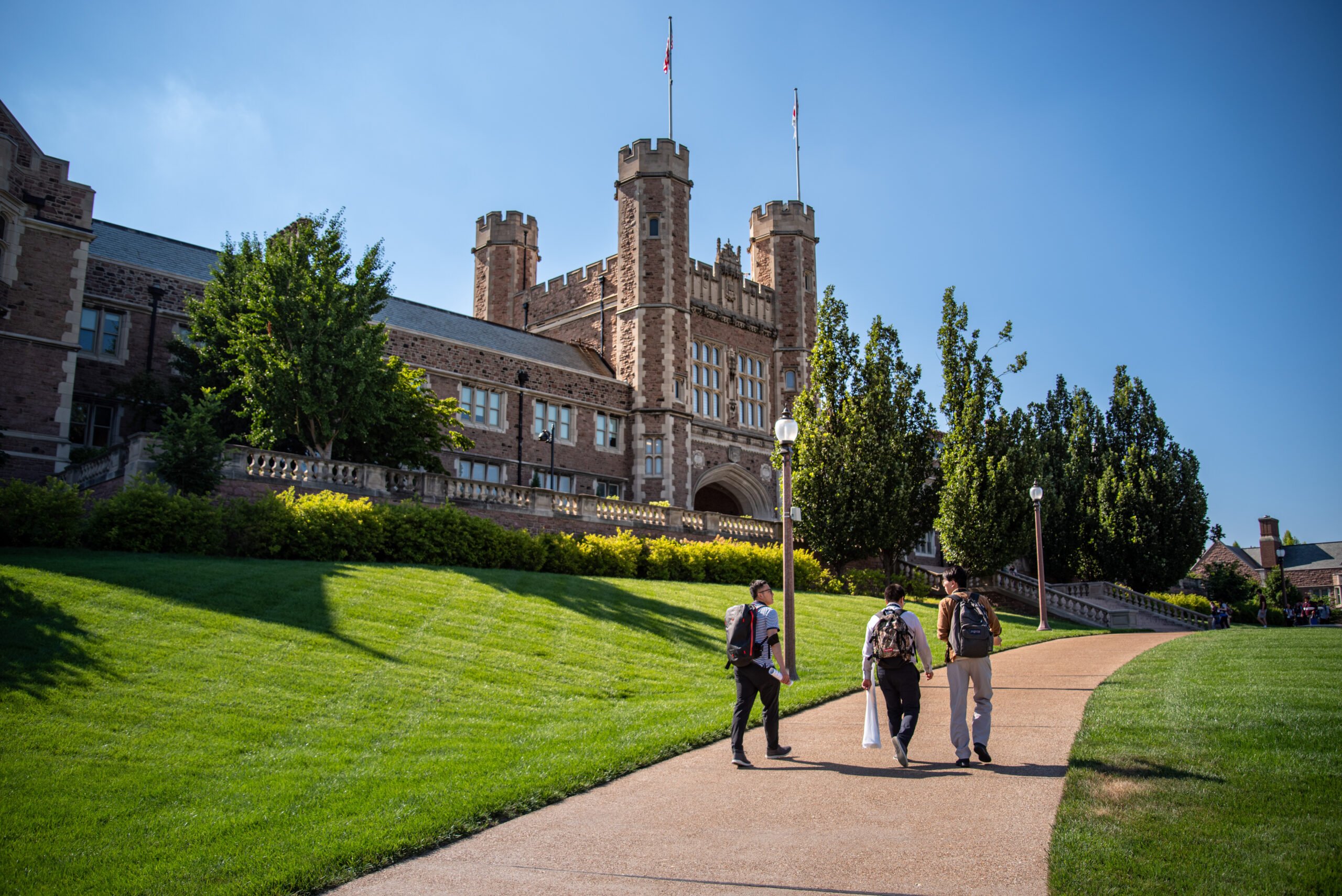
Many universities are still navigating the post-Oct. 7 maelstrom, trying to handle competing concerns from students, parents, alumni and faculty — all while facing civil rights investigations by the federal government. In March, Education Secretary Linda McMahon wrote a letter to 60 schools under investigation for antisemitic discrimination, including Harvard, Yale, Northwestern, Stanford and Princeton. Vanderbilt University and Washington University in St. Louis were not on the list. That presents an opening for them to reach Jewish students with concerns about what they’re seeing elsewhere, particularly as the Jewish student populations at many top universities have shrunk. Vanderbilt Chancellor Daniel Diermeier and WashU Chancellor Andrew D. Martin talked to Jewish Insider’s Gabby Deutch about why they’re pushing back against “creeping politicization” on college campuses.
Political play: The two university leaders have joined together in something of an informal pact — a joint effort to promote principled leadership in higher education, presenting their two schools as a refreshing counterweight to the dysfunction plaguing higher-ranked competitors like Harvard and Columbia. Martin and Diermeier see themselves and their institutions as the stewards of a forward-looking case for higher education at a time when the institution is under attack, both from Washington and from Americans, whose trust in higher education has plummeted. It’s not just about values: It’s a savvy political move. After all, both Vanderbilt and WashU would be in trouble if federal research dollars stopped flowing to the schools, or if President Donald Trump made the call that they could not admit international students, as is the case with Harvard.
BAKU BUSINESS
With gas deal, Israel-Azerbaijan ties grow, sparking Iran’s ire

Following the Israel-Iran ceasefire and amid questions about the extent of the damage Israel and the U.S. inflicted on the Islamic Republic’s nuclear program, an important piece of news flew under the radar: Azerbaijan’s national energy company, SOCAR, finalized its purchase of a 10% stake in Israel’s Tamar gas field. The deal and its timing amid hesitation from other countries that have considered investing in Israel, reflect a growing strategic partnership between Jerusalem and Baku — one that has garnered increasing pressure from Iran toward Azerbaijan, Jewish Insider’s Lahav Harkov reports.
Details: The day after the ceasefire between Israel and Iran was announced toward the end of last month, Union Energy, owned by Israeli businessman Aharon Frenkel, received the final approval from Israel’s Petroleum Council and Competition Authority to sell half its shares of the gas field in the Mediterranean, which provides 60-70% of Israel’s electricity each year, to Azerbaijan’s SOCAR. Chevron owns 25% of the Tamar field and the UAE’s Mubadala sovereign wealth fund owns an 11% stake. Azerbaijan supplies as much as two-thirds of Israel’s oil, and Israel was the largest supplier of arms to Azerbaijan from 2016-2020. Israel continued to sell drones and missiles to Baku during its war with Armenia over the disputed Nagorno-Karabakh region in 2020, as well as satellites and a missile-interception system in 2023, during another war between Azerbaijan and Armenia.





